




Essays:
Alain-Fournier and "Le Grand Meaulnes,' by Martin Turnell
Statement and Poetry. by Gerald E. Graff
How Soon the Winter: Donald Davidson's "A Touch of Snow," by M. E. Bradford
The Life of Randolph Bourne. by Sherman Paul
The Pavilion. by Herbert Morris
The Guide: Poros, by Lawrence P_ Spingarn
Grandfather. by Mairi MacInnes
Another One. by Lewis Turco
To James Fenimore Cooper. by David Levin
Feerie, translation of Paul Valery by Harry Strickhausen
Nostalgia. And Wail No Longer. San Martino del Carso, The Kiss. translations of Giuseppe Ungaretti and Paul Eluard by Daniel Cory
Stories:
The Cuckoo's Nest, by Harris Downey
The Rescue. by Sue Kaufman
The Lavender Dress. by M. E. McKenzie
The Rites of Spring. by John Lewis Longley, Jr.
Reviews:
Randall Jarrell. Novelist. by Sylvia Angus
The Southerners and Jews. by Louis D. Rubin, Jr.
Essays and Reviews by Eric Voegelin, John Crowe Ransom, Barbara Hardy, W. W. Robson, Herbert Howarth, Robert Langbaum, Robert Hollander, Paul Fussell [r., David O. Galloway, Wallace Fouilie, Ronald Moran, George Lensing, Howard Baker, Samuel Irving Bellman, [aruis A. Thurston, Arnold John Stafford, James B. Colvert, Frederick J. Hoffman
Poetry by Robert Pack, Samuel French Morse, Anne Hayes, Catherine Davis, Arthur Gregor, Peter Davison, Kenneth Fields
Stories by Shirley Anne Grau, Anne Tyler, Arturo Vivante, Ellington White, N. Scott Momaday

Business Manager
The Southern Review Drawer D, University Station Baton Rouge. La. 70803
I wish to enter my subscription to The Southern Review for: o I year .0 2 years 0 3 years
Name:
Address:
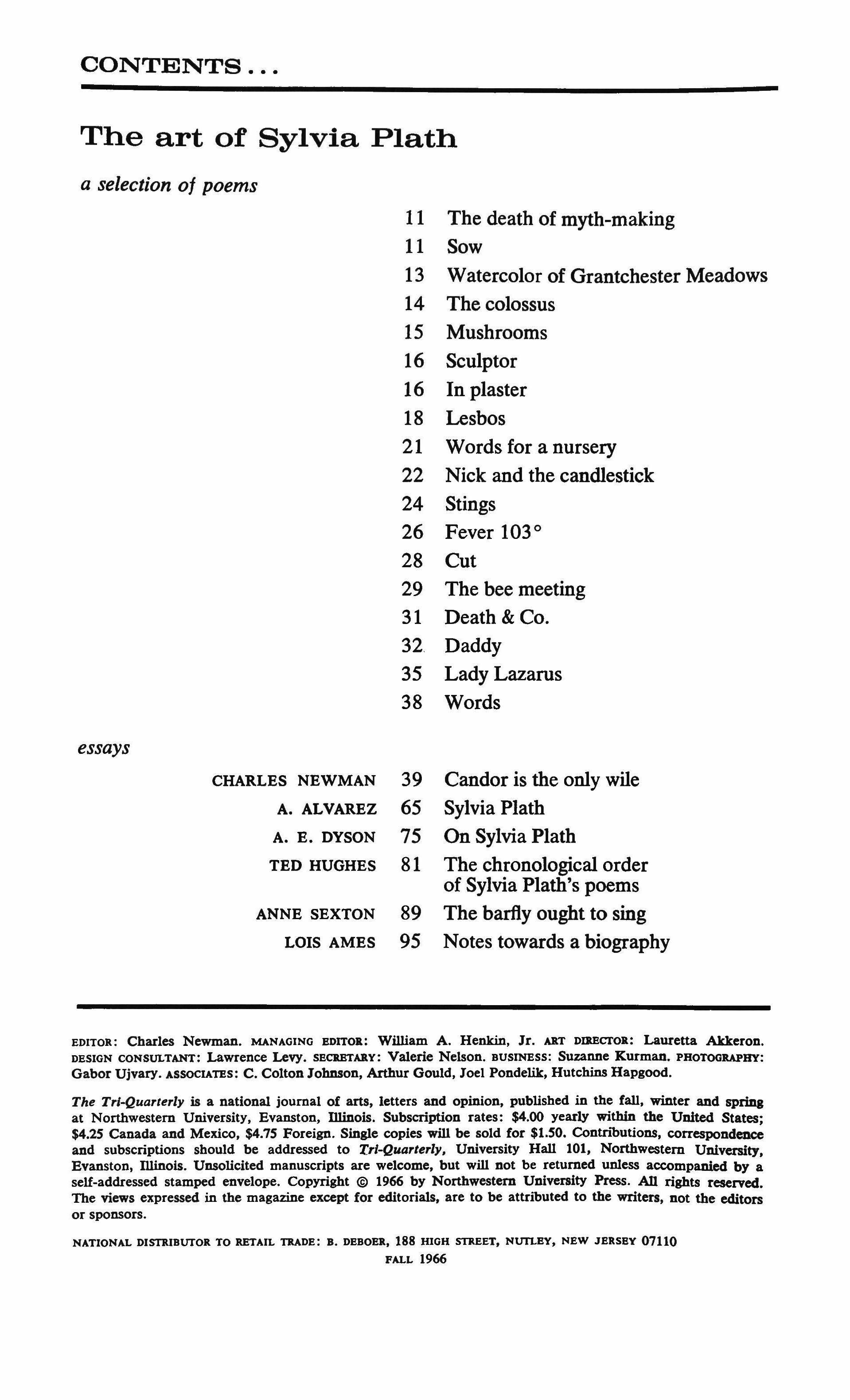
EDITOR: Charles Newman. MANAGING EDITOB.: William A. Henkin, Jr. Al.T DIB.EcrOB.: Lauretta Akkeron. DESIGN CONSULTANT: Lawrence Levy. SECllBTAl.Y: Valerie Nelson. BUSINESS: Suzanne Kurman. PHOTOGI.APBY: Gabor Ujvary. ASSOCIATES: C. Colton Johnson, Arthur Gould, Joel Pondelik, Hutchins Hapgood.
The Trl-Quarterly is a national journal of arts, letters and opinion, published in the fall, winter and spring at Northwestern University, Evanston, Dlinois. Subscription rates: $4.00 yearly within the United States; $4.25 Canada and Mexico, $4.7S Foreign. Single copies will be sold for $1.S0. Contributions, colTespondence and subscriptions should be addressed to 'Xrt-Quarterly, University Hall 101, Northwestern University, Evanston, Dlinols. Unsolicited manuscripts are welcome, but will not be returned unless accompanied by a self-addressed stamped envelope. Copyright ® 1966 by Northwestern University Press. All rights reserved. The views expressed in the magazine except for editorials, are to be attributed to the writers, not the editors or sponsors.
NATIONAL DISTRIBUTOR TO RETAIL TRADE: B. DEBOEl., 188 mGR STREET, NUTLEY, NEW .JERSEY 07110 PALL 1966
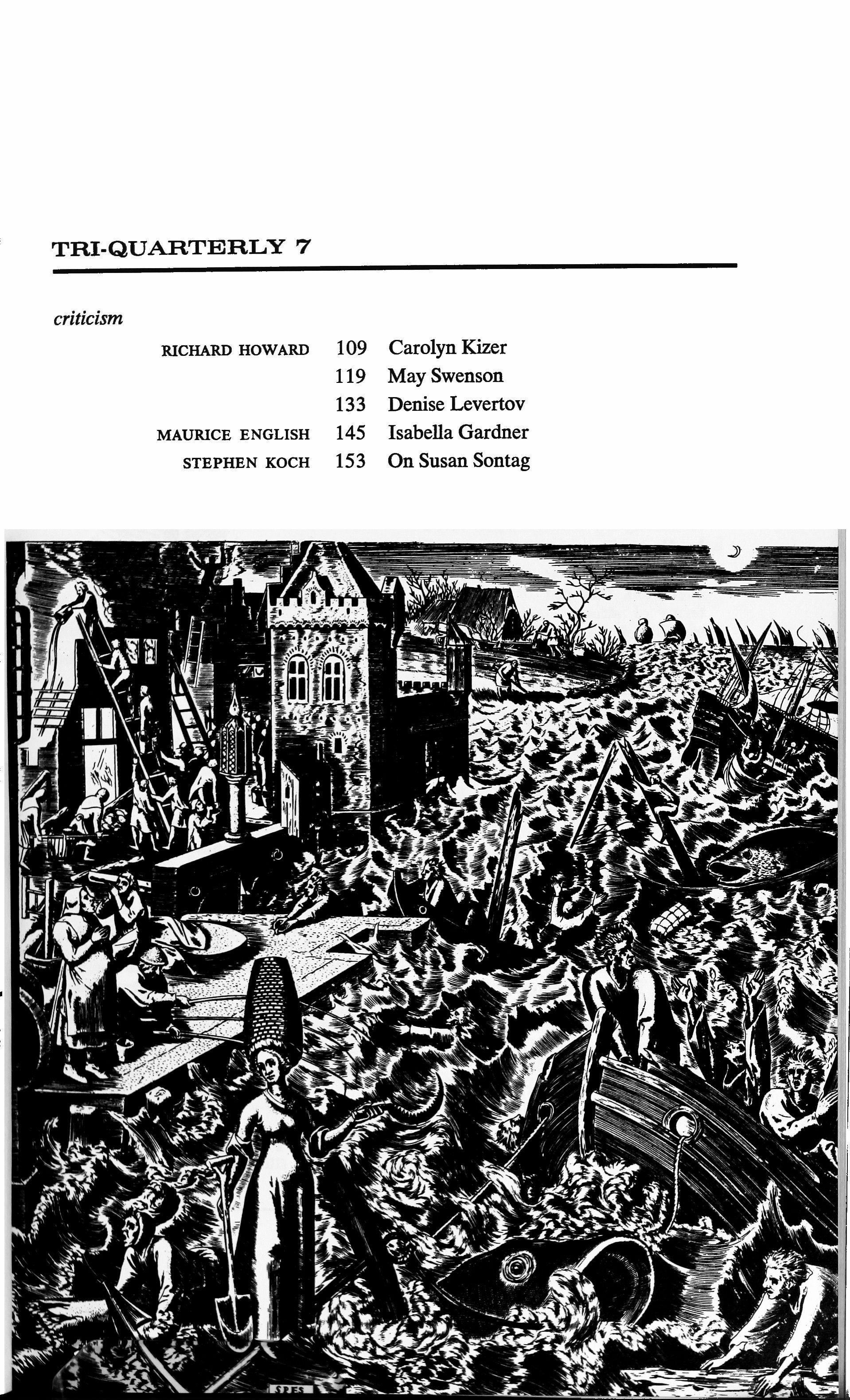
MAURICE ENGLISH
Even though the Elizabethan period was the greatest in English stage history, its documentary records of authorship are often fragmentary, contradictory, or erroneous. This study, an essay in literary history and method, attempts to deal with the problem. S. Schoenbaum is Professor of English at Northwestern University.
288 pp. $7.50
Lawrence's novels abound with characters that can be defined in terms of strong "male" and "female" principles. The author divides the novels into periods based on these principles, and in so doing defines and explains Lawrence's artistic and psychological development. H. M. Daleski teaches English at the Hebrew University in Jerusalem.
400 pp. $9.00
edited
by Jack P. Dalton and Clive HartThis volume of essays was prepared especially to commemorate the 25th anniversary of Finnegans Wake. The contributors, all prominent Joyceans, include Budgen, Colum, Hoffman, Mercier, Senn, Atherton, Morse, Halper, Kain, Litz, Hayman, and Dalton.
142 pp. $5.50
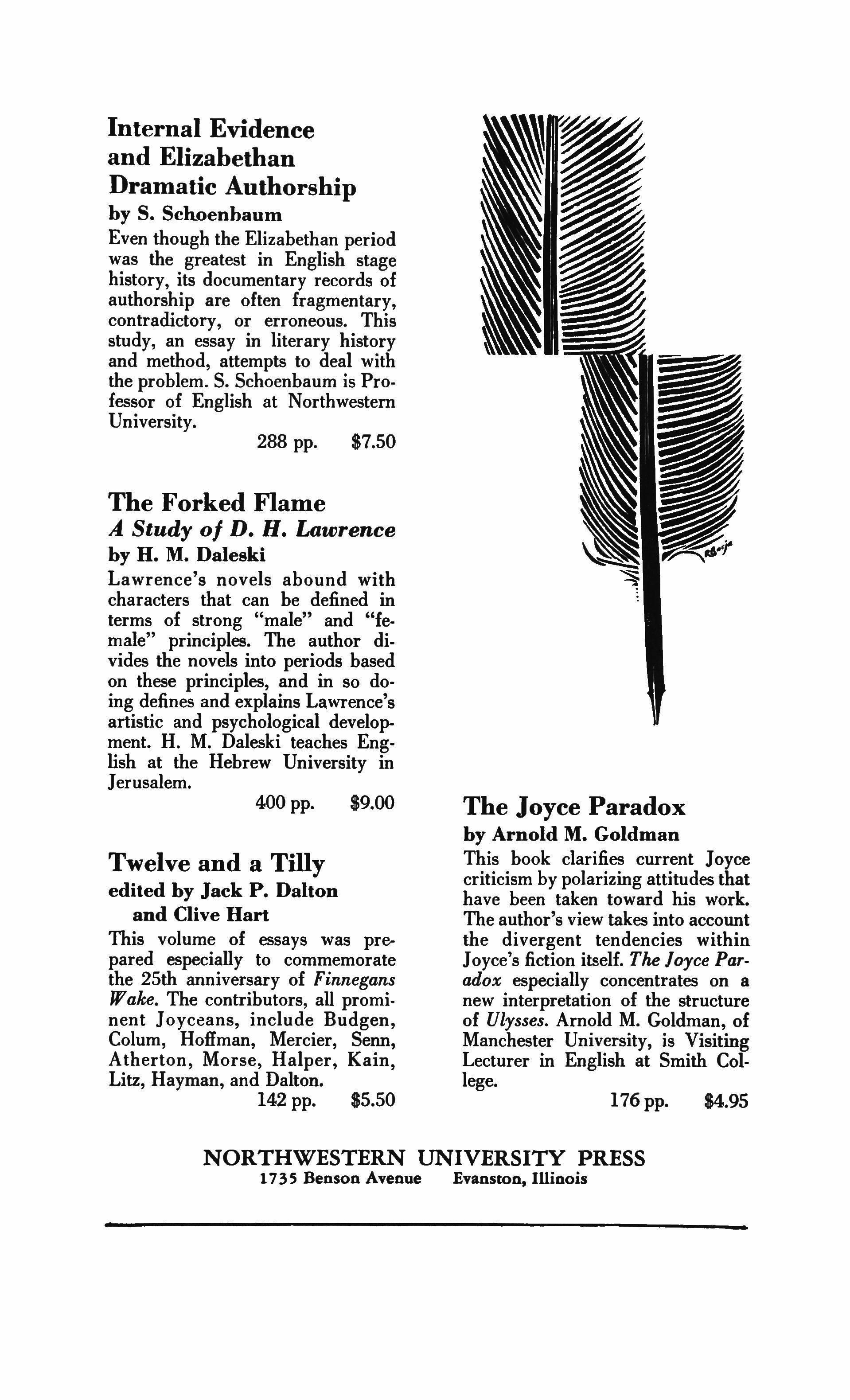
This book clarifies current Joyce criticism by polarizing attitudes that have been taken toward his work. The author's view takes into account the divergent tendencies within Joyce's fiction itself. The Joyce Paradox especially concentrates on a new interpretation of the structure of Ulysses. Arnold M. Goldman, of Manchester University, is Visiting Lecturer in English at Smith College.
176 pp. $4.95
NORTHWESTERN UNIVERSITY PRESS 1735 Benson Avenue Evanston, Illinois
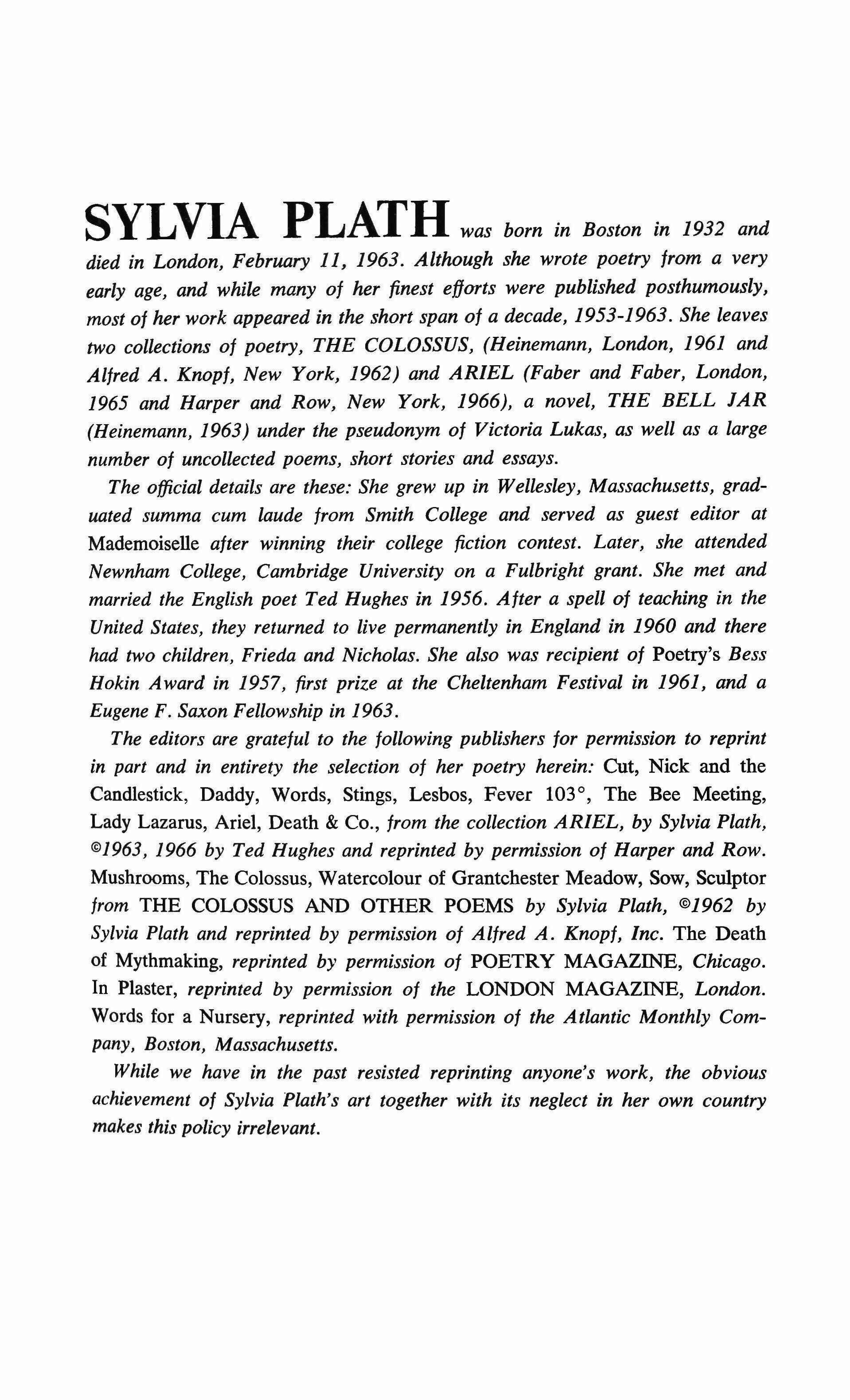
was born in Boston in 1932 and died in London, February 11, 1963. Although she wrote poetry from a very early age, and while many of her finest efforts were published posthumously, most of her work appeared in the short span of a decade, 1953-1963. She leaves two collections of poetry, THE COLOSSUS, (Heinemann, London, 1961 and Alfred A. Knopf, New York, 1962) and ARIEL (Faber and Faber, London, 1965 and Harper and Row, New York, 1966), a novel, THE BELL JAR (Heinemann, 1963) under the pseudonym of Victoria Lukas, as well as a large number of uncollected poems, short stories and essays.
The official details are these: She grew up in Wellesley, Massachusetts, graduated summa cum laude from Smith College and served as guest editor at Mademoiselle after winning their college fiction contest. Later, she attended Newnham College, Cambridge University on a Fulbright grant. She met and married the English poet Ted Hughes in 1956. After a spell of teaching in the United States, they returned to live permanently in England in 1960 and there had two children, Frieda and Nicholas. She also was recipient of Poetry's Bess Hokin Award in 1957, first prize at the Cheltenham Festival in 1961, and a Eugene F. Saxon Fellowship in 1963.
The editors are grateful to the following publishers for permission to reprint in part and in entirety the selection of her poetry herein: Cut, Nick and the Candlestick, Daddy, Words, Stings, Lesbos, Fever 103°, The Bee Meeting, Lady Lazarus, Ariel, Death & Co., from the collection ARIEL, by Sylvia Plath, ©1963, 1966 by Ted Hughes and reprinted by permission of Harper and Row. Mushrooms, The Colossus, Watercolour of Grantchester Meadow, Sow, Sculptor from THE COLOSSUS AND OTHER POEMS by Sylvia Plath, ©1962 by Sylvia Plath and reprinted by permission of Alfred A. Knopf, Inc. The Death of Mythmaking, reprinted by permission of POETRY MAGAZINE, Chicago. In Plaster, reprinted by permission of the LONDON MAGAZINE, London. Words for a Nursery, reprinted with permission of the Atlantic Monthly Company, Boston, Massachusetts.
While we have in the past resisted reprinting anyone's work, the obvious achievement of Sylvia Plath's art together with its neglect in her own country makes this policy irrelevant.


The death of myth-malting
Two virtues ride, by stallion, by nag.
To grind our knives and scissors:
Lantern - jawed Reason, squat Common Sense,
One courting doctors of all sorts
One, housewives and shopkeepers.
The trees are lopped, the poodles trim, The laborer's nails pared level
Since those two civil servants set Their whetstone to the blunted edge And minced the muddling devil
Whose owl-eyes in the scraggly wood
Scared mothers to miscarry
Drove the dogs to cringe and whine
And turned the farmboy's temper wolfish, The housewife's, desultory.
1959
Sow
God knows how our neighbor managed to breed His great sow: Whatever his shrewd secret, he kept it hid
In the same way
He kept the sow-impounded from public stare, Prize ribbon and pig show.
TRI-QUARTERLy

But one dusk our questions commended us to a tour Through his lantern-lit
Maze of barns to the lintel of the sunk sty door
To gape at it:
This was no rose-and-larkspurred china suckling With a penny slot
For thrifty children, nor dolt pig ripe for heckling, About to be Glorified for prime flesh and golden crackling
In a parsley halo;
Nor even one of the common barnyard sows, Mire-smirched, blowzy,
Maunching thistle and knotweed on her snoutcruiseBloat tun of milk
On the move, hedged by a litter of feat-foot ninnies
Shrilling her hulk
To halt for a swig at the pink teats. No. This vast Brobdingnag bulk
Of a sow lounged belly-bedded on that black compost.
Fat-rutted eyes
Dream-filmed. What a vision of ancient hoghood must
Thus wholly engross
The great grandam! - our marvel blazoned a knight, Helmed, in cuirass,
Unhorsed and shredded in the grove of combat
By a grisly-bristled
Boar, fabulous enough to straddle that sow's heat.
TRI-QUARTERLY
But our farmer whistled, Then, with a jocular fist thwacked the barrel nape, And the green-copse-castled
Pig hove, letting legend like dried mud drop, Slowly, grunt On grunt, up in the flickering light to shape
A monument
Prodigious in gluttonies as that hog whose want Made lean Lent
Of kitchen slops and, stomaching no constraint, Proceeded to swill
The seven troughed seas and every eartbquaking continent.
1957
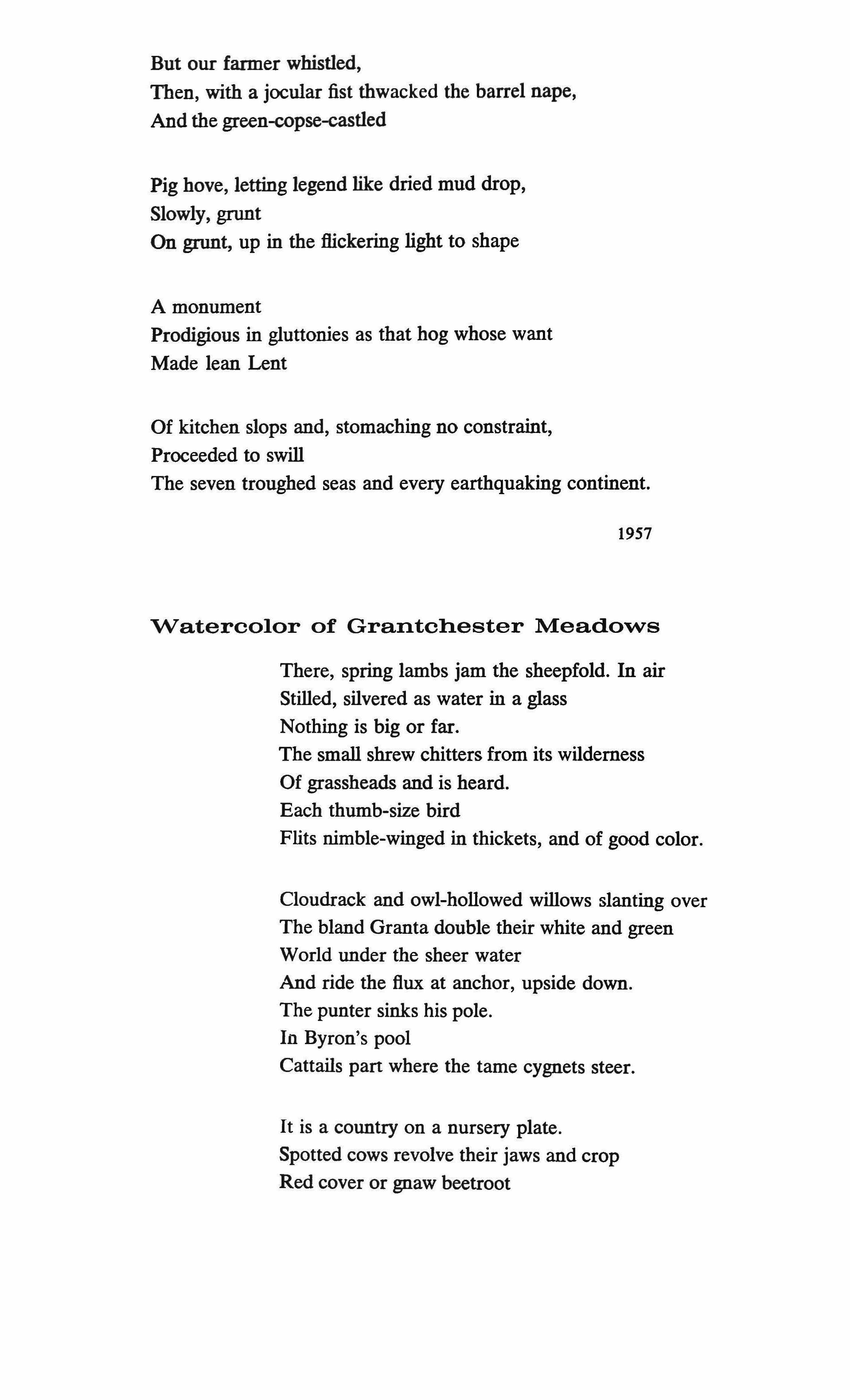
Watercolor of Grantchester Meadows
There, spring lambs jam the sheepfold. In air Stilled, silvered as water in a glass Nothing is big or far.
The small shrew chitters from its wilderness Of grassheads and is heard. Each thumb-size bird Flits nimble-winged in thickets, and of good color.
Cloudrack and owl-hollowed willows slanting over The bland Granta double their white and green World under the sheer water And ride the flux at anchor, upside down. The punter sinks his pole. In Byron's pool Cattails part where the tame cygnets steer.
It is a country on a nursery plate. Spotted cows revolve their jaws and crop Red cover or gnaw beetroot
Bellied on a nimbus of sun-glazed buttercup.
Hedging meadows of benign
Arcadian green
The blood-berried hawthorn hides its spines with white.
Droll, vegetarian, the water rat
Saws down a reed and swims for his limber grove, While the students stroll or sit,
Hands laced, in a moony indolence of love
Black-gowned, but unaware
How in such mild air
The owl shall stoop from his turret, the rat cry out.
1960
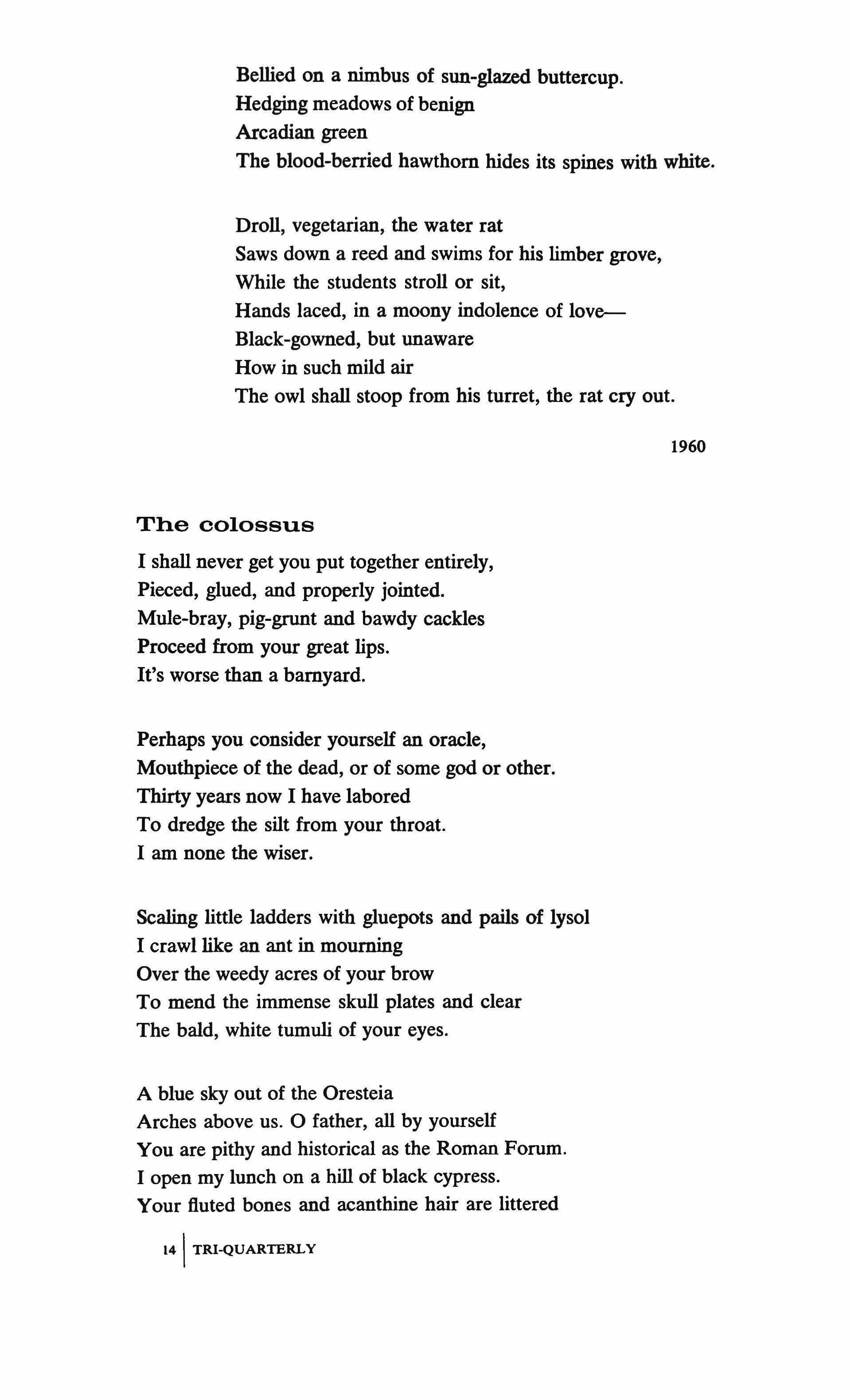
The colossus
I shall never get you put together entirely,
Pieced, glued, and properly jointed.
Mule-bray, pig-grunt and bawdy cackles
Proceed from your great lips.
It's worse than a barnyard.
Perhaps you consider yourself an oracle,
Mouthpiece of the dead, or of some god or other.
Thirty years now I have labored
To dredge the silt from your throat.
I am none the wiser.
Scaling little ladders with gluepots and pails of lysol
I crawl like an ant in mourning
Over the weedy acres of your brow
To mend the immense skull plates and clear
The bald, white tumuli of your eyes.
A blue sky out of the Oresteia
Arches above us. 0 father, all by yourself
You are pithy and historical as the Roman Forum.
I open my lunch on a hill of black cypress.
Your fluted bones and acanthine hair are littered
TRI-QUARTERLY
In their old anarchy to the horizon-line. It would take more than a lightning-stroke
To create such a ruin.
Nights, I squat in the cornucopia Of your left ear, out of the wind,
Counting the red stars and those of plum-color. The sun rises under the pillar of your tongue. My hours are married to shadow. No longer do I listen for the scrape of a keel On the blank stones of the landing.
1960
Overnight, very Whitely, discreetly, Very quietly
Our toes, our noses Take hold on the loam, Acquire the air.
Nobody sees us, Stops us, betrays us; The small grains make room.
Soft fists insist on Heaving the needles, The leafy bedding,
Even the paving. Our hammers, our rams, Earless and eyeless,
Perfectly voiceless, Widen the crannies, Shoulder through holes. We

Diet on water, On crumbs of shadow, Bland-mannered, asking
Little or nothing. So many of us! So many of us!
We are shelves, we are Tables, we are meek, We are edible,
Nudgers and shovers
In spite of ourselves Our kind multiplies:
We shall by morning Inherit the earth.
Our foot's in the door.
1960
(to Leonard Baskin)
To his house the bodiless
Come to barter endlessly
Vision, wisdom, for bodies
Palpable as his, and weighty.
Hands moving move priestlier
Than priests' hands, invoke no vain
Images of light and air
But sure stations in bronze, wood, stone.
Obdurate, in dense-grained wood, A bald angel blocks and shapes
The flimsy light; arms folded
Watches his cumbrous world eclipse

Inane worlds of wind and cloud. Bronze dead dominate the floor, Restive, ruddy-bodied, Dwarfing us. Our bodies flicker
Toward extinction in those eyes
Which, without him, were beggared Of place, time, and their bodies. Emulous spirits make discord,
Try entry, enter nightmares
Until his chisel bequeaths
Them life livlier than ours
A solider repose than death's.
1959
I shall never get out of this! There are two of me now: This new absolutely white person and the old yellow one, She doesn't need food, she is one of the real saints. At the beginning I hated her, she had no personalityShe lay in bed with me like a dead body And I was scared, because she was shaped just the way I was
Only much whiter and unbreakable and with no complaints. I couldn't sleep for a week, she was so cold. I blamed her for everything, but she didn't answer. I couldn't understand her stupid behaviour! When I hit her she held still, like a true pacifist. Then I realized what she wanted was for me to lover her: She began to warm up, and I saw her advantages.
TRI-QUARTERLY

Without me. she wouldn't exist, so of course she was grateful. I gave her a soul, I bloomed out of her as a rose Blooms out of a vase of not very valuable porcelain. And it was I who attracted everybody's attention, Not her whiteness and beauty, as I had at first supposed. I patronized her a little, and she lapped it upYou could tell almost at once she had a slave mentality.
I didn't mind her waiting on me, and she adored it. In the morning she woke me early, reflecting the sun From her amazingly white torso, and I couldn't help but notice Her tidiness and her calmness and her patience: She humoured my weakness like the best of nurses, Holding my bones in place so they would mend properly. In time our relationship grew more intense.
She stopped fitting me closely and seemed offish. I felt her criticizing me in spite of herself, As if my habits offended her in some way. She let in the drafts and became more and more absent-minded. And my skin itched and flacked away in soft pieces Simply because she looked after me so badly. Then I saw what the trouble was: she thought she was immortal.
She wanted to leave me, she thought she was superior, And I'd been keeping her in the dark, and she was resentfulWasting her days waiting her days waiting on a half-corpse! And secretly she began to hope I'd die. Then she could cover my mouth and eyes, cover me entirely, And wear my painted face the way a mummy-case Wears the face of a Pharaoh, though it's made of mud and water.
I wasn't in any position to get rid of her. She's supported me for so long I was quite limpI had forgotten how to walk or sit, So I was careful not to upset her in any way Or brag ahead of time how I'd avenge myself. Living with her was like living with my own coffin: Yet I still depended on her, though I did it regretfully.
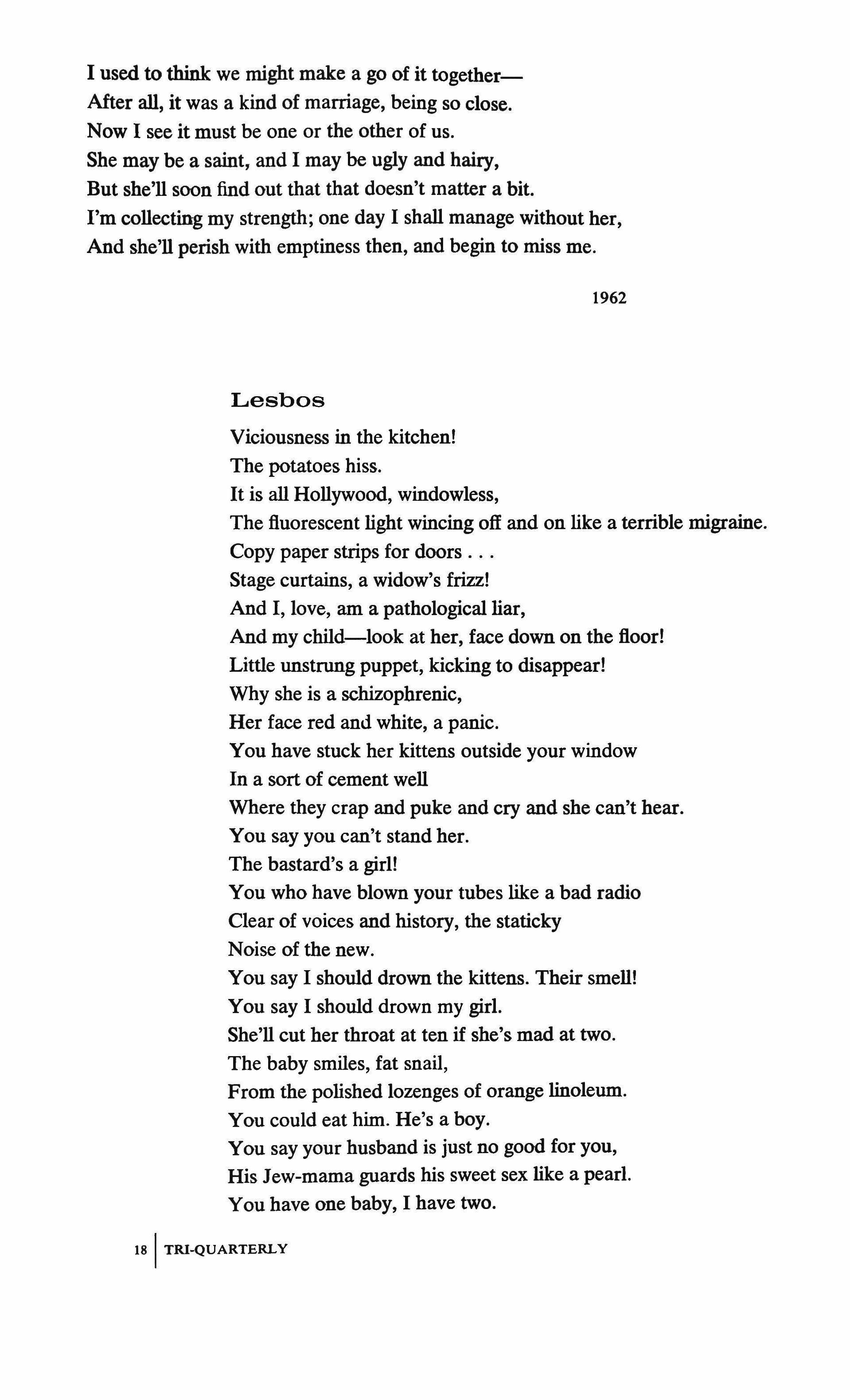
I used to think we might make a go of it together
After all, it was a kind of marriage, being so close. Now I see it must be one or the other of us.
She may be a saint, and I may be ugly and hairy, But she'll soon find out that that doesn't matter a bit.
I'm collecting my strength; one day I shall manage without her, And she'll perish with emptiness then, and begin to miss me.
1962
Viciousness in the kitchen!
The potatoes hiss.
It is all Hollywood, windowless, The fluorescent light wincing off and on like a terrible migraine. Copy paper strips for doors
Stage curtains, a widow's frizz!
And I, love, am a pathological liar
And my child-look at her, face down on the floor!
Little unstrung puppet, kicking to disappear! Why she is a schizophrenic, Her face red and white, a panic.
You have stuck her kittens outside your window In a sort of cement well
Where they crap and puke and cry and she can't hear.
You say you can't stand her.
The bastard's a girl!
You who have blown your tubes like a bad radio Clear of voices and history, the staticky Noise of the new.
You say I should drown the kittens. Their smell!
You say I should drown my girl. She'll cut her throat at ten if she's mad at two.
The baby smiles, fat snail, From the polished lozenges of orange linoleum. You could eat him. He's a boy.
You say your husband is just no good for you, His Jew-mama guards his sweet sex like a pearl. You have one baby, I have two.
TRI-QUARTERLY
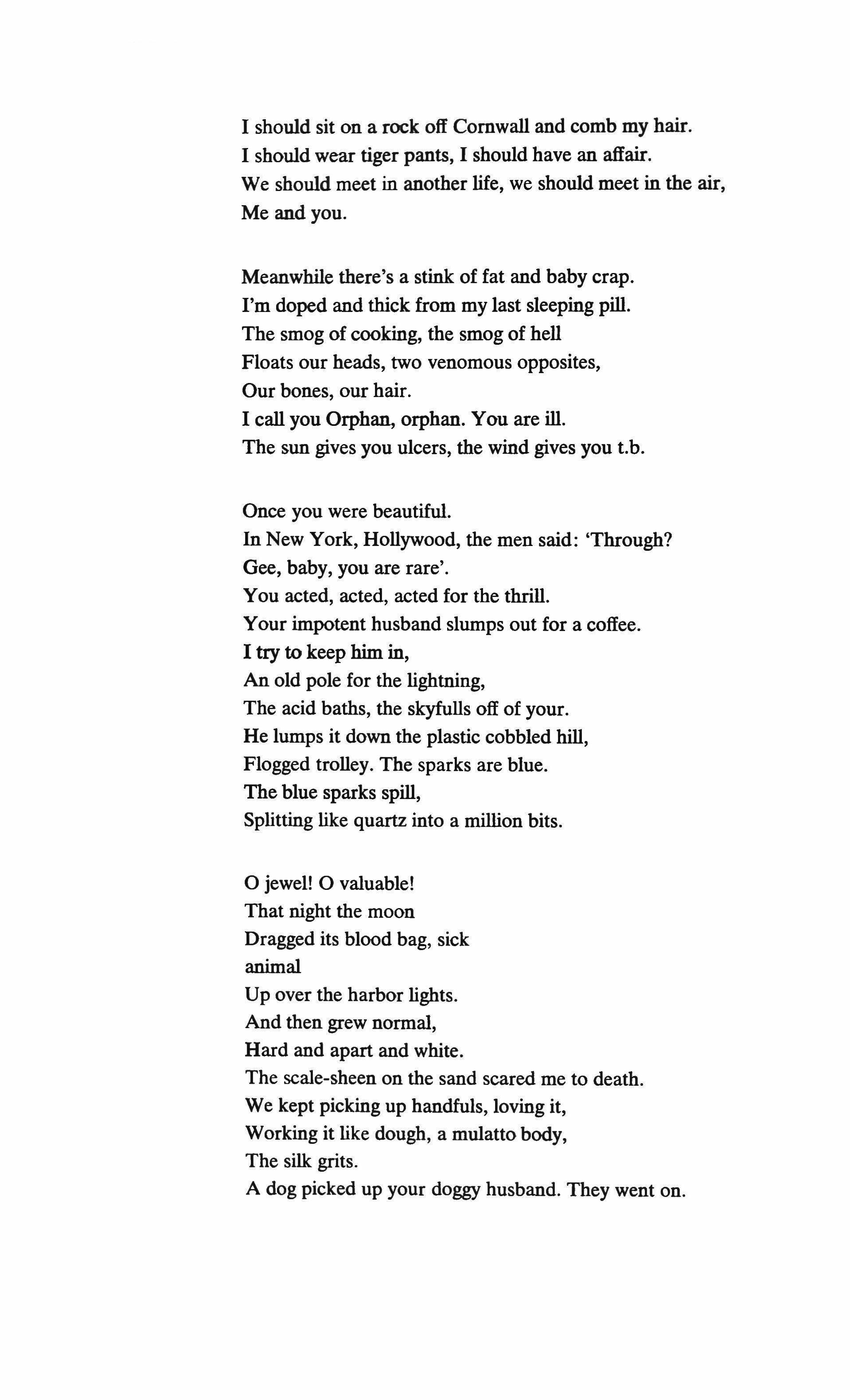
I should sit on a rock off Cornwall and comb my hair. I should wear tiger pants, I should have an affair. We should meet in another life, we should meet in the air, Me and you.
Meanwhile there's a stink of fat and baby crap. I'm doped and thick from my last sleeping pill. The smog of cooking, the smog of hell Floats our heads, two venomous opposites, Our bones, our hair.
I call you Orphan, orphan. You are ill. The sun gives you ulcers, the wind gives you t.b.
Once you were beautiful. In New York, Hollywood, the men said: 'Through? Gee, baby, you are rare'.
You acted, acted, acted for the thrill. Your impotent husband slumps out for a coffee. I try to keep him in, An old pole for the lightning, The acid baths, the skyfulls off of your. He lumps it down the plastic cobbled hill, Flogged trolley. The sparks are blue. The blue sparks spill, Splitting like quartz into a million bits.
o jewel! 0 valuable! That night the moon Dragged its blood bag, sick animal
Up over the harbor lights. And then grew normal, Hard and apart and white.
The scale-sheen on the sand scared me to death.
We kept picking up handfuls, loving it, Working it like dough, a mulatto body, The silk grits.
A dog picked up your doggy husband. They went on.
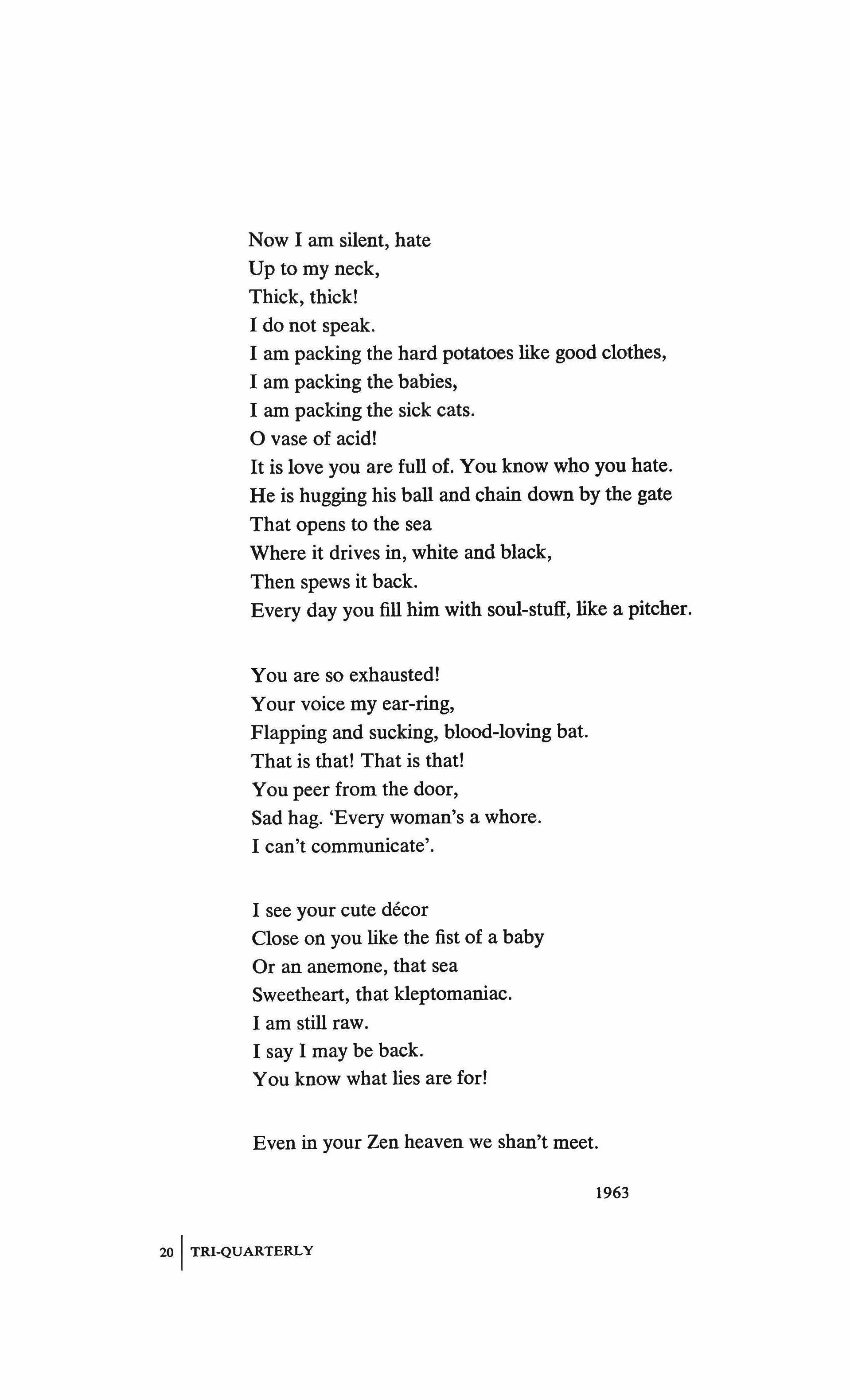
Now I am silent, hate Up to my neck, Thick, thick!
I do not speak.
I am packing the hard potatoes like good clothes, I am packing the babies, I am packing the sick cats.
o vase of acid!
It is love you are full of. You know who you hate. He is hugging his ball and chain down by the gate That opens to the sea Where it drives in, white and black, Then spews it back.
Every day you fill him with soul-stuff, like a pitcher.
You are so exhausted! Your voice my ear-ring, Flapping and sucking, blood-loving bat. That is that! That is that!
You peer from the door, Sad hag. 'Every woman's a whore. I can't communicate'.
I see your cute decor
Close on you like the fist of a baby Or an anemone, that sea Sweetheart, that kleptomaniac.
I am still raw.
I say I may be back. You know what lies are for!
Even in your Zen heaven we shan't meet.
1963

Words for a nursery
Rosebud, knot of worms, Heir of the first five
Shapers, I open:
Five moony crescents
For eyes to light me
Toward what I can grasp,
Milk-spout, big finger
So many ladders
Giving a leg up
To these limber hooks.
I learn, good circus
Dog that I am, how
To move, serve, steer food, Index the arrow, Thumbhead, blunt helper.
My master's fetcher, Whipper of itches, No pocket dozer, I shut on the key
Of this blue-green toy.
Five-antlered, branching
Touchy antenna, I nose out the lay
Of thistle and silk, Cold pole and hot plate.
Old historian, My page this desert
Crossed by three causeways, Leathery, treeless, With five whorled landspits.
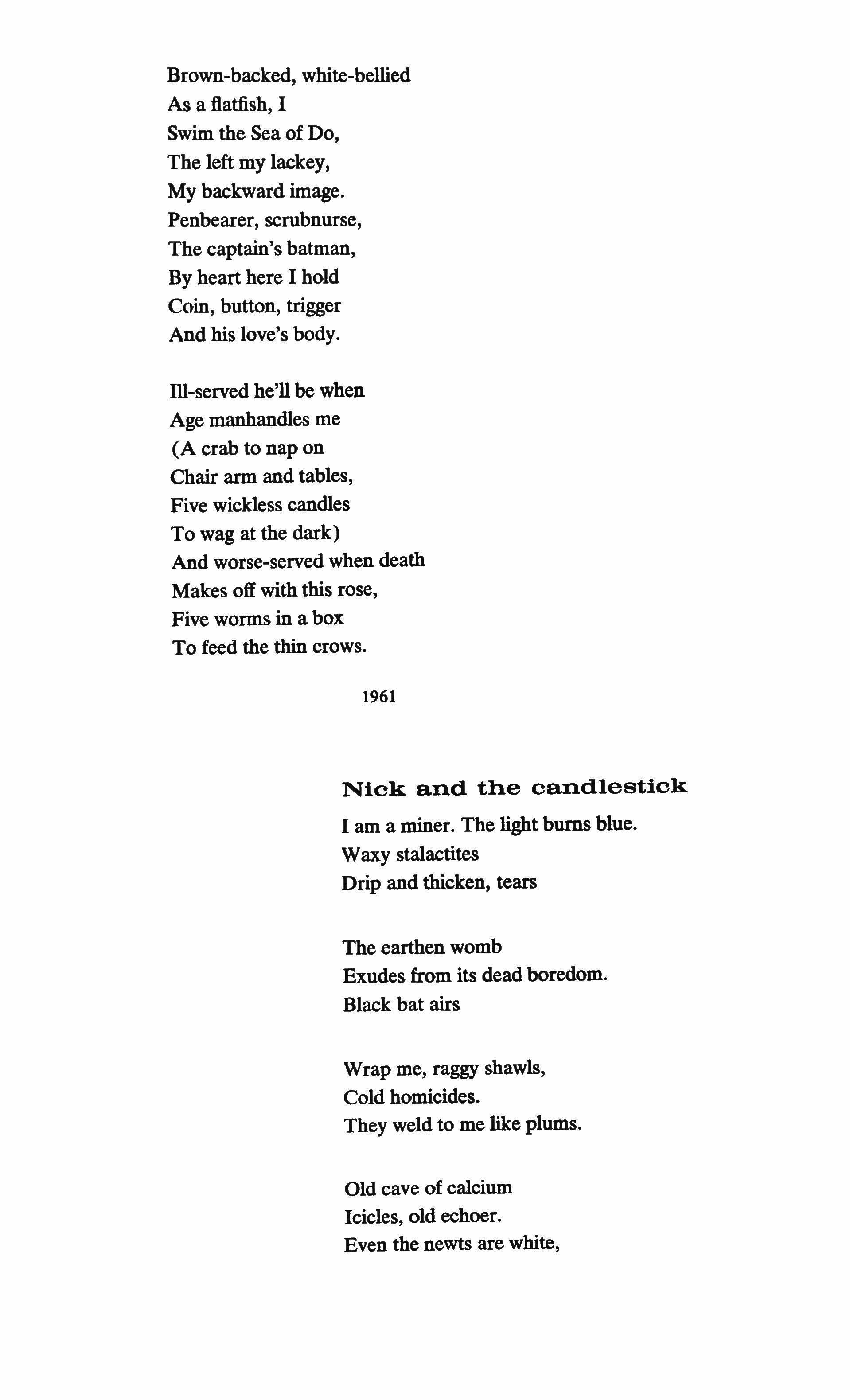
Brown-backed, white-bellied
As a flatfish, I Swim the Sea of Do, The left my lackey, My backward image. Penbearer, scrubnurse, The captain's batman, By heart here I hold Coin, button, trigger And his love's body.
Ill-served he'll be when Age manhandles me (A crab to nap on Chair arm and tables, Five wickless candles To wag at the dark) And worse-served when death Makes off with this rose, Five worms in a box
To feed the thin crows.
1961 Nick and the candlestick
I am a miner. The light bums blue. Waxy stalactites Drip and thicken, tears
The earthen womb
Exudes from its dead boredom. Black bat airs
Wrap me, raggy shawls, Cold homicides. They weld to me like plums.
Old cave of calcium Icicles, old echoer. Even the newts are white,
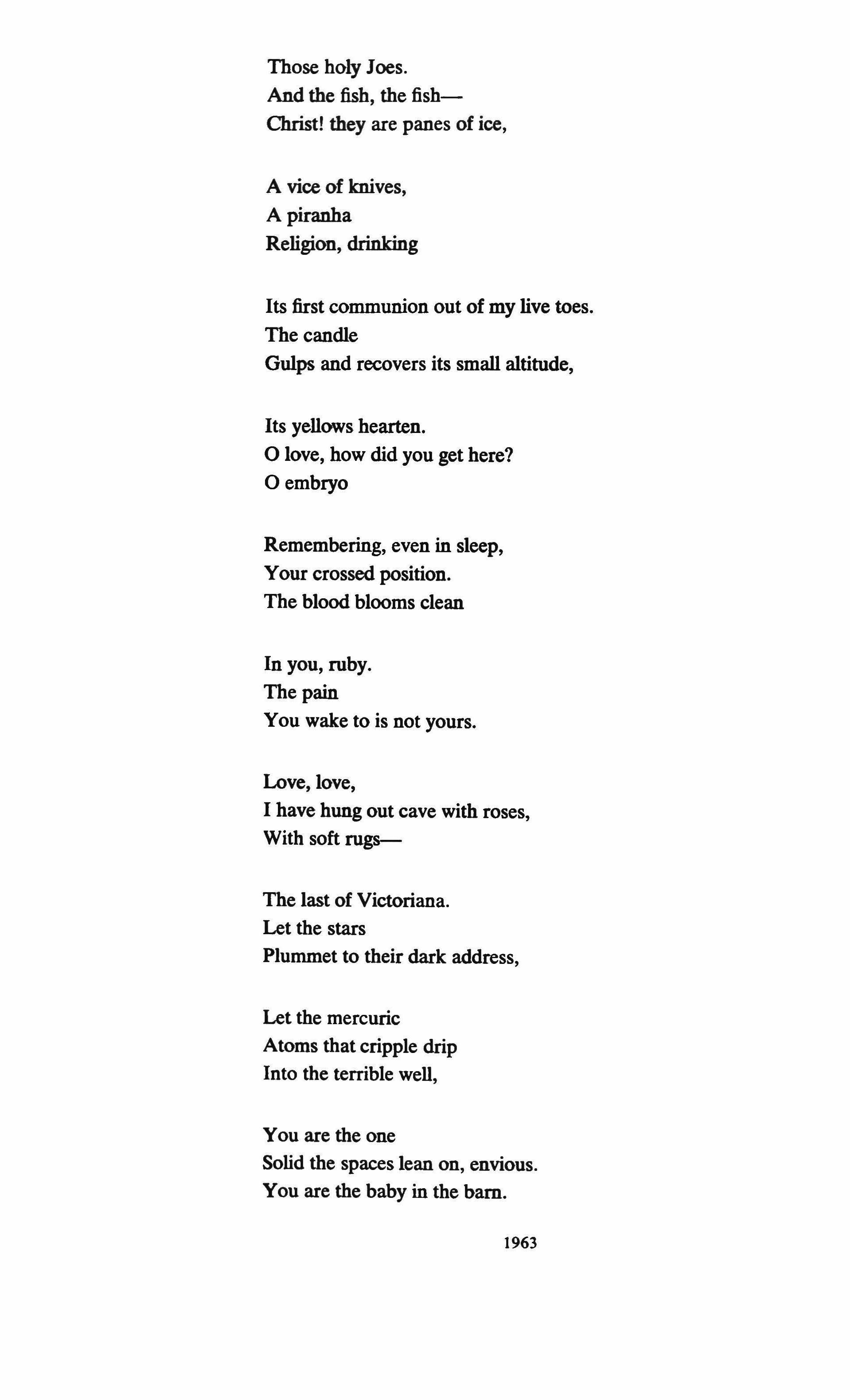
Those holy Joes. And the fish, the fishChrist! they are panes of ice,
A vice of knives, A piranha Religion, drinking
Its first communion out of my live toes. The candle Gulps and recovers its small altitude, Its yellows hearten. o love, how did you get here? o embryo
Remembering, even in sleep, Your crossed position. The blood blooms clean
In you, ruby. The pain You wake to is not yours.
Love, love, I have hung out cave with roses, With soft rugs-
The last of Victoriana. Let the stars Plummet to their dark address,
Let the mercuric Atoms that cripple drip Into the terrible well,
You are the one Solid the spaces lean on, envious. You are the baby in the barn.
1963
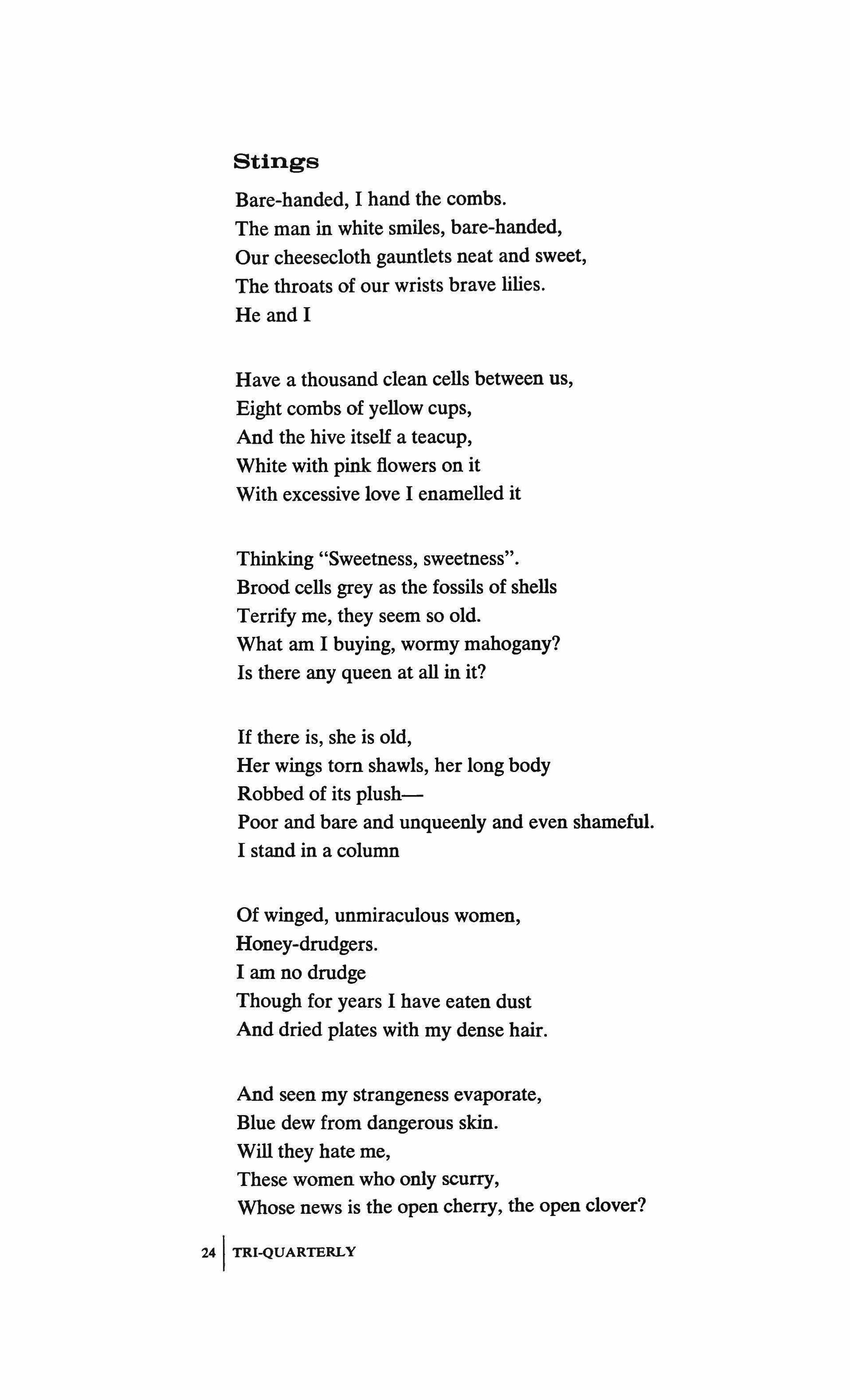
Bare-handed, I hand the combs. The man in white smiles, bare-handed, Our cheesecloth gauntlets neat and sweet, The throats of our wrists brave lilies. He and I
Have a thousand clean cells between us, Eight combs of yellow cups, And the hive itself a teacup, White with pink flowers on it With excessive love I enamelled it
Thinking "Sweetness, sweetness".
Brood cells grey as the fossils of shells
Terrify me, they seem so old. What am I buying, wormy mahogany? Is there any queen at all in it?
If there is, she is old, Her wings tom shawls, her long body Robbed of its plush-
Poor and bare and unqueenly and even shameful. I stand in a column
Of winged, unmiraculous women, Honey-drudgers.
I am no drudge
Though for years I have eaten dust And dried plates with my dense hair.
And seen my strangeness evaporate, Blue dew from dangerous skin. Will they hate me, These women who only scurry, Whose news is the open cherry, the open clover?
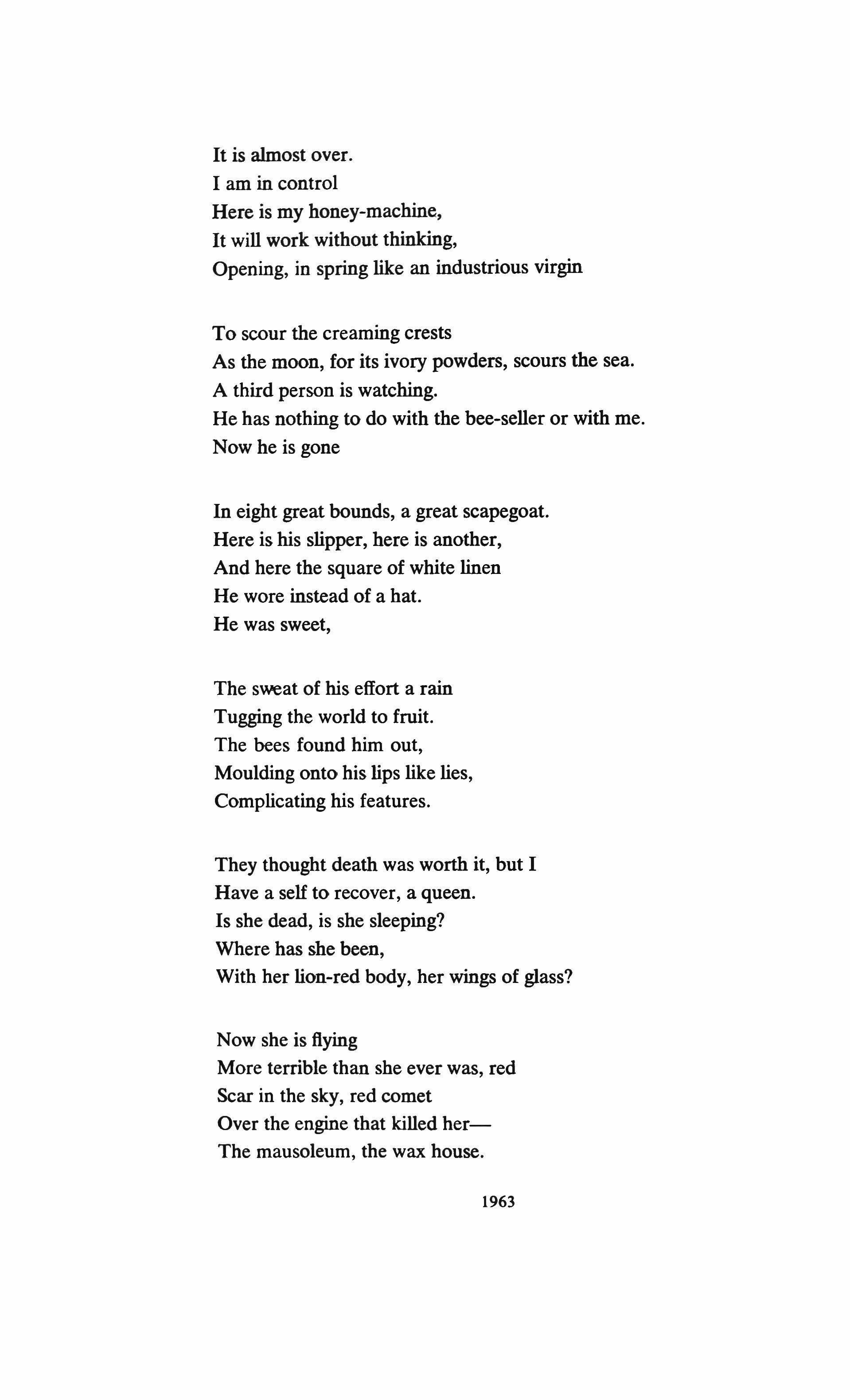
It is almost over.
I am in control
Here is my honey-machine, It will work without thinking, Opening, in spring like an industrious virgin
To scour the creaming crests
As the moon, for its ivory powders, scours the sea. A third person is watching. He has nothing to do with the bee-seller or with me. Now he is gone
In eight great bounds, a great scapegoat. Here is his slipper, here is another, And here the square of white linen
He wore instead of a hat.
He was sweet,
The sweat of his effort a rain Tugging the world to fruit.
The bees found him out, Moulding onto his lips like lies, Complicating his features.
They thought death was worth it, but I Have a self to recover, a queen. Is she dead, is she sleeping? Where has she been, With her lion-red body, her wings of glass?
Now she is flying
More terrible than she ever was, red Scar in the sky, red comet
Over the engine that killed herThe mausoleum, the wax house.
1963

Pure? What does it mean? The tongues of hell Are dull, dull as the triple
Tongues of dull, fat Cerberus Who wheezes at the gate. Incapable Of licking clean
The aguey tendon, the sin, the sin. The tinder cries. The indelible smell
Of a snuffed candle!
Love, love, the low smokes roll
From me like Isadora's scarves, I'm in a fright
One scad will catch and anchor in the wheel. Such yellow sullen smokes Make their own element. They will not rise,
But trundle round the globe
Choking the aged and the meek, The weak
Hothouse baby in its crib, The ghastly orchid Hanging its hanging garden in the air,
Devilish leopard!
Radiation turned it white And killed it in an hour.
Greasing the bodies ot adulterers
Like Hiroshima ash and eating in. The sin. The sin.
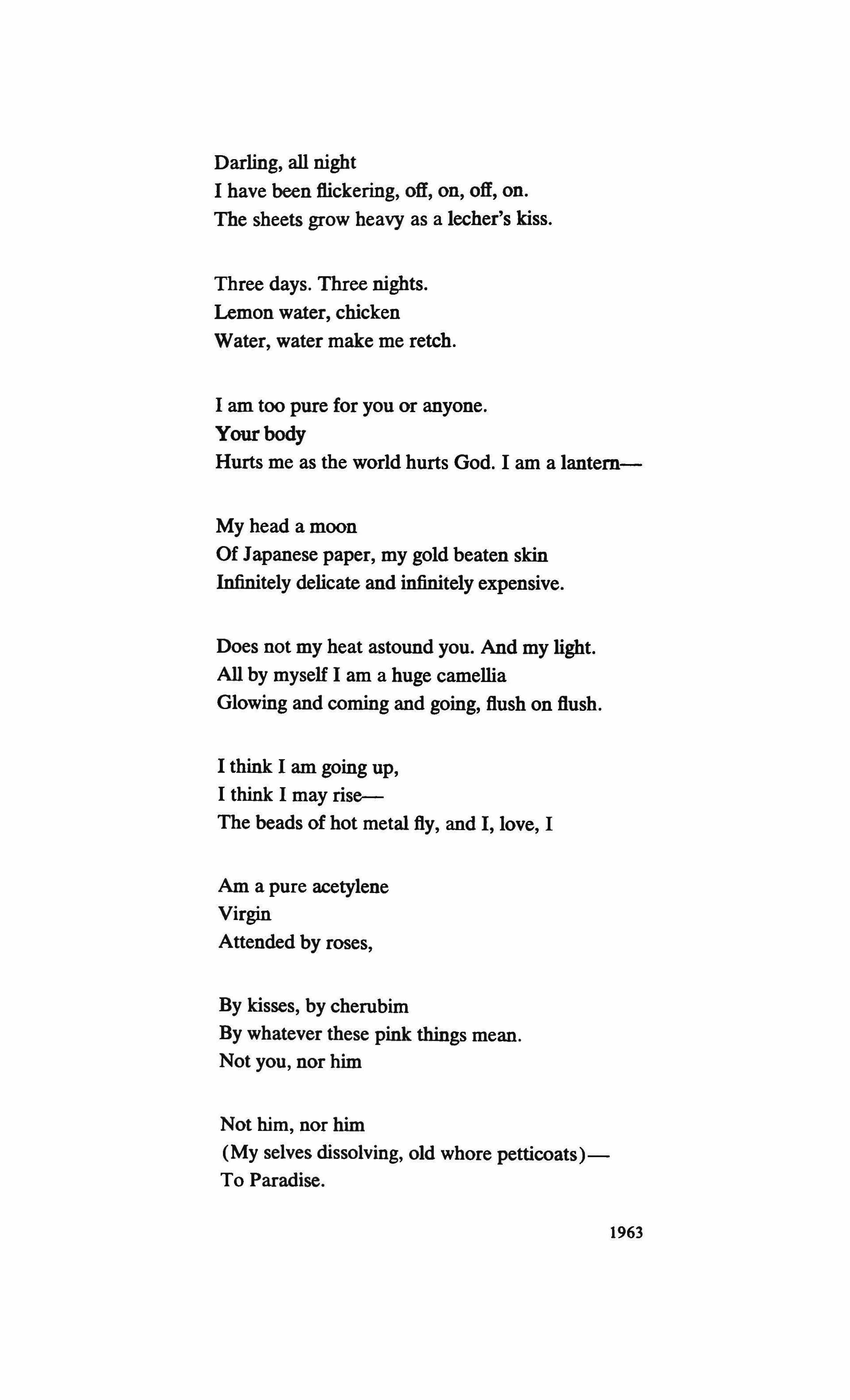
Darling, all night
I have been flickering, off, on, off, on. The sheets grow heavy as a lecher's kiss.
Three days. Three nights. Lemon water, chicken Water, water make me retch.
I am too pure for you or anyone. Your body Hurts me as the world hurts God. I am a lantem-
My head a moon
Of Japanese paper, my gold beaten skin Infinitely delicate and infinitely expensive.
Does not my heat astound you. And my light. All by myself I am a huge camellia Glowing and coming and going, flush on flush.
I think I am going up, I think I may rise-The beads of hot metal fly, and I, love, I
Am a pure acetylene Virgin Attended by roses,
By kisses, by cherubim
By whatever these pink things mean. Not you, nor him
Not him, nor him (My selves dissolving, old whore petticoats)To Paradise.
1963

Cut For Susan O'Neill Roe
What a thrillMy thumb instead of an onion. The top quite gone Except for a sort of a hinge
Of skin,
A flap like a hat, Dead white.
Then that red plush.
Little pilgrim, The Indian's axed your scalp. Your turkey wattle Carpet rolls
Straight from the heart. I step on it, Clutching my bottle Of pink fizz.
A celebration, this is. Out of a gap
A million soldiers run, Redcoats, every one.
Whose side are they on?
Omy Homunculus, I am ill. I have taken a pill to kill
The thin Papery feeling. Saboteur, Kamikaze man-
The stain on your Gauze Ku Klux Klan
Babushka
Darkens and tarnishes and when
The balled Pulp of your heart
Confronts its small Mill of silence
How you jump--
Trepanned veteran, Dirty girl, Thumb stump.

1963
The bee meeting
Who are these people at the bridge to meet me? They are the villagers-The rector, the midwife, the sexton, the agent for bees.
In my sleeveless summery dress I have no protection, And they are all gloved and covered, why did nobody tell me? They are smiling and taking out veils tacked to ancient hats.
I am nude as a chicken neck, does nobody love me?
Yes, here is the secretary of bees with her white shop smock, Buttoning the cuffs at my wrists and the slit from my neck to my knees. Now I am milkweed silk, the bees will not notice. They will not smell my fear, my fear, my fear.
Which is the rector now, is it that man in black?
Which is the midwife, is that her blue coat?
Everybody is nodding a square black head, they are knights in visors, Breastplates of cheesecloth knotted under the armpits. Their smiles and their voices are changing. I am led through a beanfield.

Strips of tinfoil winking like people,
Feather dusters fanning their hands in a sea of bean flowers, Creamy bean flowers with black eyes and leaves like bored hearts.
Is it blood dots the tendrils are dragging up that string?
No, no, it is scarlet flowers that will one day be edible.
Now they are giving me a fashionable white straw Italian hat
And a black veil that moulds to my face, they are making me one of them.
They are leading me to the shorn glove, the circle of hives.
Is it the hawthorn that smells so sick?
The barren body of hawthorn, etherizing its children.
Is it some operation that is taking place?
Is it the surgeon my neighbours are waiting for,
This apparition in a green helmet, Shining gloves and white suit.
Is it the butcher, the grocer, the postman, someone I know?
I cannot run, I am rooted, and the gorse hurts me With its yellow purses, its spiky armoury. I could not run without having to run forever.
The white hive is snug as a virgin, Sealing off her brood cells, her honey, and quietly humming.
Smoke rolls and scarves in the grove.
The mind of the hive thinks this is the end of everything. Here they come, the outriders, on their hysterical elastics.
If I stand very still, they will think I am cow parsley, A gullible head untouched by their animosity,
Not even nodding, a personage in a hedgerow.
The villagers open the chambers, they are hunting the queen. Is she hiding, is she eating honey? She is very clever.
She is old, old, old, she must live another year, and she knows it.
While in their fingerjoint cells the new virgins
Dream of a duel they will win inevitably, A curtain of wax dividing them from the bride Bight. The upftight of the murderess into a heaven that loves her. The villagers are moving the virgins, there will be no killing. The old queen does not show herself, is she so ungrateful?
I am exhausted, I am exhaustedPillar of white in a blackout of knives. I am the magician's girl who does not flinch. The villagers are untying their disguises, they are shaking hands. Whose is that long white box in the grove, what have they accomplished, why am I cold.
1963

Death & Co.
Two, of course there are two. It seems perfectly natural now-
The one who never looks up, whose eyes are lidded And balled, like Blake's, Who exhibits
The birthmarks that are his trademarkThe scald scar of water, The nude Verdigris of the condor. I am red meat. His beak
Claps sidewise: I am not his yet. He tells me how badly I photograph. He tells me how sweet
The babies look in their hospital Icebox, a simple
Frill at the neck, Then the flutings of their Ionian Death-gowns, Then two little feet. He does not smile or smoke.
The other does that, His hair long and plausive. Bastard
Masturbating aglitter, He wants to be loved.
I do not stir.
The frost makes a flower, The dewmakes a star, The dead bell, The dead bell.
Somebody's done for.

1963
Daddy
You do not do, you do not do
Any more, black shoe
In which I have lived like a foot
For thirty years, poor and white, Barely daring to breathe or Achoo.
Daddy, I have had to kill you. You died before I had time-Marble-heavy, a bag full of God, Ghastly statue with one grey toe
Big as a Frisco seal
And a head in the freakish Atlantic
Where it pours bean green over blue
In the waters off beautiful Nauset.
I used to pray to recover you. Ach, duo
In the German tongue, in the Polish town Scraped flat by the roller Of wars, wars, wars.
But the name of the town is common.
My Polack friend

Says there are a dozen or two.
So I never could tell where you Put your foot, your root, I never could talk to you. The tongue stuck in my jaw.
It stuck in a barb wire snare.
Ich, ich, ich, ich I could hardly speak.
I thought every German was you. And the language obscene
An engine, an engine
Chuffing me off like a Jew.
A Jew to Dachau, Auschwitz, Belsen. I began to talk like a Jew. I think I may well be a Jew.
The snows of the Tyrol, the clear beer of Vienna Are not very pure or true.
With my gypsy ancestress and my wierd luck
And my Taroc pack and my Taroc pack I may be a bit of a Jew.
I have always been scared of you, With your Luftwaffe, your gobbledygoo. And your neat moustache
And your Aryan eye, bright blue. Panzer-man, panzer-man, 0 You-
Not God but a swastika
So black no sky could squeak through. Every woman adores a Fascist, The boot in the face, the brute
Brute heart of a brute like you.

You stand at the blackboard, daddy, In the picture I have of you, A cleft in your chin instead of your foot But no less a devil for that, no not Any less the black man who
Bit my pretty red heart in two. I was ten when they buried you. At twenty I tried to die And get back, back, back to you. I thought even the bones would do.
But they pulled me out of the sack, And they stuck me together with glue. And then I knew what to do. I made a model of you
A man in black with a Meinkampf look
And a love of the rack and the screw. And I said I do, I do.
So daddy, I'm finally through. The black telephone's off at the root, The voices just can't worm through.
If I've killed one man, I've killed two-The vampire who said he was you And drank my blood for a year, Seven years, if you want to know. Daddy, you can lie back now.
There's a stake in your fat black heart And the villagers never liked you. They are dancing and stamping on you. They always knew it was you. Daddy, daddy, you bastard, I'm through. 1963

I have done it again. One year in every ten I manage it-
A sort of walking miracle, my skin Bright as a Nazi lampshade, My right foot
A paperweight, My face a featureless, fine Jew linen.
Peel off the napkin Omyenemy. Do I terrify?-
The nose, the eye pits, the full set of teeth? The sour breath Will vanish in a day.
Soon, soon the flesh
The grave cave ate will be At home on me
And I a smiling woman. I am only thirty. And like the cat I have nine times to die.
This is Number Three. What a trash To annihilate each decade.
What a million filaments. The peanut-crunching crowd Shoves in to see

Them unwrap me hand and footThe big strip tease. Gentlemen, ladies
These are my hands My knees. I may be skin and bone,
Nevertheless, I am the same, identical woman. The first time it happened I was ten. It was an accident.
The second time I meant To last it out and not come back at all. I rocked shut
As a seashell. They had to call and call And pick the worms off me like sticky pearls.
Dying
Is an art, like everything else. I do it exceptionally well.
I do it so it feels like hell. I do it so it feels real.
I guess you could say I've a call.
It's easy enough to do it in a cell. It's easy enough to do it and stay put. It's the theatrical
Comeback in broad day
To the same place, the same face, the same brute Amused shout:
'A miracle!'
That knocks me out. There is a charge
For the eyeing of my scars, there is a charge For the hearing of my heartIt really goes.
And there is a charge, a very large charge For a word or a touch Or a bit of blood
Or a piece of my hair or my clothes. So, so, Herr Doktor. So, Herr Enemy.
I am your opus, I am your valuable, The pure gold baby
That melts to a shriek. I tum and bum.
Do not think I underestimate your great concern.
Ash, ashYou poke and stir. Flesh, bone, there is nothing there-
A cake of soap, A wedding ring, A gold filling.
Herr God, Herr Lucifer Beware Beware. Out of the ash I rise with my red hair And I eat men like air.
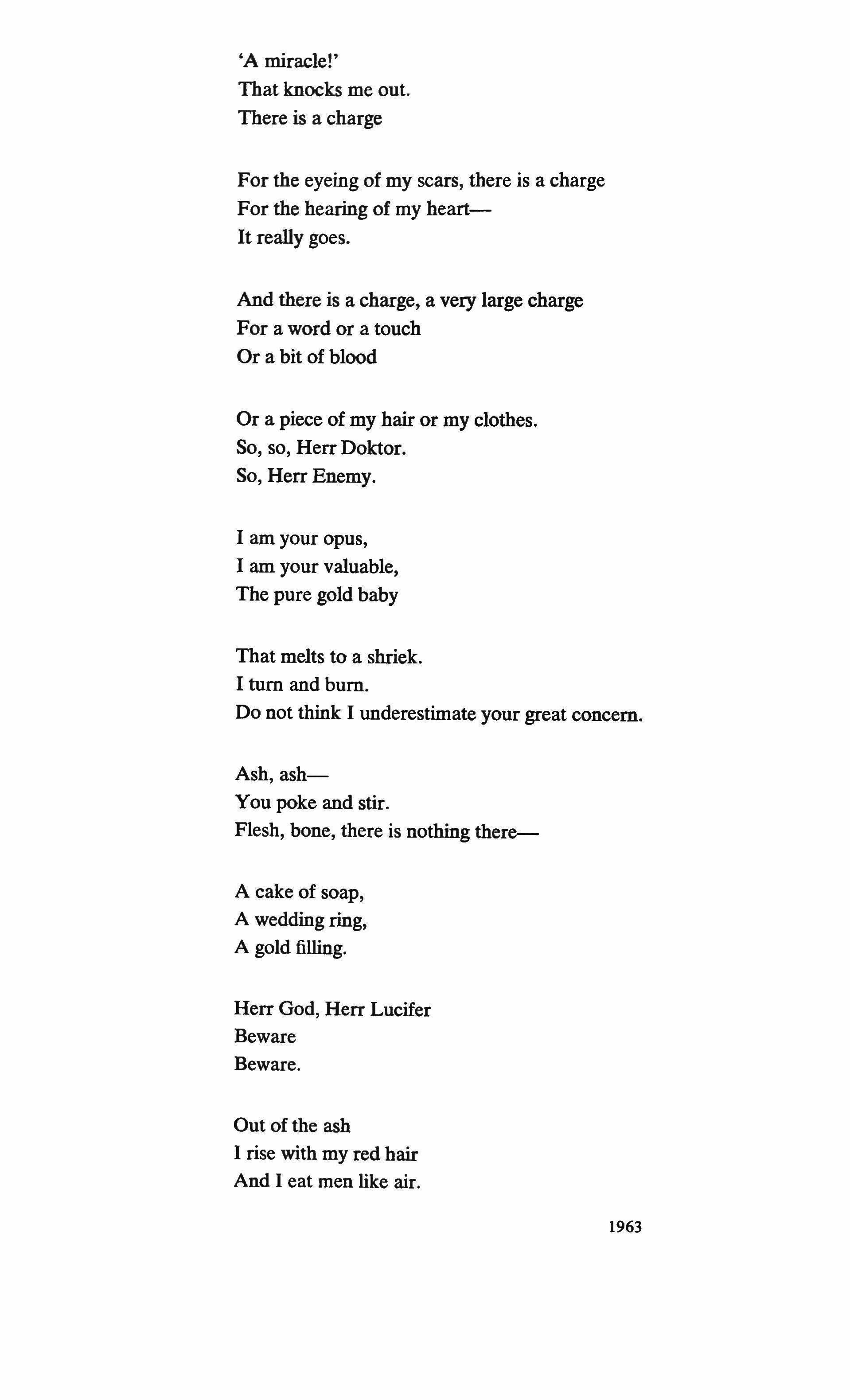
1963

Words
Axes
After whose stroke the wood rings, And the echoes!
Echoes travelling Off from the centre like horses.
The sap
Wells like tears, like the Water striving
To re-establish its mirror Over the rock
That drops and turns, A white skull, Eaten by weedy greens. Years later I Encounter them on the road-
Words dry and riderless, The indefatigable hoof-taps. While
From the bottom of the pool, fixed stars Govern a life.
1963
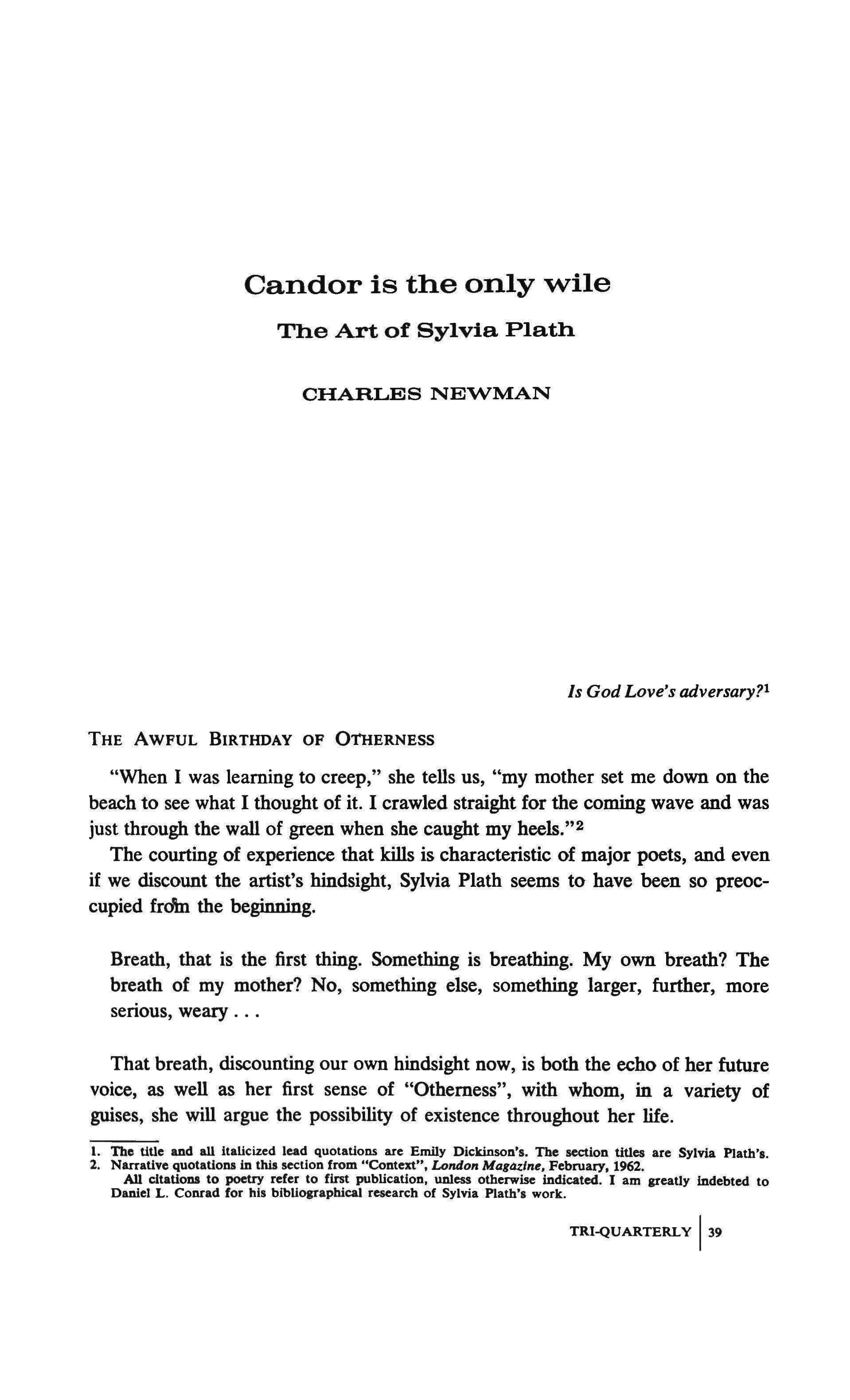
Is God Love's adversarvt!
"When I was learning to creep," she tells us, "my mother set me down on the beach to see what I thought of it. I crawled straight for the coming wave and was just through the wall of green when she caught my heels."2
The courting of experience that kills is characteristic of major poets, and even if we discount the artist's hindsight, Sylvia Plath seems to have been so preoccupied from the beginning.
Breath, that is the first thing. Something is breathing. My own breath? The breath of my mother? No, something else, something larger, further, more serious, weary
That breath, discounting our own hindsight now, is both the echo of her future voice, as well as her first sense of "Otherness", with whom, in a variety of guises, she will argue the possibility of existence throughout her life.
1. The title and all italicized lead quotations arc Emily Dickinson's. The section titles are Sylvia Plath's. 2. Narratlyc quotatiollS ill this section from "Context", London MagllZlne, February, 1962. All cltatioDl to poetry refer to first publication, unless otherwise iIldlcated. I am greatly iIldebted to Dantel L. Coarad for his bibliographlc:al research of Sylvia Plath's work.
TRI-QUARTERLy 139

It is her mother, who perhaps inadvertently, gives first shape to that breatheven if it is only through reading Matthew Arnold aloud-
Where the sea snakes coil and twine
Dry their mail and bash in the brine
and, by suggesting through language that the sea can be captured by its imitation, provides her daughter with a "new way of being happy." The child responds by coding the sea for herself-not with bashing snakes albeit-but her grandmother's phone number, OCEAN 1212-W.3 And with the typical good sense of the modem poet, she reverses Arnold's poetics and endows the sea with the characteristics of her own mind.
I think the sea swallowed dozens of teasets-tossed in abandon off liners, or consigned to the tides by jilted brides. I collected a shiver of china bits, with borders of larkspur and birds or braids of daisies. No two patterns ever matched.
Yet that sea will become finally responsive to her own conjuring, as in one of the last poems.
In a pit of rock
The sea sucks obsessively, One hollow the whole sea's pivot. 4
On the occasion of the birth of her brother, her first rival, her second sense of "Otherness," the sea provides a sign-an antidote to the loss of her specialness.
I flung the starfish against the stone. Let it perish. It had no wit but a piece of the sea might any minute pitch at my feet a sign out of the pulp of kelp, still shining with a wet, fresh smell, reached a small brown hand what it was was a monkey. Not a real monkey; but a monkey of wood. Heavy with the water that it swallowed, and scarred with tar, it crouched on its pedestal, remote and holy, long muzzled and oddly foreign. I brushed it and admired its delicately carved hair. It looked like no monkey I had ever seen eating peanuts and mooney-foolish. It had the noble pose of a simian thinker. I realize now that the totem I so lovingly undid from its caul of kelp was a sacred baboon.
So the sea perceiving my need, conferred a blessing. My baby brother took his place in the house that day, but so did my marvelous and (who knew) even priceless baboon
3. "Ocean 1212-W". The Listener, August 29. 1963.
4. "Contusion", The Observer, February 17. 1963.
40 I TRI-QUARTERLY
The confrontation of "Otherness" requires that imagination become equal to experience. She appropriates the sea by collecting from it a banquet set of seachina; she accepts her brother by resurrecting her own totem of him. All babies come from the same place. There is no division between the world and her willful representation of it. "The state of being in love threatens to obliterate the boundaries between ego and object ",5 Freud warns us. Her mind and the world, her sea and the real sea do not divide until she is nine. Then:
My father died, we moved inland.

I rose because he sank I thought it would be opposite.
My mother said: you died like any man. How shall I age into that state of mind?
I am the ghost of an infamous suicide, My own blue razor rusting in my throat. Oh pardon the one who knocks for pardon at Your gate, father-your hound-bitch, daughter, friend. It was my love that did us both to death. 6
Clearly, the loss of the father, the ambiguous hand of the mother will remain her central preoccupation. And she can accept them only by universalizing their memory.
From the mercury-backed glass
Mother,grandmother,greatgrandmother Reach hag hands to haul me in; And an image looms of the fishpond surface Where the daft father went down With orange duck-feet winnowing his hair. 7
These formative years, the dialectic they propose, conforms to critical preoccupations all too nicely. Freudian analysis is perhaps inescapable - sibling rivalry simultaneous with guilt at the father's death, the vengeful urge to get back to the father through the mother, the lovingly expressed Death-wish.
5. Freud, Civilization and Its Discontents.
6. "Electra on the Azalea Path", Hudson Review, Fall, 1960.
7. "All the Dead Dears", The Grecourt Review, November, 1957.

But I would rather be horizontal
one poem begins", and the critic beginning here may hang the rest of her work on the thought-rack of Eros and Thanatos. Yet the situation, as Freud himself would recognize, is that love and death instincts are in fact indivisible here; "Originally the ego includes everything the notion of limitless extension and oneness with the universe the feeling described as 'oceanic' "9
What I want back is what I was Before the bed, before the knife Before the brooch-pin and the salve Fixed me in this parenthesis 1 0
It is fairer both to Freud and the poetry, if we approach this art in terms of rhetorical rather than psychological analysis. This is not because we should avoid treating art as substitutive gratification, but because it commits us to a misleading dialectical framework, between X an unfulfilled wish, and Y its unsubliminated expression. For present purposes, it doesn't really matter whether we interpret the wish as sexual or aesthetic, or whether it is dictated by personality or culture. What is important is that we recognize that the expression (and by implication the nature of the wish) changes, as the artist develops. It is the form of the expression, and not the neurosis from which it mayor may not issue, which concerns us, and which we can evaluate, celebrate. For Sylvia Plath, that sense of "Othemess"-the larger, weary breath which accompanied her from the very first-takes varying form and voice as she matures. Her entire body of work can be seen as dialogue with an "Other", but it is not a dialectic in any academic sense, for her voice and her interlocutor metamorphize as the context of her private quarrel is enlarged.t
In avoiding irresponsible gossip about that Other, we should recall that generation of critics which obscured Emily Dickinson's poetry either to identify or protect "real people"-the ostensible correlatives of her work. Not only did this
8. "I am Vertical", Critical Quarterly, Summer, 1961.
9. S. Freud, op. cit.
10. "The Eye Mote", Chelsea Review, May, 1960. tLudwig Wittgenstein's choppy logic is equal to Freudian imagination here "Freud considers the majority of dreams to be camouflaged wish fulfillments; and in this case they simply don't fulfill the wish. Ex hypothesi the wish is not allowed to be fulfilled, and something else is hallucinated instead. If the wish is cheated in this way, then the dream can hardly be called a fulfillment of it. Also, it becomes impossible to say whether it is the wish or the censor that is cheated. Apparently both are, and the result is that neither is satisfied. So that, the dream is not an hallucinated satisfaction of anything." [sic] from "Conversations on Freud" Lectures & Conversations, compiled from Notes taken by Rush Rhees & others, University of California Press, Los Angeles, 1966.
To translate this into tbe literary critic's vocabulary, if the dream can stand for the poem, then that "something else [which is] hallucinated" is what is important about the poem, whether it bears any relation to the "wish" or not. We are used to calling that "something else", the persona.
42 , TRI-QUARTERLY
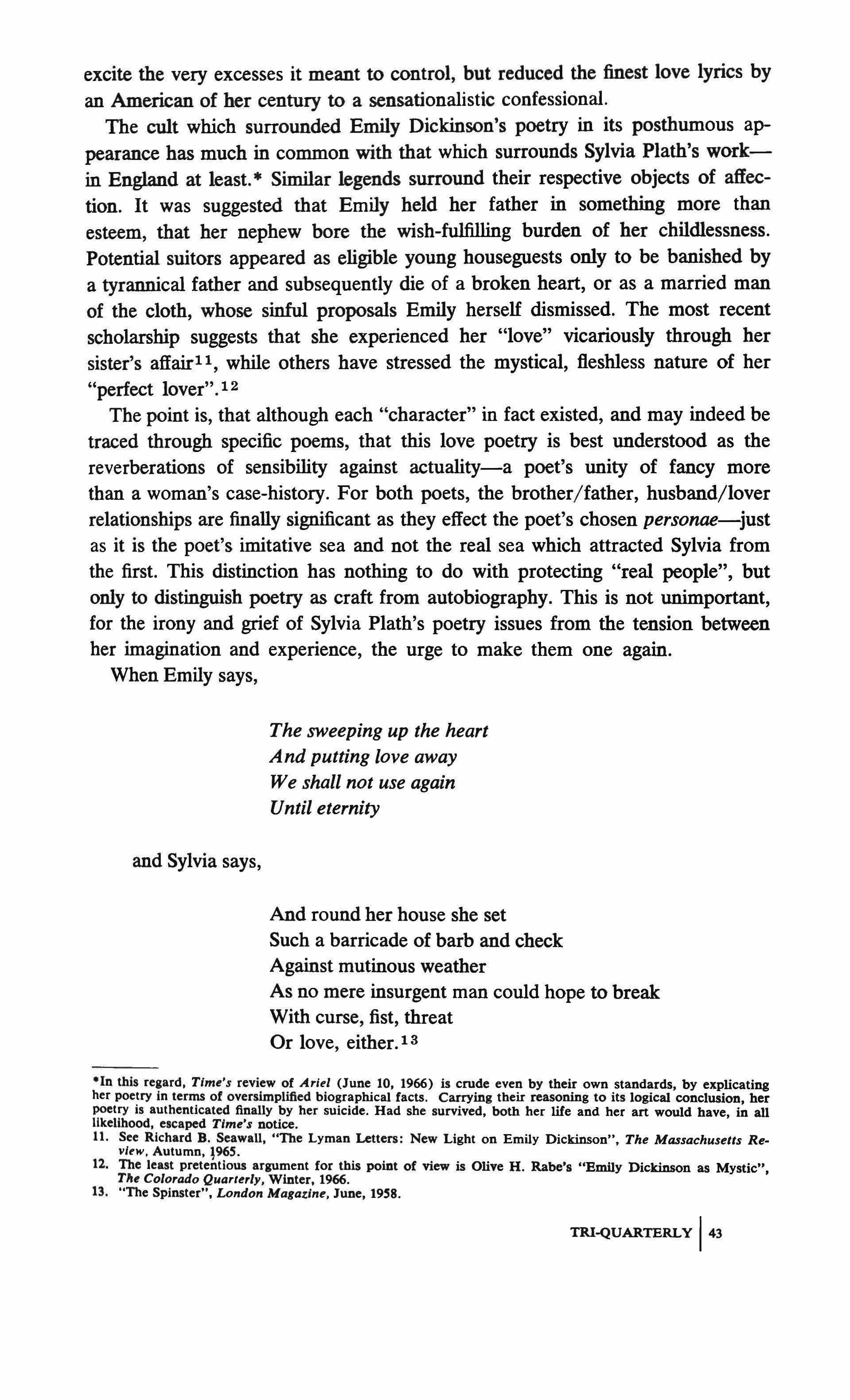
excite the very excesses it meant to control, but reduced the finest love lyrics by an American of her century to a sensationalistic confessional.
The cult which surrounded Emily Dickinson's poetry in its posthumous appearance has much in common with that which surrounds Sylvia Plath's workin England at least." Similar legends surround their respective objects of affection. It was suggested that Emily held her father in something more than esteem, that her nephew bore the wish-fulfilling burden of her childlessness. Potential suitors appeared as eligible young houseguests only to be banished by a tyrannical father and subsequently die of a broken heart, or as a married man of the cloth, whose sinful proposals Emily herself dismissed. The most recent scholarship suggests that she experienced her "love" vicariously through her sister's affairll, while others have stressed the mystical, fieshless nature of her "perfect lover". 12
The point is, that although each "character" in fact existed, and may indeed be traced through specific poems, that this love poetry is best understood as the reverberations of sensibility against actuality-a poet's unity of fancy more than a woman's case-history. For both poets, the brother/father, husband/lover relationships are finally significant as they effect the poet's chosen personae-just as it is the poet's imitative sea and not the real sea which attracted Sylvia from the first. This distinction has nothing to do with protecting "real people", but only to distinguish poetry as craft from autobiography. This is not unimportant, for the irony and grief of Sylvia Plath's poetry issues from the tension between her imagination and experience, the urge to make them one again.
When Emily says,
The sweeping up the heart And putting love away We shall not use again Until eternity and Sylvia says,
And round her house she set Such a barricade of barb and check Against mutinous weather
As no mere insurgent man could hope to break With curse, fist, threat Or love, either.13
°In this regard, Time's review of Ariel (June 10, 1966) is crude even by their own standards, by explicating her poetry in terms of oversimplified biographical facts. Carrying their reasoning to its logical conclusion, her poetry is authenticated finally by her suicide. Had she survived, both her life and her art would have, in all likelihood, escaped Time's notice.
11. See Richard B. Seawall, "The Lyman Letters: New Light on Emily Dickinson", The Massachusetts Review. Autumn, �96S.
12. The least pretentious araument for this point of view is Olive H. Rabe's ''Emily Dickinson as Mystic", Tlte Colorado Quarterly, Winter, 1966.
13. "The Spinster", London Magadne, June, 1958.
they are bespeaking the artist's isolation before the spinster's.
No American poet of her time treated the theme of love with more candor than Emily Dickinson, and Sylvia Plath carries the tradition to equal heights at mid-century. Both cut through the popular sociology of their eras by acknowledging the terrifying ambiguity of the female role, and then by universalizing their very feminism. That is to say, by rejecting the traditional pose of the "heroine", they give us the woman as "hero"-a protagonist which not only undergoes the central action of a work, but a character with whom men as well as women may view as an actor in a destiny possible for them.t+
The essential difference between their approaches binds them all the closer. For while Emily was obsessed with the paradox of giving love in a Christian context, Sylvia Plath, in her day of abstract philanthropy and empty beneficence, dramatizes the difficulty of knowing or accepting love. Emily speaks for both of them when she says,
We learn by contrast to admire the beauty that enchains us And know the object of desire by that which pains us.
In any case, what lifts their work above the commonplace is the totality of their affections and the fastidiousness with which they express them.
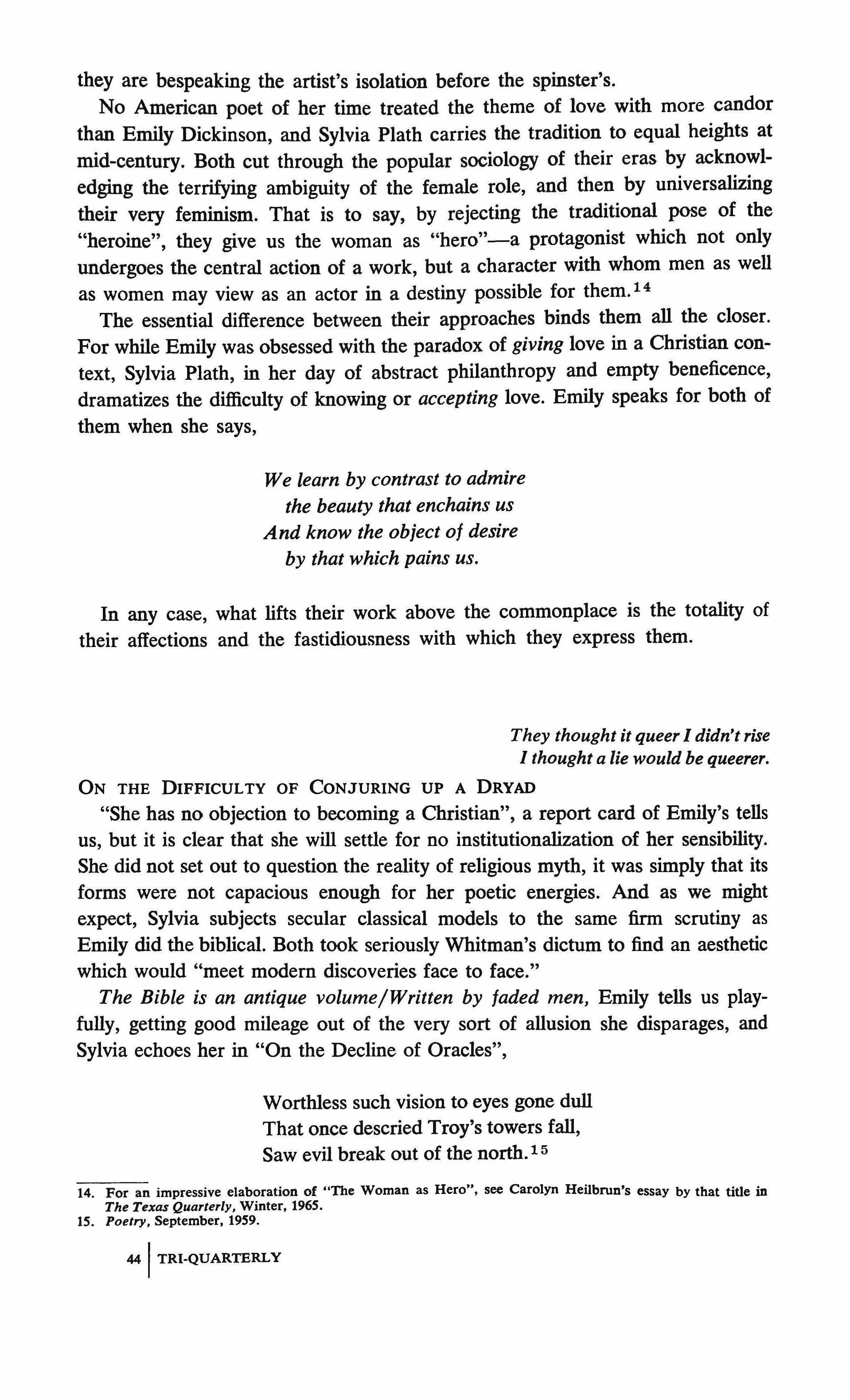
They thought it queer I didn't rise I thought a lie would be queerer.
"She has no objection to becoming a Christian", a report card of Emily's tells us, but it is clear that she will settle for no institutionalization of her sensibility. She did not set out to question the reality of religious myth, it was simply that its forms were not capacious enough for her poetic energies. And as we might expect, Sylvia subjects secular classical models to the same firm scrutiny as Emily did the biblical. Both took seriously Whitman's dictum to find an aesthetic which would "meet modern discoveries face to face."
The Bible is an antique volume/Written by faded men, Emily tells us playfully, getting good mileage out of the very sort of allusion she disparages, and Sylvia echoes her in "On the Decline of Oracles",
Worthless such vision to eyes gone dull That once descried Troy's towers fall, Saw evil break out of the north. 15
14. For an impressive elaboration of "The Woman as Hero", see Carolyn Heilbrun's essay by that title in The Texas Quarterly, Winter, 1965.
15. Poetry, September, 1959.
TRI-QUARTERLY

Or more specifically,
This is not death, it is something safer. The wingy myths won't tug at us any more! 16
She then goes on to systematically undermine Gothic imagery as well.
They are the last romantics, these candles; Upside down hearts of light tipping wax fingers, And the fingers, taken in by their own haloes, Crown milky, almost clear, like the bodies of saints. It is touching, the way they'll ignore
A whole family of prominent objects Simply to plumb the deeps of an eye.
In its hollow of shadows, its fringe of reeds, And the owner past thirty, no beauty at all Daylight would be more judicious,
Giving everybody a fair hearing. 1 7
She sensed as Emily that the Gothic was simply an importunate regurgitation of the classical mode, and a nostalgia particularly crippling to a female narrator. Within the gothic or classical traditions, one could be merely a "heroine." A poem might possibly be both oracular and feminist, but it was a personal medium or nothing.
In fact, Emily is in many ways the beginning, and Sylvia the culmination of the movement whereby the imagination, sated with the abstraction of myth, is driven back to the concrete. Emily astounds us because she presages the Imagist manifesto, and Sylvia does because she demonstrates how flexible that tradition is when the possibility of metrical lyricism is restored to it. In distorting the classical allusion in The Colossus (see page 14) for example, she not only frees herself of derivative vision, but uses the irony of what you might call the "almost-epic" iambic stanza to save the poem from simple self-parody. There is of course, a price the modem poet must pay, in terms of perception, if not vision. When adopting the persona of Electra, for instance, she admits ruefully that in order to give magnitude to her father's memory, she must "borrow the stilts of an old tragedy." But while she goes through the motions of selfmockery, and while she is at first simply turning a cliche upon itself, she is
16. "Flute Notes from a Reedy Pond", Te%tU QlUU'terly. Winter, 1960.
17. "Candies", The LIstener, November 17, 1960.
gradually asserting her own unique approach. The tone of the following is apologiac, for example, but its intention is just the opposite:
But no hocus-pocus of green angels
Damasks with dazzle the threadbare eye; "My trouble, doctor is: I see a tree, And that damn scrupulous tree won't practice wiles To beguile sight:
E.g., by cant of light
Construction a Daphne: My tree stays tree. is
Trusting that affirmation of rigorous optics, we know where we are.
Now, in valleys narrow And black as purses, the house lights Gleam as small change. 19

Capacity to terminate Is a Specific Grace.
Abstraction and archaic usage are not limited to classical models or gothic sentiment. Indeed, for the contemporary poet, the debt to an immediate past may be more burdensome. Sylvia Plath's work is most remarkable in its struggle with these influences.
Her first published work was thoroughly researched, initially employing that most complicated of French forms, the Villanelle. Her final work is spontaneous, achieving her own definition of greatness, "born all of a piece poems possessed as by the rhythms of their own breathing 2 0
The development between these two periods is astounding, in that her ability to deal with larger themes and her technical virtuosity keep precise pace with one another. She experiments with a variety of forms and modes; compare "Sow" (p. 11) with "In Plaster" (p. 16), for example.
Yet, as with Emily, the despair at not being equal to her craft remains a constant theme.
Seek no stony camera eye to fix
The passing dazzle of each face In black or white, or put the ice
18. "On the Difficulty of Conjuring up a Dryad", Poetry, July, 1957.
19. "Wuthering Heights", The New Statesman, March 16, 1962.
20. "Context", op cit.
TRl-QUARTERLY
Mouth's instant flame for future looks; Stars shoot their petals, and suns run to seed, However you may sweat to hold such darling wrecks Hived in honey in your head. 21
It is when such self-preoccupation as an artist becomes overwhelming that contemporary influences become most apparent, and this is when the poems crush themselves in homage to theory or a specific influence. One can see, for example, how derivative the vision of natural processes becomes, when under the contemplative spell of a Wallace Stevens:
Cold and final, the imagination
Shuts down its fabled summerhouse (Two Lovers and a Beachcomer by the Real Sea) 22
or echoing Theodore Roethke:
Water will run by rule; the actual sun Will scrupulously rise and set; No little man lives in the exacting moon And is that, is that, is that. 2 3
or, in that Macleishian metaphysical stage, which represents a parting homage to the academic training she had mastered so sufficiently that it rarely effected her poetry.
In the circus tent of a hurricane
Designed by a drunken god My extravagant heart blows up again In a rampage of champagne-colored rain 24
These are not really bad poems; what is remarkable is how effortlessly, persistently, she absorbs her influences. Her development is not dependent upon the adoption of a specific persona as yet-but to that ability to find cosmic truths in the minutiae of private life. This is no peculiar feminine construct, but the gift of Emily's Transcendental heritage. Not the Emersonian variety, of course; for him the oversoul was a premise, not a discovery. But rather Thoreau's microscopic vision that the structure of the self suggests the structure of the
21. "Epitaph for Fire and Flower", Poetry. January, 1957.
22. Mademoiselle. August, 1955.
23. Ibid.
24. "Circus in Three Rings", Atlantic Monthly. August, 1955.
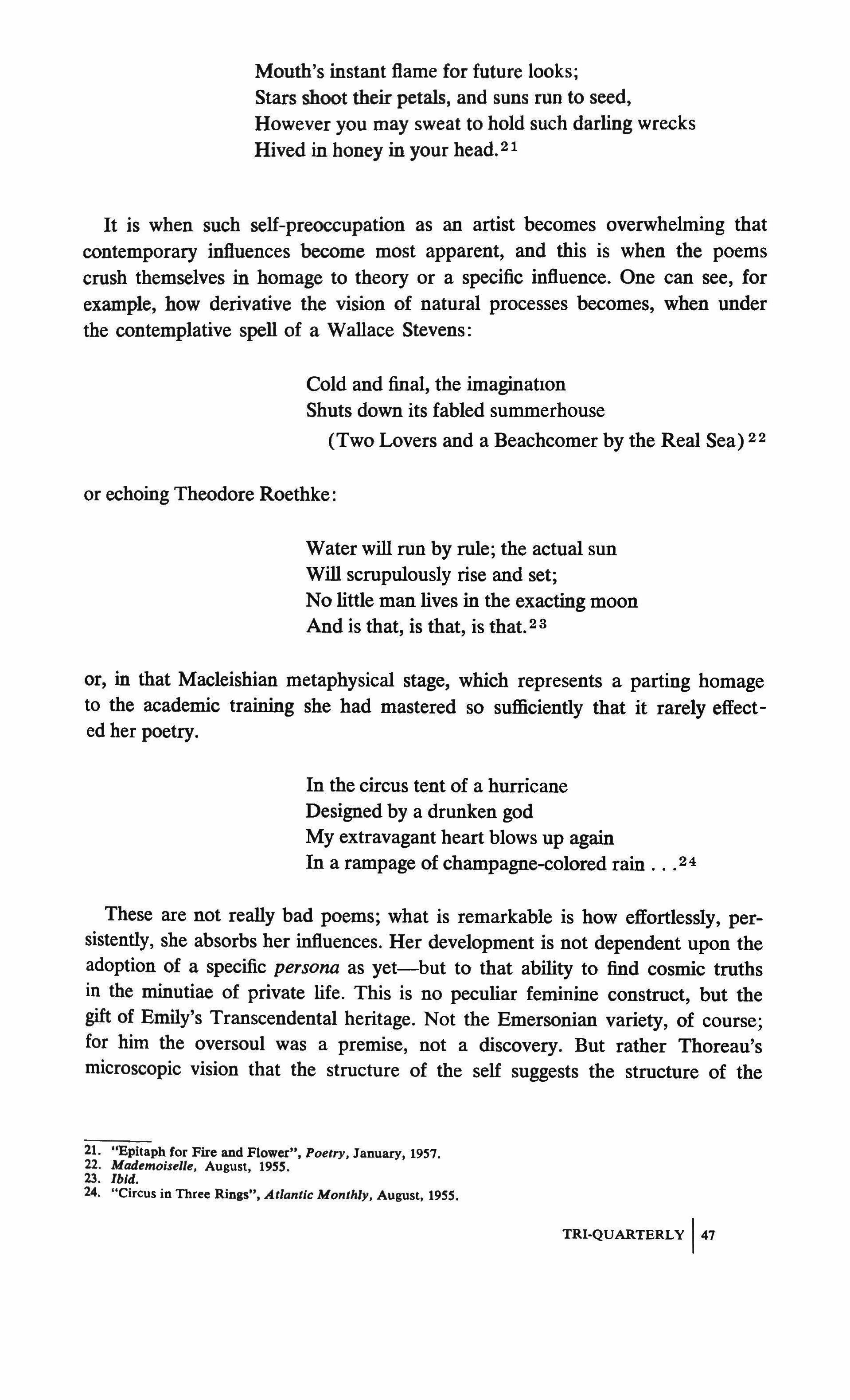
TRI-QUARTERLY

universe, that nature is an organic externality of the soul. Such an ontology is clear even in as metaphysical a poem as "Sculptor".25 (See page 16)
This poem is ultimately about making poetry, not sculpture, but what must be noted is the process of capturing real, extant things, before any mythic significance is exhumed. This, of course, reflects one of the most common assumptions of modem poetry-that aesthetic reasoning is inductive, that the truth of order springs not from ideas, but from captured things-for beneath the metaphysic of the poem, one must begin with the commonplace event of Smith College girls, all tartan skirted, page-boy-bob-and-circ1e-pin, visiting their eccentric "artist-in-residence", and in this artifical confrontation, a literal miracle takes place. They are moved beyond themselves, beyond their self-consciousness, even beyond culture-shopping, by the "genuine article." Sylvia's images, surreal as they may appear out of context, are quite literal, reportorial descriptions of Leonard Baskin's work. She has invoked no de Chirico statue, some "wingy myth", which "stands for" art.
Such biographical details are not essential to the poetry's life, of coursebut they will repay the unborn scholar who will inevitably rediscover them, for they show us how organic a vision this poet developed.
The issues of our time which preoccupy me at the moment are the incalcuable genetic effects of fallout and a documentary article on the terrifying, mad, omnipotent marriage of big business and the military in America('Juggernaut, the Warfare State', by Fred J. Cook in a recent Nation. Does this influence the kind of poettry I write? Yes, but in a sidelong fashion. I am not gifted with the tongue of Jeremiah, though I may be sleepless enough before my vision of the apocalypse. My poems do not tum out to be about Hiroshima, but about a child forming itself finger by finger in the dark. They are not about the terrors of mass extinction, but about the bleakness of the moon over a yew tree in a neighboring graveyard. Not about the testaments of tortured Algerians, but about the night thoughts of a tired surgeon.
In a sense, these poems are deflections. I do not think they are an escape. For me, the real issues of our time are the issues of every time-the hurt and wonder of loving; making in all its forms, children, loaves of bread, paintings, building; and the conservation of life of all people in all places, the jeopardizing of which no abstract doubletalk of 'peace' or 'implacable foes' can excuse.
I do not think a 'headline poetry' would interest more people any more profoundly than the headlines. And unless the up-to-the-minute poem grows out of something closer to the bone than a general, shifting philanthropy and is, indeed that unicorn-thing-a real poem, it is in danger of being screwed up as rapidly as the news sheet itself. 2 6
It is a rare poet who would admit the influence of an article in The Nation, let alone transform it into materials for the imagination.
25. "The Grecourt Review, May. 1959.
26. "Context", Ope cit.

The relationship between her perception and the sort of imagery which evolves from it is worth pursuing.
Sylvia's immediate predecessors treated nature according to the laws of their own perception, "as things-in-themselves." In late Stevens, for example, the poems become, not descriptions of "things" at all, but an epistemic description of the process of poetic perception. In Sylvia's case, she at times carries the process one step further; that is to say, she overcomes the tension between the perceiver and the thing-in-itself by literally becoming the thing-in-itself. In many instances, it is nature who personifies her. As she began in awe of the ocean's breath, she gradually assumes it. In "Private Ground"27 for example, she begins by noticing the handyman draining the goldfish ponds on an abandoned estate:
They collapse like lungs, the escaped water
Threading back, filament by filament, to the pure Platonic table where it lives.
The baby carp
Litter the mud like orangepeel.
Then, as the poem gains momentum, she sets the scene, Nature herself.
I bend over this drained basin where the small fish Flex as the mud freezes.
They glitter like eyes, and I collect them all.
Morgue of old logs and old images, the lake
Opens and shuts, accepting them among its reflections.
By the time the personal pronoun and the final metaphor are linked, she is no longer looking at the lake, but is the lake. This merging of the perceiver with the thing perceived is repeated even more successfully in her later work. In "Elm"28, for example, the elm speaks first, but the poet gradually assumes its voice, "I have suffered the atrocity of sunsets." While in "Ariel"29 (see page 68), title poem of her last book, the girl and her horse become both a physical and mythical unity, "The dew that flies / Suicidal, at one with the drive / Into the red ! Eye, the cauldron of morning."
One might recognize this as Keat's "negative capability", the poet's identification with the 'personality' of the poetic subject. Or, perhaps as an element of mystic traditions of which she was a serious if occasional student. As the Zen poet, Bunan, states: "I've become the Thingness ! Of all the things I see".
But moreover, within her own context, such an identification represents the poet's triumph over "Otherness"
The state of being in love threatens to obliterate the boundaries between ego and object
27. Crillcal Quarterly. 3, Summer. 1961.
28. Originally published as "The Elm Speaks", in The New Yorker, August 3, 1963.
29. The Review. October. 1963.

We were waked by the ticking of bells,-the bells tick in Amherst for a fire to tell the firemen I could hear the buildingsfalling and the oil exploding and people walking and talkinggaily, and cannons soft as velvet from the parishes that did not know we were burning up And so much brighter than day was it, that I saw a caterpillar measure a leaffar down in the orchard; and Vinnie kept saying bravely, "It's only The Fourth ofJuly."
She published The Bell Jar under the pseudonym of Victoria Lukas (echoing the nationalities of both husband and father) because she apparently did not consider it a "serious" work. What she felt, I would surmise, was that it was too serious--that is, it recorded mental processes not completely absorbed and transformed by her art. Nevertheless, it remains a remarkable work in many respects.
In the first place, it is one of the few American novels to treat adolescence from a mature point of view, although the narrator is an adolescent. Secondly, it chronicles a nervous breakdown and consequent professional therapy in nonclinical language. And finally, it gives us one of the few sympathetic portraits of what happens to one who has genuinely feminist aspirations in our society, of a girl who refuses to be simply an event in anyone's life.
Essentially, this is the record, in a strange blend of American and British vernacular, of a female Holden Caulfield resisting the daily suicide of the middle classes by the systematic taking of her own life. Except that Esther Greenwood is both more intelligent and less mannered than Holden, and her conflict the more serious one between a potential artist and society, rather than the cult of youth versus the cult of middle age. Further, Holden Caulfield, for all his charm, is a psychotic; which is to say, his world is the pure world of his own distortion, and no conflicting interpretation is allowed to obtrude upon his narration. The fascinating and terrifying technique of The Bell Jar, on the other hand, is the continuous conflict between the real world and the narrator's desperate reconstruction of it. It chronicles what that first flight to the ocean previewed.
For the writer, a depiction of this sort is difficult for several reasons--one is simply technical, for the neurotic narrator has no pure world with its own built-in logic available. Perception is more complex, tension unrelieved, interpretation more ambiguous, action more commonplace, catharsis less dramatic. I am of course talking about the narrator who tells the story after-thefact; not the patient in the institution. We can guess from the background how her clinical problems were defined; what is more interesting is how she chose to

make aesthetic use of her "illness"-which personae, in fact, could successfully mediate between the world of external truth and her own more profound, i1 nemesic vision.
In any case, it is clear she does not become sick as a consequence of seeing the "awful" truth-indeed her imagination functions as a necessary counterweight to reality-it is when her vision is ignored, that it becomes only internalized and not projected, that her "health" is effected.
In one of her few sustained prose descriptions, Emily Dickinson gives a classic illustration of the cost of such vision. The scene is Amherst, and a fire which subsequently razes the town is raging unnoticed behind the commotion of a Fourth of July celebration. While others sense only the celebration, Emily knows that they are literally "burning up." The signals for rejoicing and doomsday are the same. Only the listeners differ. The explanation which Vinnie offers to calm her is as "true" as it is kind-but it is only the ritual truth. The clinical consequences are clear. The "neurotic" sees herself as suspect by those less perceptive than herself, and through accumulated experiences such as the Fourth of July, becomes unable to trust any description of reality save her own. It may be that is where art begins; it is certainly where society insists that sickness begins.
It is precisely such a relationship with her world that Esther Greenwood narrates. Gradually the eccentricity of her perception, her candor, her fastidiousness, isolate her from the "real world"- her mother, her fiance, her peers, her job with a women's magazine in New York. The bell jar descends, isolating her in the vacuum of her own ego--"The silence depressed me. It wasn't the silence of silence. It was my own silence ." She is closeted with nothing save her own fierce irony-what remains remarkable is her resistance to simple praise or blame-she is determined to record her very inability to communicate. And in her hands, the crisis of adolescent identity is given both a rare dignity and perspective. In the following scene, her fiance, ironically enough a pre-med, takes her to the university hospital, and then back to what he must conceive as his laboratory.
As soon as the baby was born the people in the room divided up into two groups, the nurses tying a metal dog-tag on the baby's wrist and swabbing its eyes with cotton on the end of a stick and wrapping it up and putting it in a canvas-sided cot, while the doctor and Will started sewing up the woman's cut with a needle and a long thread.
I think somebody said, 'It's a boy, Mrs. Tomolillo,' but the woman didn't answer or raise her head.
'Well, how was it?' Buddy asked with a satisfied expression as we walked across the green quadrangle to his room.
'Wonderful,' I said. 'I could see something like that every day.'
I didn't feel up to asking him if there were any other ways to have babies. For some reason the most important thing to me was actually seeing the baby corne out of you yourself and making sure it was yours. I thought if you had to have all that pain anyway you might just as well stay awake.
TRI-QUARTERLy 151
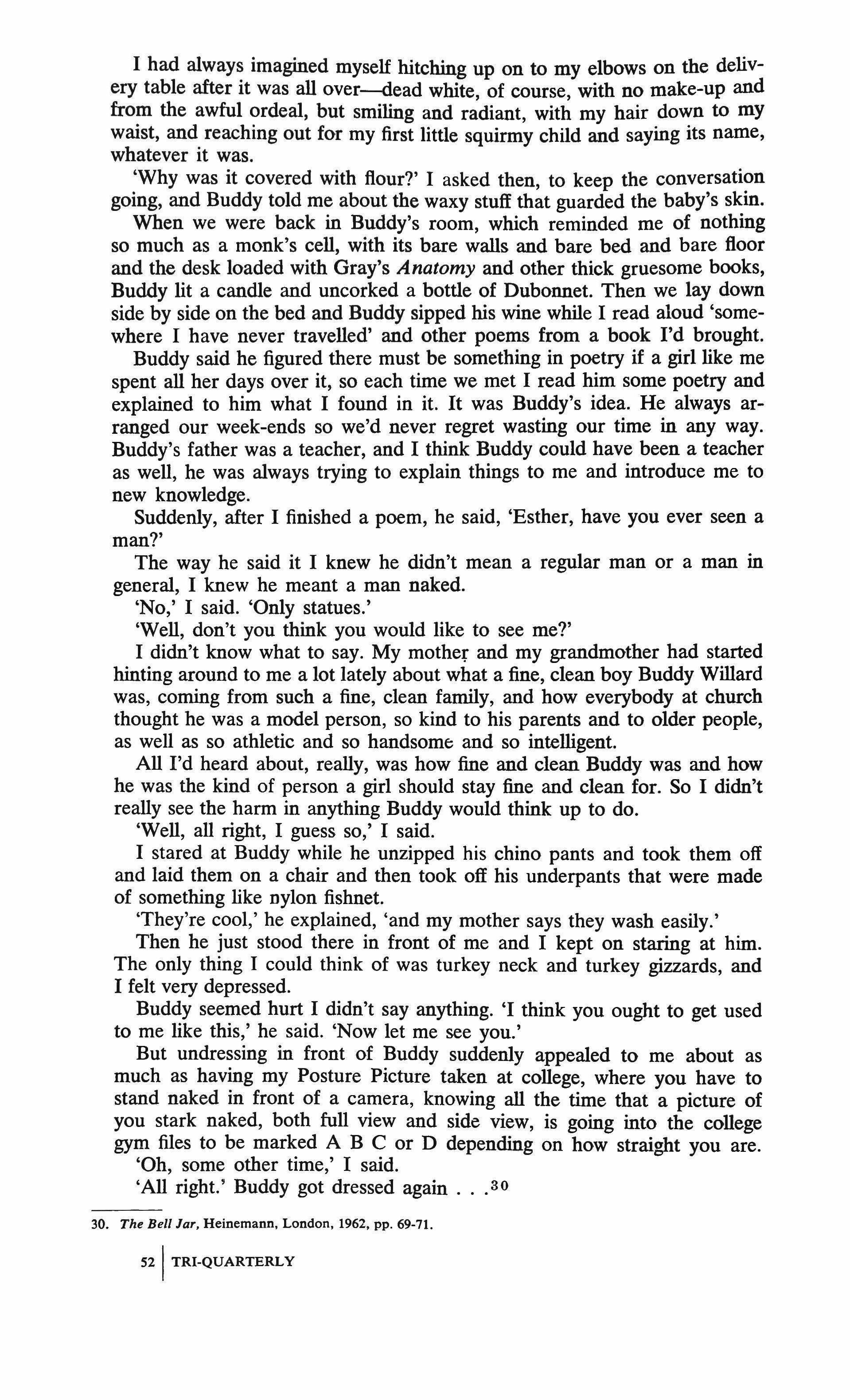
I had always imagined myself hitching up on to my elbows on the delivery table after it was all over--dead white, of course, with no make-up and from the awful ordeal, but smiling and radiant, with my hair down to my waist, and reaching out for my first little squirmy child and saying its name, whatever it was.
'Why was it covered with flour?' I asked then, to keep the conversation going, and Buddy told me about the waxy stuff that guarded the baby's skin.
When we were back in Buddy's room, which reminded me of nothing so much as a monk's cell, with its bare walls and bare bed and bare floor and the desk loaded with Gray's Anatomy and other thick gruesome books, Buddy lit a candle and uncorked a bottle of Dubonnet. Then we lay down side by side on the bed and Buddy sipped his wine while I read aloud 'somewhere I have never travelled' and other poems from a book I'd brought.
Buddy said he figured there must be something in poetry if a girl like me spent all her days over it, so each time we met I read him some poetry and explained to him what I found in it. It was Buddy's idea. He always arranged our week-ends so we'd never regret wasting our time in any way. Buddy's father was a teacher, and I think Buddy could have been a teacher as well, he was always trying to explain things to me and introduce me to new knowledge.
Suddenly, after I finished a poem, he said, 'Esther, have you ever seen a man?'
The way he said it I knew he didn't mean a regular man or a man in general, I knew he meant a man naked.
'No,' I said. 'Only statues.'
'Well, don't you think you would like to see me?'
I didn't know what to say. My mother and my grandmother had started hinting around to me a lot lately about what a fine, clean boy Buddy Willard was, coming from such a fine, clean family, and how everybody at church thought he was a model person, so kind to his parents and to older people, as well as so athletic and so handsome and so intelligent.
All I'd heard about, really, was how fine and clean Buddy was and how he was the kind of person a girl should stay fine and clean for. So I didn't really see the harm in anything Buddy would think up to do.
'Well, all right, I guess so,' I said.
I stared at Buddy while he unzipped his chino pants and took them off and laid them on a chair and then took off his underpants that were made of something like nylon fishnet.
'They're cool,' he explained, 'and my mother says they wash easily.'
Then he just stood there in front of me and I kept on staring at him. The only thing I could think of was turkey neck and turkey gizzards, and I felt very depressed.
Buddy seemed hurt I didn't say anything. 'I think you ought to get used to me like this,' he said. 'Now let me see you.'
But undressing in front of Buddy suddenly appealed to me about as much as having my Posture Picture taken at college, where you have to stand naked in front of a camera, knowing all the time that a picture of you stark naked, both full view and side view, is going into the college gym files to be marked ABC or D depending on how straight you are.
'Oh, some other time,' I said.
'All right.' Buddy got dressed again 30
30. The Bell Lar, Heinemann, London, 1962, pp. 69-71. 521 TRI-QUARTERLY

This detachment* gradually becomes self-loathing, suicidal. Her self-perception becomes unbearable at the point when she can no longer read or write, and is reduced to contemplating her senior honors thesis on "twin images" in Finnegans Wake. In one climactic scene, she throws all her wardrobe, her body's thesaurus, piece by piece from the roof of aNew York hotel. In another, only her elemental instinct saves her.
I thought I would swim out until I was too tired to swim back. As I paddled on, my heartbeat boomed like a dull motor in my ears.
I am I am I am.31
Finally, after several abortive attempts to take her life, she swallows a bottle of sleeping pills and lies down in the basement crawl space of her family home to die. After several days she is found, saved, and institutionalized. It is in this context that we see her suspicion has become paranoiac, her vision schizophrenic. Yet just how undescriptive such labels are is clearly shown in her own undiagnostic analysis.
The negro wheeled the food cart into the patients' dining-room. The Psychiatric Ward at the hospital was very small-just two corridors in an L-shape, lined with rooms, and an alcove of beds behind the OT shop, where I was, and a little area with a table and a few seats by a window in the corner of the L, which was our lounge and dining-room.
Usually, it was a shrunken old white man that brought our food, but today it was a negro. The negro was with a woman in blue stiletto heels, and she was telling him what to do. The negro kept grinning and chuckling in a silly way.
Then he carried a tray over to our table with three lidded tin tureens on it, and started banging the tureens down. The woman left the room, locking the door behind her. All the time the negro was banging down the tureens and then the dented silver and the thick, white china plates, he gawped at us with big, rolling eyes.
I could tell we were his first crazy people.
Nobody at the table made a move to take the lids off the tin tureens, and the nurse stood back to see if any of us would take the lids off before she came to do it. Usually Mrs. Tomolillo had taken the lids off and dished out everybody's food like a little mother, but then they sent her home, and nobody seemed to want to take her place.
I was starving, so I lifted the lid off the first bowl.
'That's very nice of you, Esther,' the nurse said pleasantly. 'Would you like to take some beans and pass them round to the others?'
I dished myself out a helping of green string beans and turned to pass the tureen to the enormous red-headed woman at my right. This was the first time the red-headed woman had been allowed up to the table. I had seen her once, at the very end of the L-shaped corridor, standing in front
·There is in Sylvia, as in most writers effected by the Transcendental heritage a strong Calvinist strain a rellglous a�cetlcism which reappears in an aesthetic guise. In this context, the m�le is idealized as the woman once was In our literature, and falls, as she did. when he neglects his authoritative role for a "common" impulse.
31. Ibid. p. 167.
of an open door with bars on the square, inset window.
She had been yelling and laughing in a rude way and slapping her thighs at the passing doctors, and the white-jacketed attendant who took care of the people in that end of the ward was leaning against the hall radiator, laughing himself sick.
The red-headed woman snatched the tureen from me and upended it on her plate. Beans mountained up in front of her and scattered over on to her lap and on to the floor like stiff, green straws.
'Oh, Mrs. Mole!' the nurse said in a sad voice, 'I think you better eat in your room today.'
And she returned most of the beans to the tureen and gave it to the person next to Mrs. Mole and led Mrs. Mole off. All the way down the hall to her room, Mrs. Mole kept turning round and making leering faces at us, and ugly oinking noises.
The negro had come back and was starting to collect the empty plates of people who hadn't dished out any beans yet.
'We're not done,' I told him. 'You can just wait.'
'Mah, mah!' The negro widened his eyes in mock wonder. He glanced round. The nurse had not yet returned from locking up Mrs. Mole. The negro made me an insolent bow. 'Miss Mucky-Muck,' he said under his breath.
I lifted the lid off the second tureen and uncovered a wedge of macaroni, stone-cold and stuck together in a gluey paste. The third and last tureen was chock-full of baked beans.
Now I knew perfectly well you didn't serve two kinds of beans together at a meal. Beans and carrots, or beans and peas, maybe, but never beans and beans. The negro was just trying to see how much we would take.
The nurse came back, and the negro edged off at a distance. I ate as much as I could of the baked beans. Then I rose from the table, passing round to the side where the nurse couldn't see me below the waist, and behind the negro, who was clearing the dirty plates. 1 drew my foot back and gave him a sharp, hard kick on the calf of the leg.
The negro leapt away with a yelp and rolled his eyes at me. 'Oh Miz, oh Miz.' he moaned, rubbing his leg. 'You shouldn't of done that, you shouldn't, you reely shouldn't.'
That's what you get,' 1 said, and stared him in the eye. .32
Curiously enough, the aesthetic detachment which isolated her in the outside world confers on her, within the asylum, a peculiar source of strength. Surrounded by the insane and perverse, shorn of wordly hypocrisy, her self-pity is expanded to empathy. As she is able to become finally tolerant of her "peers", she is able to sympathize with herself. Indeed, the suicide of a fellow inmate marks the point of her return to the world. Her ability to feel remorse and responsibility for another's death, is the sign that she has ceased to be so fascinated with her own.
Gradually, she is allowed to leave the sanitarium for forays into the "real" world-a triumphal trip to Margaret Sanger, for example--and a slapstick
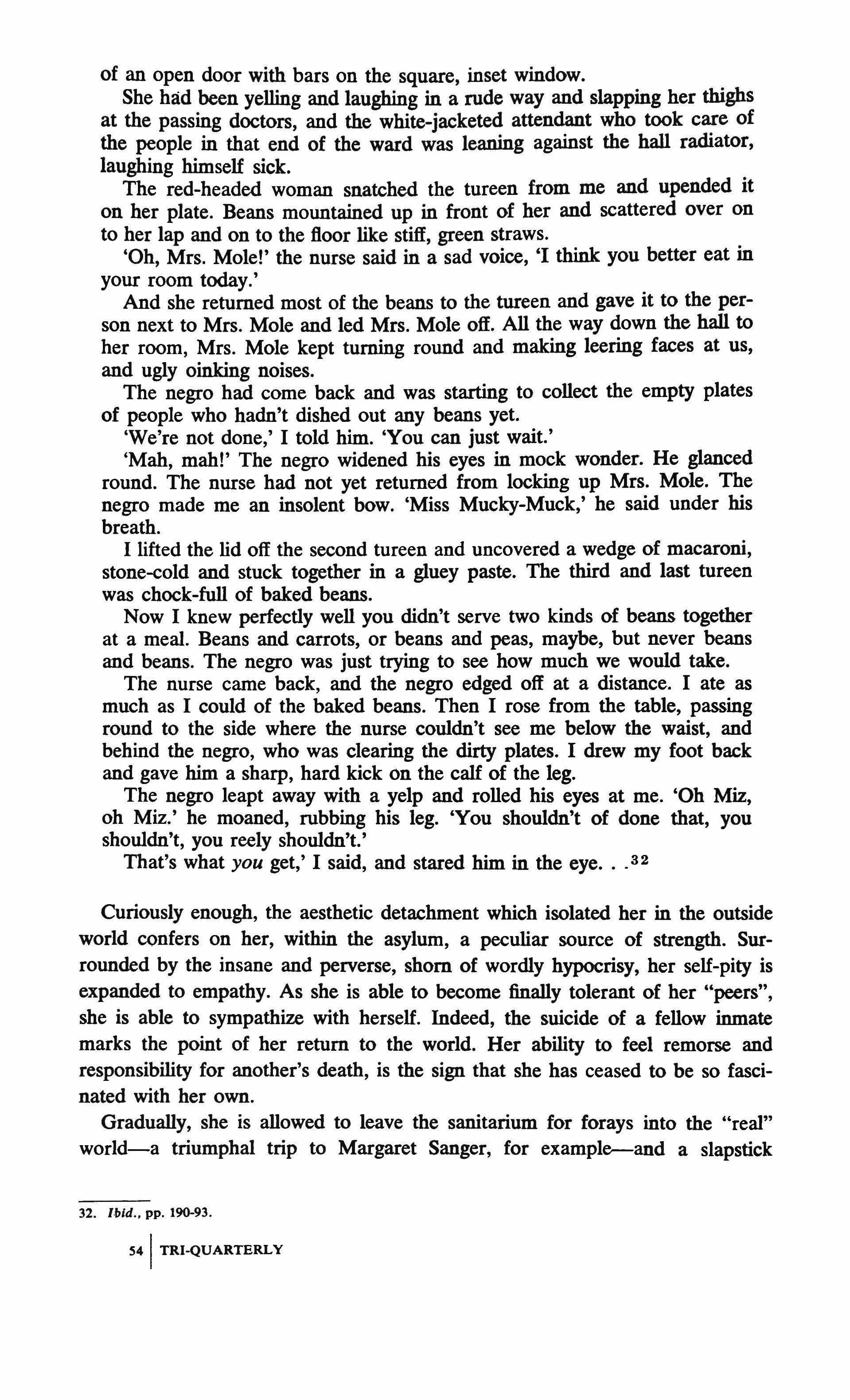
Y

defiowering at the hands of Irwin, "a full professor at 26, with the pale, hairless body of a boy genius. ." In the end, she is given her formal release.
"The eyes and faces all turned themselves to me, and guiding myself by them as by a magical thread, I stepped into the room." 3 3
It is a pat ending. Yet, all the cliches of the emancipated woman are salvaged in the end by her wry humor, recalling George Sand's remark, "A woman can become a man, but never a gentleman", or perhaps Emily's more ambiguous All men say 'what' to me / 1 thought it but a fashion. Yet, either as a novel or a case history, The Bell Jar is abortive. Indeed, as a hopeful premise plotted on the curve of her life, it is ironically tragic. .Nevertheness, it can be valued as a poet's notebook, a holding action of the imagination against the tyranny of both fantasy and fiat fact. For this novel was written not to regain her psychic balance, but to transform the opacity of language, the tyrannous headlines, into her own medium.
SCHOLARSHIP GIRL MISSING, MOTHER WORRIED SLEEPING PILLS FEARED MISSING WTH GIRL POLICE SGT. BILL HINDLEY SAYS: IT DOESN'T LOOK GOOD GIRL FOUND ALlVE34
Indeed, all the characters in the book are finally reduced to the verbal equivalences which express their various approaches to life--her mother to shorthand, her suitor to Gray's Anatomy, her professor to Finnegans Wake, her psychiatrist to professional jargon, her father to his epitaph, herself to her own epigrammatic wit, inhumanly equal to every situation. The characters stagnate in their own limited language as she develops her own. The topic sentences of each lead paragraph are curiously condensed and isolated, implying that if they were compiled vertically, we would have a free verse associative poem, and not a novel at all. The prose of this book is the testing ground for the poems which will outlast it. And the book ends how and where it does, I would guess, not because she is cured, but because her talent has matured.
What soft, cherubic creatures
The gentlewomen are! One would as soon assault a plush Or violate a star.
To explain her poetry in terms of feminism is as inadequate as describing her illness in terms of schizophrenia, yet it is impossible to ignore the thrust towards the persona of the "new woman" which emerges from The Bell Jar. We should not make too much of the fact that she is a woman, any more than we should insist upon a single correlative for the "Other", but she remains among the few
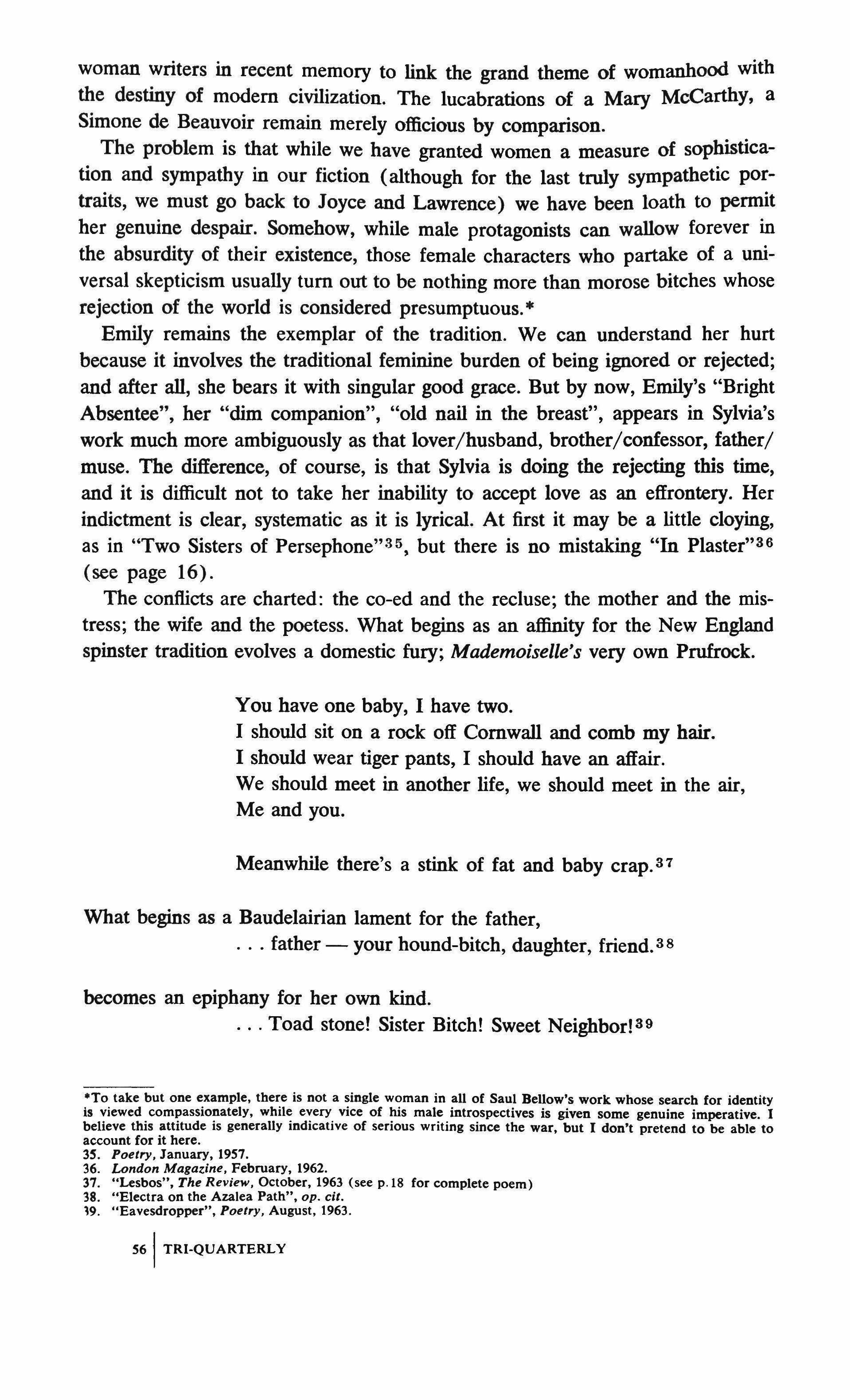
woman writers in recent memory to link the grand theme of womanhood with the destiny of modem civilization. The lucabrations of a Mary McCarthy, a Simone de Beauvoir remain merely officious by comparison.
The problem is that while we have granted women a measure of sophistication and sympathy in our fiction (although for the last truly sympathetic portraits, we must go back to Joyce and Lawrence) we have been loath to permit her genuine despair. Somehow, while male protagonists can wallow forever in the absurdity of their existence, those female characters who partake of a universal skepticism usually tum out to be nothing more than morose bitches whose rejection of the world is considered presumptuous. *
Emily remains the exemplar of the tradition. We can understand her hurt because it involves the traditional feminine burden of being ignored or rejected; and after all, she bears it with singular good grace. But by now, Emily's "Bright Absentee", her "dim companion", "old nail in the breast", appears in Sylvia's work much more ambiguously as that lover/husband, brother/confessor, father/ muse. The difference, of course, is that Sylvia is doing the rejecting this time, and it is difficult not to take her inability to accept love as an effrontery. Her indictment is clear, systematic as it is lyrical. At first it may be a little cloying, as in "Two Sisters of Persephone'P", but there is no mistaking "In Plaster"36 (see page 16).
The conflicts are charted: the co-ed and the recluse; the mother and the mistress; the wife and the poetess. What begins as an affinity for the New England spinster tradition evolves a domestic fury; Mademoiselle's very own Prufrock.
You have one baby, I have two. I should sit on a rock off Cornwall and comb my hair. I should wear tiger pants, I should have an affair. We should meet in another life, we should meet in the air, Me and you.
Meanwhile there's a stink of fat and baby crap.P"
What begins as a Baudelairian lament for the father, fatheryour hound-bitch, daughter, friend. 3 8
becomes an epiphany for her own kind Toad stone! Sister Bitch! Sweet Neighbor!39
"To take but one example, there is not a single woman in all of Saul Bellow's work whose search for identity is viewed compassionately, while every vice of his male introspectives is given some genuine imperative. I believe this attitude is generally indicative of serious writing since the war, but I don't pretend to be able to account for it here.
3S. Poetry. January, 19S7.
36. London Magazine. February, 1962.
37. "Lesbos", The Review. October, 1963 (see p.IS for complete poem)
38. "Electra on the Azalea Path", op. cit. '9. "Eavesdropper", Poetry. August, 1963.
S61 TRI-QUARTERLY
What begins as ironic detachment in The Bell Jar becomes an active vengeance in "Stings."
I stand in a column Of winged, unmiraculous women Honey drudgers. I am no drudge Though for years I have eaten dust And dried plates with my dense hair.4o
What begins as the paradox of sex and marriage becomes nothing less than the conflict between art and life.
Perfection is terrible, it cannot have children. 4 1
The thought of a baby Stealer of cells, stealer of beauty She would rather be dead than fat. Dead and perfect, like Nefertit+s
What begins as the jealousy of another's birth becomes the jealousy of death itself. What begins as an embarrassing curiosity has become an awful certainty, or more briefly-Electra becomes Clytemnestra
And at his next step I shall unloose
I shall unlooseFrom the small jeweled Doll he guards like a heart-
The Lioness, The shriek in the bath, The cloak of holes. 4 3

�'stlnp London MaBazlne 3, April, 1963.
41. "The MuDlch Mannequins", Ariel, Faber and Faber, 1962, pp. 74-7S.
42. "The Fearful", The Observer, February 17, 1963.
43. "Purdah", Poetry, August, 1963.
TRI-QUARTERLY I S7
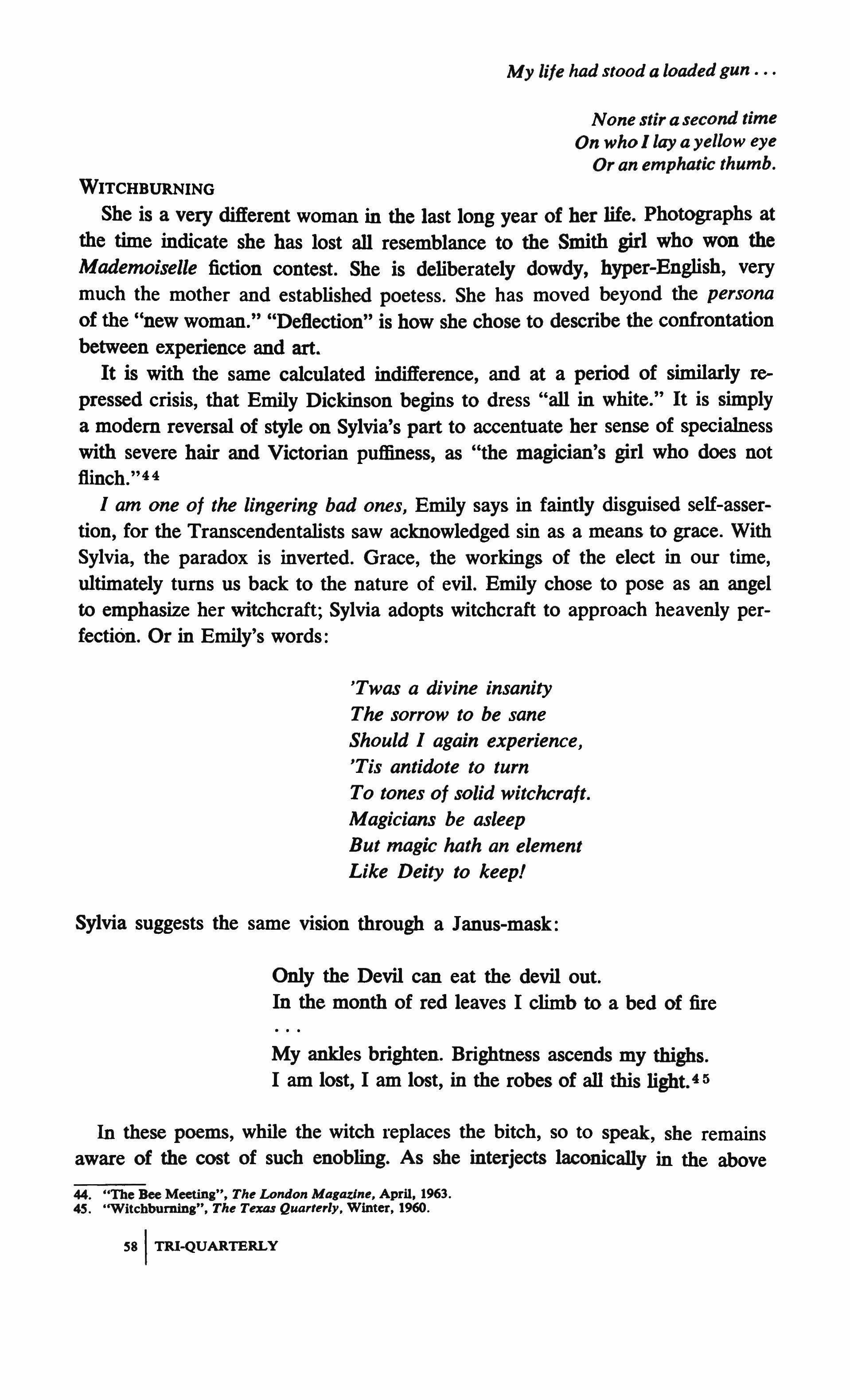
My life had stood a loaded gun
None stir a second time On who 1 lay a yellow eye Or an emphatic thumb.
She is a very different woman in the last long year of her life. Photographs at the time indicate she has lost all resemblance to the Smith girl who won the Mademoiselle fiction contest. She is deliberately dowdy, hyper-English, very much the mother and established poetess. She has moved beyond the persona of the "new woman." "Deflection" is how she chose to describe the confrontation between experience and art.
It is with the same calculated indifference, and at a period of similarly repressed crisis, that Emily Dickinson begins to dress "all in white." It is simply a modem reversal of style on Sylvia's part to accentuate her sense of specialness with severe hair and Victorian puffiness, as "the magician's girl who does not ftinch."44
I am one of the lingering bad ones, Emily says in faintly disguised self-assertion, for the Transcendentalists saw acknowledged sin as a means to grace. With Sylvia, the paradox is inverted. Grace, the workings of the elect in our time, ultimately turns us back to the nature of evil. Emily chose to pose as an angel to emphasize her witchcraft; Sylvia adopts witchcraft to approach heavenly perfection. Or in Emily's words:
'Twas a divine insanity
The sorrow to be sane Should I again experience, 'Tis antidote to turn To tones of solid witchcraft. Magicians be asleep But magic hath an element Like Deity to keep!
Sylvia suggests the same vision through a Janus-mask:
Only the Devil can eat the devil out.
In the month of red leaves I climb to a bed of fire
My ankles brighten. Brightness ascends my thighs. I am lost, I am lost, in the robes of all this light.4::;
In these poems, while the witch replaces the bitch, so to speak, she remains aware of the cost of such enobling. As she interjects laconically in the above
44. "The Bee Meeting", The London Magazlne, April, 1963.
45. "WilchbumiDg", The TntU Quarterly. Winter, 1960.
TRI-QUARTERLY
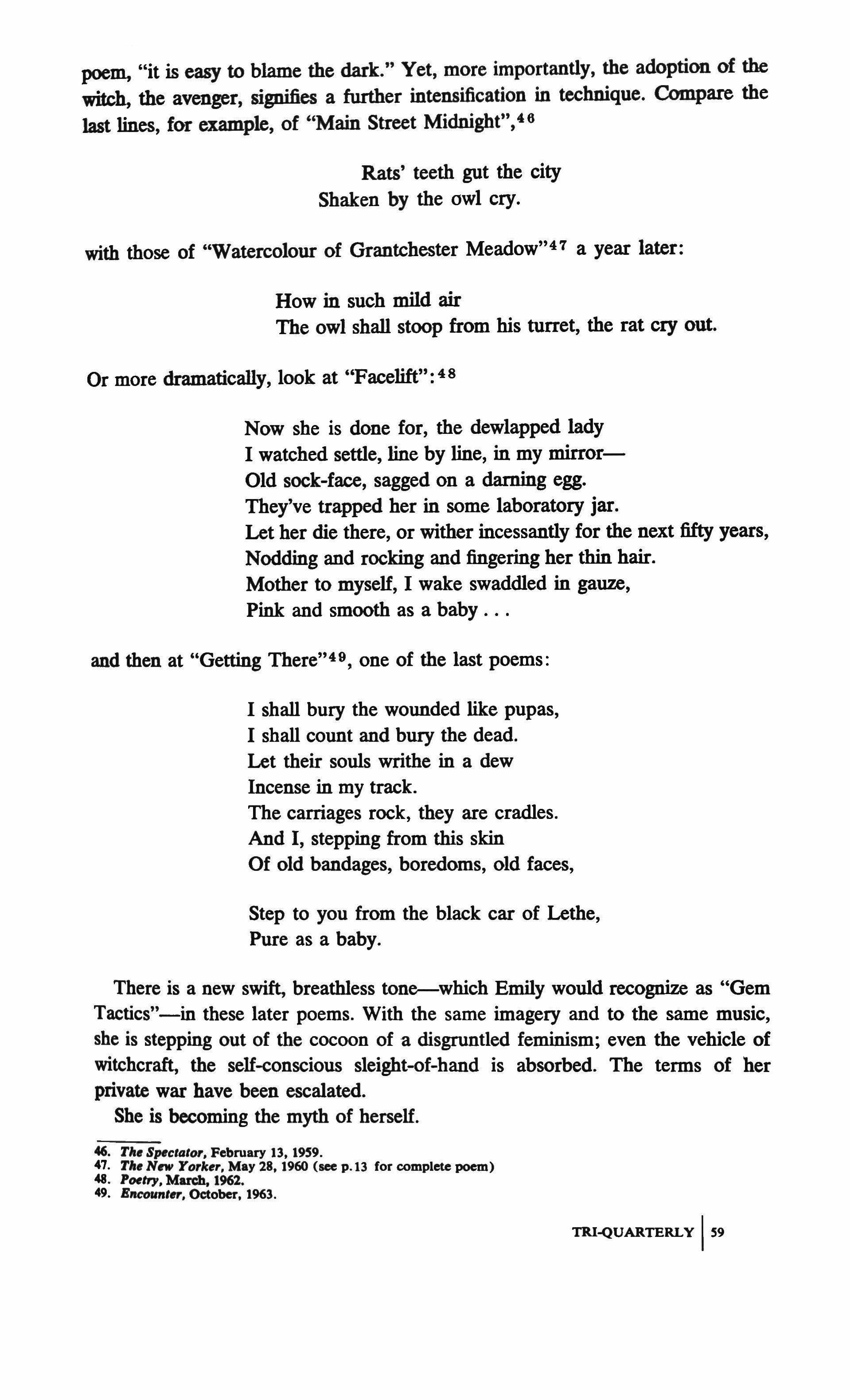
poem, "it is easy to blame the dark." Yet, more importantly, the adoption of the witch, the avenger, signifies a further intensification in technique. Compare the last lines, for example, of "Main Street Midnight",4 6
Rats' teeth gut the city Shaken by the owl cry.
with those of "Watercolour of Grantchester Meadow"47 a year later:
How in such mild air
The owl shall stoop from his turret, the rat cry out.
Or more dramatically, look at "Facelift":48
Now she is done for, the dewlapped lady I watched settle, line by line, in my mirrorOld sock-face, sagged on a darning egg. They've trapped her in some laboratory jar. Let her die there, or wither incessantly for the next fifty years, Nodding and rocking and fingering her thin hair. Mother to myself, I wake swaddled in gauze, Pink and smooth as a baby
and then at "Getting There"49, one of the last poems:
I shall bury the wounded like pupas, I shall count and bury the dead. Let their souls writhe in a dew Incense in my track.
The carriages rock, they are cradles. And I, stepping from this skin Of old bandages, boredoms, old faces,
Step to you from the black car of Lethe, Pure as a baby.
There is a new swift, breathless tone-which Emily would recognize as "Gem Tactics"-in these later poems. With the same imagery and to the same music, she is stepping out of the cocoon of a disgruntled feminism; even the vehicle of witchcraft, the self-conscious sleight-of-hand is absorbed. The terms of her private war have been escalated. She is becoming the myth of herself.
46. r,.. S".ClalM. February 13. 1959.
47. rh. N_ 'Yorker. May 28. 1960 (see p.13 for complete poem)
41. Poelr7. March, 1962.
49. BlICOfIrtl.,. October. 1963.
My life closed twice before its close.
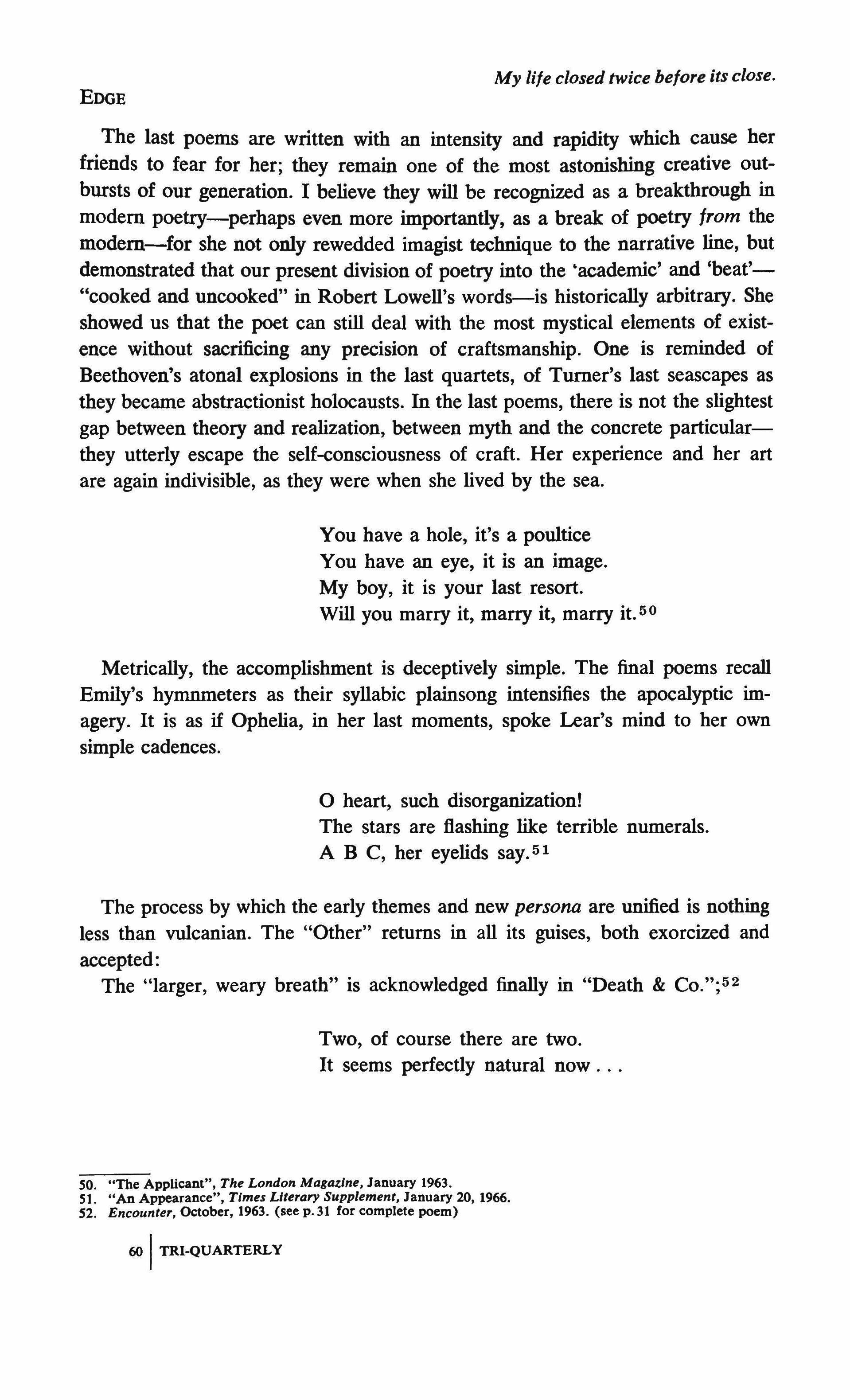
EDGE
The last poems are written with an intensity and rapidity which cause her friends to fear for her; they remain one of the most astonishing creative outbursts of our generation. I believe they will be recognized as a breakthrough in modem poetry-perhaps even more importantly, as a break of poetry from the modem-for she not only rewedded imagist technique to the narrative line, but demonstrated that our present division of poetry into the 'academic' and 'beat'"cooked and uncooked" in Robert Lowell's words--is historically arbitrary. She showed us that the poet can still deal with the most mystical elements of existence without sacrificing any precision of craftsmanship. One is reminded of Beethoven's atonal explosions in the last quartets, of Turner's last seascapes as they became abstractionist holocausts. In the last poems, there is not the slightest gap between theory and realization, between myth and the concrete particularthey utterly escape the self-consciousness of craft. Her experience and her art are again indivisible, as they were when she lived by the sea.
You have a hole, it's a poultice
You have an eye, it is an image. My boy, it is your last resort. Will you marry it, marry it, marry it.50
Metrically, the accomplishment is deceptively simple. The final poems recall Emily's hymnmeters as their syllabic plainsong intensifies the apocalyptic imagery. It is as if Ophelia, in her last moments, spoke Lear's mind to her own simple cadences.
o heart, such disorganization!
The stars are flashing like terrible numerals. ABC, her eyelids say. 51
The process by which the early themes and new persona are unified is nothing less than vulcanian. The "Other" returns in all its guises, both exorcized and accepted:
The "larger, weary breath" is acknowledged finally in "Death & CO.";52
Two, of course there are two. It seems perfectly natural now
50. "The Applicant", The London Magazine, January 1963.
51. "An Appearance", Times Literary Supplement. January 20, 1966.
52. Encounter, October, 1963. (see p.31 for complete poem)
60 I TRI-QUARTERLY

as the lover in ''The Other";53
You come in late, wiping your lips How you insert yourself Between myself and myself!
as the husband in ''The Jailer" 5 4;
My night sweats grease the breakfast plate. The same placard of blue fog is wheeled into position
What would the dark Do without fevers to eat?
What would the light Do without eyes to knife, what would he Do, do, do without me?
and finally, as the father in "Daddy."55
You do not do, you do not do
Any more, black shoe In which I have lived like a foot For thirty years, poor and white, Barely daring to breathe or Achoo! Daddy, I have had to kill you.
We must constantly be attuned to the shifts in personae-whether she speaks as the poor, plain bright girl of The Bell Jar, or the archetypal Jew of "Daddy" -for this movement is the dynamic principle of her art. It is fairer to both biographical fact and the measure of her poetry to see these shifts in role as a poet's search for the most authoritative voice possible. She is not relating herself to history or to any systematic philosophy in these last poems, any more than she related herself to nature in her early work. She is using history, like nature, to explain herself. It is the Transcendental vision that History is within ourselves, and that History is the flux of Compensation. In the end, the conflicts and the poetic roles they necessitate, resolve themselves into the final grand dialectic between what she called "breath" and the "great stasis."
"The Fifty-ninth Bear" is certainly not her best work, but we can value it like The Bell Jar as an excursion into prose to test her experience against language. The story is devastatingly straightforward. Norton and his wife Sadie are driving through the North Woods on the last day of their camping vacation. Sadie,
53. Ibid.
54 .rbld.
55. Ibid. See page 32 for complete poem TRI-QUARTERLy 161
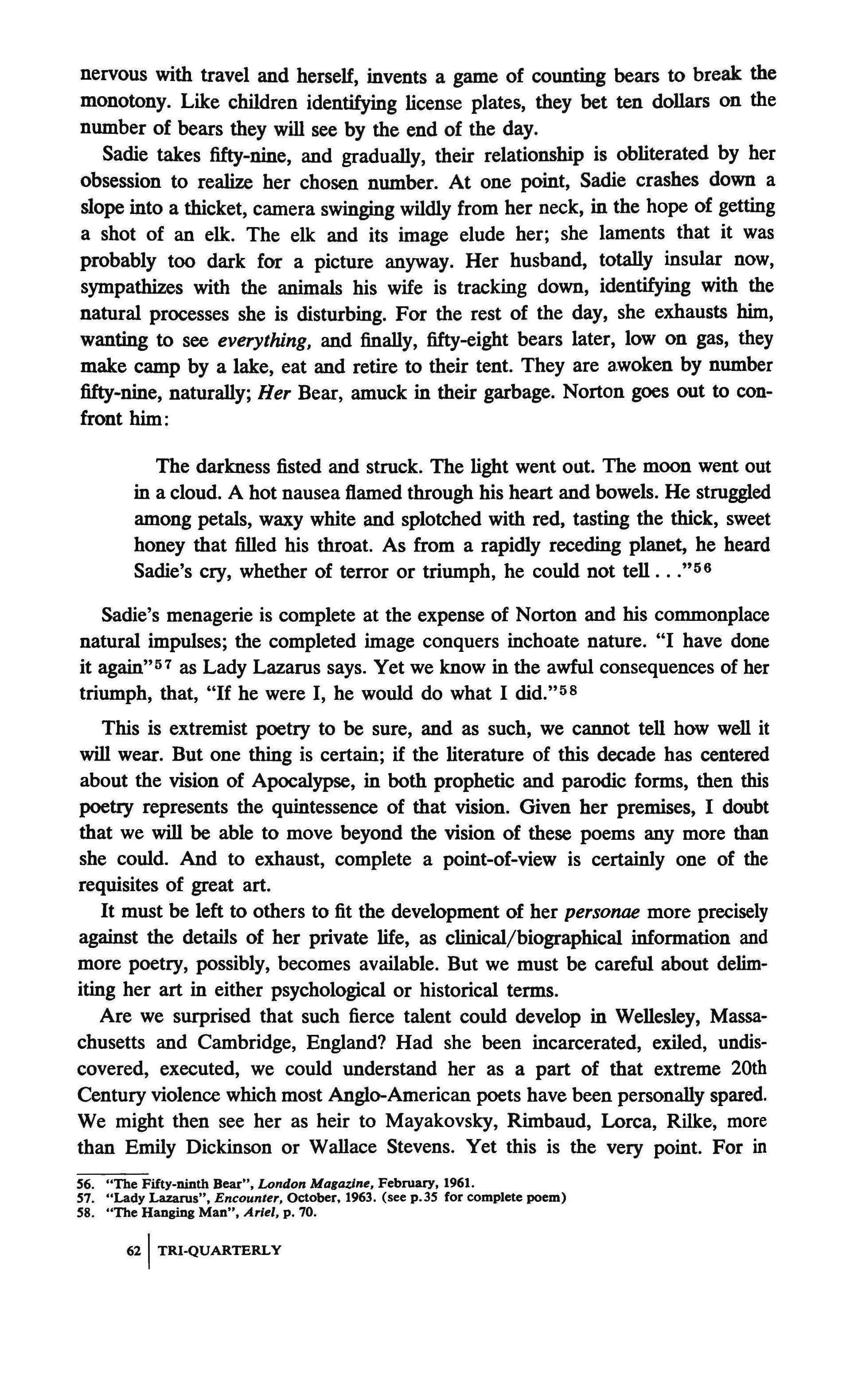
nervous with travel and herself, invents a game of counting bears to break the monotony. Like children identifying license plates, they bet ten dollars on the number of bears they will see by the end of the day.
Sadie takes fifty-nine, and gradually, their relationship is obliterated by her obsession to realize her chosen number. At one point, Sadie crashes down a slope into a thicket, camera swinging wildly from her neck, in the hope of getting a shot of an elk. The elk and its image elude her; she laments that it was probably too dark for a picture anyway. Her husband, totally insular now, sympathizes with the animals his wife is tracking down, identifying with the natural processes she is disturbing. For the rest of the day, she exhausts him, wanting to see everything, and finally, fifty-eight bears later, low on gas, they make camp by a lake, eat and retire to their tent. They are awoken by number fifty-nine, naturally; Her Bear, amuck in their garbage. Norton goes out to confront him:
The darkness fisted and struck. The light went out. The moon went out in a cloud. A hot nausea flamed through his heart and bowels. He struggled among petals, waxy white and splotched with red, tasting the thick, sweet honey that filled his throat. As from a rapidly receding planet, he heard Sadie's cry, whether of terror or triumph, he could not tell "56
Sadie's menagerie is complete at the expense of Norton and his commonplace natural impulses; the completed image conquers inchoate nature. "I have done it again" 57 as Lady Lazarus says. Yet we know in the awful consequences of her triumph, that, "If he were I, he would do what I did."58
This is extremist poetry to be sure, and as such, we cannot tell how well it will wear. But one thing is certain; if the literature of this decade has centered about the vision of Apocalypse, in both prophetic and parodic forms, then this poetry represents the quintessence of that vision. Given her premises, I doubt that we will be able to move beyond the vision of these poems any more than she could. And to exhaust, complete a point-of-view is certainly one of the requisites of great art.
It must be left to others to fit the development of her personae more precisely against the details of her private life, as clinical/biographical information and more poetry, possibly, becomes available. But we must be careful about delimiting her art in either psychological or historical terms.
Are we surprised that such fierce talent could develop in Wellesley, Massachusetts and Cambridge, England? Had she been incarcerated, exiled, undiscovered, executed, we could understand her as a part of that extreme 20th Century violence which most Anglo-American poets have been personally spared. We might then see her as heir to Mayakovsky, Rimbaud, Lorca, Rilke, more than Emily Dickinson or Wallace Stevens. Yet this is the very point. For in
56. "The FiftY-ninth Bear", London Magazine. February, 1961.
57. "Lady Lazarus", Encounter, October. 1963. (see p.35 for complete poem)
58. "The Hanging Man". Ariel. p. 70.
TRI-QUARTERLY
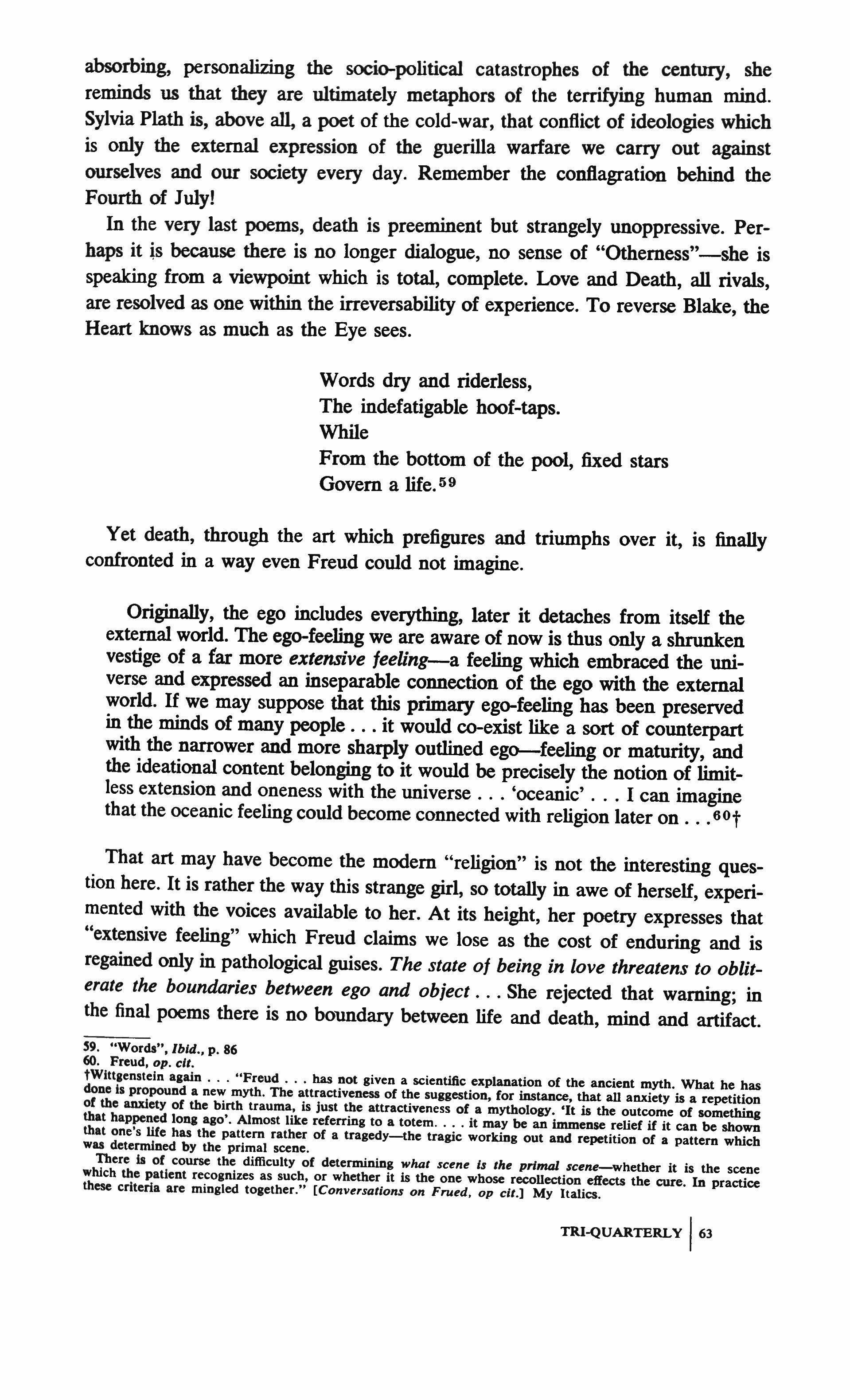
absorbing, personalizing the socio-political catastrophes of the century, she reminds us that they are ultimately metaphors of the terrifying human mind. Sylvia Plath is, above all, a poet of the cold-war, that contlict of ideologies which is only the external expression of the guerilla warfare we carry out against ourselves and our society every day. Remember the conflagration behind the Fourth of July!
In the very last poems, death is preeminent but strangely unoppressive. Perhaps it is because there is no longer dialogue, no sense of "Otherness"-she is speaking from a viewpoint which is total, complete. Love and Death, all rivals, are resolved as one within the irreversability of experience. To reverse Blake, the Heart knows as much as the Eye sees.
Words dry and riderless, The indefatigable hoof-taps. While From the bottom of the pool, fixed stars Govern a life. 59
Yet death, through the art which prefigures and triumphs over it, is finally confronted in a way even Freud could not imagine.
Originally, the ego includes everything, later it detaches from itself the external world. The ego-feeling we are aware of now is thus only a shrunken vestige of a far more extensive feeUng-a feeling which embraced the universe and expressed an inseparable connection of the ego with the external world. If we may suppose that this primary ego-feeling has been preserved in the minds of many people it would co-exist like a sort of counterpart with the narrower and more sharply outlined ego--feeling or maturity, and the ideational content belonging to it would be precisely the notion of limitless extension and oneness with the universe 'oceanic' I can imagine that the oceanic feeling could become connected with religion later on 60t
That art may have become the modem "religion" is not the interesting ques tion here. It is rather the way this strange girl, so totally in awe of herself, experi mented with the voices available to her. At its height, her poetry expresses that "extensive feeling" which Freud claims we lose as the cost of enduring and is regained only in pathological guises. The state of being in love threatens to obliterate the boundaries between ego and object She rejected that warning; in the final poems there is no boundary between life and death, mind and artifact.
59. "Words", Ibid., p. 86
60. Freud, op. cit. tWlttlensteln alain "Freud has not given a scientific explanation of the ancient myth. What he has done Is propound a new myth. The attractiveness of the suggestion, for instance, that all anxiety is a repetition of the anxiety of the birth trauma, is just the attractiveness of a mythology. 'It is the outcome of something that happened lonl ago'. Almost like referring to a totem it may be an immense relief if it can be shown that one's life has the pattern rather of a tragedy-the tragic working out and repetition of a pattern which was determined by the primal scene. There Is of course the difficulty of determining whot scene Is the primal scene-whether it is the scene which the patient recognizes as such, or whether It is the one whose recollection effects the cure. In practice these criteria are mingled together." [Conversations on Frued, op cit.] My Italics.
The ultimate persona is that of transcendence and for the cost of that vision, Emily remains the better psychologist:
Ah, brig, good-night
To crew and you; The ocean's heart too smooth, too blue, To break for you.
Sylvia Plath evolved in poetic voice from the precocious girl, to the disturbed modem woman, to the vengeful magician, to-Ariel-God's Lioness. She ends a long way from the "wingy myths" she first rejected. Like Emily, she becomes the Spirit's apprentice. Not God himself,
Oh God, I am not like you
In your vacuous black, Stars stuck all over, bright stupid confetti
Eternity bores me, I never wanted it. 61
for God has a single role and but one voice. But rather The Pythoness, Lady Lazarus, The Whore of Babylon, harbinger of the Apocalypse--even in transcendence she has roles to play, and the freedom to testify. Like Emily, "precisely an existence", is what she paid.
They thought death was worth it, but I Have a self to recover, a queen. Is she dead, is she sleeping? Where has she been, With her lion-red-body, her wings of glass?
Now she is flying
More terrible than she ever was, red scar in the sky, red comet Over the engine that killed her--The Mausoleum, the wax house. 62

61. "Years", London Magazine, April, 1963.
62. "Stings", op, cit.
Y
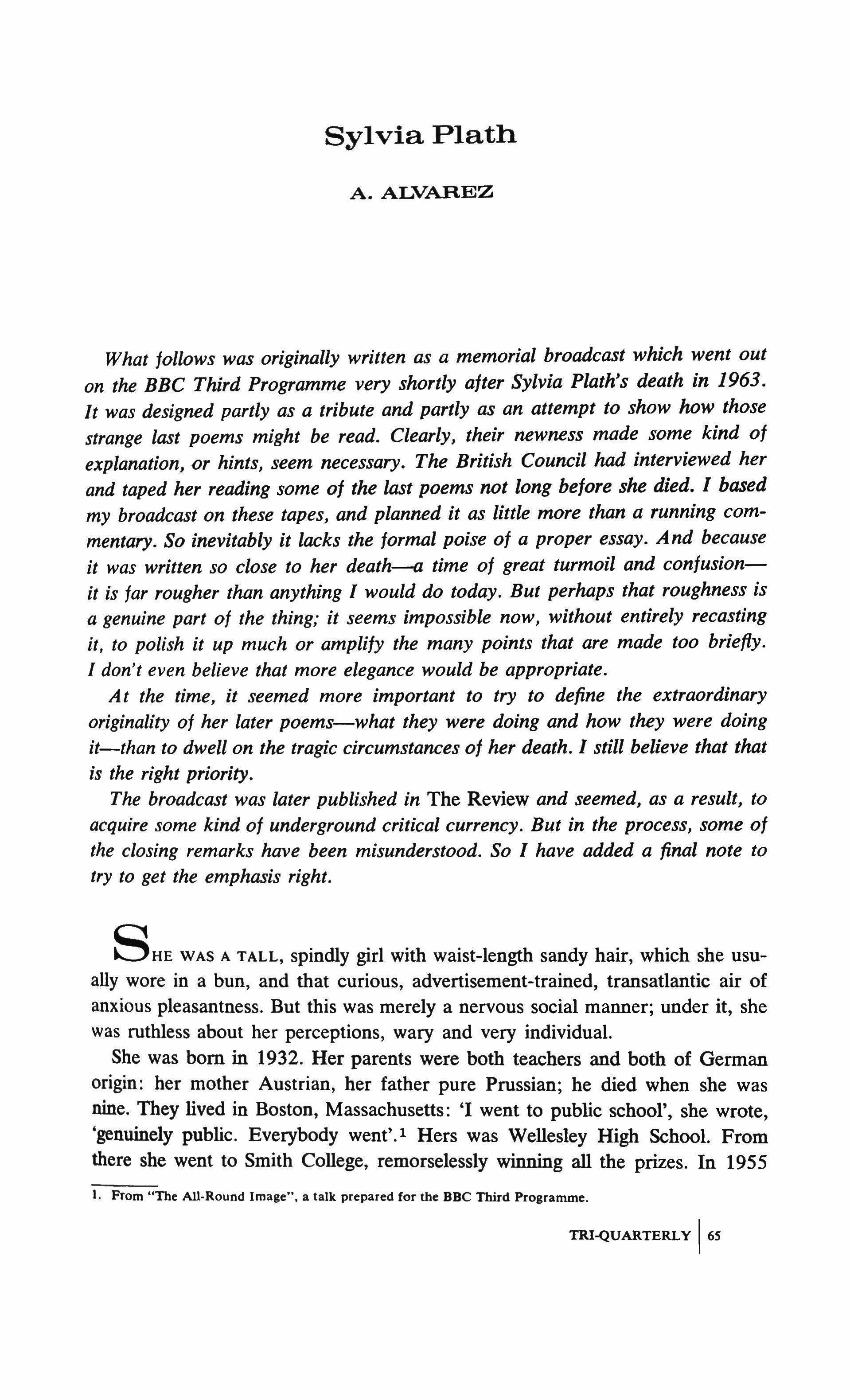
What [ollows was originally written as a memorial broadcast which went out on the BBC Third Programme very shortly after Sylvia Plath's death in 1963. It was designed partly as a tribute and partly as an attempt to show how those strange last poems might be read. Clearly, their newness made some kind oi explanation, or hints, seem necessary. The British Council had interviewed her and taped her reading some oi the last poems not long before she died. 1 based my broadcast on these tapes, and planned it as little more than a running commentary. So inevitably it lacks the jormal poise oj a proper essay. And because it was written so close to her death--a time oj great turmoil and conjusionit is jar rougher than anything I would do today. But perhaps that roughness is a genuine part oi the thing; it seems impossible now, without entirely recasting it, to polish it up much or ampliiy the many points that are made too briefiy. I don't even believe that more elegance would be appropriate.
A t the time, it seemed more important to try to define the extraordinary originality oi her later poems-what they were doing and how they were doing it-than to dwell on the tragic circumstances oi her death. I still believe that that is the right priority.
The broadcast was later published in The Review and seemed, as a result, to acquire some kind oi underground critical currency. But in the process, some oi the closing remarks have been misunderstood. So I have added a final note to try to get the emphasis right.
SHE WAS A TALL, spindly girl with waist-length sandy hair, which she usually wore in a bun, and that curious, advertisement-trained, transatlantic air of anxious pleasantness. But this was merely a nervous social manner; under it, she was ruthless about her perceptions, wary and very individual. She was born in 1932. Her parents were both teachers and both of German origin: her mother Austrian, her father pure Prussian; he died when she was nine. They lived in Boston, Massachusetts: 'I went to public school', she wrote, 'genuinely public. Everybody went'.! Hers was Wellesley High School. From there she went to Smith College, remorselessly winning all the prizes. In 1955
1. From "The All-Round Image". a talk prepared for the BBC Third Programme. TRI-QUARTERLy 165
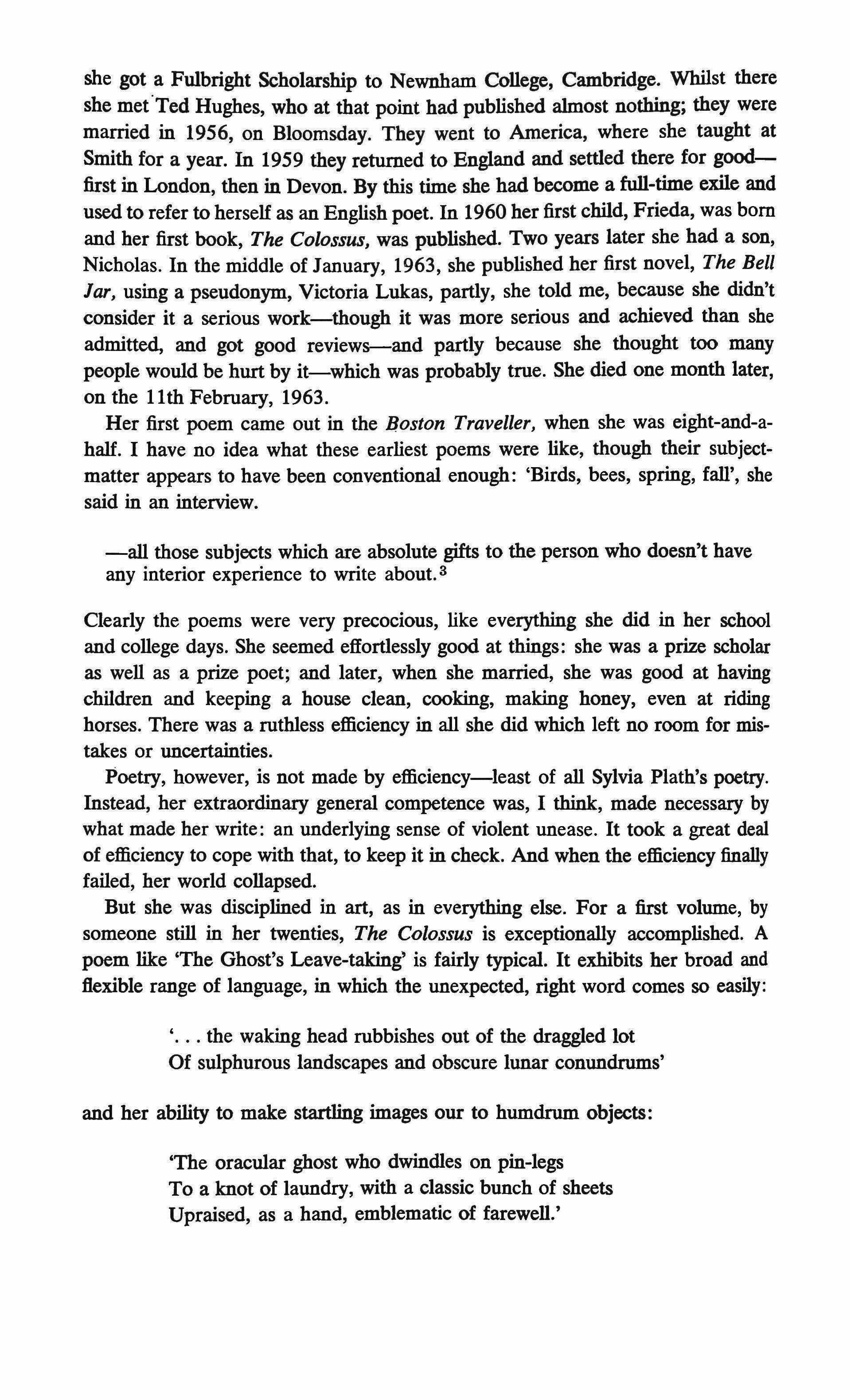
she got a Fulbright Scholarship to Newnham College, Cambridge. Whilst there she metTed Hughes, who at that point had published almost nothing; they were married in 1956, on Bloomsday. They went to America, where she taught at Smith for a year. In 1959 they returned to England and settled there for goodfirst in London, then in Devon. By this time she had become a full-time exile and used to refer to herself as an English poet. In 1960 her first child, Frieda, was born and her first book, The Colossus, was published. Two years later she had a son, Nicholas. In the middle of January, 1963, she published her first novel, The Bell Jar, using a pseudonym, Victoria Lukas, partly, she told me, because she didn't consider it a serious work-though it was more serious and achieved than she admitted, and got good reviews-and partly because she thought too many people would be hurt by it-which was probably true. She died one month later, on the 11th February, 1963.
Her first poem came out in the Boston Traveller, when she was eight-and-ahalf. I have no idea what these earliest poems were like, though their subjectmatter appears to have been conventional enough: 'Birds, bees, spring, fall', she said in an interview.
-all those subjects which are absolute gifts to the person who doesn't have any interior experience to write about. 3
Clearly the poems were very precocious, like everything she did in her school and college days. She seemed effortlessly good at things: she was a prize scholar as well as a prize poet; and later, when she married, she was good at having children and keeping a house clean, cooking, making honey, even at riding horses. There was a ruthless efficiency in all she did which left no room for mistakes or uncertainties.
Poetry, however, is not made by efficiency-least of all Sylvia Plath's poetry. Instead, her extraordinary general competence was, I think, made necessary by what made her write: an underlying sense of violent unease. It took a great deal of efficiency to cope with that, to keep it in check. And when the efficiency finally failed, her world collapsed.
But she was disciplined in art, as in everything else. For a first volume, by someone still in her twenties, The Colossus is exceptionally accomplished. A poem like 'The Ghost's Leave-taking' is fairly typical. It exhibits her broad and flexible range of language, in which the unexpected, right word comes so easily:
the waking head rubbishes out of the draggled lot Of sulphurous landscapes and obscure lunar conundrums'
and her ability to make startling images our to humdrum objects:
'The oracular ghost who dwindles on pin-legs
To a knot of laundry, with a classic bunch of sheets Upraised, as a hand, emblematic of farewell.'
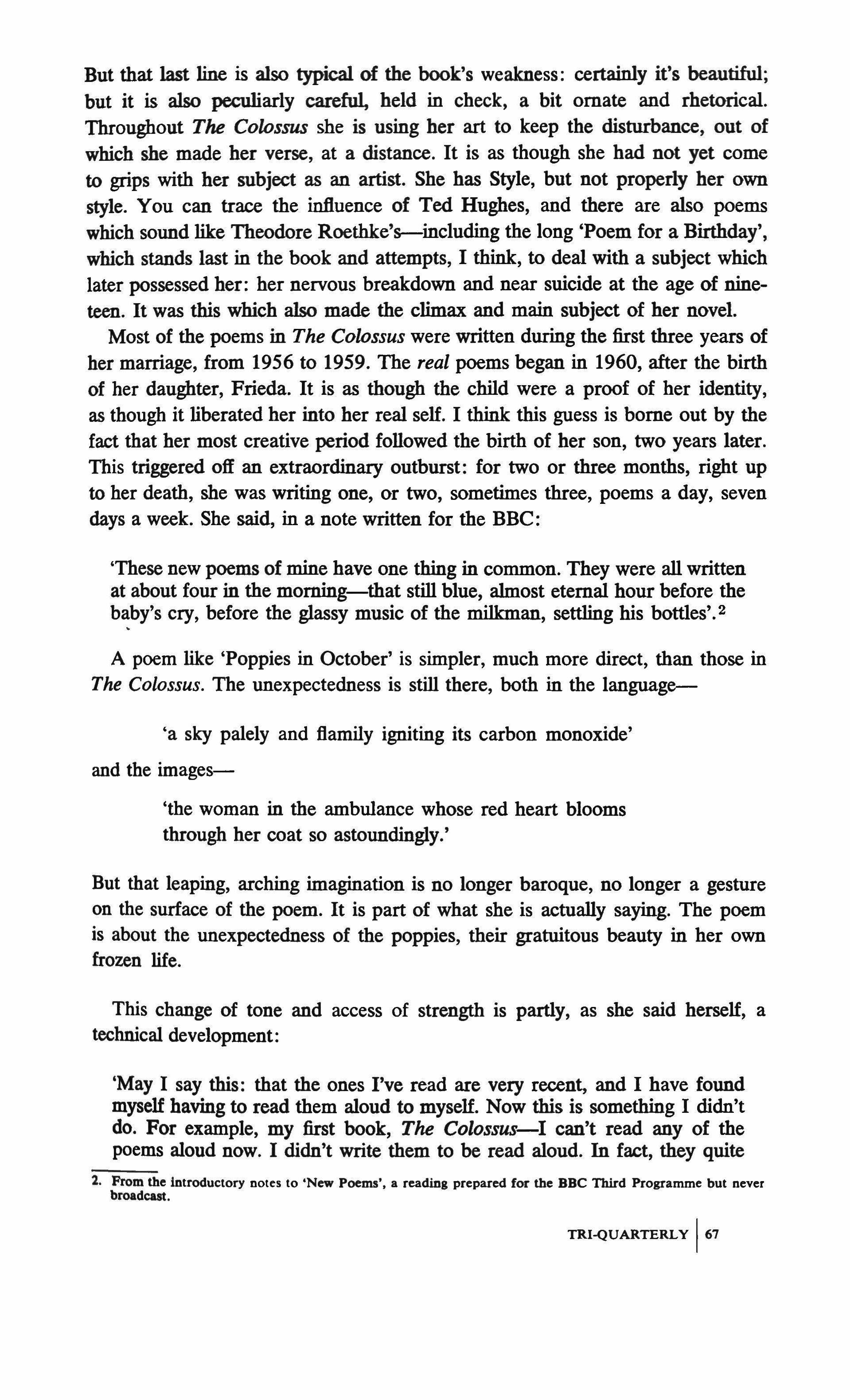
But that last line is also typical of the book's weakness: certainly it's beautiful; but it is also peculiarly careful, held in check, a bit ornate and rhetorical. Throughout The Colossus she is using her art to keep the disturbance, out of which she made her verse, at a distance. It is as though she had not yet come to grips with her subject as an artist. She has Style, but not properly her own style. You can trace the influence of Ted Hughes, and there are also poems which sound like Theodore Roethke's--including the long 'Poem for a Birthday', which stands last in the book and attempts, I think, to deal with a subject which later possessed her: her nervous breakdown and near suicide at the age of nineteen. It was this which also made the climax and main subject of her novel.
Most of the poems in The Colossus were written during the first three years of her marriage, from 1956 to 1959. The real poems began in 1960, after the birth of her daughter, Frieda. It is as though the child were a proof of her identity, as though it liberated her into her real self. I think this guess is borne out by the fact that her most creative period followed the birth of her son, two years later. This triggered off an extraordinary outburst: for two or three months, right up to her death, she was writing one, or two, sometimes three, poems a day, seven days a week. She said, in a note written for the BBC:
'These new poems of mine have one thing in common. They were all written at about four in the morning-that still blue, almost eternal hour before the baby's cry, before the glassy music of the milkman, settling his bottles'.»
A poem like 'Poppies in October' is simpler, much more direct, than those in The Colossus. The unexpectedness is still there, both in the language-
'a sky palely and flamily igniting its carbon monoxide' and the images'the woman in the ambulance whose red heart blooms through her coat so astoundingly.'
But that leaping, arching imagination is no longer baroque, no longer a gesture on the surface of the poem. It is part of what she is actually saying. The poem is about the unexpectedness of the poppies, their gratuitous beauty in her own frozen life.
This change of tone and access of strength is partly, as she said herself, a technical development:
'May I say this: that the ones I've read are very recent, and I have found myself having to read them aloud to myself. Now this is something I didn't do. For example, my first book, The Colossus-I can't read any of the poems aloud now. I didn't write them to be read aloud. In fact, they quite
2. From the introductory Dotes to 'New Poems', a reading prepared for the BBC Third Programme but Dever broadcast.

privately bore me. Now these very recent ones-I've got to say them. I speak them to myself. Whatever lucidity they may have comes from the fact that I say them aloud.' 3
The difference, in short, is between finger-count and ear-count; one measures the rhythm by rules, the other catches the movement by the inner disturbance it creates. And she could only 'write poems out loud' when she had discovered her own speaking voice; that is, her own identity.
The second main difference between this and her earlier verse is in the direct relevance of the experience. In 'The Ghost's Leave-taking' the subject is nominally very personal-it's about the way dreams stay with you when you first wake up--but the effect is predominantly of very brilliant scene-setting. In 'Poppies in October', on the other hand, what starts as a description finishes as a way of defining her own state of mind. This, I think, is the key to the later poems; the more vivid and imaginative the details are, the more resolutely she turns them inwards. The more objective they seem, the more subjective they, in fact, become. Take, for example, a poem about her favourite horse, 'Ariel'.
Stasis in darkness. Then the substanceless blue Pour of tor and distances.
God's lioness, How one we grow, Pivot of heels and knees!-The furrow
Splits and passes, sister to The brown arc Of the neck I cannot catch,
Nigger-eye Berries cast dark Hook'!:---
Black sweet blood mouthfuls, Shadows.
Something else
Hauls me through air'--Thighs, hair; Flakes from my heels.
White
Godiva, I unpeel--Dead hands, dead stringencies.
And now I Foam to wheat, a glitter of seas. The child's cry
3. From an interview and reading of poems made by her for the British Council.
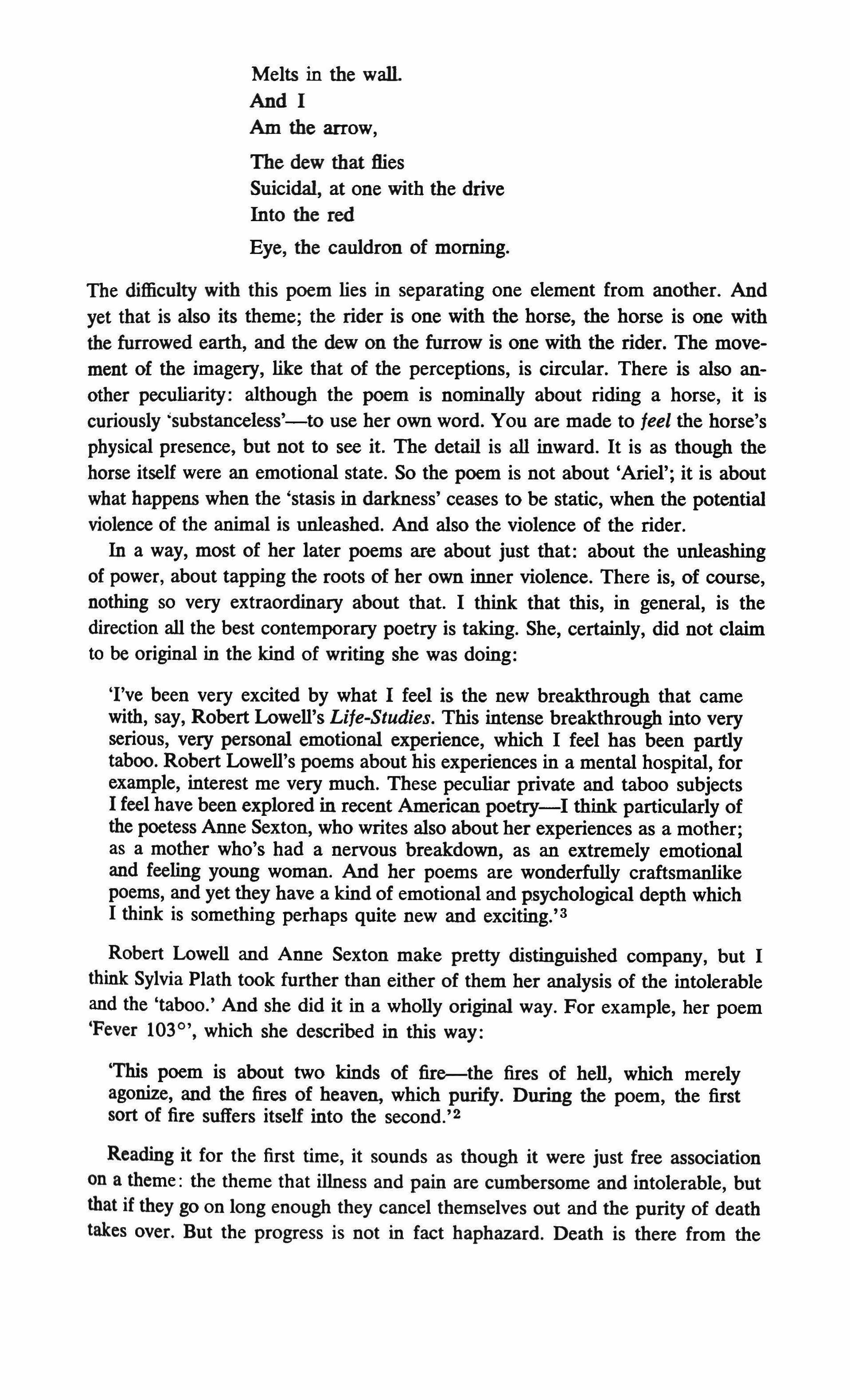
Melts in the wall. And I
Am the arrow,
The dew that flies Suicidal, at one with the drive Into the red Eye, the cauldron of morning.
The difficulty with this poem lies in separating one element from another. And yet that is also its theme; the rider is one with the horse, the horse is one with the furrowed earth, and the dew on the furrow is one with the rider. The movement of the imagery, like that of the perceptions, is circular. There is also another peculiarity: although the poem is nominally about riding a horse, it is curiously 'substanceless'-to use her own word. You are made to feel the horse's physical presence, but not to see it. The detail is all inward. It is as though the horse itself were an emotional state. So the poem is not about 'Ariel'; it is about what happens when the 'stasis in darkness' ceases to be static, when the potential violence of the animal is unleashed. And also the violence of the rider.
In a way, most of her later poems are about just that: about the unleashing of power, about tapping the roots of her own inner violence. There is, of course, nothing so very extraordinary about that. I think that this, in general, is the direction all the best contemporary poetry is taking. She, certainly, did not claim to be original in the kind of writing she was doing:
'I've been very excited by what I feel is the new breakthrough that came with, say, Robert Lowell's Life-Studies. This intense breakthrough into very serious, very personal emotional experience, which I feel has been partly taboo. Robert Lowell's poems about his experiences in a mental hospital, for example, interest me very much. These peculiar private and taboo subjects I feel have been explored in recent American poetry-I think particularly of the poetess Anne Sexton, who writes also about her experiences as a mother; as a mother who's had a nervous breakdown, as an extremely emotional and feeling young woman. And her poems are wonderfully craftsmanlike poems, and yet they have a kind of emotional and psychological depth which I think is something perhaps quite new and exciting.' 3
Robert Lowell and Anne Sexton make pretty distinguished company, but I think Sylvia Plath took further than either of them her analysis of the intolerable and the 'taboo.' And she did it in a wholly original way. For example, her poem 'Fever 103°', which she described in this way:
'This poem is about two kinds of fire-the fires of hell, which merely agonize, and the fires of heaven, which purify. During the poem, the first sort of fire suffers itself into the second.v
Reading it for the first time, it sounds as though it were just free association on a theme: the theme that illness and pain are cumbersome and intolerable, but that if they go on long enough they cancel themselves out and the purity of death takes over. But the progress is not in fact haphazard. Death is there from the
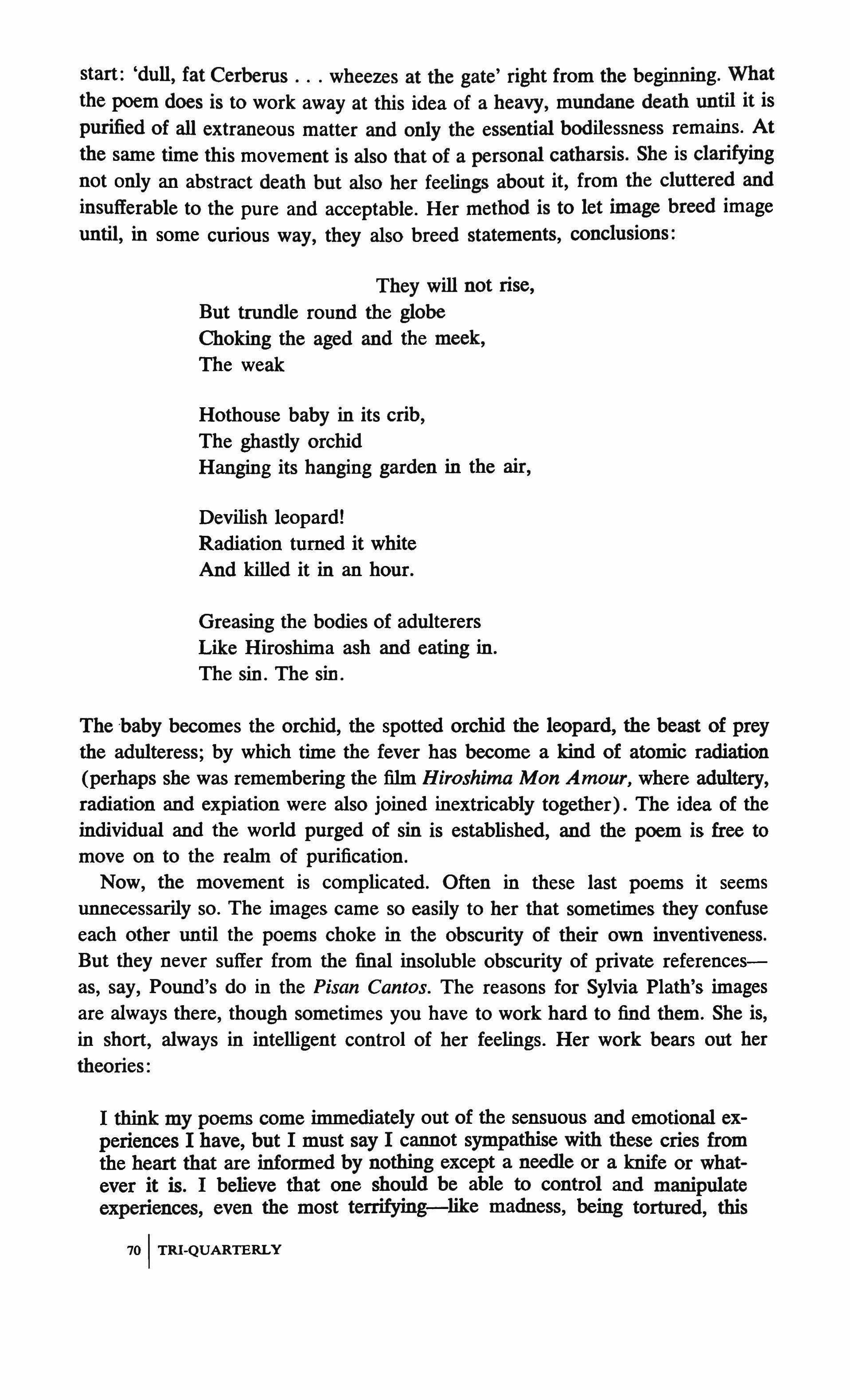
start: 'dull, fat Cerberus
wheezes at the gate' right from the beginning. What the poem does is to work away at this idea of a heavy, mundane death until it is purified of all extraneous matter and only the essential bodilessness remains. At the same time this movement is also that of a personal catharsis. She is clarifying not only an abstract death but also her feelings about it, from the cluttered and insufferable to the pure and acceptable. Her method is to let image breed image until, in some curious way, they also breed statements, conclusions:
They will not rise,
But trundle round the globe
Choking the aged and the meek,
The weak
Hothouse baby in its crib, The ghastly orchid
Hanging its hanging garden in the air,
Devilish leopard!
Radiation turned it white
And killed it in an hour.
Greasing the bodies of adulterers
Like Hiroshima ash and eating in.
The sin. The sin.
The ·baby becomes the orchid, the spotted orchid the leopard, the beast of prey the adulteress; by which time the fever has become a kind of atomic radiation (perhaps she was remembering the film Hiroshima Mon Amour, where adultery, radiation and expiation were also joined inextricably together). The idea of the individual and the world purged of sin is established, and the poem is free to move on to the realm of purification.
Now, the movement is complicated. Often in these last poems it seems unnecessarily so. The images came so easily to her that sometimes they confuse each other until the poems choke in the obscurity of their own inventiveness. But they never suffer from the final insoluble obscurity of private referencesas, say, Pound's do in the Pisan Cantos. The reasons for Sylvia Plath's images are always there, though sometimes you have to work hard to find them. She is, in short, always in intelligent control of her feelings. Her work bears out her theories:
I think my poems come immediately out of the sensuous and emotional experiences I have, but I must say I cannot sympathise with these cries from the heart that are informed by nothing except a needle or a knife or whatever it is. I believe that one should be able to control and manipulate experiences, even the most terrifying-like madness, being tortured, this

kind of experience and one should be able to manipulate these experiences with an informed and intelligent mind. I think: that personal experience shouldn't be a kind of shut box and mirror-looking narcissistic experience. I believe it should be generally relevant, to such things as Hiroshima and Dachau, and so on.3
It seems to me that it was only by her determination both to face her most inward and terrifying experiences and to use her intelligence in doing so-so as not to be overwhelmed by them-that she managed to write these extraordinary last poems, which are at once deeply autobiographical and yet detached, generally relevant.
'Lady Lazarus' is a stage further on from 'Fever 103°'; its subject is the total purification of achieved death. It is also far more intimately concerned with the drift of Sylvia Plath's life. The deaths of Lady Lazarus correspond to her own crises: the first just after her father died, the second when she had her nervous breakdown, the third perhaps a presentiment of the death that was shortly to come. Maybe this closeness of the subject helped make the poem so direct. The details don't clog each other: they are swept forward by the current of immediate feeling, marshalled by it and ordered. But what is remarkable about the poem is the objectivity with which she handles such personal material. She is not just talking about her own private suffering. Instead, it is the very closeness of her pain which gives it a general meaning; through it she assumes the suffering of all the modem victims. Above all, she becomes an imaginary Jew. I think this is a vitally important element in her work. For two reasons. First, because anyone whose subject is suffering has a ready-made modern example of hell on earth in the concentration camps. And what matters in them is not so much the physical torture-since sadism is general and perennial-but the way modem, as it were industrial, techniques can be used to destroy utterly the human identity. Individual suffering can be heroic provided it leaves the person who suffers a sense of his own individuality-provided, that is, there is an illusion of choice remaining to him. But when suffering is mass-produced, men and women become as equal and identity-less as objects on an assembly line, and nothing remains-certainly no values, no humanity. This anonymity of pain, which makes all dignity impossible, was Sylvia Plath's subject. Second, she seemed convinced, in these last poems, that the root of her suffering was the death of her father, whom she loved, who abandoned her and who dragged her after him into death. And her father was pure German, pure Aryan, pure antisemite.
It all comes together in the most powerful of her last poems, 'Daddy' (see p. 32), about which she wrote the following bleak note:
The poem is spoken by a girl with an Electra complex. Her father died while she thought he was God. Her case is complicated by the fact that her father was also a Nazi and her mother very possibly part Jewish. In the daughter the two strains marry and paralyze each other-she has to act out the awful little allegory before she is free of it. 2
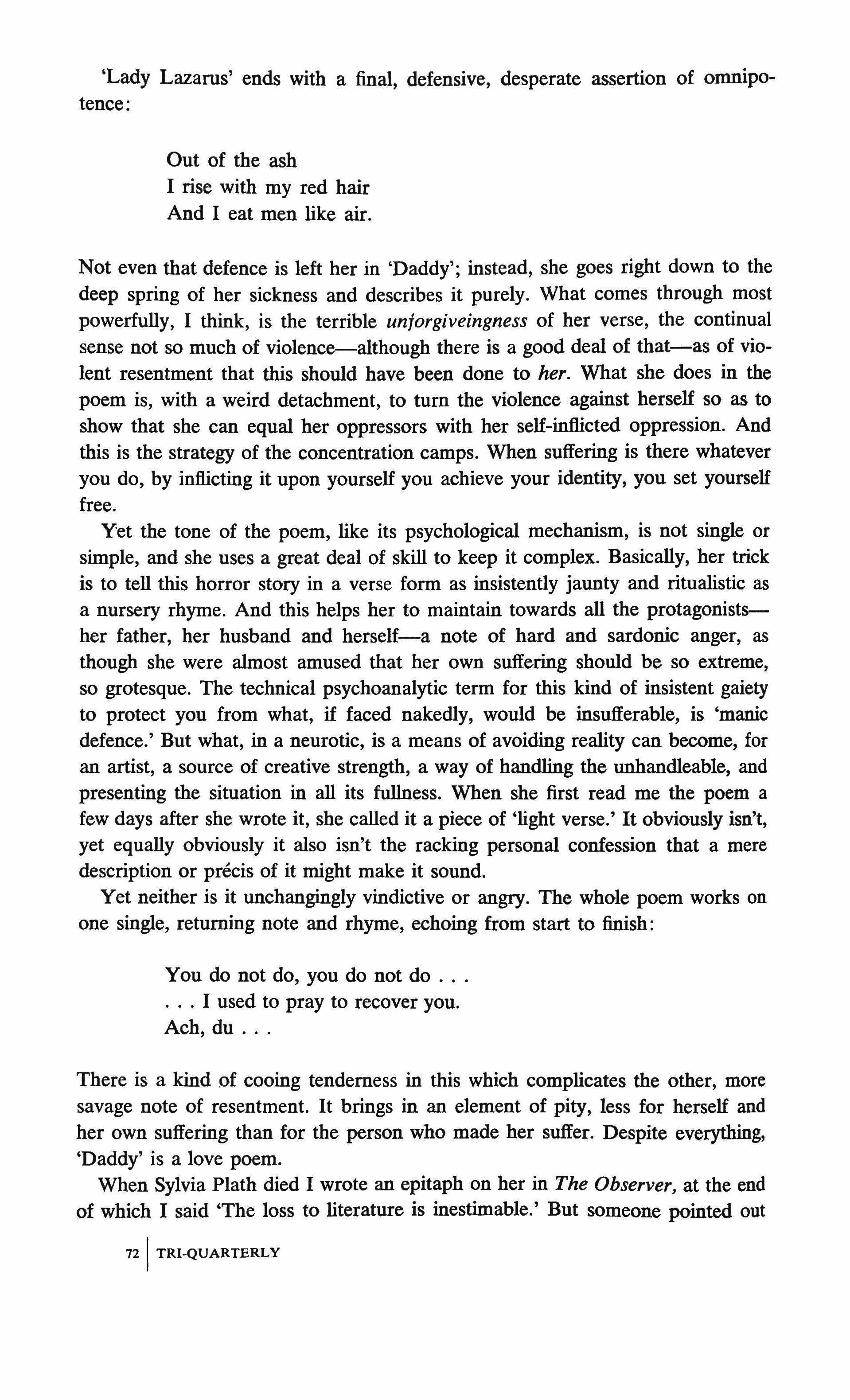
'Lady Lazarus' ends with a final, defensive, desperate assertion of omnipotence:
Out of the ash
I rise with my red hair
And I eat men like air.
Not even that defence is left her in 'Daddy'; instead, she goes right down to the deep spring of her sickness and describes it purely. What comes through most powerfully, I think, is the terrible unjorgiveingness of her verse, the continual sense not so much of violence-although there is a good deal of that-as of violent resentment that this should have been done to her. What she does in the poem is, with a weird detachment, to tum the violence against herself so as to show that she can equal her oppressors with her self-inflicted oppression. And this is the strategy of the concentration camps. When suffering is there whatever you do, by inflicting it upon yourself you achieve your identity, you set yourself free.
Yet the tone of the poem, like its psychological mechanism, is not single or simple, and she uses a great deal of skill to keep it complex. Basically, her trick is to tell this horror story in a verse form as insistently jaunty and ritualistic as a nursery rhyme. And this helps her to maintain towards all the protagonistsher father, her husband and herself-a note of hard and sardonic anger, as though she were almost amused that her own suffering should be so extreme, so grotesque. The technical psychoanalytic term for this kind of insistent gaiety to protect you from what, if faced nakedly, would be insufferable, is 'manic defence.' But what, in a neurotic, is a means of avoiding reality can become, for an artist, a source of creative strength, a way of handling the unhandleable, and presenting the situation in all its fullness. When she first read me the poem a few days after she wrote it, she called it a piece of 'light verse.' It obviously isn't, yet equally obviously it also isn't the racking personal confession that a mere description or precis of it might make it sound.
Yet neither is it unchangingly vindictive or angry. The whole poem works on one single, returning note and rhyme, echoing from start to finish:
You do not do, you do not do I used to pray to recover you.
Ach, du
There is a kind of cooing tenderness in this which complicates the other, more savage note of resentment. It brings in an element of pity, less for herself and her own suffering than for the person who made her suffer. Despite everything, 'Daddy' is a love poem.
When Sylvia Plath died I wrote an epitaph on her in The Observer, at the end of which I said 'The loss to literature is inestimable.' But someone pointed out

to me that this wasn't quite true. The achievement of her final style is to make poetry and death inseparable. The one could not exist without the other. And this is right. In a curious way, the poems read as though they were written posthumously. It needed not only great intelligence and insight to handle the material of them, it also took a kind of bravery. Poetry of this order is a murderous art.
Postscript, 1966.
These final remarks seem to have caused some confusion. I was not in any sense meaning to imply that breakdown or suicide is a validation of what I now call Extremist poetry. No amount of personal horror will make a good poet out of a bad one. Rather, the opposite: to know from evidence outside the poetry that a man has suffered a great deal will throw into high relief just how much he lacks as an artist.
I was also not in any sense meaning to imply that a breakdown or suicide is the necessary corollary or result of Extremist work. Obviously, the poet is not obliged to prove in his life that what he writes about is genuine. After all, he is a poet by virtue of his ability to create an imaginative world which has an objective existence apart from him. The poetry is its own proof. Indeed, the chances are that the more hip the art, the squarer the life of the artist who creates it. A genuinely hip life leaves little time for art.
But I did mean to imply that this kind of writing involves an element of risk. The Extremist artist sets out deliberately to explore the roots of his emotions, the obscurest springs of his personality, maybe even the sickness he feels himself to be prey to, 'giving himself over to it,' as I have written elsewhere, 'for the sake of the range and intensity of his art.» It is precisely here that the risk lies. I do not personally believe in the classical Freudian argument that art is therapeutic, that the artist is relieved of his fantasies by expressing them. On the contrary, the weird logic of art seems to be that the act of formal expression merely makes the dredged-up material more readily available to the artist. So the result of handling it in his art may well be that he finds himself living it out. Keats is the prime example of this devious mechanism: the poems of his great periodfrom the second Hyperion onwards-are all about death. Apparently, this great creative outburst was triggered off by nursing his brother Tom through his final illness. But if Tom's death were the cause, Keats' own may have been the ultimate effect. He had, that is, pushed death so much to the foreground of his consciousness that it became unavoidable; having written the poems there was nothing left for him to do except die.
I think much the same happened with Sylvia Plath. The very source of her creative energy was, it turned out, her self-destructiveness. But it was, precisely, a Source of living energy, of her imaginative, creative power. So, though death itself may have been a side-issue, it was also an unavoidable risk in writing her kind of poem. My own impression of the circumstances surrounding her eventual 4. Under Pressure, Penguin, 1965, p. 185.
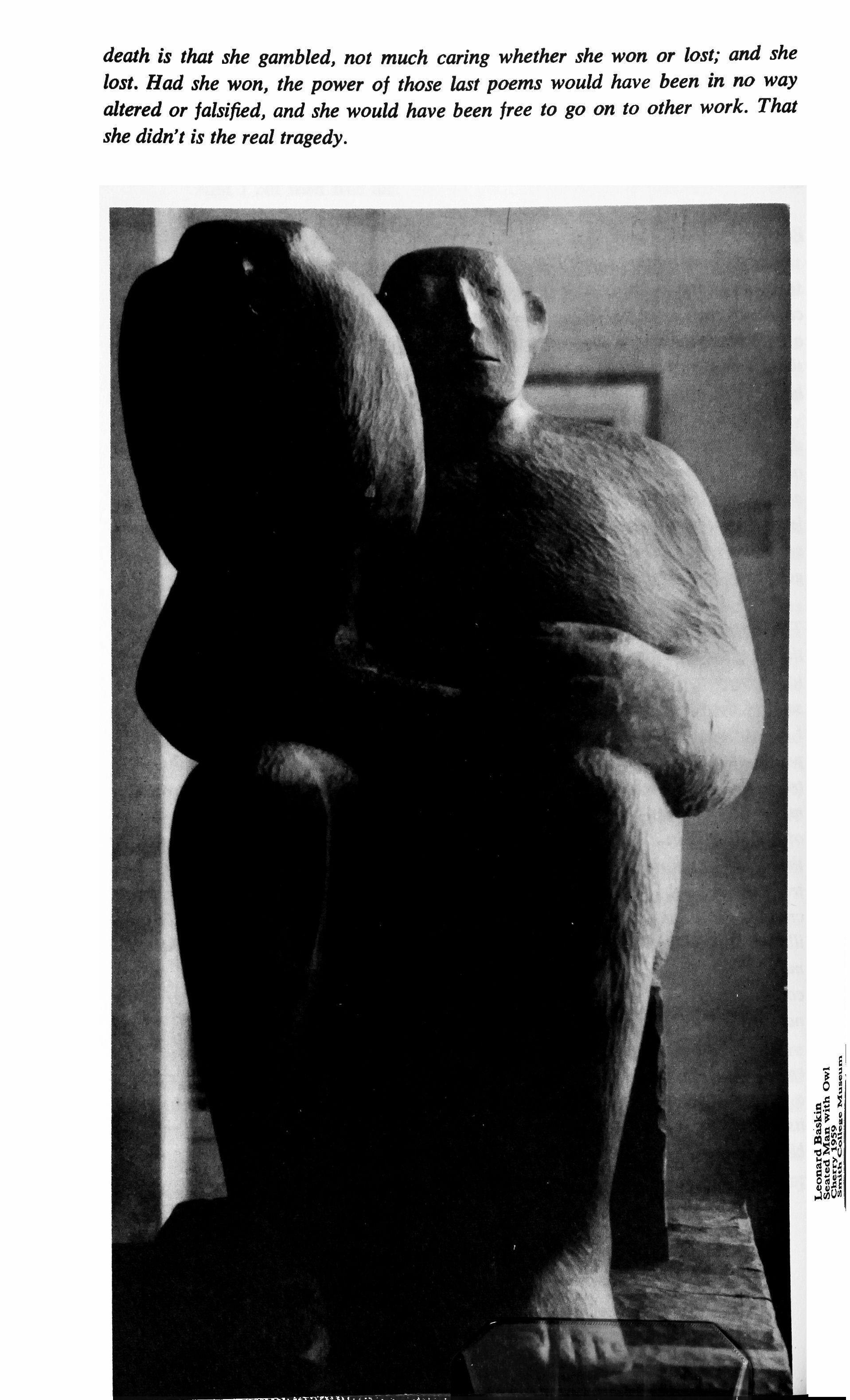
death is that she gambled, not much caring whether she won or lost; and she lost. Had she won, the power of those last poems would have been in no way altered or falsified, and she would have been free to go on to other work. That she didn't is the real tragedy.
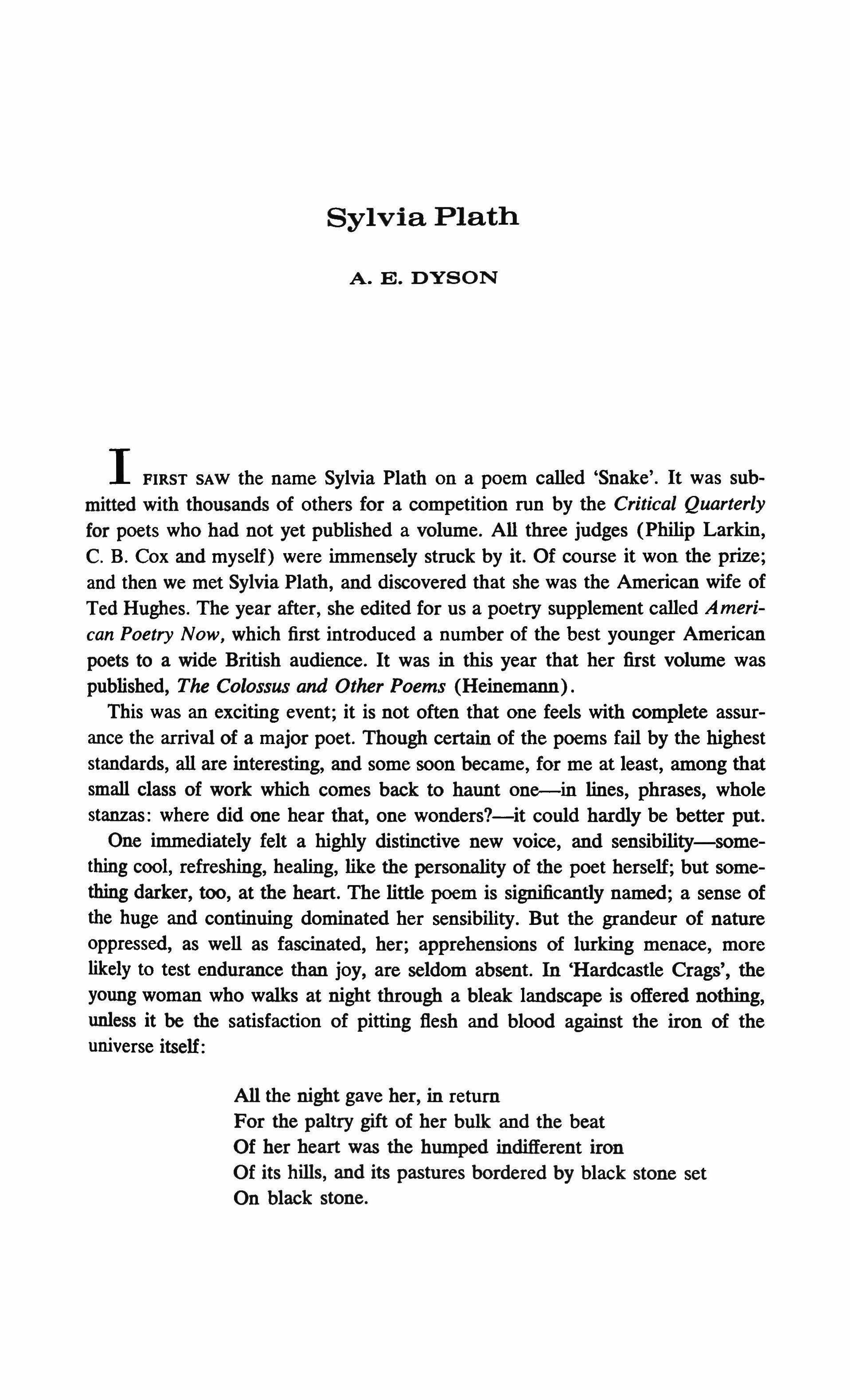
IFIRST SAW the name Sylvia Plath on a poem called 'Snake'. It was submitted with thousands of others for a competition run by the Critical Quarterly for poets who had not yet published a volume. All three judges (Philip Larkin, C. B. Cox and myself) were immensely struck by it. Of course it won the prize; and then we met Sylvia Plath, and discovered that she was the American wife of Ted Hughes. The year after, she edited for us a poetry supplement called American Poetry Now, which first introduced a number of the best younger American poets to a wide British audience. It was in this year that her first volume was published, The Colossus and Other Poems (Heinemann).
This was an exciting event; it is not often that one feels with complete assurance the arrival of a major poet. Though certain of the poems fail by the highest standards, all are interesting, and some soon became, for me at least, among that small class of work which comes back to haunt one-s-in lines, phrases, whole stanzas: where did one hear that, one wonders?-it could hardly be better put.
One immediately felt a highly distinctive new voice, and sensibility-something cool, refreshing, healing, like the personality of the poet herself; but something darker, too, at the heart. The little poem is significantly named; a sense of the huge and continuing dominated her sensibility. But the grandeur of nature oppressed, as well as fascinated, her; apprehensions of lurking menace, more likely to test endurance than joy, are seldom absent. In 'Hardcastle Crags', the young woman who walks at night through a bleak landscape is offered nothing, unless it be the satisfaction of pitting flesh and blood against the iron of the universe itself:
All the night gave her, in return
For the paltry gift of her bulk and the beat Of her heart was the humped indifferent iron
Of its hills, and its pastures bordered by black stone set On black stone.

In battling with the encroachments of rock, wind, the sea which is 'brutal endlessly', a temporary, almost humdrum heroism may be earned, as poems like 'Point Shirley' and 'The Hermit at Outermost House' suggest; but nature outlasts man, and wins again in the end:
A labour of love and that labour lost. Steadily the sea
Eats at Point Shirley.
When Sylvia Plath encountered a landscape that had been tamed and reduced by a man, she responded as to a type of trifling. Walking in Granchester Meadows, since Rupert Brooke the very touchstone of English nostalgia, she notes that 'Nothing is big or far'. The birds are 'thumb-size', the cygnets 'tame', the Granta 'bland', the water rats 'droll'. Even the students, lost in a 'rnoony indolence of love', are unmenaced, and therefore somewhat unreal. 'It is a country on a nursery plate', a pretty place, but Sylvia Plath was more at home when she sensed behind nature its naked inhospitality to man.
Wind and sea were only the more natural of the forces she detected waiting to batter or supplant the human race, or patiently take over when it was gone. In 'Ouija', there is an eerie evocation of 'those unborn, those undone' as they crowd into the seance room, drawn to the living by envy:
Imagine their deep hunger, deep as the dark
For the blood-heat that would ruddle or reclaim.
In 'The Thin People', the threat comes from devitalised humanity, from those who in Blake's words 'restrain Desire because theirs is weak enough to be restrained', who having resisted energy, put the 'Giants who formed the world into its sensual existence' in chains. Sylvia Plath sees the thin folk as a menace, as Blake does, but she fears too 'their talent to persevere/ In thinness, to come, later, IInto our bad dreams'. In 'Mushrooms', the quality of menace is even more chillingly detected, in the sinister, almost cancerous proliferation of fungus. This macabrely ironic vision of a form of life infinitely lower than man, simply waiting in endless patience to 'Inherit the earth', has the vividness of science fiction at its best, without being in the least sensational. (The associations which the word 'mushroom' have for us since Hiroshima may enhance the effectiveness, which is not, however, dependent upon them). In 'Sculptor', by a further surprising stroke, the forms the sculptor is about to create are felt as bodiless realities waiting to use him for incarnation, after which they will both dwarf and outlast him:
His chisel bequeathes Them life livelier than ours.

The theme sounds again in 'Frog Autumn', and in the longer 'Mussel Hunter at Rock Harbour'. Perhaps the most remarkable variant, however, is in 'All the Dead Dears', a poem which starts, as a note informs us, from the Archeological Museum in Cambridge, where there is 'a stone coffin of the fourth century A. D. containing the skeletons of a woman, a mouse and a shrew. The ankle-bone of the woman has been slightly gnawn'. From the stark statement:
These three, unmasked now, bear
Dry witness
To the gross eating game
the poet goes on to sense, in the long dead, a host waiting to revisit the living in memories, and later claim them to itself:
How they grip us through thick and thin,
These barnacle dead!
This lady here's no kin
Of mine, yet kin she is: she'll suck
Blood and whistle my marrow clean
To prove it
And then this inexorable community is still more strikingly explored, in a manner reminding us again of 'Ouija' and 'Mushrooms', whilst reaching even nearer, perhaps, to the heart of the thematic menace:
All the long gone darlings: they
Get back, though, soon,
Soon: be it by wakes, weddings, Childbirths or a family barbecue:
Any touch, taste, tang's
Fit for those outlaws to ride home on,
And to sanctuary: usurping the armchair
Between tick
And tack of the clock, until we go, Each skulled-and-crossboned Gulliver
Riddled with ghosts, to lie
Deadlocked with them, taking root as cradles rock.
The affinity which Sylvia Plath felt with the dead and the alien was not unlike a form of pity; a conviction of kinship with everything that lives or has lived, however inaccessible or sinister. Her feeling for animals is similar in kind, not only in 'Frog Autumn' and 'Mussel Hunter at Rock Harbour', but in one of the most moving of her earlier poems, 'Blue Moles'.
TRI-QUARTERLY 177
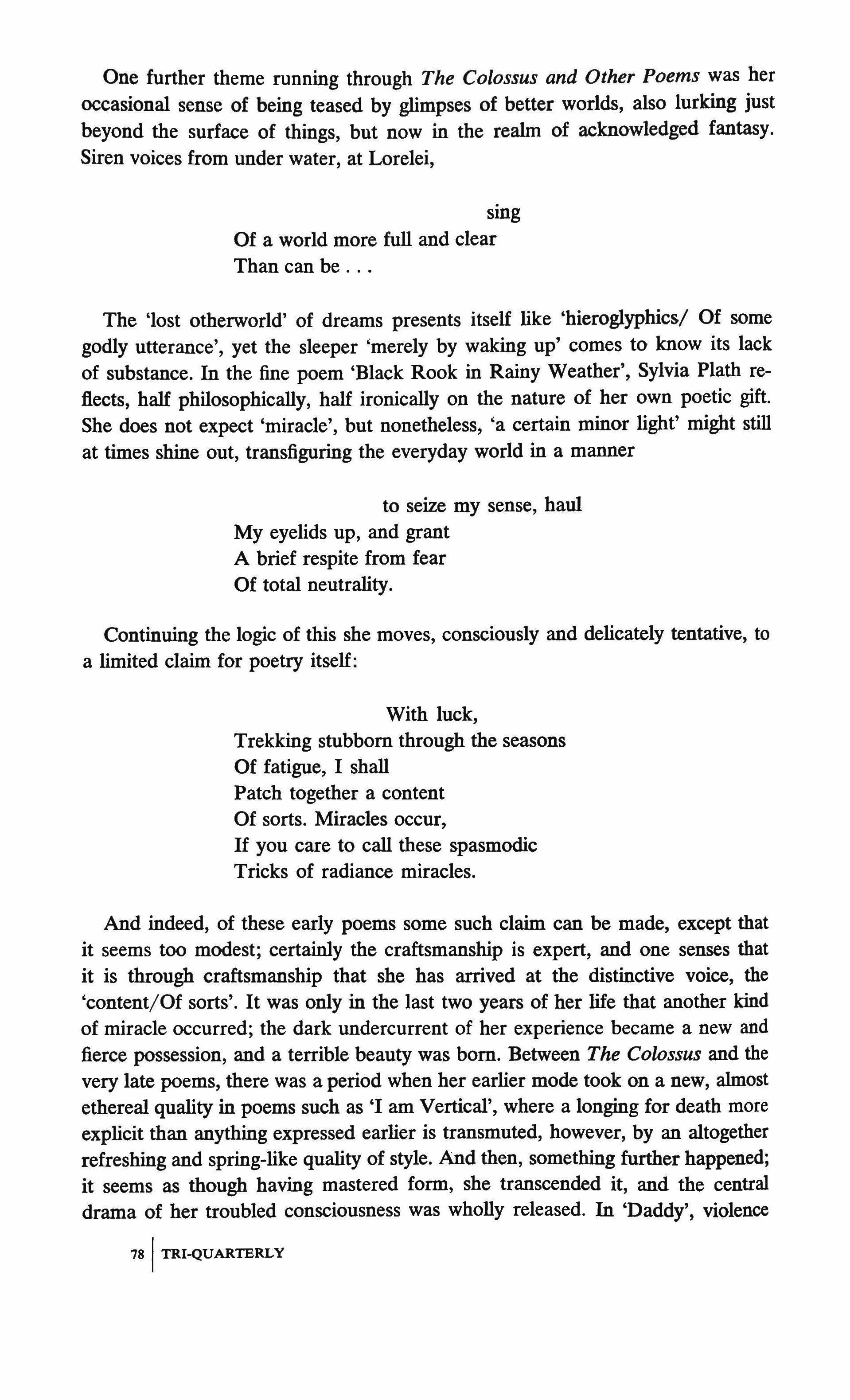
One further theme running through The Colossus and Other Poems was her occasional sense of being teased by glimpses of better worlds, also lurking just beyond the surface of things, but now in the realm of acknowledged fantasy. Siren voices from under water, at Lorelei, sing
Of a world more full and clear
Than can be
The 'lost otherworld' of dreams presents itself like 'hieroglyphics/ Of some godly utterance', yet the sleeper 'merely by waking up' comes to know its lack of substance. In the fine poem 'Black Rook in Rainy Weather', Sylvia Plath reflects, half philosophically, half ironically on the nature of her own poetic gift. She does not expect 'miracle', but nonetheless, 'a certain minor light' might still at times shine out, transfiguring the everyday world in a manner
to seize my sense, haul
My eyelids up, and grant A brief respite from fear
Of total neutrality.
Continuing the logic of this she moves, consciously and delicately tentative, to a limited claim for poetry itself:
With luck,
Trekking stubborn through the seasons
Of fatigue, I shall Patch together a content
Of sorts. Miracles occur,
If you care to call these spasmodic Tricks of radiance miracles.
And indeed, of these early poems some such claim can be made, except that it seems too modest; certainly the craftsmanship is expert, and one senses that it is through craftsmanship that she has arrived at the distinctive voice, the 'content/Of sorts'. It was only in the last two years of her life that another kind of miracle occurred; the dark undercurrent of her experience became a new and fierce possession, and a terrible beauty was born. Between The Colossus and the very late poems, there was a period when her earlier mode took on a new, almost ethereal quality in poems such as 'I am Vertical', where a longing for death more explicit than anything expressed earlier is transmuted, however, by an altogether refreshing and spring-like quality of style. And then, something further happened; it seems as though having mastered form, she transcended it, and the central drama of her troubled consciousness was wholly released. In 'Daddy', violence 781 TRI-QUARTERLY

erupts through the poem's powerful rhythm, which seems generated, however, by the actual experience of the poem, and imbued with organic life. The rhythm is hinted at in the first stanza, temporarily lost in the second, recovered powerfully but still fitfully in the next six; and then from stanza nine onwards it takes over completely, as though generated by the creative ferment itself. And in two of the other unforgettable poems of this period-"Lady Lazarus" and "A Birthday Present"-something altogether exalted and ecstatic controls the verse. In literary terms, one is aware of the influence of Robert Lowell, and of Sylvia Plath's close friend of genius, Anne Sexton; but the label 'confessional' poetry, which has already been used to link them, seems more inadequate, even, than labels usually do. Certainly much of the greatest poetry since the Romantics (since Shakespeare, indeed) has dealt with the deranged mind; with the paradox of wisdom and folly, of true vision wholly alienated from the rational mind. In Sylvia Plath, it is as though the poet finds in personal experience a depth of derangement, but then, in the magnificent sanity of creation, transmutes this into a myth for her age. As Professor Alun Jones put it in a fine article: *
T. S. Eliot's assertion that, 'The more perfect the artist, the more completely separate in him will be the man who suffers and the mind which creates' indicates the dualism that is operating in these poems, for in so far as the persons represents the 'man who suffers', the artist creates the poem within which the suffering is contained and given meaning. If the man is patient and passive under suffering, the creative mind is certainly both agent and active. The creative mind-which is largely released and refined in suffering-knows freedom and achieves Grace, through the act of creation itself. The poet exercises his traditional power in using the beneficent passion of poetry to expel the malignant forces of private suffering.
This puts its finger on one aspect of these amazing poems: our sense that, unlike much Beat poetry, they are not the expression only, but the transmutation, of suffering; that they are in the highest degree creative art, and that in art, there is healing of a kind.
Yet what healing, one is forced to wonder?-few poems are more searing in their impact, or more unanswerable. Perhaps it is in the use of Nazi imagery that their challenge is intensified; if this suffering is the private hell of paranoia, it is an image, too, of the world that we know. It is this bifocal vision which reminds one, irresistably, of Kafka, and disturbs with the same kind of power. One cannot forget that Anne Sexton quotes as her epigraph phrases from a letter Kafka wrote to Oskar Pollak:
the books we need are the kind that act upon us like a misfortune, that make us suffer like the death of someone we love more than ourselves, that make us feel as though we were on the verge of suicide, or lost in a forest remote from all human habitation-a book should serve as the axe for the frozen sea within us.
°A. R. Jones, 'Necessity and Freedom: The Poetry of Robert Lowell Sylvia Plath and Anne Sexton' (Critical Quarterly, Vol. VII. No. I., 1965). ".

In Sylvia Plath's last poems, as in the work of Robert Lowell and Anne Sexton, we are reminded that the Modem Movement as Kafka himself exemplified it, is not dead, but still with us; that its mutations are if anything more terrifying than those we have learned to accept in Yeats, Eliot and Joyce; that an art which does confront our present nuclear world fully and totally must be an art on the brink of the abyss; that perhaps the creative mind exploring its innermost anguish is the only mirror art can hold up to us today.
The paradoxes of Sylvia Plath's last poems are inexhaustible. In "Lady Lazarus" she faces with bitter irony our modem response to the miraculous; but in a poem where the miracle of dignity, at least, is achieved. No reader of the poem can respond like the crowd depicted in the poem; there remains this tincture of salvation in art.

IN A POET whose development was as phenomenal as hers, the chronological order of the poems is an important help to understanding them. Most readers will perceive pretty readily the single centre of power and light which her poems all share, but I think it will be a service if I point out just how little of her poetry is 'occasional,' and how faithfully her separate poems build up into one long poem. She faced a task in herself, and her poetry is the record of her progress in the task. The poems are chapters in a mythology where the plot, seen as a whole and in retrospect, is strong and clear--even if the origins of it and the dramatis personae, are at bottom enigmatic. Her poetry has been called "confessional and personal," and connected with the school of Robert Lowell and Anne Sexton. She admired both these poets, and knew them personally, and they both had an effect on her. And she shares with them the central experience of a shattering of the self, and the labour of fitting it together again or finding a new one. She also shared with them the East Massachusetts homeland. But the connection goes no further. Her poetic strategies, the poetic events she draws out of her experience of disintegration and renewal, the radiant, visionary light in which she encounters her family and the realities of her daily life, are quite different in kind from anything one finds in Robert Lowell's poetry, or Anne Sexton's. Their work is truly autobiographical and personal, and their final world is a torture cell walled with family portraits, with the daily newspaper coming under the door. The autobiographical details in Sylvia Plath's poetry work differently. She sets them out like masks, which are then lifted up by dramatis personae of nearly supernatural qualities. The world of her poetry is one of emblematic visionary events, mathematical symmetries, clairvoyance, metamorphoses, and something resembling total biological and racial recall. And the whole scene lies under the
TRI-QUARTERLy lSI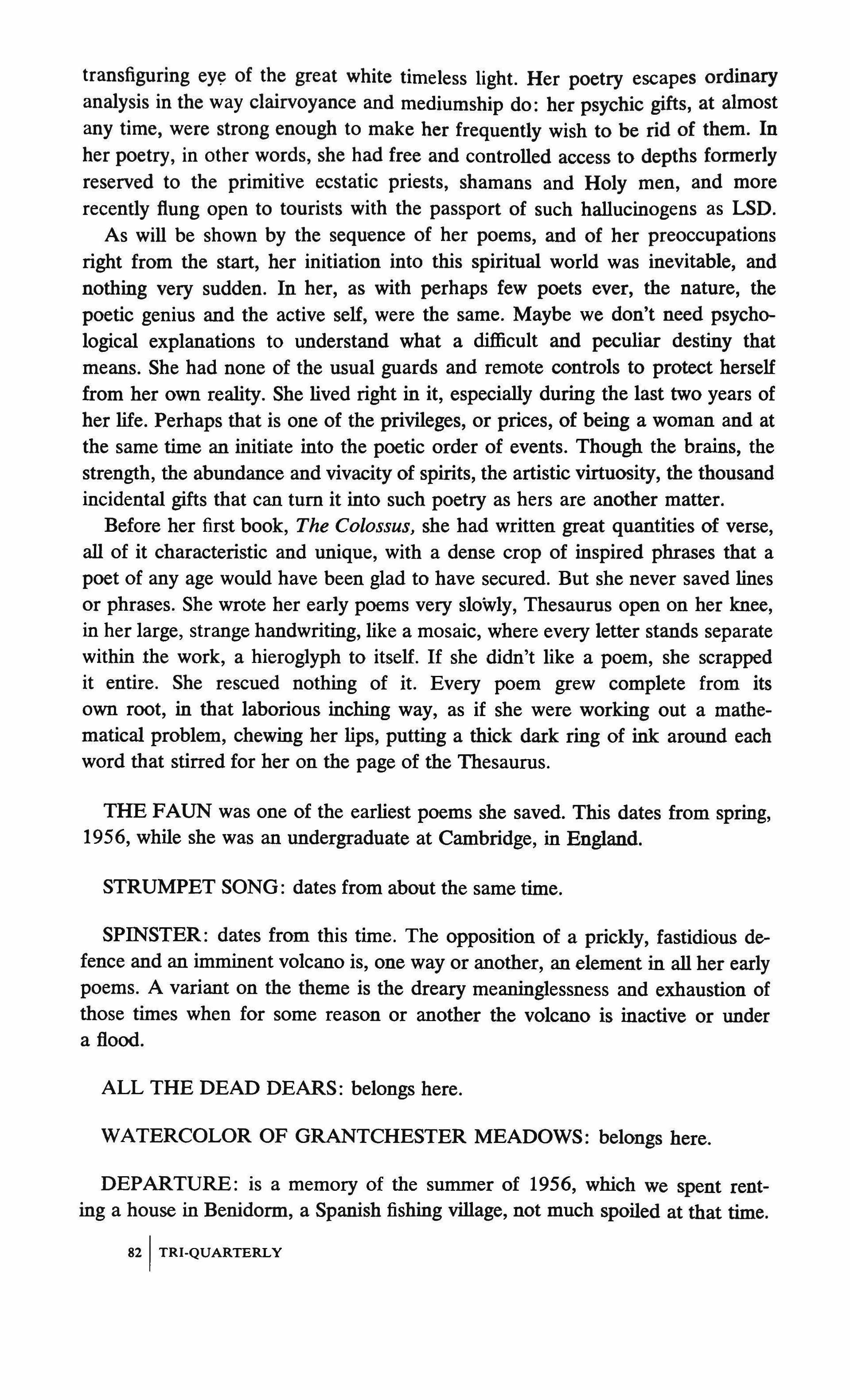
transfiguring eyr;, of the great white timeless light. Her poetry escapes ordinary analysis in the way clairvoyance and mediumship do: her psychic gifts, at almost any time, were strong enough to make her frequently wish to be rid of them. In her poetry, in other words, she had free and controlled access to depths formerly reserved to the primitive ecstatic priests, shamans and Holy men, and more recently flung open to tourists with the passport of such hallucinogens as LSD.
As will be shown by the sequence of her poems, and of her preoccupations right from the start, her initiation into this spiritual world was inevitable, and nothing very sudden. In her, as with perhaps few poets ever, the nature, the poetic genius and the active self, were the same. Maybe we don't need psychological explanations to understand what a difficult and peculiar destiny that means. She had none of the usual guards and remote controls to protect herself from her own reality. She lived right in it, especially during the last two years of her life. Perhaps that is one of the privileges, or prices, of being a woman and at the same time an initiate into the poetic order of events. Though the brains, the strength, the abundance and vivacity of spirits, the artistic virtuosity, the thousand incidental gifts that can tum it into such poetry as hers are another matter.
Before her first book, The Colossus, she had written great quantities of verse, all of it characteristic and unique, with a dense crop of inspired phrases that a poet of any age would have been glad to have secured. But she never saved lines or phrases. She wrote her early poems very slowly, Thesaurus open on her knee, in her large, strange handwriting, like a mosaic, where every letter stands separate within the work, a hieroglyph to itself. If she didn't like a poem, she scrapped it entire. She rescued nothing of it. Every poem grew complete from its own root, in that laborious inching way, as if she were working out a mathematical problem, chewing her lips, putting a thick dark ring of ink around each word that stirred for her on the page of the Thesaurus.
THE FAUN was one of the earliest poems she saved. This dates from spring, 1956, while she was an undergraduate at Cambridge, in England.
STRUMPET SONG: dates from about the same time.
SPINSTER: dates from this time. The opposition of a prickly, fastidious defence and an imminent volcano is, one way or another, an element in all her early poems. A variant on the theme is the dreary meaninglessness and exhaustion of those times when for some reason or another the volcano is inactive or under a flood.
ALL THE DEAD DEARS: belongs here.
WATERCOLOR OF GRANTCHESTER MEADOWS: belongs here.
DEPARTURE: is a memory of the summer of 1956, which we spent renting a house in Benidorm, a Spanish fishing village, not much spoiled at that time.
821 TRI·QUARTERLY

HARDCASTLE CRAGS: is a deep narrow valley in the Pennines in West Yorks, and makes the southern boundary of the moorland made famous by Emily Bronte in Wuthering Heights. The village she describes, which is on a hilltop overlooking this valley, is very ancient.
SOW: commemorates a great sow that lived near this village.
Between these and the next poems we moved to the United States, where she took up a teaching post on the English faculty at Smith College.
MUSSEL-HUNTER AT ROCK-HARBOUR: she wrote this in the summer, on Cape Cod, before she started teaching. This was one of her first poems in syHabics, which were her first step, technically, in her self-exploration. She was a lucky fisherman.
The next group of poems belongs to the time she was teaching. They all share a likeness-s-and there were others of the same family, as good and as chilling. THE THIN PEOPLE, LORELEI, FULL FATHOM FNE, FROG AUTUMN, THE DISQUIETING MUSES, SNAKECHARMER, THE GHOST'S LEAVETAKING, SCULPTOR, NIGHT SHIFT, are the ones she saved.
In THE DISQUIETING MUSES, as in SNAKECHARMER, THE GHOST'S LEAVETAKING and several poems not collected, she shows clearly how native she was to the world of the Primitive Painters. Her vision, particularly in its aspect-strong at this time--of the deathly paradise, belongs with theirs perhaps more readily than with anything in poetry, but these poems are, ultimately, about her world, not theirs, and it is not a world of merely visual effects. SNAKECHARMER, after a picture by Rousseau, is what she did not know, a specific vision revealed to yogis at a certain advanced stage, to take just one instance.
SCULPTOR: Leonard Baskin's work struck her very hard, as well it might, since some of the gods he was carving at the time were also part of her pantheon -namely, the huge bald angels, the mutilated dead men, the person with the owl growing out of his shoulder.
LORELEI and FULL FATHOM FIVE: she was prompted to these by reading one of Cousteau's accounts of his diving and underwater explorations. At this distance of time, one can see that in these poems for the first time she accepts the invitation of her inner world. These poems coincided with a decision, made with great difficulty and against great tactical opposition from individuals she regarded as her benefactors, to leave teaching and throw herself on writing for a few years.
Between these last and the next group of poems is a gap of some months. From late summer 1958 to mid 1959, we lived in Boston. It was a difficult time for her: a lifetime's training, and fierce and highly successful effort to prepare
TRI-QUARTERLy 183

herself to teach in a University, with many other deep compulsions to the same end, were not surrendered so easily. From this year there was not much poetry, but it was a decisive time.
THE EYE-MOTE dates from this period. The mention of Oedipus, and the Greek Tragedians' figures elsewhere, may seem literary, but if one can take her dream life as evidence, those personalities were deeply involved in her affairs. Her openness to the ambiguous populations of "the living ether" took its toll. Her reactions to hurts in other people and animals, and even tiny desecrations of plant-life, were extremely violent. The chemical poisoning of nature, the pile-up of atomic waste, were horrors that persecuted her like an illness-as her latest poems record. Auschwitz and the rest were merely the open wounds, in her idea of the great civilised crime of intelligence that like the half-imbecile, omnipotent, spoiled brat Nero has turned on its mother.
THE MAN IN BLACK belongs here.
THE HERMIT AT OUTERMOST HOUSE is a fore-runner of the style that she possessed completely only after her first book was completed. It has the comic goblin, the tricksterish spirit, the crackling verbal energy, that was the nymph-form-a lot of Caliban in it-of ARIEL.
THE BEEKEEPER'S DAUGHTER is one of a group of poems that she wrote at this time about her father. Besides being a general biologist and botanist, he was a specialist in bees, and wrote a book called Bumblebees and Their Ways. This poem, one of her chilliest, recounts a key event in her Vita Nuova.
POINT SHIRLEY was a deliberate exercise in Robert Lowell's early style. The setting is the bit of coast off Boston Harbour where she spent her first years.
AFTERMATH, TWO VIEWS OF A CADAVER ROOM, and SUICIDE OFF EGG-ROCK come clear of the domination of heavy iambic lines, have the casual fluency of her syllabic poems, yet a greater naturalness of tone and a warmer fullness of phrasing than anything she had done before. Also, they steer in quite masterfully towards some point in her life that had been painful. For the first time, she tried deliberately to locate just what it was that hurt.
In the Autumn of 1959, after touring around the States, we were invited to Yaddo. The weeks spent at Yaddo-with only three or four other residentscompleted the poems in THE COLOSSUS. It was, in several ways, the culmination of the first part of her life. For three months, while seeing the States, she had not touched verse. Her first child would be born six months later. We had decided to live in Europe, and were to go there straight from Yaddo. It was an end and a new beginning. She took childbearing in a deeply symbolic way. Maybe
841 TRI-QUARTERLY
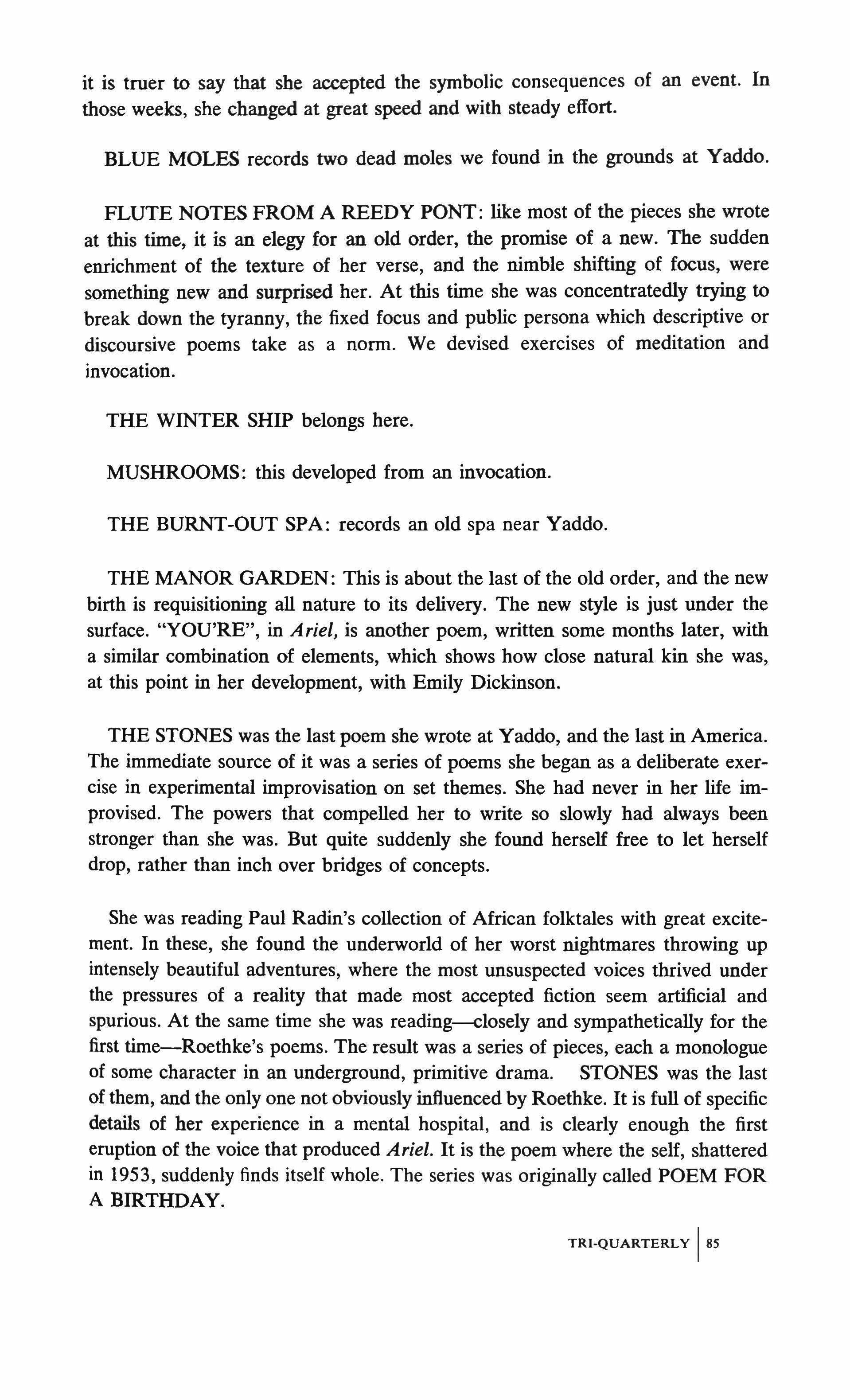
it is truer to say that she accepted the symbolic consequences of an event. In those weeks, she changed at great speed and with steady effort.
BLUE MOLES records two dead moles we found in the grounds at Yaddo.
FLUTE NOTES FROM A REEDY PONT: like most of the pieces she wrote at this time, it is an elegy for an old order, the promise of a new. The sudden enrichment of the texture of her verse, and the nimble shifting of focus, were something new and surprised her. At this time she was concentratedly trying to break down the tyranny, the fixed focus and public persona which descriptive or discoursive poems take as a norm. We devised exercises of meditation and invocation.
THE WINTER SHIP belongs here.
MUSHROOMS: this developed from an invocation.
THE BURNT-OUT SPA: records an old spa near Yaddo.
THE MANOR GARDEN: This is about the last of the old order, and the new birth is requisitioning all nature to its delivery. The new style is just under the surface. "YOU'RE", in Ariel, is another poem, written some months later, with a similar combination of elements, which shows how close natural kin she was, at this point in her development, with Emily Dickinson.
THE STONES was the last poem she wrote at Yaddo, and the last in America. The immediate source of it was a series of poems she began as a deliberate exercise in experimental improvisation on set themes. She had never in her life improvised. The powers that compelled her to write so slowly had always been stronger than she was. But quite suddenly she found herself free to let herself drop, rather than inch over bridges of concepts.
She was reading Paul Radin's collection of African folktales with great excitement. In these, she found the underworld of her worst nightmares throwing up intensely beautiful adventures, where the most unsuspected voices thrived under the pressures of a reality that made most accepted fiction seem artificial and spurious. At the same time she was reading--closely and sympathetically for the first time-Roethke's poems. The result was a series of pieces, each a monologue of some character in an underground, primitive drama. STONES was the last of them, and the only one not obviously influenced by Roethke. It is full of specific details of her experience in a mental hospital, and is clearly enough the first eruption of the voice that produced Ariel. It is the poem where the self, shattered in 1953, suddenly finds itself whole. The series was originally called POEM FOR A BIRTHDAY.
TRI-QUARTERLY Iss
That was the end of the first phase of her development. When she consolidated her hold on the second phase, two years later, she dismissed everything prior to THE STONES as Juvenilia, produced in the days before she became herself. In England, she wrote one more poem, YOU'RE, which I have already mentioned, before her first child was born, at home, without anaesthetic, with great ease and speed, at exactly sunrise, on the first day of April, the day she regularly marked as the first day of Spring.
Once she had arrived so surely at her own centre of gravity, everything that happened to her or that she undertook, enriching and enlarging herself, also enriched and enlarged her poetry. With the birth of her first child she received herself, and was able to tum to her advantage all the forces of a highlydisciplined, highly intellectual style of education which had, up to this point, worked mainly against her, but without which she could hardly have gone so coolly into the regions she now entered. The birth of her second child, in January of 1962, completed the preparation.
The two years between 1960 and 1962 had produced some beautiful poems, but only three that she selected for Ariel. She had heard what her real voice sounded like, and now had new standard for herself. The poem called TULIPS, was the first sign of what was on its way. She wrote .this poem without her usual studies over the Thesaurus, and at top speed, as one might write an urgent letter. From then on, all her poems were written in this way.
TULIPS belongs to March 1961, and records some tulips she had in the hospital where she was recovering from an appendectomy. Another poem, written at the same time and in almost identical form, published in The London Magazine, but not collected, the weaker twin of this one, was the monologue of a body completely, impatiently, enclosed in a plaster cast-which was the actual condition of a patient in a bed near her.
MORNING SONG, a poem about her daughter Frieda, dates from this time, and from later in the year comes LITTLE FUGUE. Her interest in music was average. As a young girl she had played the viola, and could play on the piano any number of popular hits from the early 1950s. But suddenly now she became absorbed by the late quartet music of Beethoven, particularly the Grosse Fugue. The first poem of the final phase was ELM. This particular tree, enormous, stands over our yard in England. The poem dates from March 1962.
THE MOON AND THE YEW TREE came soon after. Opposite the front of our house stands a church. Early one morning, in the dark, I saw the full moon setting onto a large yew that grows in the churchyard, and I suggested she make a poem of it. By midday, she had written it. It depressed me greatly. It's my suspicion that no poem can be a poem that is not a statement from the 861 TRI-QUARTERLY
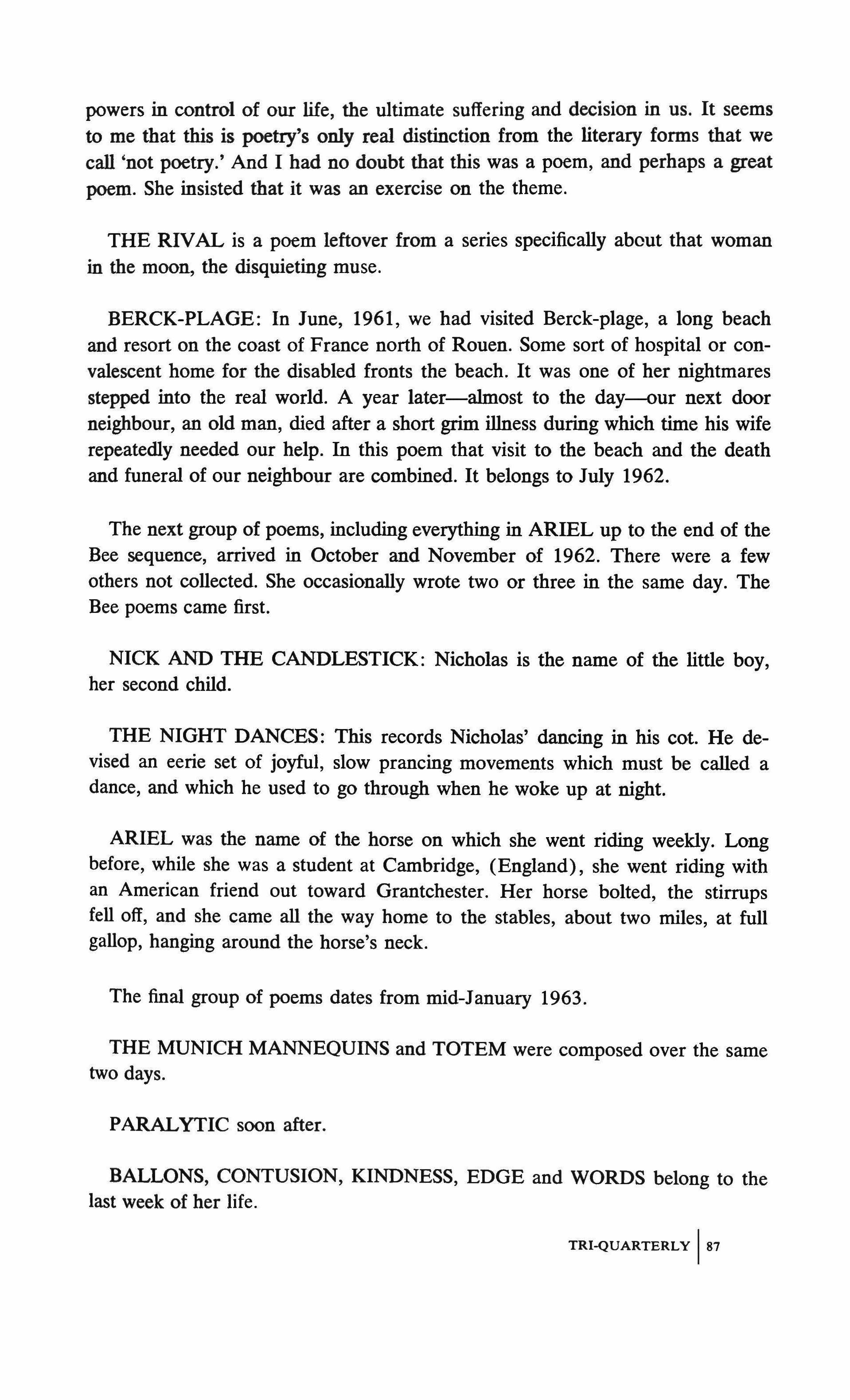
powers in control of our life, the ultimate suffering and decision in us. It seems to me that this is poetry's only real distinction from the literary forms that we call 'not poetry.' And I had no doubt that this was a poem, and perhaps a great poem. She insisted that it was an exercise on the theme.
THE RIVAL is a poem leftover from a series specifically about that woman in the moon, the disquieting muse.
BERCK-PLAGE: In June, 1961, we had visited Berck-plage, a long beach and resort on the coast of France north of Rouen. Some sort of hospital or convalescent home for the disabled fronts the beach. It was one of her nightmares stepped into the real world. A year later-almost to the day-our next door neighbour, an old man, died after a short grim illness during which time his wife repeatedly needed our help. In this poem that visit to the beach and the death and funeral of our neighbour are combined. It belongs to July 1962.
The next group of poems, including everything in ARIEL up to the end of the Bee sequence, arrived in October and November of 1962. There were a few others not collected. She occasionally wrote two or three in the same day. The Bee poems came first.
NICK AND THE CANDLESTICK: Nicholas is the name of the little boy, her second child.
THE NIGHT DANCES: This records Nicholas' dancing in his cot. He devised an eerie set of joyful, slow prancing movements which must be called a dance, and which he used to go through when he woke up at night.
ARIEL was the name of the horse on which she went riding weekly. Long before, while she was a student at Cambridge, (England), she went riding with an American friend out toward Grantchester. Her horse bolted, the stirrups fell off, and she came all the way home to the stables, about two miles, at full gallop, hanging around the horse's neck.
The final group of poems dates from mid-January 1963.
THE MUNICH MANNEQUINS and TOTEM were composed over the same two days.
PARALYTIC soon after.
BALLONS, CONTUSION, KINDNESS, EDGE and WORDS belong to the last week of her life.

Surveyed as a whole, with attention to the order of composition, I think the unity of her opus is clear. Once the unity shows itself, the logic and inevitability of the language, which controls and contains such conflagrations and collisions within itself, becomes more obviously what it is--direct, and even plain, speech. This language, this unique and radiant substance, is the product of an alchemy on the noblest scale. Her elements were extreme: a violent, almost demonic spirit in her, opposed a tenderness and capacity to suffer and love things infinitely, which was just as great and far more in evidence. Her stormy, luminous senses assaulted a downright, practical intelligence that could probably have dealt with anything. Her vision of death, her muse of death in life and life in death, with its oppressive evidence, fought in her against a joy in life, and in every smallest pleasure, for which her favourite word "ecstasy" was simply accurate, as her poems prove. She saw her world in the flame of the ultimate substance and the ultimate depth. And this is the distinction of her language, that every word is Baraka: the flame and the rose folded together. Poets have often spoken about this ideal possibility but, where else, outside these poems, has it actually occurred? If we have the discrimination to answer this question, we can set her in her rightful company.

ICAN ADD, for Sylvia, only a small sketch and two poems-one poem written for her at the news of her death and the other, written a year later, written directly for both of us and for that place where we met "balanced there, suicides sometimes meet. ."
I knew her for a while in Boston. We did grow up in the same suburban town, Wellesley, Massachusetts, but she was about four years behind me and we never met. Even if we had, I wonder if we would have become close friends, back then -she was so bright, so precocious and determined to be special while I was only a pimply boy-crazy thing, flunking most subjects, thinking I was never special. We didn't meet, at any rate, until she was married to Ted Hughes and living in Boston. We met because we were poets. Met, not for protocol, but for truth. She heard, and George Starbuck heard, that I was auditing a class at Boston University given by Robert Lowell. They kind of followed me in, joined me there and so we orbited around the class silently. If we talked at ,,11 then we were fools. We knew too much about it to talk. Silence was wiser, when we could command it. We tried, each one in his own manner; sometimes letting our own poems come up, as for a butcher, as for a lover. Both went on. We kept as quiet as possible in view of the father.
Then, after the class, we would pile into the front seat of myoid Ford and I would drive quickly through the traffic to, or near, The Ritz. I would always park illegally in a LOADING ONLY ZONE, telling them gayly, "It's okay, because we are only going to get loaded!" Off we'd go, each on George's arm, into The Ritz to drink three or four or two martinis. George even has a line about this in his first book of poems, Bone Thoughts. He wrote, I weave with two sweet ladies out of The Ritz. Sylvia and I, such sleep mongers, such death mongers, were those two sweet ladies.
In the lounge-bar of The Ritz, not a typical bar at all, but very plush, deep dark red carpeting, red leather chairs around polite little tables and with waiters, white coated and awfully hushed where one knew upon stepping down the five velvet red steps that he was entering something, we entered. The waiters knew
TRI-QUARTERLy 189
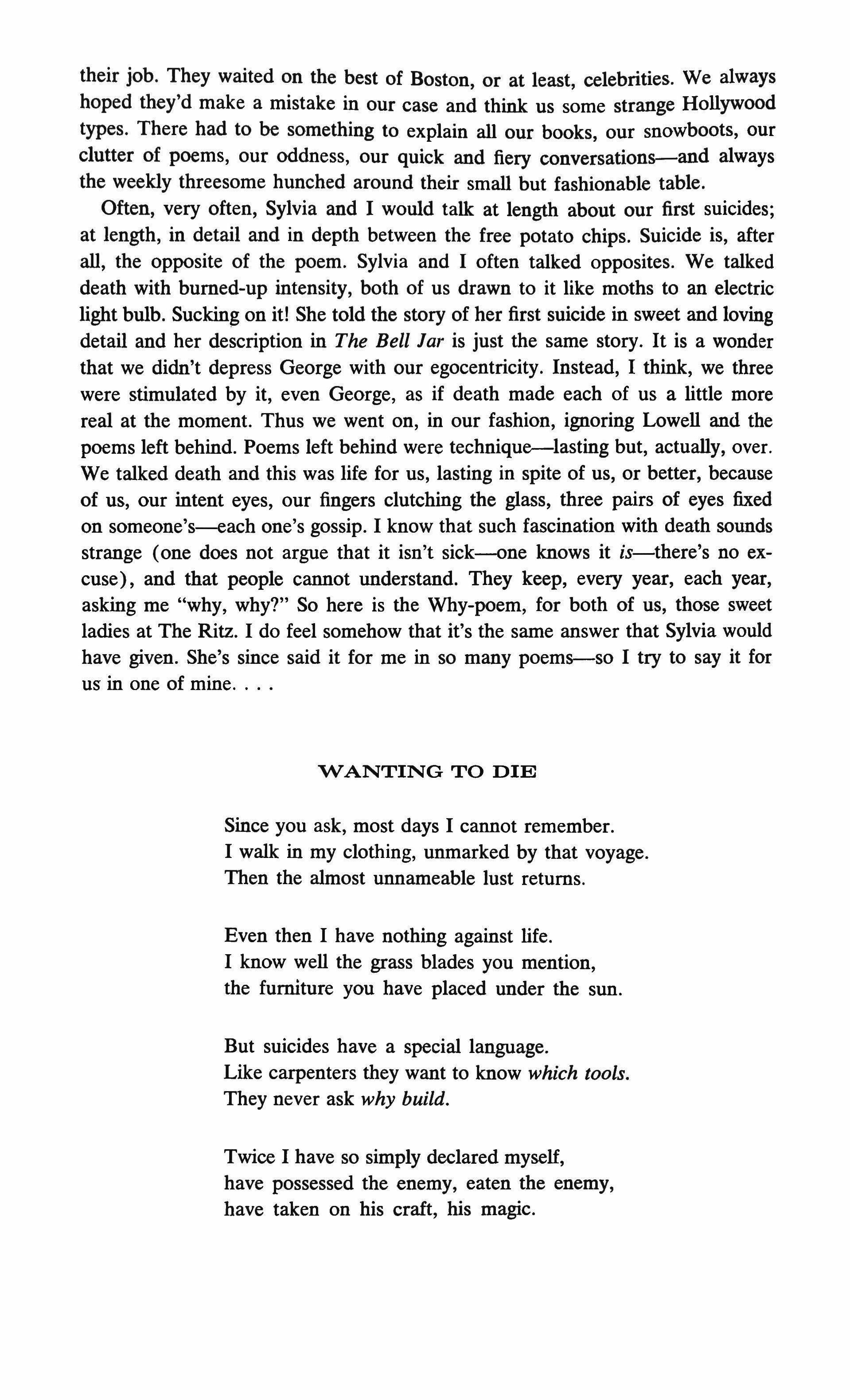
their job. They waited on the best of Boston, or at least, celebrities. We always hoped they'd make a mistake in our case and think us some strange Hollywood types. There had to be something to explain all our books, our snowboots, our clutter of poems, our oddness, our quick and fiery conversations-and always the weekly threesome hunched around their small but fashionable table.
Often, very often, Sylvia and I would talk at length about our first suicides; at length, in detail and in depth between the free potato chips. Suicide is, after all, the opposite of the poem. Sylvia and I often talked opposites. We talked death with burned-up intensity, both of us drawn to it like moths to an electric light bulb. Sucking on it! She told the story of her first suicide in sweet and loving detail and her description in The Bell Jar is just the same story. It is a wonder that we didn't depress George with our egocentricity. Instead, I think, we three were stimulated by it, even George, as if death made each of us a little more real at the moment. Thus we went on, in our fashion, ignoring Lowell and the poems left behind. Poems left behind were technique--Iasting but, actually, over. We talked death and this was life for us, lasting in spite of us, or better, because of us, our intent eyes, our fingers clutching the glass, three pairs of eyes fixed on someone's-each one's gossip. I know that such fascination with death sounds strange (one does not argue that it isn't sick-one knows it is-there's no excuse), and that people cannot understand. They keep, every year, each year, asking me "why, why?" So here is the Why-poem, for both of us, those sweet ladies at The Ritz. I do feel somehow that it's the same answer that Sylvia would have given. She's since said it for me in so many poems-so I try to say it for us in one of mine
Since you ask, most days I cannot remember. I walk in my clothing, unmarked by that voyage. Then the almost unnameable lust returns.
Even then I have nothing against life. I know well the grass blades you mention, the furniture you have placed under the sun.
But suicides have a special language. Like carpenters they want to know which tools. They never ask why build.
Twice I have so simply declared myself, have possessed the enemy, eaten the enemy, have taken on his craft, his magic.
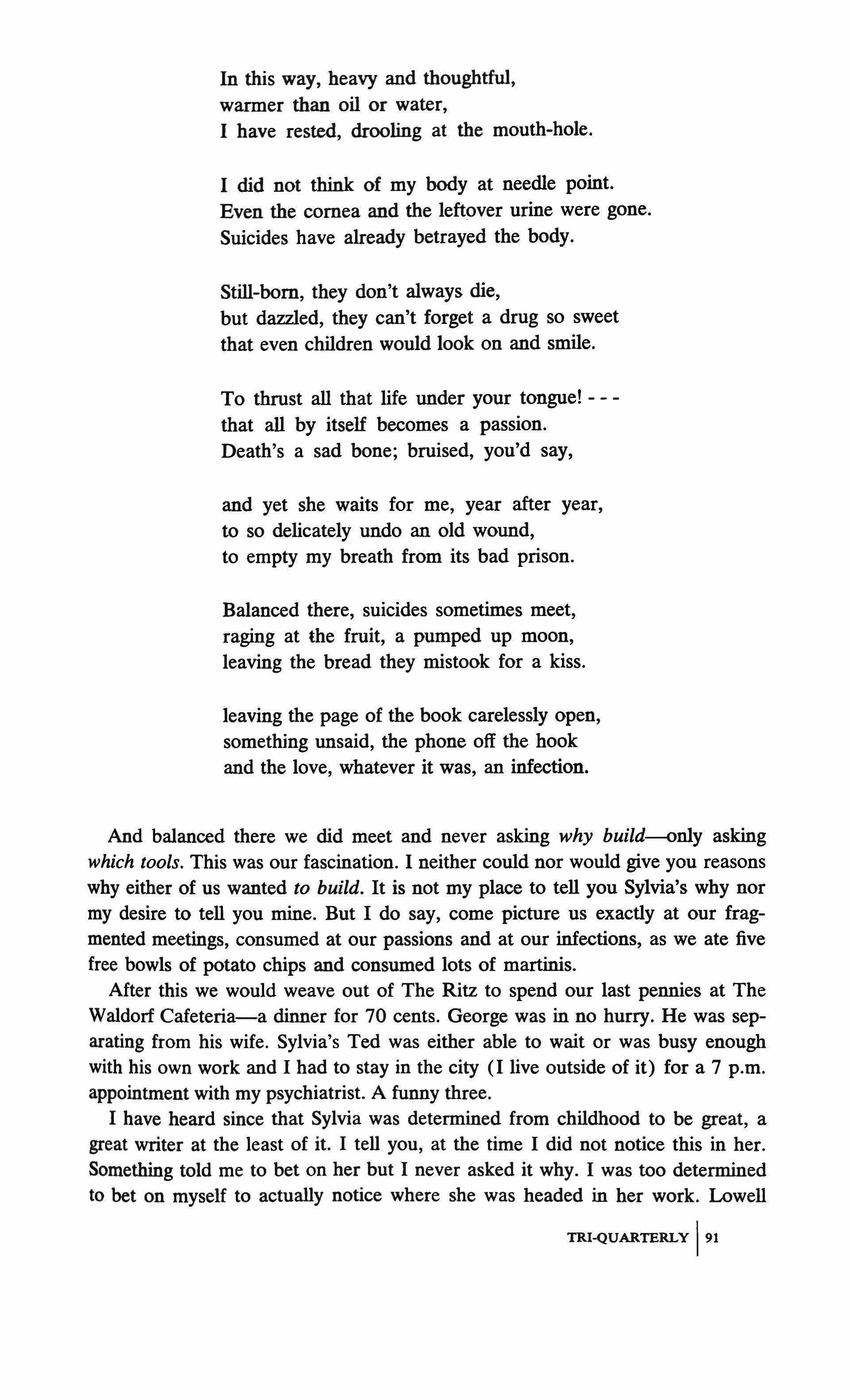
In this way, heavy and thoughtful, warmer than oil or water, I have rested, drooling at the mouth-hole.
I did not think of my body at needle point. Even the cornea and the leftover urine were gone. Suicides have already betrayed the body.
Still-born, they don't always die, but dazzled, they can't forget a drug so sweet that even children would look on and smile.
To thrust all that life under your tongue! - -that all by itself becomes a passion. Death's a sad bone; bruised, you'd say, and yet she waits for me, year after year, to so delicately undo an old wound, to empty my breath from its bad prison.
Balanced there, suicides sometimes meet, raging at the fruit, a pumped up moon, leaving the bread they mistook for a kiss.
leaving the page of the book carelessly open, something unsaid, the phone off the hook and the love, whatever it was, an infection.
And balanced there we did meet and never asking why build-only asking which tools. This was our fascination. I neither could nor would give you reasons why either of us wanted to build. It is not my place to tell you Sylvia's why nor my desire to tell you mine. But I do say, come picture us exactly at our fragmented meetings, consumed at our passions and at our infections, as we ate five free bowls of potato chips and consumed lots of martinis.
After this we would weave out of The Ritz to spend our last pennies at The Waldorf Cafeteria-a dinner for 70 cents. George was in no hurry. He was separating from his wife. Sylvia's Ted was either able to wait or was busy enough with his own work and I had to stay in the city (I live outside of it) for a 7 p.m. appointment with my psychiatrist. A funny three.
I have heard since that Sylvia was determined from childhood to be great, a great writer at the least of it. I tell you, at the time I did not notice this in her. Something told me to bet on her but I never asked it why. I was too determined to bet on myself to actually notice where she was headed in her work. Lowell
TRI-QUARTERLY

said, at the time, that he liked her work and that he felt her poems got right to the point. I didn't agree. I felt they really missed the whole point. (These were early poems of hers-poems on the way, on the working toward way.) I told Mr. Lowell that I felt she dodged the point and did so perhaps because of her preoccupation with form. Form was important for Sylvia and each really good poet has one of his own. No matter what he calls it-free verse or what. Still, it belongs to you or it doesn't. Sylvia hadn't then found a form that belonged to her. Those early poems were all in a cage (and not even her own cage at that.) I felt she hadn't found a voice of her own, wasn't, in truth, free to be herself. Yet, of course, I knew she was skilled-intense, skilled, perceptive, strange, blonde, lovely, Sylvia.
From England to America we exchanged a few letters. I have them now, of course. She mentions my poems and perhaps I sent her new ones as I wrote-I'm not sure. The time of the LOADING ZONE ONLY was gone as now we sent aerograms back and forth, now and then. George was in Rome. He never wrote. He divorced and remarried over there. Sylvia wrote of one child, keeping bees, another child, my poems-happy, gossip-letters, and then, with silence between us, she died.
After her death, with the printing of her last poems, I read that she gave me credit on a BBC program, credit as an influence upon her work. Certainly she never told me anything about it. But then, maybe she wouldn't have--nothing that ordinary, nothing that direct. She gave me and Robert Lowell (both is a rather casual lump, Sylvia!) credit for our breakthrough into the personal in poetry. I uppose we might have shown her something about daring--daring to tell it true. W. D. Snodgrass showed me in the first place. Perhaps he influenced Robert Lowell too-I can't speak for him. But let's get down to facts. I'm sure Sylvia's influences are hidden, as with most of us, and if one feels compelled to name an influence then let us begin with Theodore Roethke. I remember writing to Sylvia in England after The Colossus came out and saying something like "if you're not careful, Sylvia, you will out-Roethke Roethke", and she replied that I had guessed accurately and that he had been a strong influence on her work. Believe me, no one ever tells one's real influences-and certainly not on the radio or the TV or in interviews, if he can help it. As a matter of fact, I probably guessed wrong and she was lying to me. She ought to. I'd never tell anyone and she was smarter than I am about such hidden things. Poets will not only hide influences. They will bury them! And not that her lines reminded me of Roethke-but the openness to metaphor, the way they both have (and Sylvia even more so in her last work) of jumping straight into their own image and then believing it. No doubt of it-at the end, Sylvia burst from her cage and came riding straight out with the image-ridden-darer, Roethke. But maybe she buried her so called influence deeper than that, deeper than anyone of us would think to look, and if she did I say good luck to her. Her poems do their own work. I don't need to sniff them for distant relatives of some sort. I'm against it. Maybe I did give her a sort of daring, but that's all she should have said. That's all
921 TRI-QUARTERLY

that's similar about our work. Except for death-yes, we have that in common (and there must be enough other poets with that theme to fill an entire library). Never mind last diggings. They don't matter. What matters is her poems. These last poems stun me. They eat time. As for death -
o Sylvia, Sylvia, with a dead box of stones and spoons, with two children, two meteors wandering loose in the tiny playroom, with your mouth into the sheet, into the roofbeam, into the dumb prayer,
(0 Sylvia, Sylvia, where did you go after you wrote me from Devonshire about raising potatoes and keeping bees?) what did you stand by, just how did you lie down into? Thief!how did you crawl into, crawl down alone into the death I wanted so badly and for so long, the death we said we both outgrew, the one we wore on our skinny breasts, the one we talked of so often each time we downed three extra dry martinis in Boston, the death that talked of analysts and cures, the death that talked like brides with plots, the death we drank to, the motives and then the quiet deed?
(In Boston the dying ride in cabs, yes death again, that ride home with our boy.)
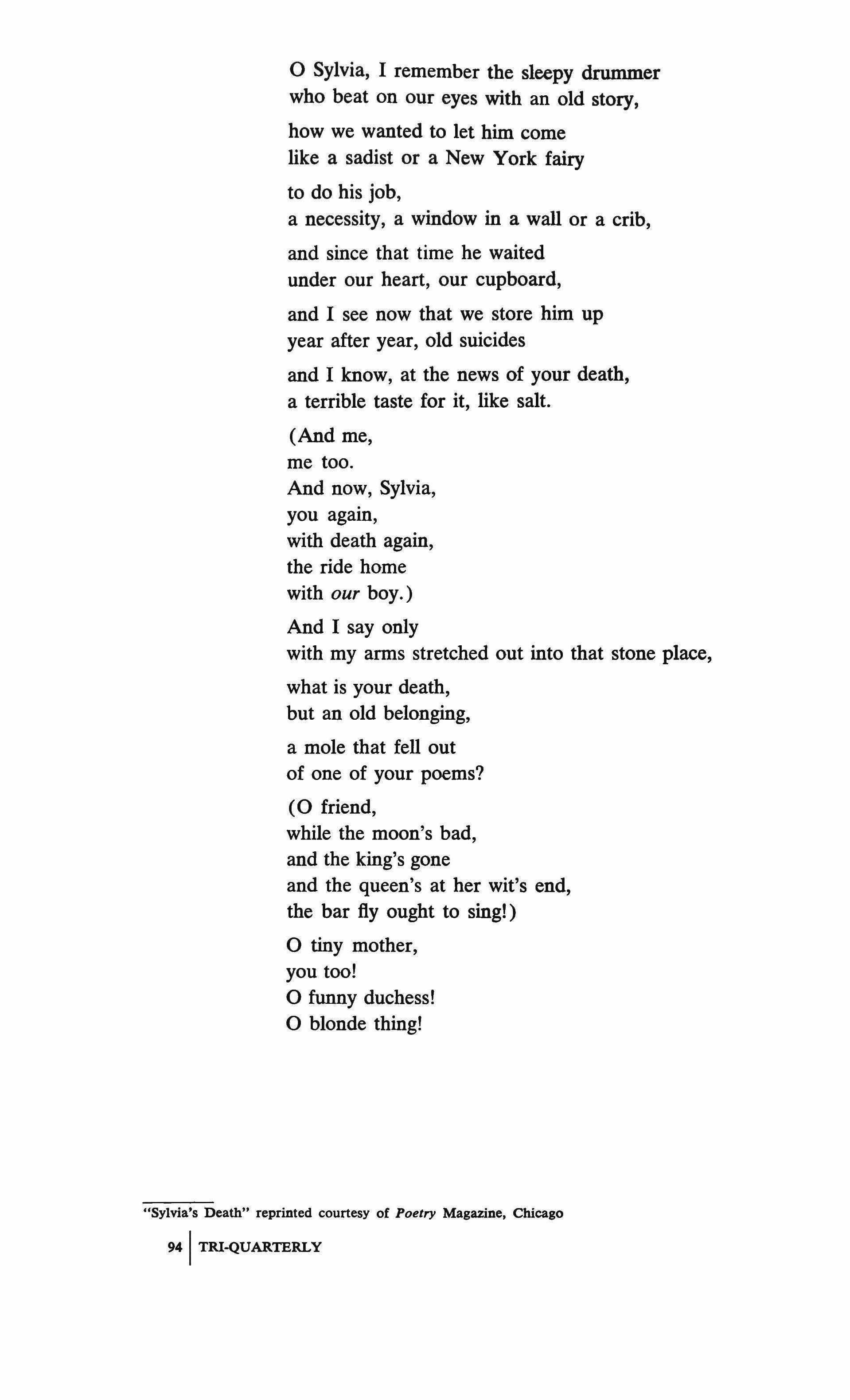
o Sylvia, I remember the sleepy drummer who beat on our eyes with an old story, how we wanted to let him come like a sadist or a New York fairy to do his job, a necessity, a window in a wall or a crib, and since that time he waited under our heart, our cupboard, and I see now that we store him up year after year, old suicides and I know, at the news of your death, a terrible taste for it, like salt.
(And me, me too.
And now, Sylvia, you again, with death again, the ride home with our boy.)
And I say only with my arms stretched out into that stone place, what is your death, but an old belonging, a mole that fell out of one of your poems?
(0 friend, while the moon's bad, and the king's gone and the queen's at her wit's end, the bar fly ought to sing!)
o tiny mother, you too!
o funny duchess!
o blonde thing!
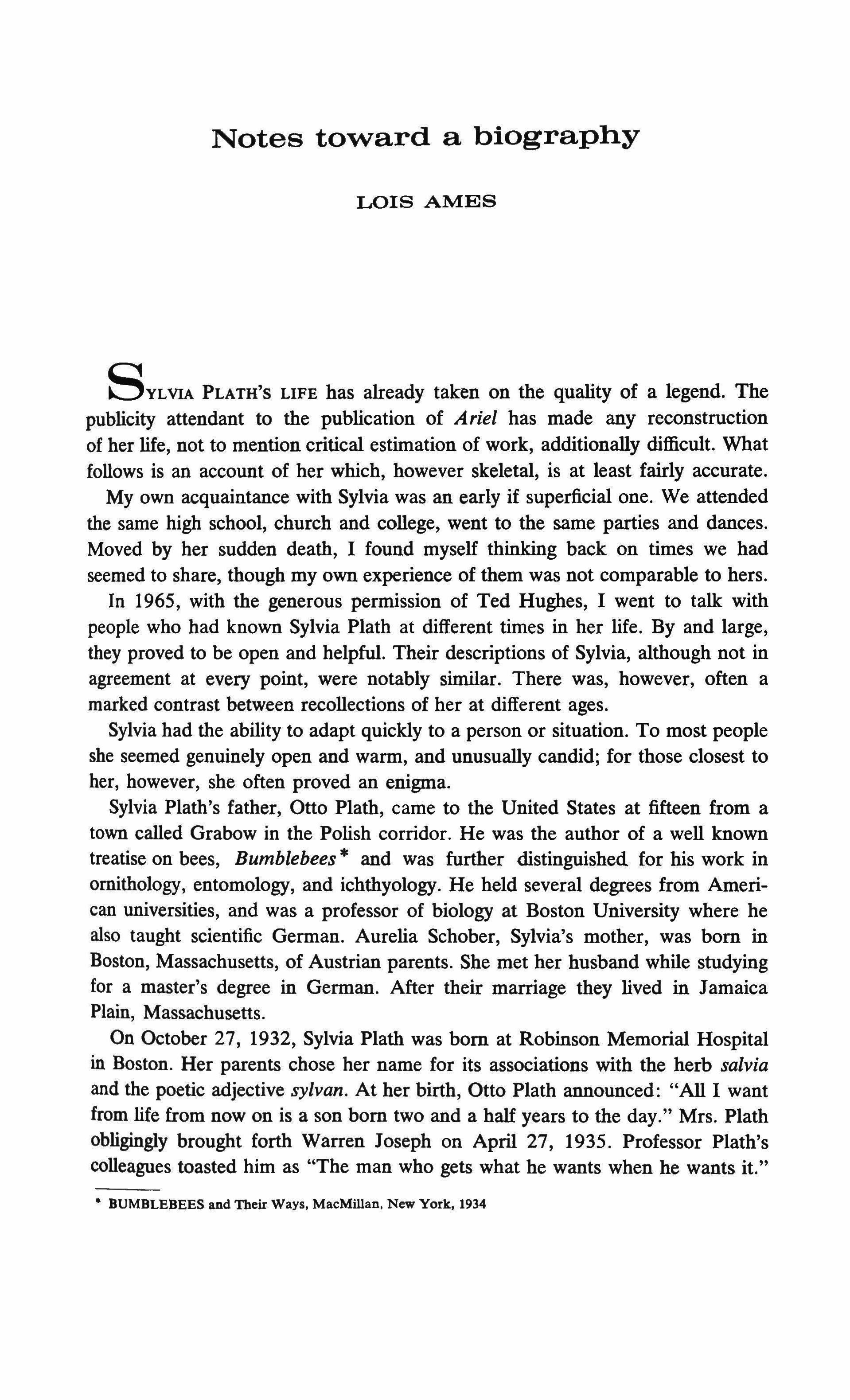
SYLVIA PLATH'S LIFE has already taken on the quality of a legend. The publicity attendant to the publication of Ariel has made any reconstruction of her life, not to mention critical estimation of work, additionally difficult. What follows is an account of her which, however skeletal, is at least fairly accurate.
My own acquaintance with Sylvia was an early if superficial one. We attended the same high school, church and college, went to the same parties and dances. Moved by her sudden death, I found myself thinking back on times we had seemed to share, though my own experience of them was not comparable to hers.
In 1965, with the generous permission of Ted Hughes, I went to talk with people who had known Sylvia Plath at different times in her life. By and large, they proved to be open and helpful. Their descriptions of Sylvia, although not in agreement at every point, were notably similar. There was, however, often a marked contrast between recollections of her at different ages.
Sylvia had the ability to adapt quickly to a person or situation. To most people she seemed genuinely open and warm, and unusually candid; for those closest to her, however, she often proved an enigma.
Sylvia Plath's father, Otto Plath, came to the United States at fifteen from a town called Grabow in the Polish corridor. He was the author of a well known treatise on bees, Bumblebees * and was further distinguished for his work in ornithology, entomology, and ichthyology. He held several degrees from American universities, and was a professor of biology at Boston University where he also taught scientific German. Aurelia Schober, Sylvia's mother, was bom in Boston, Massachusetts, of Austrian parents. She met her husband while studying for a master's degree in German. After their marriage they lived in Jamaica Plain, Massachusetts.
On October 27, 1932, Sylvia Plath was bom at Robinson Memorial Hospital in Boston. Her parents chose her name for its associations with the herb salvia and the poetic adjective sylvan. At her birth, Otto Plath announced: "All I want from life from now on is a son born two and a half years to the day." Mrs. Plath obligingly brought forth Warren Joseph on April 27, 1935. Professor Plath's colleagues toasted him as "The man who gets what he wants when he wants it."
BUMBLEBEES and Their Ways, MacMillan. New York, 1934

Sylvia and her brother grew up in the seashore town of Winthrop, Massachusetts. Her own letters and other writings deal extensively with this period in her life. Sylvia was a "sea child." She collected blue mussel shells "with the rainbowy angel's fingernail interior" and "the purple 'lucky stones' with a white ring all the way around." She treasured brown, green, blue and red glass "nuggets," bits of painted china, and tiny shells; fashioned toys from razor clams and fairy boats; "nursed starfish alive in jam jars of seawater and watched them grow back lost arms," dreamed of Spain on the other side of the Atlantic, and believed in mermaids. She enjoyed the sea taste of "greeny-blue-black mackerel," codfish chowder, steamed clams, and lobsters. She often visited her maternal grandparents, also associated with the sea, who lived on the exposed ocean side of Point Shirley, in a house which looked east to the Atlantic and west to Boston. It was to their number, Ocean 1212-W, that she made her first telephone call.
On September 21, 1938, when she was five, a hurricane and tidal wave eroded the New England coast, removing landmarks, smashing houses, and beaching boats. She later recalled in a BBC talk:
My final memory of the sea is of violence-a still, unhealthily yellow day in 1939 [sic]-the sea molten, steely thick, heaving at its leash like a broody animal, evil violets in its eye.
-one of those apocalyptic images which alternately attracted and repelled her all her life.
Otto Plath died on November 2, 1940, following a long, difficult illness, and Sylvia's life changed radically within a few months. Her mother went to work as a teacher to support her family, and, for economy, combined her household with that of her parents. She then decided to move inland, thinking that Warren's asthma and Sylvia's acute sinusitis might benefit from a drier climate. From that time, Sylvia Plath felt a constant longing for the sea.
The Plaths and Schobers moved to a modest white frame house in Wellesley, Massachusetts, a conservative upper middle class suburb of Boston. Mr. Schober worked as maitre d'hotel at the Brookline Country Club where he lived during the week, returning home on his days off; Mrs. Schober assumed the care of the household; Mrs. Plath taught students in the medical secretarial training program at Boston University.
Sylvia and Warren attended local schools and on Sunday went to the First Unitarian Society of Wellesley Hills where their mother also taught Sunday School. The family did lessons together, budgeted money at the dining room table, and read aloud. At one of these sessions, Mrs. Plath read out Matthew Arnold's "The Forsaken Merman"; Sylvia remembered her reaction:
I saw the gooseflesh on my skin. I didn't know what made it. I was not cold. Had a ghost passed over? No. it was the poetry. A spark flew off Arnold and shook me, like a chill, I wanted to cry; I felt very odd. I had fallen into a new way of being happy.
961 TRI-QUARTERLY

She began to hide little poems in her mother's dinner napkin or beneath the butter plate. She enjoyed concocting rhymes for celebrations or for anti-celebrations: Liver, liver makes me shiver.
At eight and a half she wrote to the Boston Sunday Herald: Dear Editor:
I have written a short poem about what I see and hear on hot summer nights.
Hear the crickets chirping In the dewy grass. Bright little fireflies Twinkle as they pass. Thank you for my Good Sport pin. Sylvia Plath (Age 8lh years.)
Her other interest, drawing in pen and ink, began early and continued through her life. She started art lessons at an early age. Sketches, too, appeared at dinner. At about the same time "Poem" was published, she earned a dollar prize from a newspaper contest with her "first sample of art work": a plump lady in feathered hat and corkscrew curls, round spectacles, and a circle of fat beads. Her later pen and ink drawings were remarkably skillful and have the quality of fine block prints. Occasionally they have appeared with her articles.
In Wellesley, Sylvia went to the Marshall Livingston Perrin grammar schoolnamed, coincidentally, for the professor with whom Mrs. Plath had studied Faust at Boston University. Sylvia was proud of the report cards she brought to her mother to sign. In summer she went to camp where she spent much time in the handicraft shops making beaded pot holders and leather purses which she brought home as gifts. When she was in the ninth grade, her mother taught her to type; she learned quickly and within 6 weeks could type proficiently. In early adolescence she was invited to attend Mrs. Ferguson's judiciously selected dancing "Assemblies." She joined the young people's group of the Unitarian church. Later she remembered herself in these growing years as a "gawky mess with drab hair and bad skin," but others describe her as having been a "lively, happy, attractive little girl."
Her brother went to a preparatory school on scholarship. Sylvia, who remained at home, attended Gamaliel Bradford Senior High School. There her writing was encouraged by Wilbury A. Crockett who taught English and creative writing. Surprised by the girl's inventiveness, he encouraged her. The desire to write, which had seemed a random interest in the small child, became a disciplined and compelling need for the adolescent girl. She sent forty-five pieces to Seventeen before the acceptance in March, 1950, of her short story, "And Summer Will Not Come Again." In Mr. Crockett's class, Sylvia and a friend composed a
TRI-QUARTERLy 197
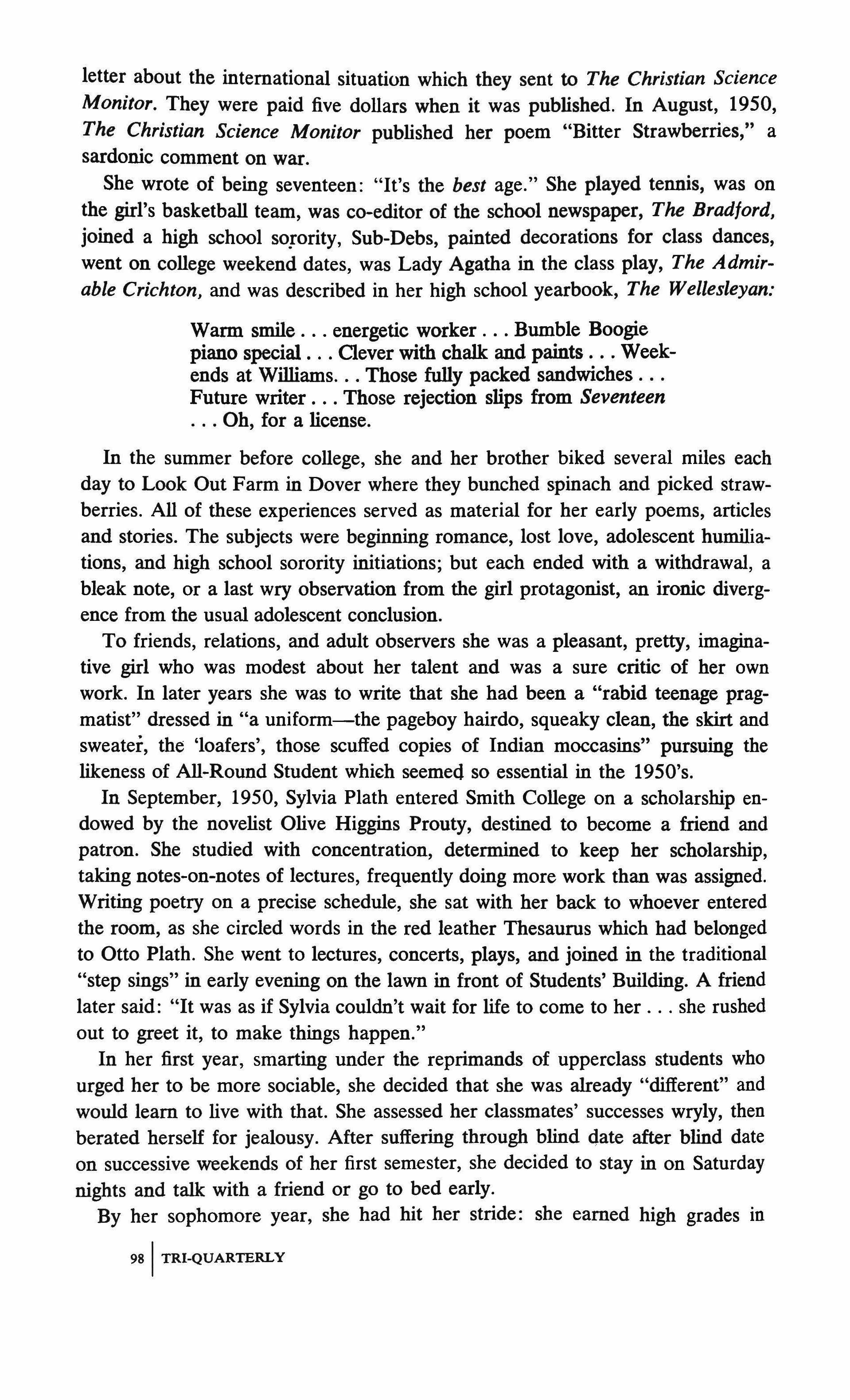
letter about the international situation which they sent to The Christian Science Monitor. They were paid five dollars when it was published. In August, 1950, The Christian Science Monitor published her poem "Bitter Strawberries," a sardonic comment on war.
She wrote of being seventeen: "It's the best age." She played tennis, was on the girl's basketball team, was co-editor of the school newspaper, The Bradford, joined a high school sorority, Sub-Debs, painted decorations for class dances, went on college weekend dates, was Lady Agatha in the class play, The Admirable Crichton, and was described in her high school yearbook, The Wellesleyan:
Warm smile energetic worker Bumble Boogie piano special Clever with chalk and paints Weekends at Williams Those fully packed sandwiches Future writer Those rejection slips from Seventeen Oh, for a license.
In the summer before college, she and her brother biked several miles each day to Look Out Farm in Dover where they bunched spinach and picked strawberries. All of these experiences served as material for her early poems, articles and stories. The subjects were beginning romance, lost love, adolescent humiliations, and high school sorority initiations; but each ended with a withdrawal, a bleak note, or a last wry observation from the girl protagonist, an ironic divergence from the usual adolescent conclusion.
To friends, relations, and adult observers she was a pleasant, pretty, imaginative girl who was modest about her talent and was a sure critic of her own work. In later years she was to write that she had been a "rabid teenage pragmatist" dressed in "a uniform-the pageboy hairdo, squeaky clean, the skirt and sweater, the 'loafers', those scuffed copies of Indian moccasins" pursuing the likeness of All-Round Student which seemed so essential in the 1950's.
In September, 1950, Sylvia Plath entered Smith College on a scholarship endowed by the novelist Olive Higgins Prouty, destined to become a friend and patron. She studied with concentration, determined to keep her scholarship, taking notes-on-notes of lectures, frequently doing more work than was assigned. Writing poetry on a precise schedule, she sat with her back to whoever entered the room, as she circled words in the red leather Thesaurus which had belonged to Otto Plath. She went to lectures, concerts, plays, and joined in the traditional "step sings" in early evening on the lawn in front of Students' Building. A friend later said: "It was as if Sylvia couldn't wait for life to come to her she rushed out to greet it, to make things happen."
In her first year, smarting under the reprimands of upperclass students who urged her to be more sociable, she decided that she was already "different" and would learn to live with that. She assessed her classmates' successes wryly, then berated herself for jealousy. After suffering through blind elate after blind date on successive weekends of her first semester, she decided to stay in on Saturday nights and talk with a friend or go to bed early.
By her sophomore year, she had hit her stride: she earned high grades in

every course, even the few she found "painful." Her art and creative writing courses were "pleasures" which made her feel "guilty" because they weren't "work." Seventeen accepted poems and stories, but she wrote to a friend, "for the few little outward successes I may seem to have, there are acres of misgiving and self doubt."
Apparently the lessons learned in high school and the midnight warnings of upperclass students were not completely ignored; she began teaching art as a volunteer at the People's Institute in Northampton. She was elected a sophomore prom officer. In later elections she became a member of the editorial board of The Smith Review and, her most prestigious office, secretary to the Honor Board which dealt with infringements of the academic honor system. As a result, at the end of the year she was chosen for "Push," the sophomore committee which serves as escort to alumnae and seniors in the graduation weekend.
In the latter part of her freshman year she had gone to the Yale Junior Prom and now was spending weekends at Princeton and at other colleges. She went down to Cambridge to visit a Harvard medical student and once, at Boston Lying-In Hospital where she was "sacramentally swathed to the eyes in white:"
I spent the whole night there--going round from room to room with the older medical students and doctors I stood two feet away to watch a baby born, and I had the queerest urge to laugh and cry when I saw the little squinted blue face grimacing out of the woman's vagina--only to see it squawk into life, cold, naked and wailing a few minutes later Needless to say, my sense of the dramatic was aroused, and I went skipping excitedly down the corridors of the maternity ward like a thoroughly irresponsible Florence Nightingale.
In these months she expressed herself adamantly about the faults she was unwilling to accept in society, in her friends, and in herself. She advised a beginning writer of her own age that it was essential to "take criticism" and to submit writing on "neat, typewritten pages." It was during this time of awakening sexuality that the conflict between the life-styles of a poet/intellectual and that of a wife and mother became a central preoccupation: it's quite amazing how I've gone around for most of my life as in the rarefied atmosphere under a bell jar." She took as an ideal the parents of a young man whom she was seeing frequently:
Combining a superior duo of people into a working pair, with the woman knowing all about finances, tutoring, making and keeping a rich compote of friends, entertaining and homemaking, and the man full of understanding about so much of the actual world-from his vegetable gardens to the explanations of storms, roads and routes and geological formations, and to sports like skating and tennis and swimming, and to a lot of other things, that in themselves seem incomprehensible and intricate: he has assimilated them all into himself and passed them on to his children who have long since, of course, grown beyond and outward, learning and advancing so much the more. Instead of making up little fairy worlds like pink cotton wool, they investigated the world around them the woods, the material phenomena of nature, winds, sand, and stars and what-not,
TRI-QUARTERLy 199
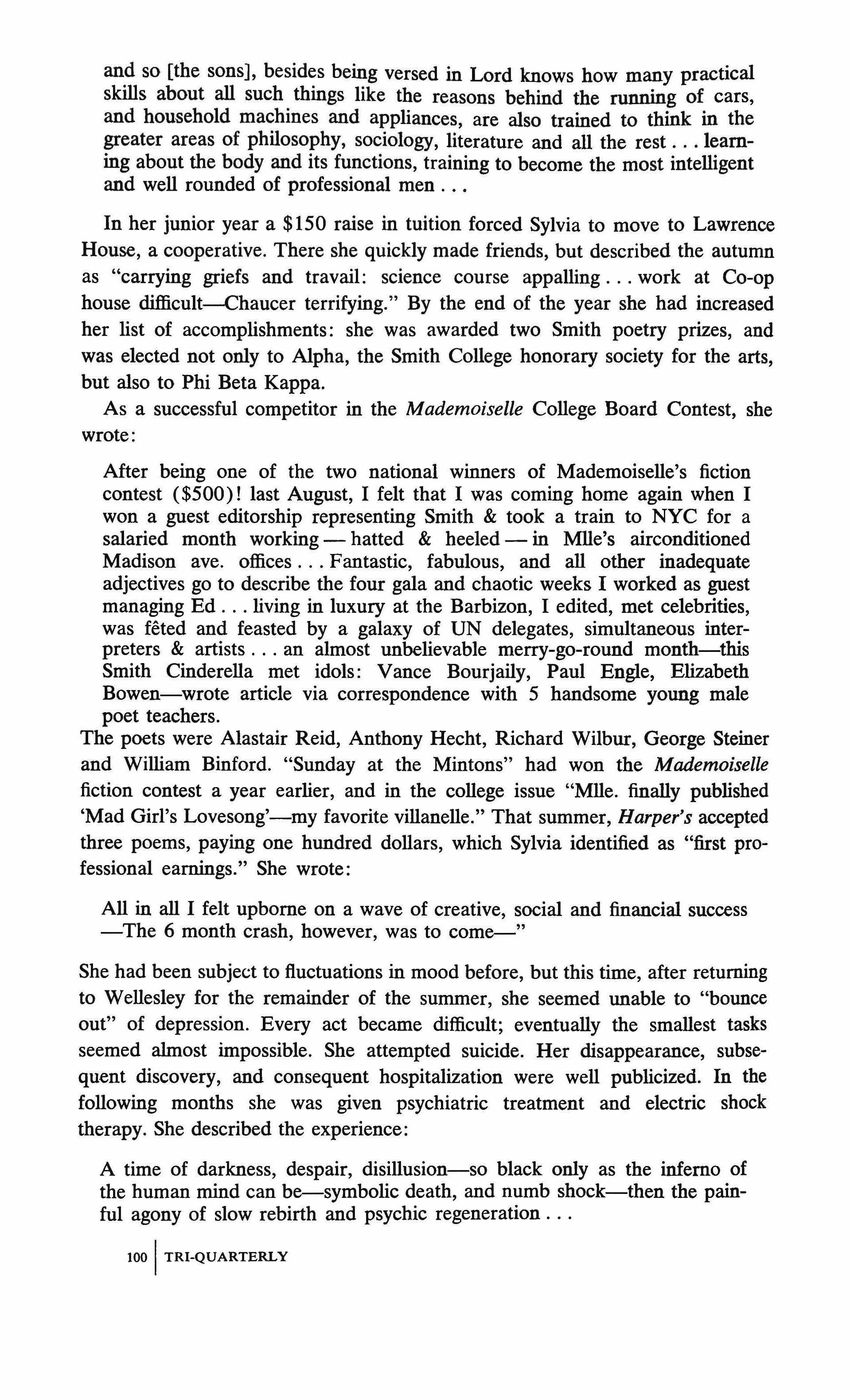
and so [the sons], besides being versed in Lord knows how many practical skills about all such things like the reasons behind the running of cars, and household machines and appliances, are also trained to think in the greater areas of philosophy, sociology, literature and all the rest learning about the body and its functions, training to become the most intelligent and well rounded of professional men
In her junior year a $150 raise in tuition forced Sylvia to move to Lawrence House, a cooperative. There she quickly made friends, but described the autumn as "carrying griefs and travail: science course appalling work at Co-op house difficult--Chaucer terrifying." By the end of the year she had increased her list of accomplishments: she was awarded two Smith poetry prizes, and was elected not only to Alpha, the Smith College honorary society for the arts, but also to Phi Beta Kappa.
As a successful competitor in the Mademoiselle College Board Contest, she wrote:
After being one of the two national winners of Mademoiselle's fiction contest ($500)! last August, I felt that I was coming home again when I won a guest editorship representing Smith & took a train to NYC for a salaried month working - hatted & heeled - in Mlle's airconditioned Madison ave. offices Fantastic, fabulous, and all other inadequate adjectives go to describe the four gala and chaotic weeks I worked as guest managing Ed living in luxury at the Barbizon, I edited, met celebrities, was feted and feasted by a galaxy of UN delegates, simultaneous interpreters & artists an almost unbelievable merry-go-round month-this Smith Cinderella met idols: Vance Bourjaily, Paul Engle, Elizabeth Bowen-wrote article via correspondence with 5 handsome young male poet teachers.
The poets were Alastair Reid, Anthony Hecht, Richard Wilbur, George Steiner and William Binford. "Sunday at the Mintons" had won the Mademoiselle fiction contest a year earlier, and in the college issue "Mlle. finally published 'Mad Girl's Lovesong'-my favorite villanelle." That summer, Harper's accepted three poems, paying one hundred dollars, which Sylvia identified as "first professional earnings." She wrote:
All in all I felt upborne on a wave of creative, social and financial success -The 6 month crash, however, was to come-"
She had been subject to fluctuations in mood before, but this time, after returning to Wellesley for the remainder of the summer, she seemed unable to "bounce out" of depression. Every act became difficult; eventually the smallest tasks seemed almost impossible. She attempted suicide. Her disappearance, subsequent discovery, and consequent hospitalization were well publicized. In the following months she was given psychiatric treatment and electric shock therapy. She described the experience:
A time of darkness, despair, disillusion-so black only as the inferno of the human mind can be-symbolic death, and numb shock-then the painful agony of slow rebirth and psychic regeneration
100 I TRI-QUARTERLY
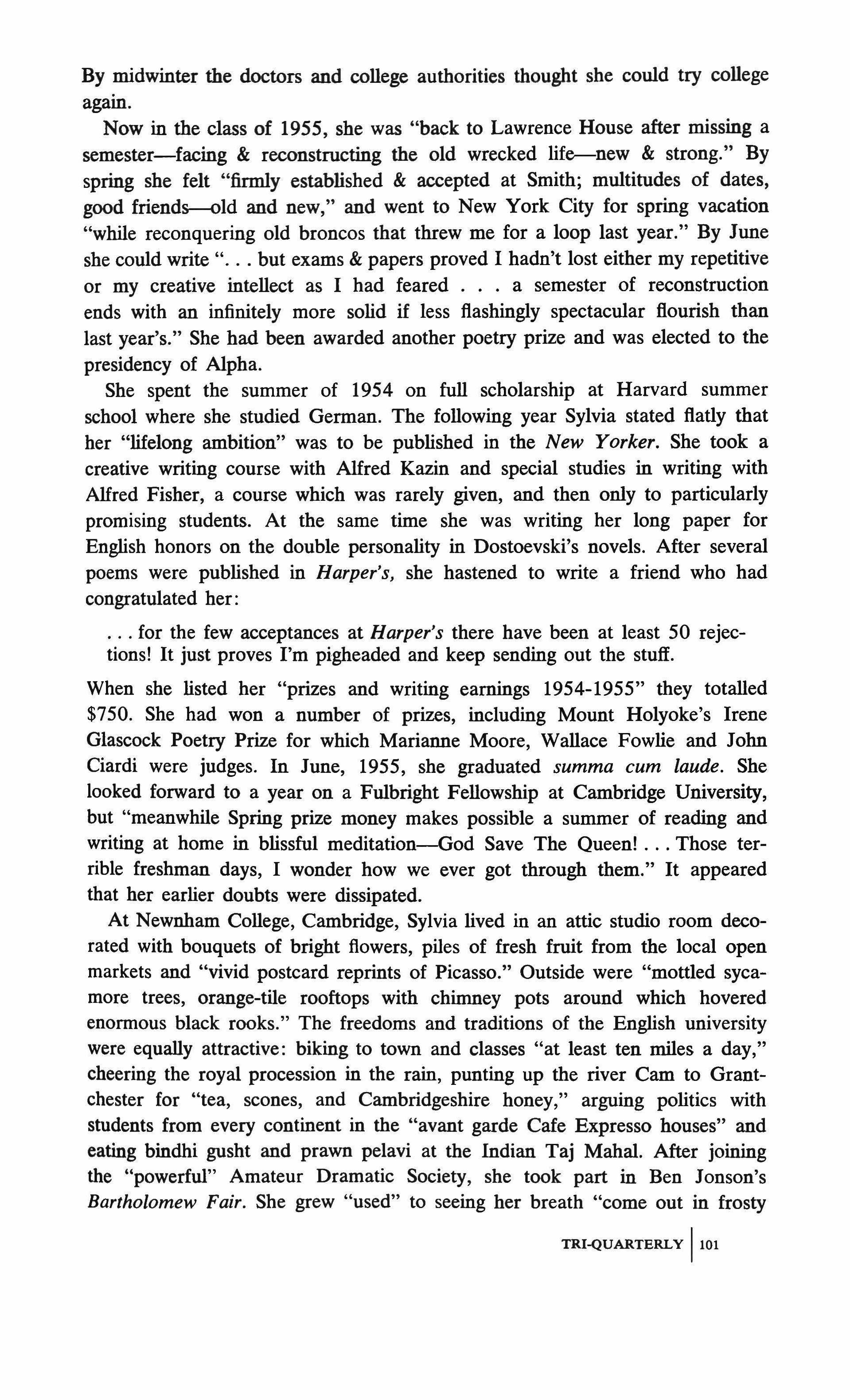
By midwinter the doctors and college authorities thought she could try college again.
Now in the class of 1955, she was "back to Lawrence House after missing a semester-facing & reconstructing the old wrecked Iife=-new & strong." By spring she felt "firmly established & accepted at Smith; multitudes of dates, good friends----old and new," and went to New York City for spring vacation "while reconquering old broncos that threw me for a loop last year." By June she could write" but exams & papers proved I hadn't lost either my repetitive or my creative intellect as I had feared a semester of reconstruction ends with an infinitely more solid if less flashingly spectacular flourish than last year's." She had been awarded another poetry prize and was elected to the presidency of Alpha.
She spent the summer of 1954 on full scholarship at Harvard summer school where she studied German. The following year Sylvia stated flatly that her "lifelong ambition" was to be published in the New Yorker. She took a creative writing course with Alfred Kazin and special studies in writing with Alfred Fisher, a course which was rarely given, and then only to particularly promising students. At the same time she was writing her long paper for English honors on the double personality in Dostoevski's novels. After several poems were published in Harper's, she hastened to write a friend who had congratulated her: for the few acceptances at Harper's there have been at least 50 rejections! It just proves I'm pigheaded and keep sending out the stuff.
When she listed her "prizes and writing earnings 1954-1955" they totalled $750. She had won a number of prizes, including Mount Holyoke's Irene Glascock Poetry Prize for which Marianne Moore, Wallace Fowlie and John Ciardi were judges. In June, 1955, she graduated summa cum laude. She looked forward to a year on a Fulbright Fellowship at Cambridge University, but "meanwhile Spring prize money makes possible a summer of reading and writing at home in blissful meditation-God Save The Queen! Those terrible freshman days, I wonder how we ever got through them." It appeared that her earlier doubts were dissipated.
At Newnham College, Cambridge, Sylvia lived in an attic studio room decorated with bouquets of bright flowers, piles of fresh fruit from the local open markets and "vivid postcard reprints of Picasso." Outside were "mottled sycamore trees, orange-tile rooftops with chimney pots around which hovered enormous black rooks." The freedoms and traditions of the English university were equally attractive: biking to town and classes "at least ten miles a day," cheering the royal procession in the rain, punting up the river Cam to Grantchester for "tea, scones, and Cambridgeshire honey," arguing politics with students from every continent in the "avant garde Cafe Expresso houses" and eating bindhi gusht and prawn pelavi at the Indian Taj Mahal. After joining the "powerful" Amateur Dramatic Society, she took part in Ben Jonson's Bartholomew Fair. She grew "used" to seeing her breath "come out in frosty
TRI-QUARTERLy 1101
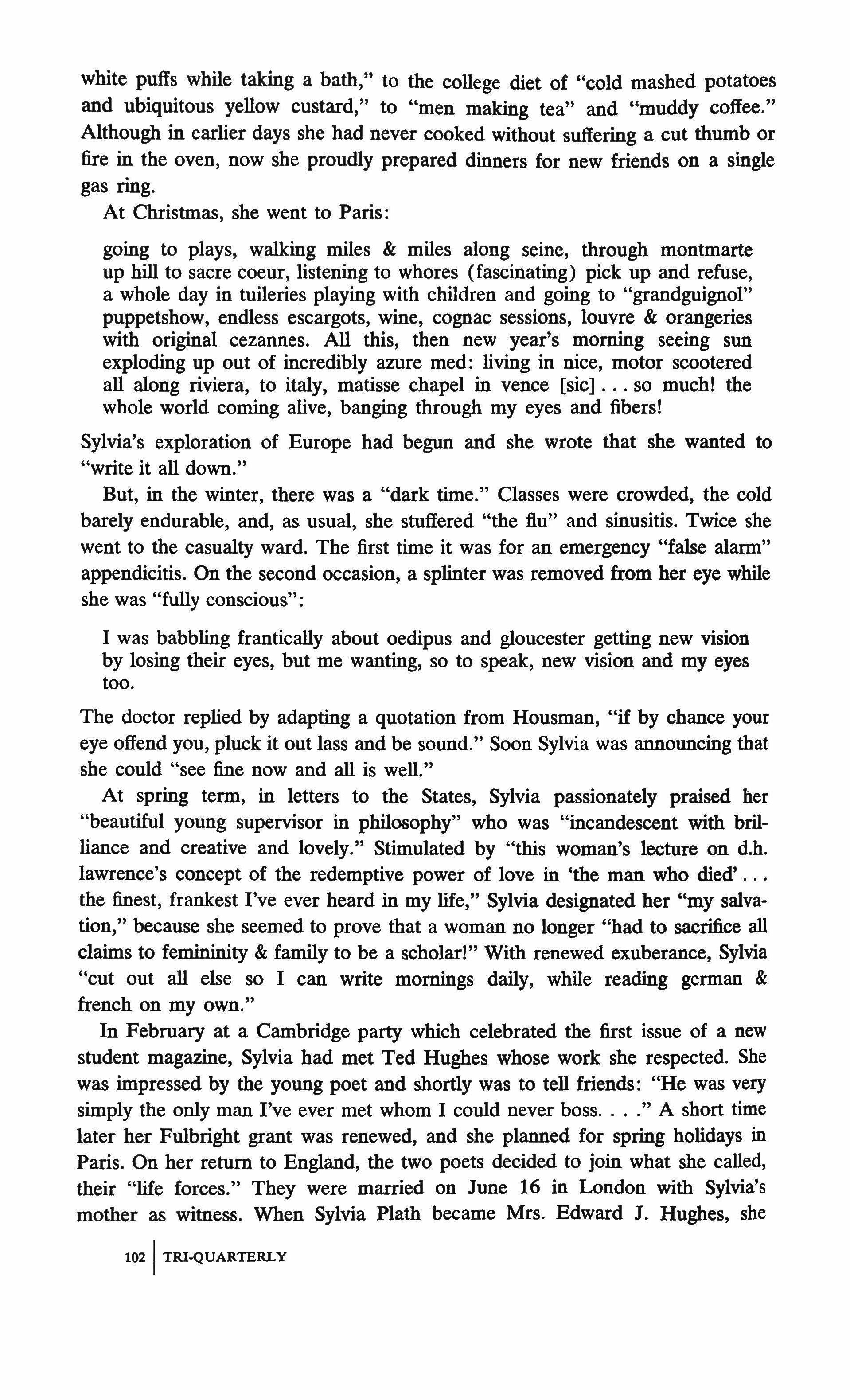
white puffs while taking a bath," to the college diet of "cold mashed potatoes and ubiquitous yellow custard," to "men making tea" and "muddy coffee." Although in earlier days she had never cooked without suffering a cut thumb or fire in the oven, now she proudly prepared dinners for new friends on a single gas ring.
At Christmas, she went to Paris: going to plays, walking miles & miles along seine, through montmarte up hill to sacre coeur, listening to whores (fascinating) pick up and refuse, a whole day in tuileries playing with children and going to "grandguignol" puppetshow, endless escargots, wine, cognac sessions, louvre & orangeries with original cezannes. All this, then new year's morning seeing sun exploding up out of incredibly azure med: living in nice, motor scootered all along riviera, to italy, matisse chapel in vence [sic] so much! the whole world coming alive, banging through my eyes and fibers!
Sylvia's exploration of Europe had begun and she wrote that she wanted to "write it all down."
But, in the winter, there was a "dark time." Classes were crowded, the cold barely endurable, and, as usual, she stuffered "the fiu" and sinusitis. Twice she went to the casualty ward. The first time it was for an emergency "false alarm" appendicitis. On the second occasion, a splinter was removed from her eye while she was "fully conscious":
I was babbling frantically about oedipus and gloucester getting new vision by losing their eyes, but me wanting, so to speak, new vision and my eyes too.
The doctor replied by adapting a quotation from Housman, "if by chance your eye offend you, pluck it out lass and be sound." Soon Sylvia was announcing that she could "see fine now and all is well."
At spring term, in letters to the States, Sylvia passionately praised her "beautiful young supervisor in philosophy" who was "incandescent with brilliance and creative and lovely." Stimulated by "this woman's lecture on d.h. lawrence's concept of the redemptive power of love in 'the man who died' the finest, frankest I've ever heard in my life," Sylvia designated her "my salvation," because she seemed to prove that a woman no longer "had to sacrifice all claims to femininity & family to be a scholar!" With renewed exuberance, Sylvia "cut out all else so I can write mornings daily, while reading german & french on my own."
In February at a Cambridge party which celebrated the first issue of a new student magazine, Sylvia had met Ted Hughes whose work she respected. She was impressed by the young poet and shortly was to tell friends: "He was very simply the only man I've ever met whom I could never boss A short time later her Fulbright grant was renewed, and she planned for spring holidays in Paris. On her return to England, the two poets decided to join what she called, their "life forces." They were married on June 16 in London with Sylvia's mother as witness. When Sylvia Plath became Mrs. Edward J. Hughes, she
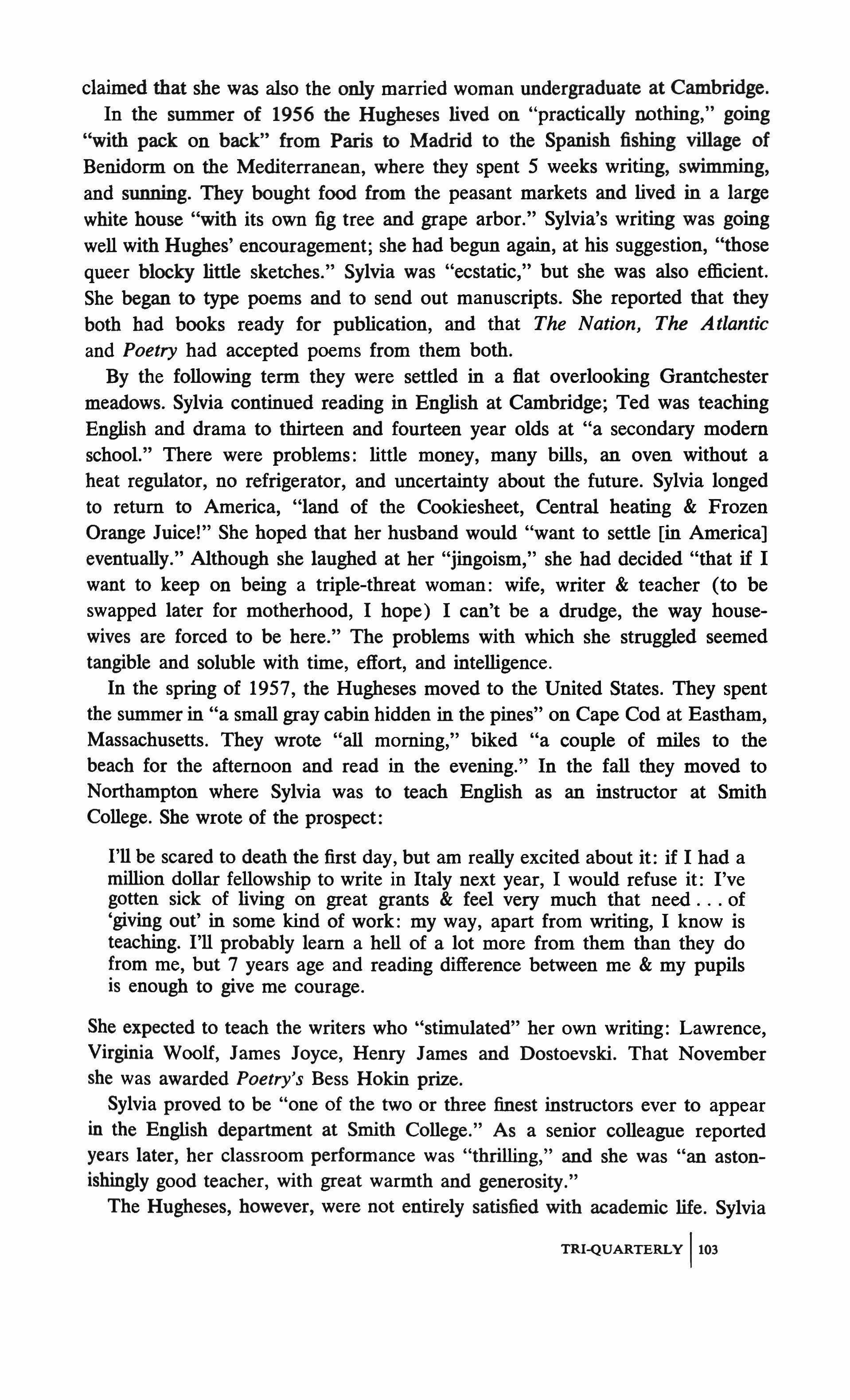
claimed that she was also the only married woman undergraduate at Cambridge. In the summer of 1956 the Hugheses lived on "practically nothing," going "with pack on back" from Paris to Madrid to the Spanish fishing village of Benidorm on the Mediterranean, where they spent 5 weeks writing, swimming, and sunning. They bought food from the peasant markets and lived in a large white house "with its own fig tree and grape arbor." Sylvia's writing was going well with Hughes' encouragement; she had begun again, at his suggestion, "those queer blocky little sketches." Sylvia was "ecstatic," but she was also efficient. She began to type poems and to send out manuscripts. She reported that they both had books ready for publication, and that The Nation, The Atlantic and Poetry had accepted poems from them both.
By the following term they were settled in a fiat overlooking Grantchester meadows. Sylvia continued reading in English at Cambridge; Ted was teaching English and drama to thirteen and fourteen year olds at "a secondary modem school." There were problems: little money, many bills, an oven without a heat regulator, no refrigerator, and uncertainty about the future. Sylvia longed to return to America, "land of the Cookiesheet, Central heating & Frozen Orange Juice!" She hoped that her husband would "want to settle [in America] eventually." Although she laughed at her "jingoism," she had decided "that if I want to keep on being a triple-threat woman: wife, writer & teacher (to be swapped later for motherhood, I hope) I can't be a drudge, the way housewives are forced to be here." The problems with which she struggled seemed tangible and soluble with time, effort, and intelligence.
In the spring of 1957, the Hugheses moved to the United States. They spent the summer in "a small gray cabin hidden in the pines" on Cape Cod at Eastham, Massachusetts. They wrote "all morning," biked "a couple of miles to the beach for the afternoon and read in the evening." In the fall they moved to Northampton where Sylvia was to teach English as an instructor at Smith College. She wrote of the prospect:
I'll be scared to death the first day, but am really excited about it: if I had a million dollar fellowship to write in Italy next year, I would refuse it: I've gotten sick of living on great grants & feel very much that need of 'giving out' in some kind of work: my way, apart from writing, I know is teaching. I'll probably learn a hell of a lot more from them than they do from me, but 7 years age and reading difference between me & my pupils is enough to give me courage.
She expected to teach the writers who "stimulated" her own writing: Lawrence, Virginia Woolf, James Joyce, Henry James and Dostoevski. That November she was awarded Poetry's Bess Hokin prize.
Sylvia proved to be "one of the two or three finest instructors ever to appear in the English department at Smith College." As a senior colleague reported years later, her classroom performance was "thrilling," and she was "an astonishingly good teacher, with great warmth and generosity."
The Hugheses, however, were not entirely satisfied with academic life. Sylvia
TRI-QUARTERLY , 103

wrote, although I loved teaching, the great conflict was with writing. I wore my eyes out on 70 student themes every other week and had no energy for writing a thing." The decision to give up teaching was difficult and significant: Sylvia discarded a plan formed in youth to accept a less certain existence. She was painfully aware that she was disappointing some of the people who had been most helpful in college and Cambridge days, but she acted with the encouragement of those who had confidence in her creative ability.
In 1958-59, the Hugheses lived in a small cramped apartment on Beacon Hill "on a shoestring for a year in Boston writing to see what we could do." Their savings were supplemented by occasional income from readings and small jobs. Sylvia began to visit Robert Lowell's poetry classes at Boston University where she met George Starbuck and Anne Sexton. She renewed acquaintance with Peter Davison. Sometimes she accompanied Hughes on visits to Stanley Kunitz where she remained generally silent while the men talked.
To everyone she seemed "neat," "trim," "tidy," and apparently it was difficult to penetrate her shy sociability, what a friend has called "the social Smith facade." Lowell recalls her as a "distinguished, delicate, complicated person" in whom there was "no intimation of what would come later." He thought her "unusually sensitive and intelligent" and characterized her poetic approach as "controlled and modest," but he was startled by the burst of talent she later displayed.
Sylvia felt she was "beginning to wither to one of my silent centers," and in the discouragement of repeatedly submitting the manuscript of her book of poems under ever-changing titles, she wrote:
Nothing stinks like a pile of unpublished writing, which remark I guess shows I still don't have a pure motive (0 it's-such-fun-I-just-can't-stopwho-cares-if-it's-published-or-read) about writing I still want to see it finally ritualized in print.
Later she agreed that it was "healthy" to be reminded that once publication in the New Yorker had seemed a distant goal.
In the spring, Ted Hughes received a Gunggenheim fellowship. That summer the couple took a camping trip across the United States, and from September 9 to November 9 were residents at Yaddo. In December, 1959, they returned to England to live and work. Sylvia was pregnant with their first child. The next weeks were to be exhausting, when, coming down to London from The Beacon, the Hughes family home in Yorkshire, they hunted in the intense cold, for an apartment.
On February 1, 1960, the Hugheses moved into a small flat in a London building which was being converted from a tenement for Irish laborers. The landlord promised it would be "just like Chelsa." Their first child was due to be born at home because they were too late to register for a hospital under the National Health Act. Although Sylvia was "in spirit all for home births with the father there," she had been warned by an American obstetrician
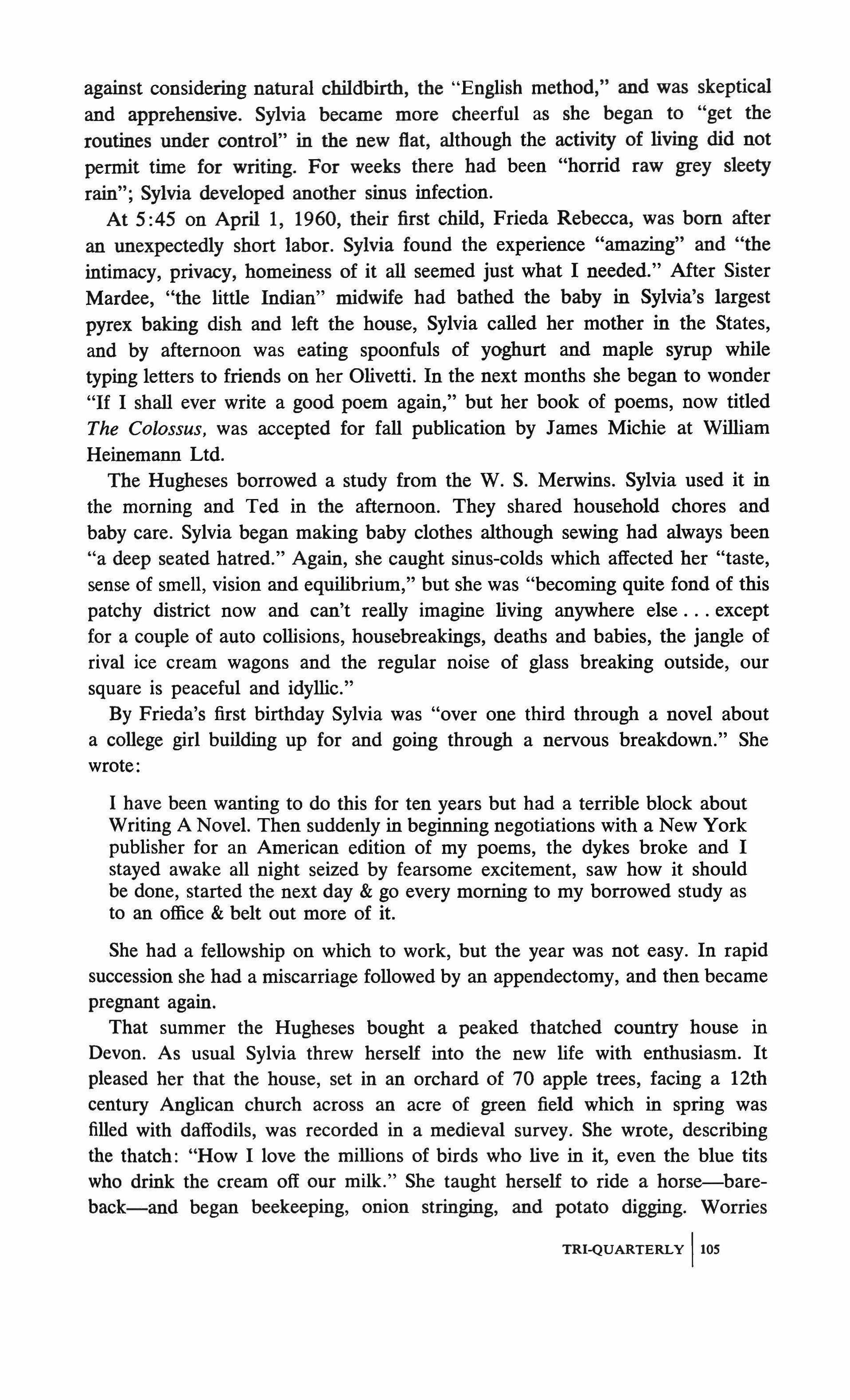
against considering natural childbirth, the "English method," and was skeptical and apprehensive. Sylvia became more cheerful as she began to "get the routines under control" in the new fiat, although the activity of living did not permit time for writing. For weeks there had been "horrid raw grey sleety rain"; Sylvia developed another sinus infection.
At 5 :45 on April 1, 1960, their first child, Frieda Rebecca, was born after an unexpectedly short labor. Sylvia found the experience "amazing" and "the intimacy, privacy, homeiness of it all seemed just what I needed." After Sister Mardee, "the little Indian" midwife had bathed the baby in Sylvia's largest pyrex baking dish and left the house, Sylvia called her mother in the States, and by afternoon was eating spoonfuls of yoghurt and maple syrup while typing letters to friends on her Olivetti. In the next months she began to wonder "If I shall ever write a good poem again," but her book of poems, now titled The Colossus, was accepted for fall publication by James Michie at William Heinemann Ltd.
The Hugheses borrowed a study from the W. S. Merwins. Sylvia used it in the morning and Ted in the afternoon. They shared household chores and baby care. Sylvia began making baby clothes although sewing had always been "a deep seated hatred." Again, she caught sinus-colds which affected her "taste, sense of smell, vision and equilibrium," but she was "becoming quite fond of this patchy district now and can't really imagine living anywhere else except for a couple of auto collisions, housebreakings, deaths and babies, the jangle of rival ice cream wagons and the regular noise of glass breaking outside, our square is peaceful and idyllic."
By Frieda's first birthday Sylvia was "over one third through a novel about a college girl building up for and going through a nervous breakdown." She wrote:
I have been wanting to do this for ten years but had a terrible block about Writing A Novel. Then suddenly in beginning negotiations with a New York publisher for an American edition of my poems, the dykes broke and I stayed awake all night seized by fearsome excitement, saw how it should be done, started the next day & go every morning to my borrowed study as to an office & belt out more of it.
She had a fellowship on which to work, but the year was not easy. In rapid succession she had a miscarriage followed by an appendectomy, and then became pregnant again.
That summer the Hugheses bought a peaked thatched country house in Devon. As usual Sylvia threw herself into the new life with enthusiasm. It pleased her that the house, set in an orchard of 70 apple trees, facing a 12th century Anglican church across an acre of green field which in spring was filled with daffodils, was recorded in a medieval survey. She wrote, describing the thatch: "How I love the millions of birds who live in it, even the blue tits who drink the cream off our milk." She taught herself to ride a horse-bareback-and began beekeeping, onion stringing, and potato digging. Worries
TRI-QUARTERLy 1105
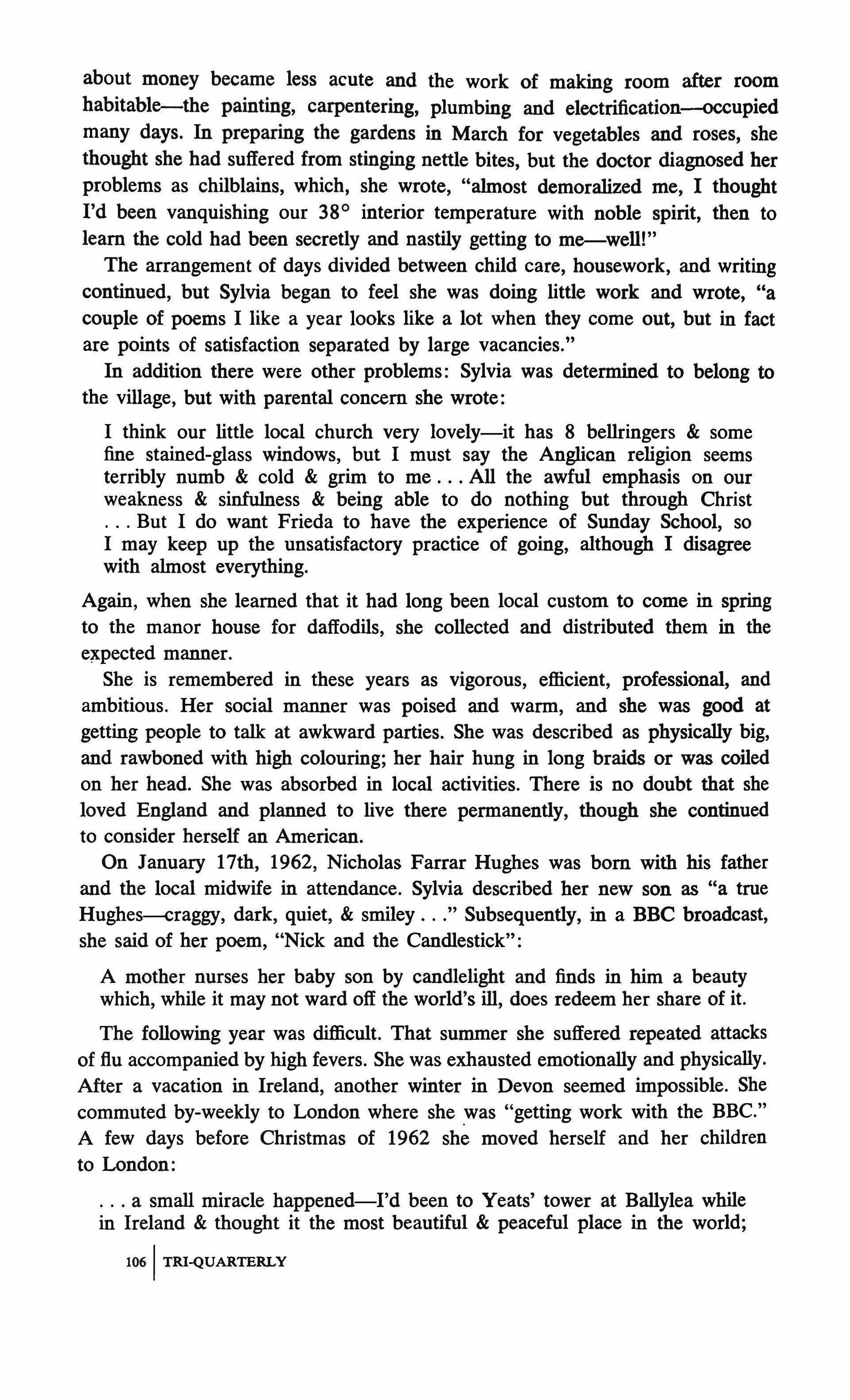
about money became less acute and the work of making room after room habitable-the painting, carpentering, plumbing and electrification-occupied many days. In preparing the gardens in March for vegetables and roses, she thought she had suffered from stinging nettle bites, but the doctor diagnosed her problems as chilblains, which, she wrote, "almost demoralized me, I thought I'd been vanquishing our 380 interior temperature with noble spirit, then to learn the cold had been secretly and nastily getting to me-well!"
The arrangement of days divided between child care, housework, and writing continued, but Sylvia began to feel she was doing little work and wrote, "a couple of poems I like a year looks like a lot when they come out, but in fact are points of satisfaction separated by large vacancies."
In addition there were other problems: Sylvia was determined to belong to the village, but with parental concern she wrote:
I think our little local church very lovely-it has 8 bellringers & some fine stained-glass windows, but I must say the Anglican religion seems terribly numb & cold & grim to me All the awful emphasis on our weakness & sinfulness & being able to do nothing but through Christ But I do want Frieda to have the experience of Sunday School, so I may keep up the unsatisfactory practice of going, although I disagree with almost everything.
Again, when she learned that it had long been local custom to come in spring to the manor house for daffodils, she collected and distributed them in the expected manner.
She is remembered in these years as vigorous, efficient, professional, and ambitious. Her social manner was poised and warm, and she was good at getting people to talk at awkward parties. She was described as physically big, and rawboned with high colouring; her hair hung in long braids or was coiled on her head. She was absorbed in local activities. There is no doubt that she loved England and planned to live there permanently, though she continued to consider herself an American.
On January 17th, 1962, Nicholas Farrar Hughes was born with his father and the local midwife in attendance. Sylvia described her new son as "a true Hughes-s-craggy, dark, quiet, & smiley Subsequently, in a BBC broadcast, she said of her poem, "Nick and the Candlestick":
A mother nurses her baby son by candlelight and finds in him a beauty which, while it may not ward off the world's ill, does redeem her share of it.
The following year was difficult. That summer she suffered repeated attacks of flu accompanied by high fevers. She was exhausted emotionally and physically. After a vacation in Ireland, another winter in Devon seemed impossible. She commuted by-weekly to London where she ,was "getting work with the BBC." A few days before Christmas of 1962 she moved herself and her children to London:
a small miracle happened-I'd been to Yeats' tower at Ballylea while in Ireland & thought it the most beautiful & peaceful place in the world;
TRI-QUARTERLY
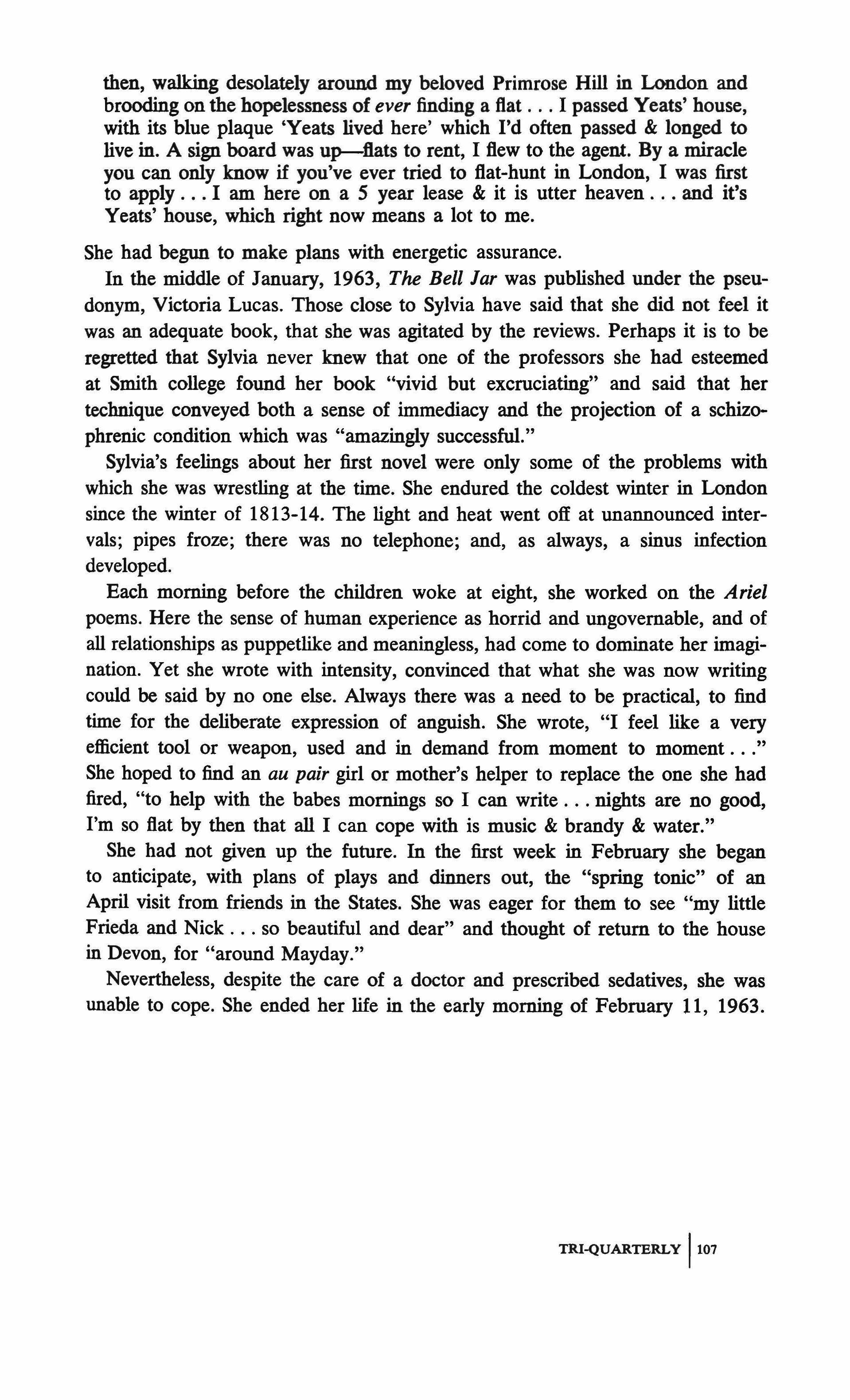
then, walking desolately around my beloved Primrose Hill in London and brooding on the hopelessness of ever finding a flat I passed Yeats' house, with its blue plaque 'Yeats lived here' which I'd often passed & longed to live in. A sign board was up--ftats to rent, I flew to the agent. By a miracle you can only know if you've ever tried to flat-hunt in London, I was first to apply I am here on a 5 year lease & it is utter heaven and it's Yeats' house, which right now means a lot to me.
She had begun to make plans with energetic assurance.
In the middle of January, 1963, The Bell Jar was published under the pseudonym, Victoria Lucas. Those close to Sylvia have said that she did not feel it was an adequate book, that she was agitated by the reviews. Perhaps it is to be regretted that Sylvia never knew that one of the professors she had esteemed at Smith college found her book "vivid but excruciating" and said that her technique conveyed both a sense of immediacy and the projection of a schizophrenic condition which was "amazingly successful."
Sylvia's feelings about her first novel were only some of the problems with which she was wrestling at the time. She endured the coldest winter in London since the winter of 1813-14. The light and heat went off at unannounced intervals; pipes froze; there was no telephone; and, as always, a sinus infection developed.
Each morning before the children woke at eight, she worked on the Ariel poems. Here the sense of human experience as horrid and ungovernable, and of all relationships as puppetlike and meaningless, had come to dominate her imagination. Yet she wrote with intensity, convinced that what she was now writing could be said by no one else. Always there was a need to be practical, to find time for the deliberate expression of anguish. She wrote, "I feel like a very efficient tool or weapon, used and in demand from moment to moment " She hoped to find an au pair girl or mother's helper to replace the one she had fired, "to help with the babes mornings so I can write nights are no good, I'm so flat by then that all I can cope with is music & brandy & water."
She had not given up the future. In the first week in February she began to anticipate, with plans of plays and dinners out, the "spring tonic" of an April visit from friends in the States. She was eager for them to see "my little Frieda and Nick so beautiful and dear" and thought of return to the house in Devon, for "around Mayday."
Nevertheless, despite the care of a doctor and prescribed sedatives, she was unable to cope. She ended her life in the early morning of February 11, 1963.

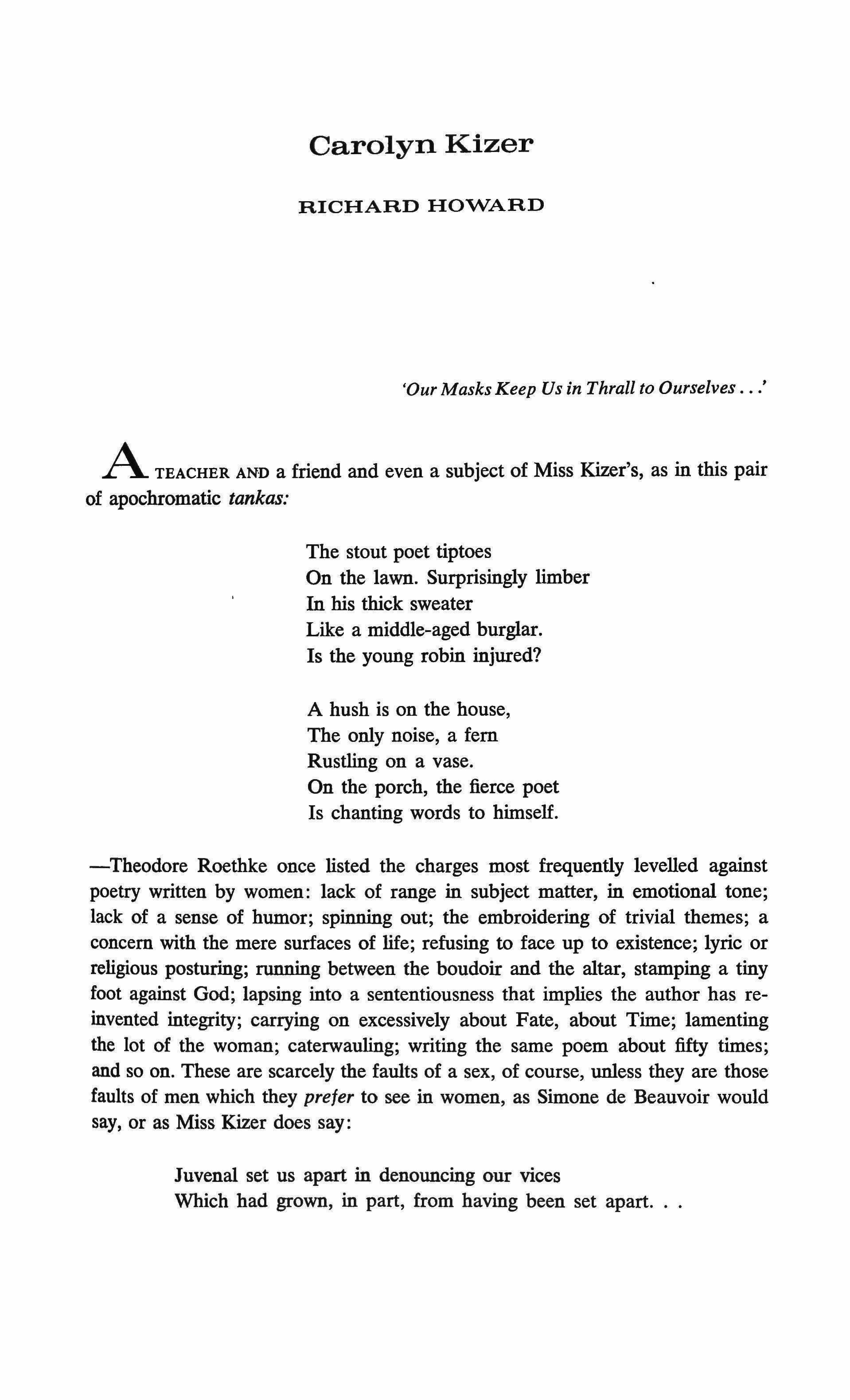
'Our
Masks Keep Us in Thrall to Ourselves .'
ATEACHER AND a friend and even a subject of Miss Kizer's, as in this pair of apochromatic tankas:
The stout poet tiptoes
On the lawn. Surprisingly limber In his thick sweater Like a middle-aged burglar. Is the young robin injured?
A hush is on the house, The only noise, a fern Rustling on a vase.
On the porch, the fierce poet Is chanting words to himself.
-Theodore Roethke once listed the charges most frequently levelled against poetry written by women: lack of range in subject matter, in emotional tone; lack of a sense of humor; spinning out; the embroidering of trivial themes; a concern with the mere surfaces of life; refusing to face up to existence; lyric or religious posturing; running between the boudoir and the altar, stamping a tiny foot against God; lapsing into a sententiousness that implies the author has reinvented integrity; carrying on excessively about Fate, about Time; lamenting the lot of the woman; caterwauling; writing the same poem about fifty times; and so on. These are scarcely the faults of a sex, of course, unless they are those faults of men which they prefer to see in women, as Simone de Beauvoir would say, or as Miss Kizer does say:
Juvenal set us apart in denouncing our vices Which had grown, in part, from having been set apart.

No, these are the faults of selfhood itself, to oppose which is very much like being dead set against sin-they are no more than the possibilities and the problems that must be faced by any writer. Miss Kizer, whom Roethke himself acknowledged as "willing to take chances with unusual material," has approached the baleful list in the bravest way, not seeking to escape the damages but rather to incur and so transcend them. She does not fear-indeed she wants-to do all the things Roethke says women are blamed for, and indeed I think she does do them (though if she lacks a sense of humor, it is never when the joke is on her), and this makes her terribly suspect, of course-no one could be really womanly if so womanly as all that. But doing them or not, being determined to do them makes her a different kind of poet from the one who manages to avoid the traps of his condition, and gives her a different kind of success from the one that "in circuit lies," as Emily Dickinson put it. Carolyn Kizer has succeeded otherwise, has succeeded head on, in a most difficult exertion-she has transformed her character into fate, or shown, by the most markedly contrasting and often contesting means, that aspect of her character which is fate. Employing or suffering -undergoing, at any rate-all the potential disqualifications Roethke asserts to be imminent in her enterprise-"the raw material of a ritual"-Miss Kizer has made the woman of her poems a Figure rather than a Character, an emblem rather than a case, so that what we discover in reading her, or what we deserve if we have heard the poems in the right voice-one that allows if it does not itself release the Grand Gynaesic Gesture-is something larger and more luminous than life, though composed, surely, of just the details we are accustomed to reckon with in accounts of selfhood smaller than life-the accounts of prose, I mean, and smaller in that their scrutiny is more intense and deliberate than our living will ordinarily bear. In her idiophany, Carolyn Kizer has been able to raise our implicit recognition of the via naturaliter [emina into explicit distinction; from the fatal etcetera of things in a woman's life, as well as from its unique occasions, from what I have called the household bonds as well as the heroic body:
We who must act as handmaidens
To our own goddess, tum too fast, Trip on our hems, to glimpse the muse
Gliding below her lake or sea, Are left, long-staring after her, Narcissists by necessity;
Or water-carriers of our young Till waters burst, and white streams flow Artesian, from the lifted breast: Cup-bearers then, to tiny gods, Imperious table pounders, who Are final arbiters of thirst.
Fasten the blouse, and mount the steps From kitchen taps to Royal Barge, Assume the trident, don the crown, Command the Water Music now That men bestow on Virgin Queens; Or, goddessing above the waist,
Appear as swan on Thames or Charles Where iridescent foam conceals
The paddle-stroke beneath the glide: Immortal feathers preened in poems! Not our true, intimate nature, stained By labor, and the casual tide.
-from these acknowledgments worthy of a Colette, Miss Kizer has wrought a new shape of consciousness; with the admission that the prison and the desert are not within everyone's range, that the Criminal and the Adventurer, as in, say, the work of Genet and of T. E. Lawrence, do not represent forms of activity which most appeal to her as life, she has worked out of the old Austrian precept immer fortwurschteln, always muddle along, a kind of suburban sanctity-out of these "dull and partial couplings with ourselves afraid to become our neighbors," by some brilliantly contrived and often exotic distancing effects, she has created what I like to call a Figure,
nailed to our domesticity
Like Van Gogh to the wall, wild in his frame, Doubling in mirrors, that the sinister self Who moves along with us may own at last Her own reverses
something impersonal and unaccommodating, as Antigone and Phedre would be Figures-of that condition which the personal only hides.

Miss Kizer was born in Spokane, grew up in the San Fernando Valley north of Los Angeles, and lives now in Seattle, where she has edited the magazine she founded, Poetry Northwest, and is engaged, as she says, "in the practice of poetry." Her first book, The Ungrateful Garden, published (by Indiana University Press) when she was in her middle thirties, is by its reach West to "the Japanese Mode" and East to Vienna and the Greek myths an ambitious
TRI-QUARTERLy 1111

reversal of the usual directions in which we venture to possess such things. "One half the individual is locality," Frost once wrote to a friend, and it was early that Miss Kizer discovered the advantages to the other half of her situation on the stiff upper lip of the Pacific: the exile that belongs to oneself, the interior exile. The "gravely gay" book is dedicated, in its three parts, to her mother, her father and her children, in fulfilment of those ritual pieties she has taken care to repossess in her own uncomfortable way:
in these austerities, These arbitrary disciplines of mine, Most of them trivial: like covering The children on my way to bed, and trying To live well enough alone, and not to dream Of grappling in the snow, claws plunged in fur, Or waken in a caterwaul of dying.
Its content, in every sense, is what the author knows already-as a child knows best, first of all:
Thomas Love Peacock! Thomas Love Peacock!
I used to croon, sitting on the pot, My sympathetic magic, at age three. These elements in balance captured me: Love in the middle, on his right hand a saint and doubter
On Love's left hand, the coarse essentials: Thomas Love Peacock! Thomas Love Peacock! The person unsung, the person ritually sung. But that was thirty years ago; a child's loving Of God, the body, flesh of poetry
then what as a woman writer she has learned:
Perhaps not happiness, but still A certain comfort
I know, I know. I've gone before
A poet to whom no one cruel or imposing listens, Disdained by senates
Our limited salvation is the word, A bridge between our Nature and our Time.
and what as a human being she must merely endure:
1121 TRI-QUARTERLY
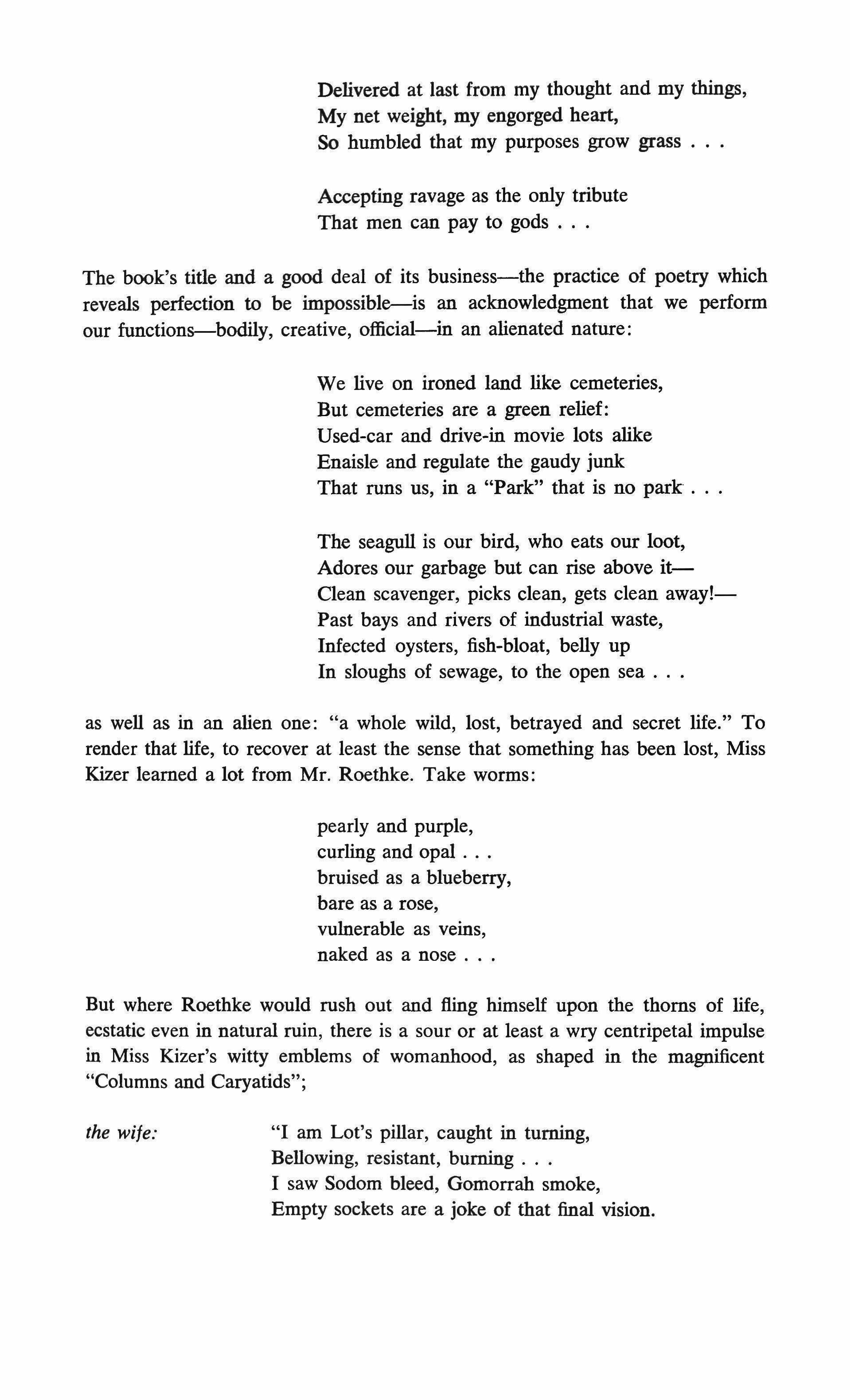
Delivered at last from my thought and my things, My net weight, my engorged heart, So humbled that my purposes grow grass
Accepting ravage as the only tribute That men can pay to gods
The book's title and a good deal of its business-the practice of poetry which reveals perfection to be impossible-is an acknowledgment that we perform our functions-bodily, creative, official-in an alienated nature:
We live on ironed land like cemeteries, But cemeteries are a green relief: Used-car and drive-in movie lots alike Enaisle and regulate the gaudy junk That runs us, in a "Park" that is no park
The seagull is our bird, who eats our loot, Adores our garbage but can rise above itClean scavenger, picks clean, gets clean away!Past bays and rivers of industrial waste, Infected oysters, fish-bloat, belly up In sloughs of sewage, to the open sea
as well as in an alien one: "a whole wild, lost, betrayed and secret life." To render that life, to recover at least the sense that something has been lost, Miss Kizer learned a lot from Mr. Roethke. Take worms:
pearly and purple, curling and opal bruised as a blueberry, bare as a rose, vulnerable as veins, naked as a nose
But where Roethke would rush out and fling himself upon the thorns of life, ecstatic even in natural ruin, there is a sour or at least a wry centripetal impulse in Miss Kizer's witty emblems of womanhood, as shaped in the magnificent "Columns and Caryatids";
the wife: "I am Lot's pillar, caught in turning, Bellowing, resistant, burning I saw Sodom bleed, Gomorrah smoke, Empty sockets are a joke of that final vision.
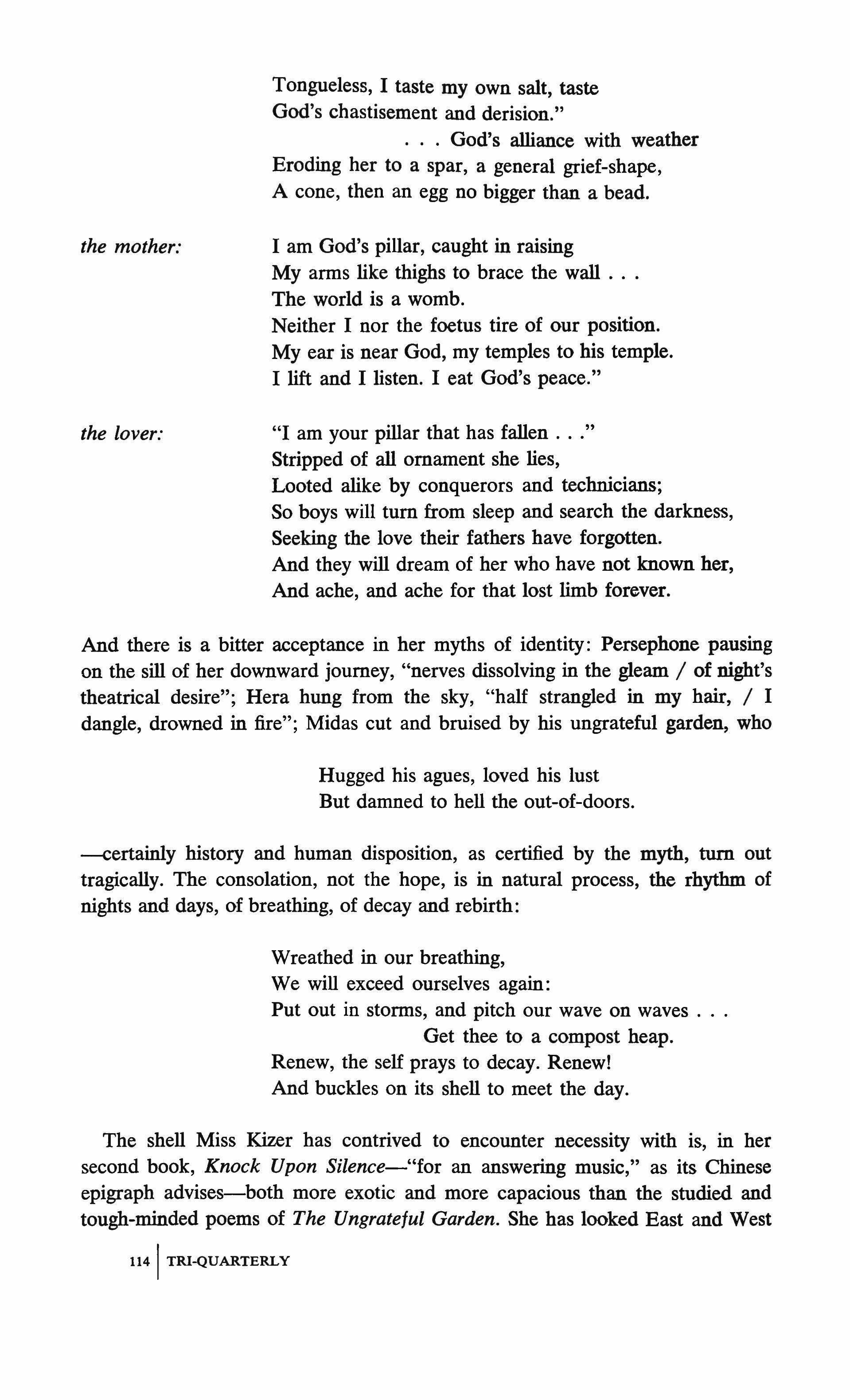
Tongueless, I taste my own salt, taste God's chastisement and derision."
God's alliance with weather
Eroding her to a spar, a general grief-shape, A cone, then an egg no bigger than a bead.
the mother: I am God's pillar, caught in raising My arms like thighs to brace the wall The world is a womb. Neither I nor the foetus tire of our position. My ear is near God, my temples to his temple. I lift and I listen. I eat God's peace."
the lover: "I am your pillar that has fallen ."
Stripped of all ornament she lies, Looted alike by conquerors and technicians; So boys will tum from sleep and search the darkness, Seeking the love their fathers have forgotten. And they will dream of her who have not known her, And ache, and ache for that lost limb forever.
And there is a bitter acceptance in her myths of identity: Persephone pausing on the sill of her downward journey, "nerves dissolving in the gleam / of night's theatrical desire"; Hera hung from the sky, "half strangled in my hair, / I dangle, drowned in fire"; Midas cut and bruised by his ungrateful garden, who
Hugged his agues, loved his lust But damned to hell the out-of-doors.
--certainly history and human disposition, as certified by the myth, tum out tragically. The consolation, not the hope, is in natural process, the rhythm of nights and days, of breathing, of decay and rebirth:
Wreathed in our breathing, We will exceed ourselves again: Put out in storms, and pitch our wave on waves Get thee to a compost heap. Renew, the self prays to decay. Renew! And buckles on its shell to meet the day.
The shell Miss Kizer has contrived to encounter necessity with is, in her second book, Knock Upon Silence-"for an answering music," as its Chinese epigraph advises-both more exotic and more capacious than the studied and tough-minded poems of The Ungrateful Garden. She has looked East and West

again for personae, masks and voices that will "renew" her need, and if her wit is less explicit in reference than when she sang:
Come candidly, consort with me, And spill our pleasure for a day
it is more inclusive, it can afford, in a declension of the same refrain, the music of experience rather than that of convention:
I am monogamous as the North Star
But I don't want you to know it. You'd only take advantage. While you are as fickle as spring sunlight. All right, sleep! The cat means more to you than I.
I can rouse you, but then you swagger out.
I glimpse you from the window, striding toward the river.
Abandoning Marlowe and Heine and the careful rhymes of what it would be perversely modest to regard as her apprenticeship, let us call it her initiation, Miss Kizer here lights on Arthur Waley and on Juvenal-the received English version of classical Chinese and that most relaxed of Western metrics, the Roman hexameter. The book is deceptive, appearing to be given over altogether to literary ventriloquism, though as soon as we get beyond the titles of its four sections-"Chinese Imitations"; "A Month in Summer, after Issa's The Year of My Life", which revealed to Miss Kizer "the most satisfactory method of writing Haiku"; "from Pro Femina", and "Translations of Tu Fu"-we discover that the stomach Miss Kizer is speaking from is her own, and that all the masks are necessary to keep her pangs from drowning out her perceptions. The Chinese "imitations" reveal how much more personal this poet has allowed herself to become in what Colette once called the honorable if not the lively pleasure of not speaking of love:
By the time we reach middle life, we've all been deserted and robbed. But flowers and grass and animals keep me warm.
And I remind myself to become philosophic: We are meant to be stripped down, to prepare us for somthing better.
And surely it is because of the wonderful poise-in-disaster she has learned in the twenty translations from Tu Fu (A.D. 712-770), with their resignation to exile and disgrace yet their insistence on the value of nature, "randomness, Art's impulse, true disorder" and of friendship, drinking and memory, that she has made these imitations so much her own. Like Morris Graves, whom she had already praised in her first book for his Oriental capacity to make something out of unpromising materials-
TRI-QUARTERLY IllS
poor crockery, immortal on twenty sheets of paper-
Carolyn Kizer has found a voice for her woman's condition, and her human one, which allows her to bring forth only the more for all she has borrowed:
You, my brother, are a good and violent drinker, Good at reciting short-line or long-line poems. In time we will lose all our daughters, you and I, Be temperate, venerable, content to stay in one place, Sending our messages over the mountains and waters.
As in this message to Creeley, "Amusing Our Daughters," the poet gathers up all her tones, all her tempers into a hovering posture of control, a swaying form, so that such "Chinese imitations" are indeed what Coleridge said an imitation was: the mesothesis of likeness and difference. The difference is an essential to it as the likeness, for without the difference it would be Copy or Facsimile. The volume further contains a curious record, in the form of a prose diary, of a broken love affair, or its actual breaking, punctuated by haiku. The prose pieces keep pulling away from the agony, seeking release in the distractions of learning:
One of the profound consolations of reading the works of Japanese men of letters is their frank acknowledgment of neurotic sloth. Or the overwhelming impuse, when faced with hurt or conflict, to stay in bed under the covers!
but the demanding little syllables of the haiku are relentless in their return to the pain:
Alone in my house
I can make gross noises
Like a caught hare or stoat Or a woman in labor.
Why these artifices appropriated from a culture that does not belong to her? Perhaps, Miss Kizer suggests, because the only way to deal with sorrow is to find a form in which to contain it.
*
As an equipoise to this mutilated apology for a love poem, Knock Against Silence also contains Miss Kizer's public voice: fragments from a Juvenalian apology Pro Femina, dedicated to our most famous translators from Greek and Latin, Robert Fitzgerald and Rolfe Humphries. Here the critical intelligence
TRI-QUARTERLY

that in the first book focussed so sharply inward is allowed its most generous locus in the Situation Abroad. The independent woman, and the woman of letters are cracked open, in these looping hexameters, like so many husks, and the satiric truth threshed:
Our masks, always in peril of smearing or cracking, In need of continuous check in the mirror of silverware, Keep us in thrall to ourselves, concerned with our surfaces Freed in fact, not in custom, lifted from furrow and scullery, Not obliged, now, to be the pot for the annual chicken, Have we begun to arrive in time? With our well-known Respect for life because it hurts so much to come out with it;
Disdainful of "sovereignty", "national honor" and other abstractions; We can say, like the ancient Chinese to successive waves of invaders, "Relax and let us absorb you Meanwhile, observe our creative chaos, Flux, efflorescence, whatever you care to call it!
I would care to call it poetry, of a fruitfully damaged, unresolved and nearly inescapable order. There is, on the jacket of this new book, a photograph of the poet, a beautiful woman looking out at us in a Chinese gown, on a Consular chair-with just that combination of the Roman Matron and the Oriental Courtesan which makes up all her authority and all her indecision-"creative chaos." It is odd to find Cornelia and the Geisha together, but Carolyn Kizer proves that such manners are no more than the means by which a poetry obtains access to reality, to the realized values of a life else no more than endured or evaded:
Now, if we struggle abnormally, we may almost seem normal; If we submerge our self-pity in disciplined industry; If we stand up and be hated, and swear not to sleep with editors; If we regard ourselves formally, respecting our true limitations Without making an unseemly show of trying to unfreeze our assets; Keeping our heads and our pride while remaining unmarried; And if wedded, kill guilt in its tracks when we stack up the dishes And defect to the typewriter. And if mothers, believe in the luck of our children, Whom we forbid to devour us, whom we shall not devour, And the luck of our husbands and lovers, who keep free women.


'TurnedBack to the Wild by Love'
WHENMAy SWENSON, speaking in her thaumaturgical fashion of poetry, says that "attention to the silence in between is the amulet that makes it work," we are reminded, while on other occasions in her work we are reassured, that there is a kind of poetry, as there used to be a kind of love, which dares not speak its name. Indeed, it was in the latter's heyday (1891, whenMallarme thanked Oscar Wilde for The Picture of Dorian Gray, "one of the only books that can move me, for its commotion proceeds from an essential reverie, and from the strangest silences of the soul"), that the former's program was devised, by the thanker: "to name an object is to suppress three-quarters of our pleasure in the poem, a pleasure which consists in gradually divining ; to suggest, that is the ideal. That is making perfect use of the kind of mystery which constitutes the symbo1." Of course, there is a complementary impulse to identify in this reluctance to call a spade a spade; it is an impulse implicit in the very paradox supported by the word identification, which we use both to select an object in all its singularity, and to dissolve that "identical" object into its likeness with another. The refusal, or the reluctance, to name in order that she may the more truly identify is what we notice first about May Swenson's poetry-though she does not proceed so strictly with the enterprise as Mallarme, for whom the designation of a flower enforced its absence from any bouquet. When Miss Swenson says: beautiful each Shape to see wonderful each Thing to name
she means the kind of ascertaining of Existence Holderlin meant when he said that poetry was a naming of the Gods-and for such an appeal (such an appellation), the ordinary labels do not suffice. Miss Swenson would not be so extreme
TRI-QUARTERLy 1119

about her magic as the symbolists, but she is plainly aware of the numbing power of proper names; as the story of Rumpelstiltskin demonstrates, there is an awful mastery in knowing what a being is called, and in so calling him-indeed such mastery suggests, to May Swenson at least, a corresponding lack of attention to the quality of being itself; a failure, by the wielding of nomination's "mace petrifle," to encounter, to espouse form as it becomes what it is.
It is an old kind of poetry, then, that this poet resumes in her quest for "my face in the rock, my name on the wildest tree," a poetry that goes back to Orpheus, probably, and moves forward through Blake and Emily Dickinson, whom May Swenson specifically echoes, I think, in her eagerness to see Being wherever she looks:
Any Object before the Eye can fill the space can occupy the supple frame of eternity my Hand before me such tangents reaches into Much root and twig extremes can touch any Hour can be the all expanding like a cunning Ball to a Vast from very small any Single becomes the More multiples sprout from alpha'S core from Vase oflegend vessels oflore
It is the poetry which comes into existence whenever the need is felt (as by Valery most recently, most magisterially) to charm, to enchant, to bind by spells an existence otherwise apprehended as inaccessibly other. For as Valery says of Orpheus, it was only by his songs that trees knew the full horror of dancing. Similarly, in May Swenson's kennings, their method "a parliament of overlappings" and their goal "an assuaging singleness," we find that the hand in her lap, the cat on the sill, the cloud in the sky become, before we have a chance to adjust our sights and to enslave our other senses as well to what we know, fables of unlabelled Being:
For each path leads both out and in I come while going No to and from There is only here And here is as well as there Wherever I am led I move within the care of the season hidden in the creases of her skirts of green or brown or beaded red And when they are white
I am not lost I am not lost then only covered for the night
Evidently, Miss Swenson's effort has been to discover runes, the conjurations by which she can not only apostrophize the hand, the cat and the cloud in their innominate otherness, but by which she can, in some essential and relieving way, become them, leave her own impinging selfhood in the paralyzed region where names are assigned, and assume instead the energies of natural process.
From the first-in 1954, the first of Scribners' Poets of Today series included her first collection, the significantly titled Another Animal-May Swenson has practiced, in riddles, chants, hex-signs and a whole panoply of invented sortilege unwonted in Western poetry since the Witch of Endor brought up Samuel, the ways not only of summoning Being into her grasp, but of getting herself out of that grasp _and into alien shapes, into those emblems of power most often identified with the sexual:
on this ball half dark half light
i walk Upright i lie Prone within the night the longing that i know is in the Stone also it must be the same that rises in the Tree the longing in the Lion's call speaks for all
oh to Endure like the stone sufficient to itself alone or Reincarnate like the tree be born each spring to greenery
or like the lion without law to roam the Wild on velvet paw
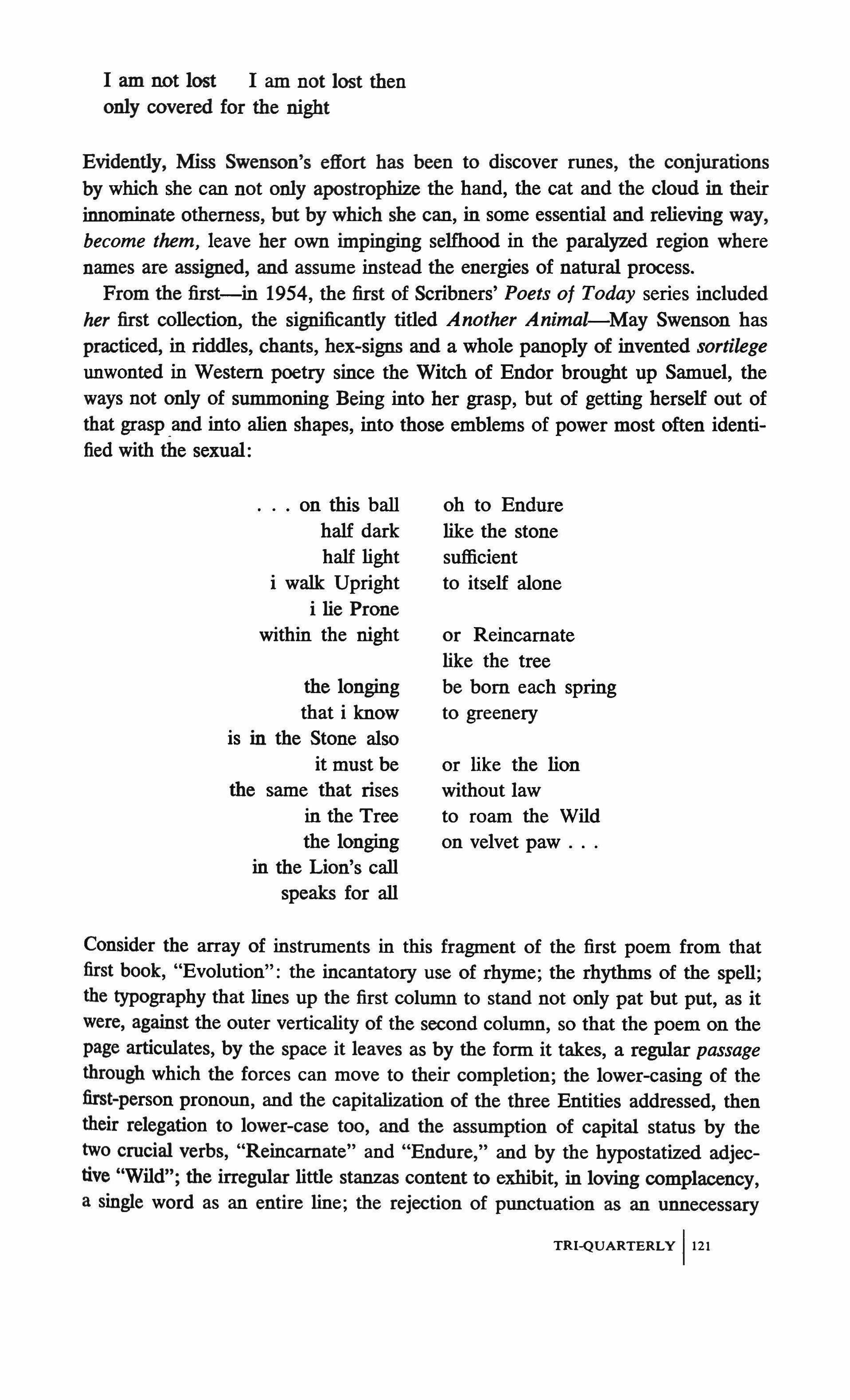
Consider the array of instruments in this fragment of the first poem from that first book, "Evolution": the incantatory use of rhyme; the rhythms of the spell; the typography that lines up the first column to stand not only pat but put, as it were, against the outer verticality of the second column, so that the poem on the page articulates, by the space it leaves as by the form it takes, a regular passage through which the forces can move to their completion; the lower-casing of the first-person pronoun, and the capitalization of the three Entities addressed, then their relegation to lower-case too, and the assumption of capital status by the two crucial verbs, "Reincarnate" and "Endure," and by the hypostatized adjective "Wild"; the irregular little stanzas content to exhibit, in loving complacency, a single word as an entire line; the rejection of punctuation as an unnecessary
TRI-QUARTERLY 1121
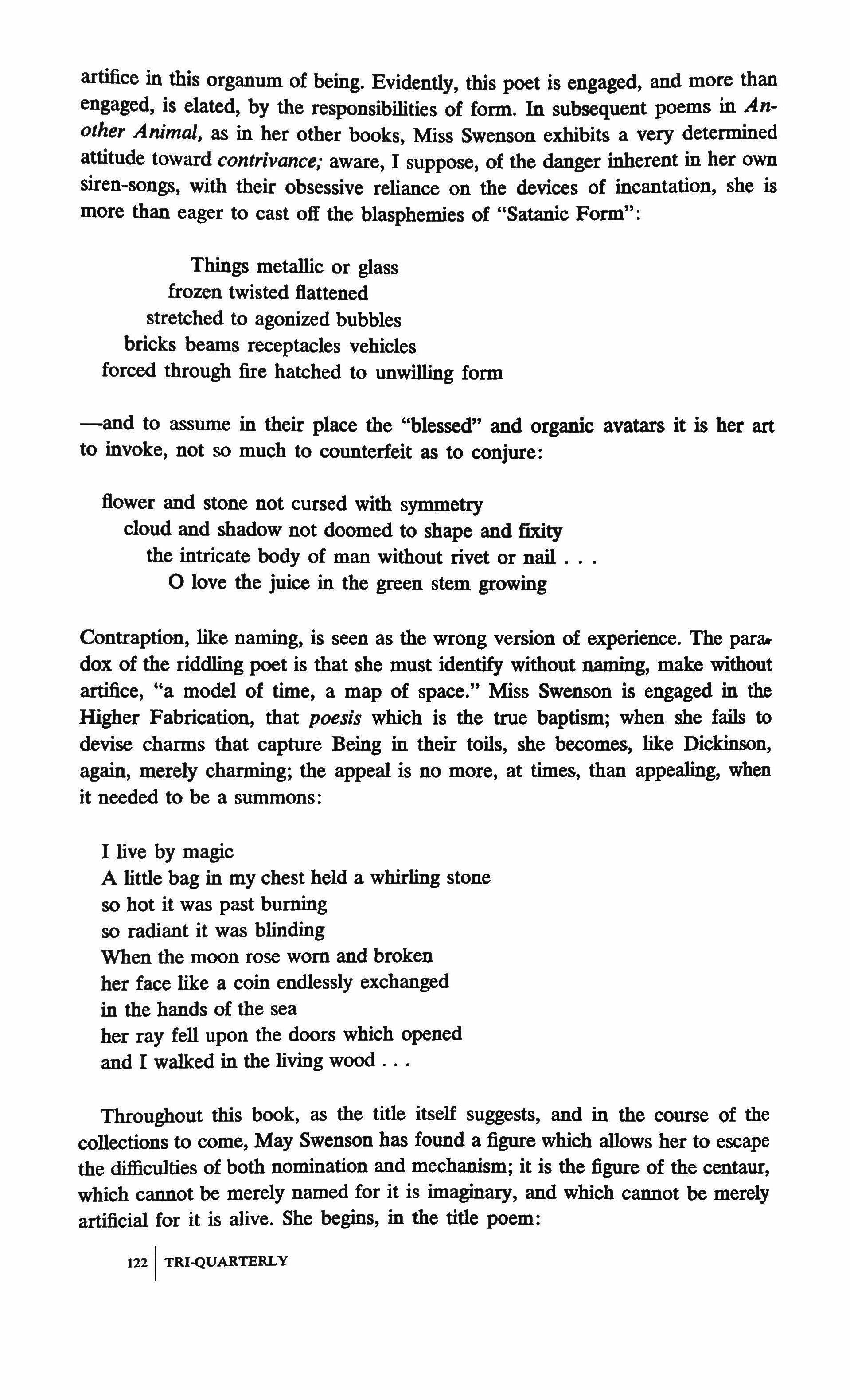
artifice in this organum of being. Evidently, this poet is engaged, and more than engaged, is elated, by the responsibilities of form. In subsequent poems in Another Animal, as in her other books, Miss Swenson exhibits a very determined attitude toward contrivance; aware, I suppose, of the danger inherent in ber own siren-songs, with their obsessive reliance on the devices of incantation, she is more than eager to cast off the blaspbemies of "Satanic Form":
Things metallic or glass
frozen twisted flattened stretched to agonized bubbles bricks beams receptacles vehicles forced through fire hatched to unwilling form
-and to assume in their place the "blessed" and organic avatars it is her art to invoke, not so much to counterfeit as to conjure:
flower and stone not cursed with symmetry cloud and shadow not doomed to shape and fixity the intricate body of man without rivet or nail o love the juice in the green stem growing
Contraption, like naming, is seen as the wrong version of experience. The para. dox of the riddling poet is that she must identify without naming, make without artifice, "a model of time, a map of space." Miss Swenson is engaged in the Higher Fabrication, that poesis which is the true baptism; when she fails to devise charms that capture Being in their toils, she becomes, like Dickinson, again, merely charming; the appeal is no more, at times, than appealing, when it needed to be a summons:
I live by magic
A little bag in my chest held a whirling stone so hot it was past burning so radiant it was blinding When the moon rose worn and broken her face like a coin endlessly exchanged in the hands of the sea her ray fell upon the doors which opened and I walked in the living wood
Throughout this book, as the title itself suggests, and in the course of the collections to come, May Swenson has found a figure which allows her to escape the difficulties of both nomination and mechanism; it is the figure of the centaur, which cannot be merely named for it is imaginary, and which cannot be merely artificial for it is alive. She begins, in the title poem:
TRI-QUARTERLY
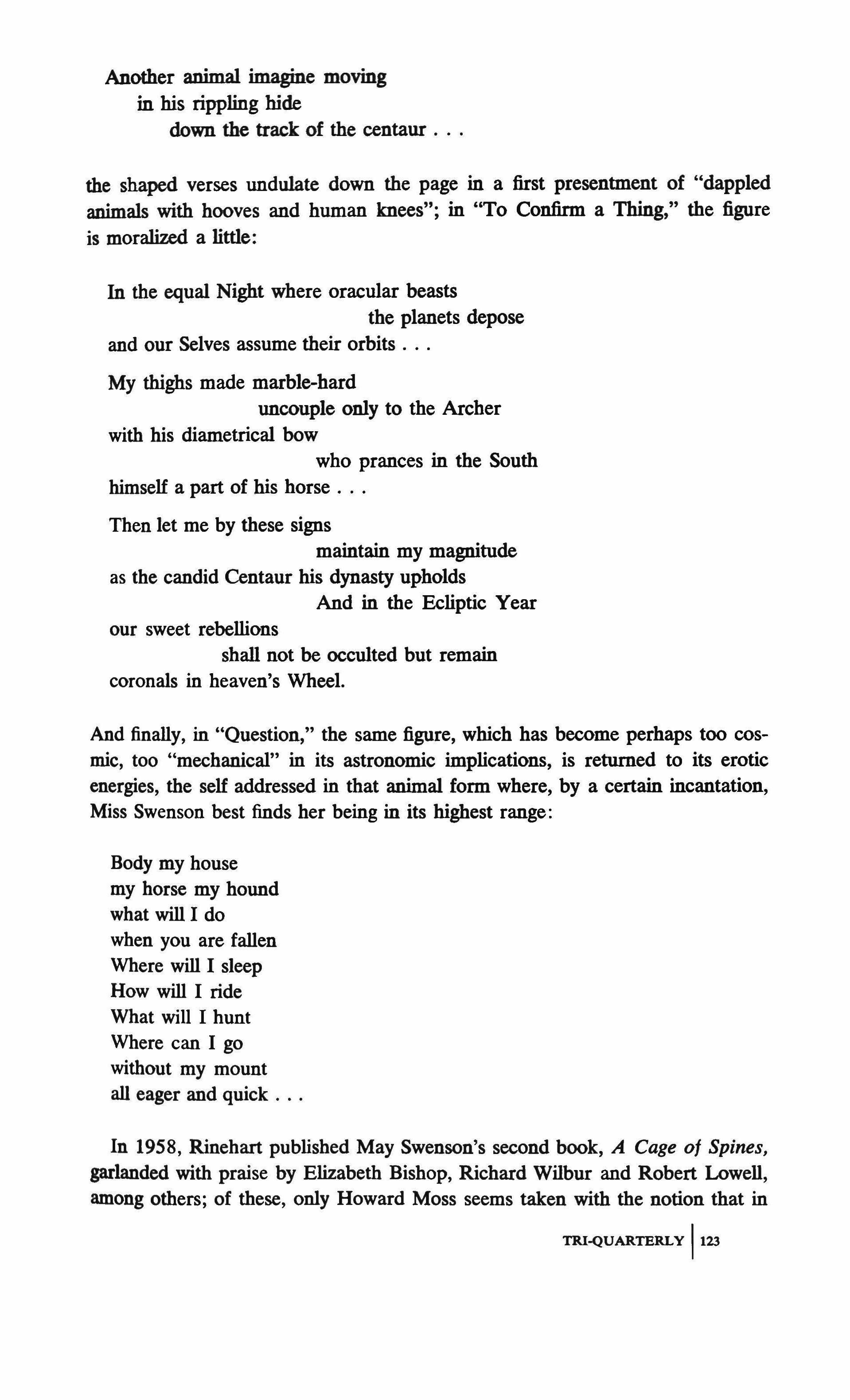
Another animal imagine moving in his rippling hide down the track of the centaur
the shaped verses undulate down the page in a first presentment of "dappled animals with hooves and human knees"; in "To Confirm a Thing," the figure is moralized a little:
In the equal Night where oracular beasts the planets depose and our Selves assume their orbits
My thighs made marble-hard uncouple only to the Archer with his diametrical bow who prances in the South himself a part of his horse
Then let me by these signs maintain my magnitude as the candid Centaur his dynasty upholds And in the Ecliptic Year our sweet rebellions shall not be occulted but remain coronals in heaven's Wheel.
And finally, in "Question," the same figure, which has become perhaps too cosmic, too "mechanical" in its astronomic implications, is returned to its erotic energies, the self addressed in that animal form where, by a certain incantation, Miss Swenson best finds her being in its highest range:
Body my house
my horse my hound what will I do when you are fallen
Where will I sleep
How will I ride
What will I hunt
Where can I go without my mount all eager and quick
In 1958, Rinehart published May Swenson's second book, A Cage of Spines, garlanded with praise by Elizabeth Bishop, Richard Wilbur and Robert Lowell, among others; of these, only Howard Moss seems taken with the notion that in TRI-QUARTERLY 1123
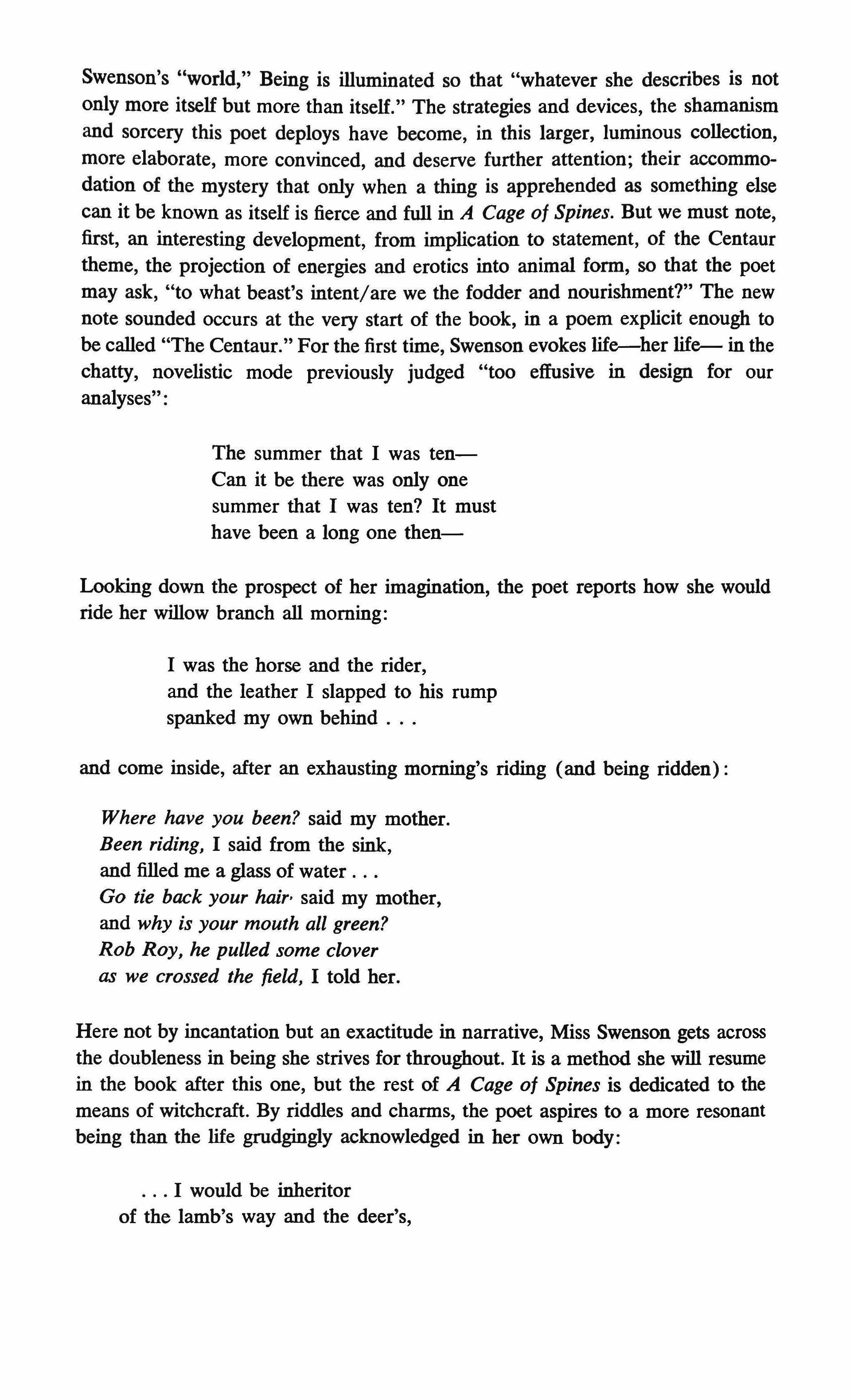
Swenson's "world," Being is illuminated so that "whatever she describes is not only more itself but more than itself." The strategies and devices, the shamanism and sorcery this poet deploys have become, in this larger, luminous collection, more elaborate, more convinced, and deserve further attention; their accommodation of the mystery that only when a thing is apprehended as something else can it be known as itself is fierce and full in A Cage of Spines. But we must note, first, an interesting development, from implication to statement, of the Centaur theme, the projection of energies and erotics into animal form, so that the poet may ask, "to what beast's intent/are we the fodder and nourishment?" The new note sounded occurs at the very start of the book, in a poem explicit enough to be called "The Centaur." For the first time, Swenson evokes life-her life- in the chatty, novelistic mode previously judged "too effusive in design for our analyses" :
The summer that I was tenCan it be there was only one summer that I was ten? It must have been a long one then-
Looking down the prospect of her imagination, the poet reports how she would ride her willow branch all morning:
I was the horse and the rider, and the leather I slapped to his rump spanked my own behind
and come inside, after an exhausting morning's riding (and being ridden):
Where have you been? said my mother. Been riding, I said from the sink, and filled me a glass of water Go tie back your hair- said my mother, and why is your mouth all green? Rob Roy, he pulled some clover as we crossed the field, I told her.
Here not by incantation but an exactitude in narrative, Miss Swenson gets across the doubleness in being she strives for throughout. It is a method she will resume in the book after this one, but the rest of A Cage of Spines is dedicated to the means of witchcraft. By riddles and charms, the poet aspires to a more resonant being than the life grudgingly acknowledged in her own body:
I would be inheritor of the lamb's way and the deer's,
my thrust take from the ground I tread or lie on. In thighs of trees, in recumbent stones, in the loins of beasts is found that line my own nakedness carried. Here, in an Eden of the mind, I would remain among my kind, to lake and hill, to tree and beast married.
Not only the shaped poems, the compulsive rhymes and puns ("what seams is only art"), the riddles and agnominations ("the shape of this box keels me oval/ Heels feel its bottom/Nape knocks its top"- from the conundrum about eggs), but the discovery of secret messages hidden within ordinary speech, as Being is concealed by Labels, excite Miss Swenson to poems of an almost frantic hermeticism: in two homages to writers, she extends her method to a kind of esoteric dalliance. First in "Frontisipiece," which appears to describe a picture of Virginia Woolf in terms of the circumstances that led her to suicide, we realize from an odd, ominous resonance the lines have, that not only the names of the writer herself ("your chaste-fierce name") but the titles of her books have been braided into their verse; thus the "frontispiece" is a compendium of names indeed, only disguised, worked back into the texture of Being and used not as nominations but proof:
The waves carve your hearse and tomb and toll your voyage out again again.
The second poem of dedication is even more curious, for in it not merely names, but all words are susceptible of disintegration into their secret content; what we are offered is ostensibly a description of Frost ("R. F., His Hand against a Tree") but the account is continually breaking down as Miss Swenson discovers, like Nabokov (whose English is so often a matter of perpetual inside jokes), that she can say more about her subject by letting the language speak for itself, merely doing a little pruning and spacing to let the sense in:
Lots of trees in the fo rest but this one's an 0 a K that's plan ted hims elf and nob oddy has knots of that hand some polish or the knarl edge of ear th or the obs tiny ate servation his blueyes make or the tr easures his sent ient t hurnb les find.
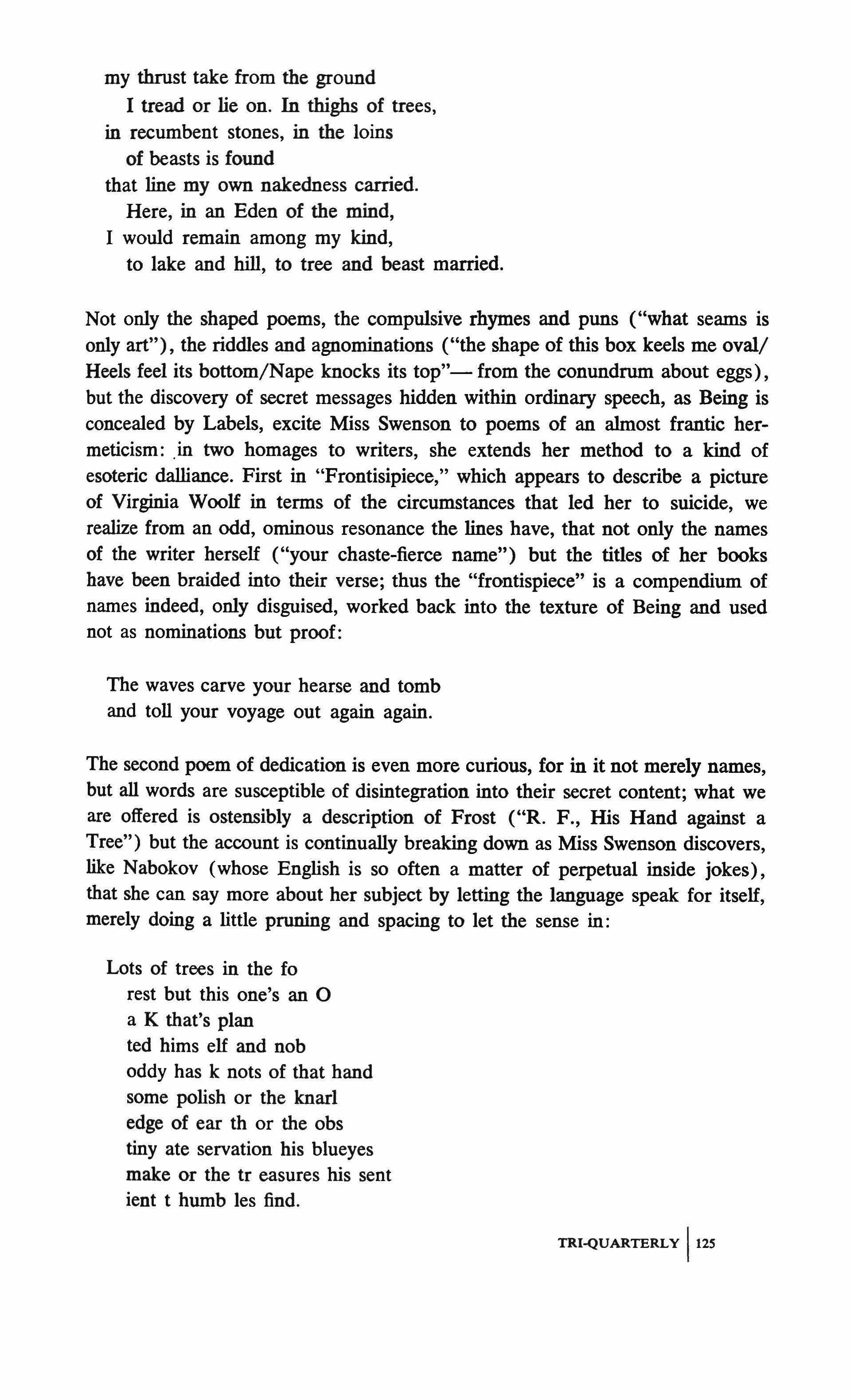
TRI-QUARTERLy 1125

These arc, as she calls them, "glyphs of a daring alphabet" indeed, and "hide what they depend on." There are other diableries in this book likely to exasper ate as well as to exalt; chiefly a poem called "Parade of Painters" in which 36 painters are "assigned" first a characteristic color, then a texture ("Manet porcelain, Matisse thistles," etc.), then a shape. Then the whole thing is assembled in a litany of 36 lines which reads something like a dada catalogue, save that Swenson has shown us her method and its underlying logic: we cannot fault it, but we may fail to be charmed by the procession, as it passes, of painter, shape, texture and color:
Delacroix mouth viscera iris
Degas witchmoth birch clay
Pissaro dhow privet marble
Suerat hourglass linen poplar
Dufy glove pearl azure
Rouault mummy serge blood
Much more characteristic of Swenson's excellence, I think, is "News from the Cabin", in which all her impulses congregate joyously around a less arbitrary theme: visits from four creatures, none named but all identified by the characteristic textures, rhythms, and vocabulary we should associate with a woodpecker, a squirrel, a jay and a snake, if we were to become them by the power of our recital (rather like the interludes young Arthur experiences, in T. H. White's books, as he serves his apprenticeship to fish, hawks, even hedgehogs in order to learn how to be a man). Consider the sound of this from "Hairy":
Cried peek! Beaked it-chiselled the drupe.
His nostril I saw, slit in a slate whistle, White-black dominoes clicked in his wings.
Bunched beneath the dangle he heckled with holes, bellysack soft, eye a brad, a red-flecked mallet his ball-peen head, his neck its haft.
and the movement of the end of "Scurry":
Sat put, pert, neat, in his suit and his seat, for a minute, a frown between snub ears, bulb-eyed head toward me sideways, chewed.
Rocked, squeaked. Stored the stone in his cheek. Finished, fell to all fours, a little roan couch; flurried paws loped him off, prone-bodied, tail turned torch, sail, scad.
In these extraordinary poems, animal life is invoked, is actually acquired for the

conjurer's purposes (extended energy, a generalized erotic awareness) by the haptic qualities of language itself, even more than by the riddling process so programmatically set up in the other pieces. The generosity, the abundance of Swenson's means may allow her, on the one hand, to speak somewhat sentimentally in "East River" of Brooklyn seen across the water as "a shelf of old shoes, needing repair, but clean knots of smoke are being tied and untied", and thereby we see, though both are patronized, Brooklyn and the shoes; but in ''News from the Cabin", on the other, she also commands, as in the last section, "Supple", an utterance whose imagery is assimilated without condescension to its very movement, a diction so wedded to appearances that the speaker "leaves the spot" enriched with an access of being, an increment which comes only when life has been enchanted to its own understanding:
I followed that elastic: loose unicolored knot, a noose he made as if unconscious. Until my shadow touched him; half his curd shuddered, the rest lay chill.
I stirred: the ribbon raised a loop; its end stretched, then cringed like an udder; a bifid tongue, his only rapid, whirred in the vent; vertical pupils lit his hood. That part, a groping finger, hinged, stayed upright. Indicated what? That I stood in his light? I left the spot.
In 1963, Scribner's selected a large group of poems from Miss Swenson's first two volumes and to them added some fifty new poems, under the general title To Mix With Time, a phrase which in its own context reiterates her project: "One must work a magic to mix with time/in order to become old." Here the very compression, the proliferation inward of the new abacadabras seem to have enabled to poet to be elsewhere quite explicit about her undertaking:
There unraveled from a file in my mind a magic notion I, too, used to play with: from chosen words a potion could be wrung; pickings of them, eaten, could make you fly, walk on water, be somebody else, do or undo anything, go back or forward on belts of time
It is good to have it spelled out, for there are here many poems of a specifically esoteric quality, whose organization on the page, as in the ear, suggests the location of a mystery in Being which the poet would attain to only by a ritual, a litany of participles and lattices of space:
TRI-QUARTERLY 1127
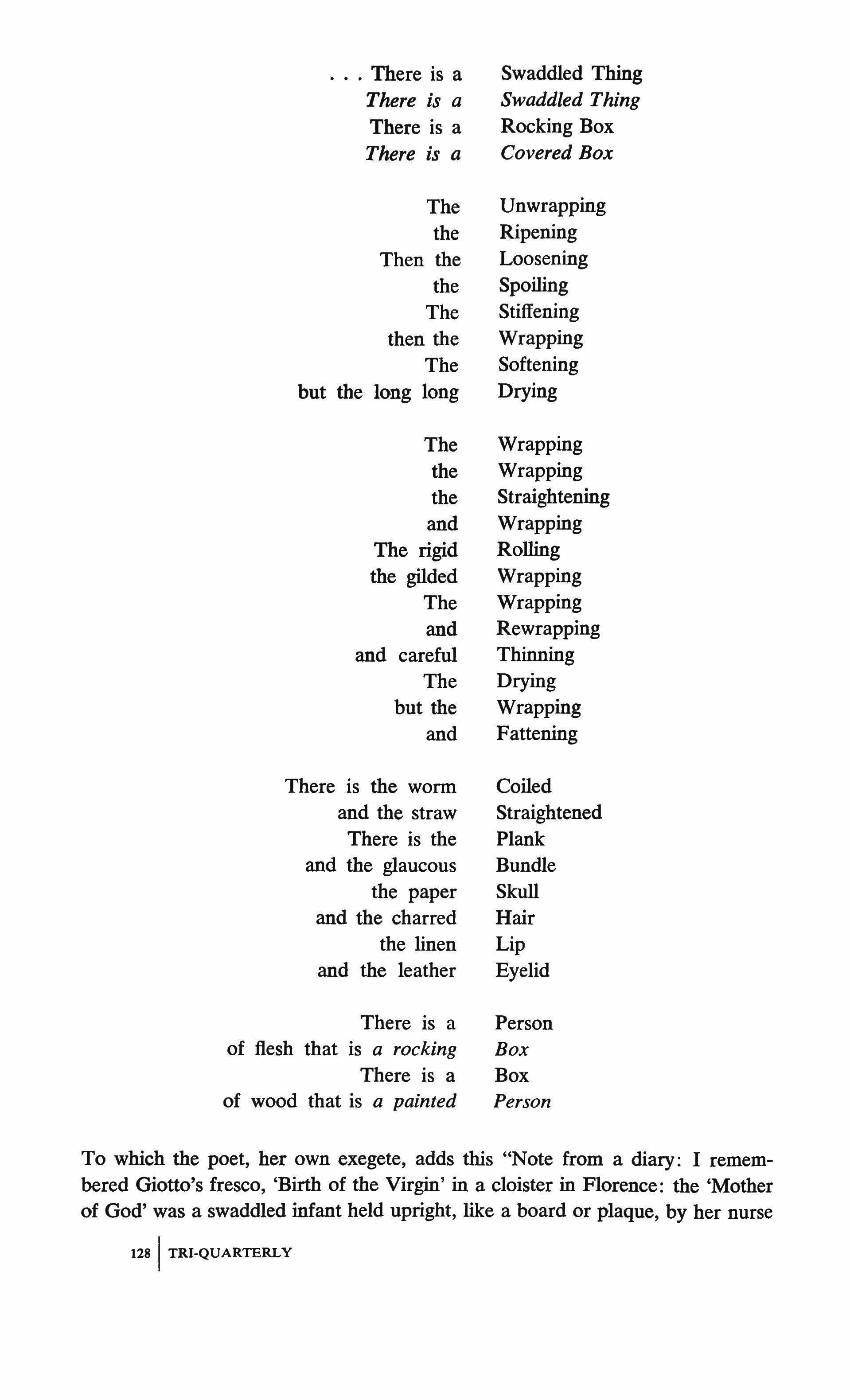
There is a Swaddled Thing
There is a Swaddled Thing
There is a Rocking Box
There is a Covered Box
The Unwrapping the Ripening
Then the Loosening the Spoiling
The Stiffening then the Wrapping
The Softening but the long long Drying
The Wrapping the Wrapping the Straightening and Wrapping
The rigid Rolling the gilded Wrapping
The Wrapping and Rewrapping and careful Thinning
The Drying but the Wrapping and Fattening
There is the worm Coiled and the straw Straightened There is the Plank and the glaucous Bundle the paper Skull and the charred Hair the linen Lip and the leather Eyelid
There is a Person of flesh that is a rocking Box There is a Box of wood that is a painted Person
To which the poet, her own exegete, adds this "Note from a diary: I remembered Giotto's fresco, 'Birth of the Virgin' in a cloister in Florence: the 'Mother of God' was a swaddled infant held upright, like a board or plaque, by her nurse
TRI-QUARTERLY

and I remembered a mummy in the Vatican Museum in Rome: in her sarcophagus shaped and painted like herself, an Egyptian girl 20,000 years old lay unwrapped to the waist." The notation, in the poem, of identities between the infant and the mummy, and the enactment of vital, or mortal differences that reaches the climax of the last four lines with their paradoxical reversals, dramatizes the kind of formal extremes May Swenson is ready to risk. "The idea," she says in "Out of my Head," one of the first poems in this book, "is to make a vehicle out of it." To employ, that is, the spell in order to be taken somewhere; or as she says in another place, and in her most orphic cadences:
we weave asleep a body and awake unravel the same veins we travel
The unravelling of those travelled veins is undertaken, of course, in other ways besides such necromantic ones. There is a group of poems, in To Mix with Time, written in France, Italy and Spain and concerned with the reporting of surfaces, not the casting of spells. As in the earlier "Centaur," the poet appears sufficiently possessed of her identity to feel no need of commanding her surround by voodoo. She can trust her sensibility, in these new old places, to do its work, and oblige the genius loci to give up its own ghost:
Gondola-slim
above the bridge, a new moon held a dim circle of charcoal between its points. Bats played in the greenish air, their wing-joints soft as moths against the bone-gray palazzi where not a window was alight
These are secular poems, then, rarely moralized or magicked, but left to speak for themselves, in the descriptive mode of Elizabeth Bishop, though there are exceptions, occurring (as we might expect) in the case of the "Fountains of Aix," where the word "water" is disjoined fifteen times from the lines and made to slide down the side of a stanza:
A goddess is driving a chariot through water. her reins and whips are tight white water. Bronze hooves of horses wrangle with water Faces with mossy lips unlocked always uttering water. Water

wearing their features blank, their ears deaf, their eyes mad or patient or blind or astonished at water always uttered out of their mouths
and again in a poem about death, "The Alyscamps at Aries," in which the words "bodies," "bones," "died," "stones" and "flesh" are isolated in a central column, set off like tombs in each line, and recurring some two dozen times. Europe, we take it, is sacred ground, and the mere fact of treading it is enough, almost, for Miss Swenson's genius to speak low to her. The conjugation, in this book, of a temporal response to earth and a runic riddling of it· is indeed "to mix with time"; there is a relaxation of need, somehow, as if the poet had come to find things enthralling enough in themselves:
in any random, sprawling, decomposing thing is the charming string of its history-and what it will be next
Like "Evolution," her first poem in her first book, her last one here, "The Exchange," recapitulates her enterprise-s-to get out of herself and into those larger, warmer energies of earth, and to do so by liturgical means ("Words? Let their /mutations work/toward the escape/ of object into the nearest next/ shape, motion, assembly, temporal context"):
Populous and mixed is mind. Earth take thought, my mouth be moss
Wind be motion, birds be passion, water invite me to your bed
"Things Taking Place" was the working title Swenson had originally used for "To Mix With Time," and its suggestion of a larger interest in a secular world where events occur, where life "happens," and a lessening concern with the cosmic energies of "mere" Being is even more applicable to the poet's latest work, to be published as a book called "Half Sun Half Sleep." Here as the title suggests, once again, the balance between sacred and profane, ritual and report, is carefully tended:
The tug of the void the will of the world together
Miss Swenson has recently brought out a selection for children of her kennings, called Poems to Solve.
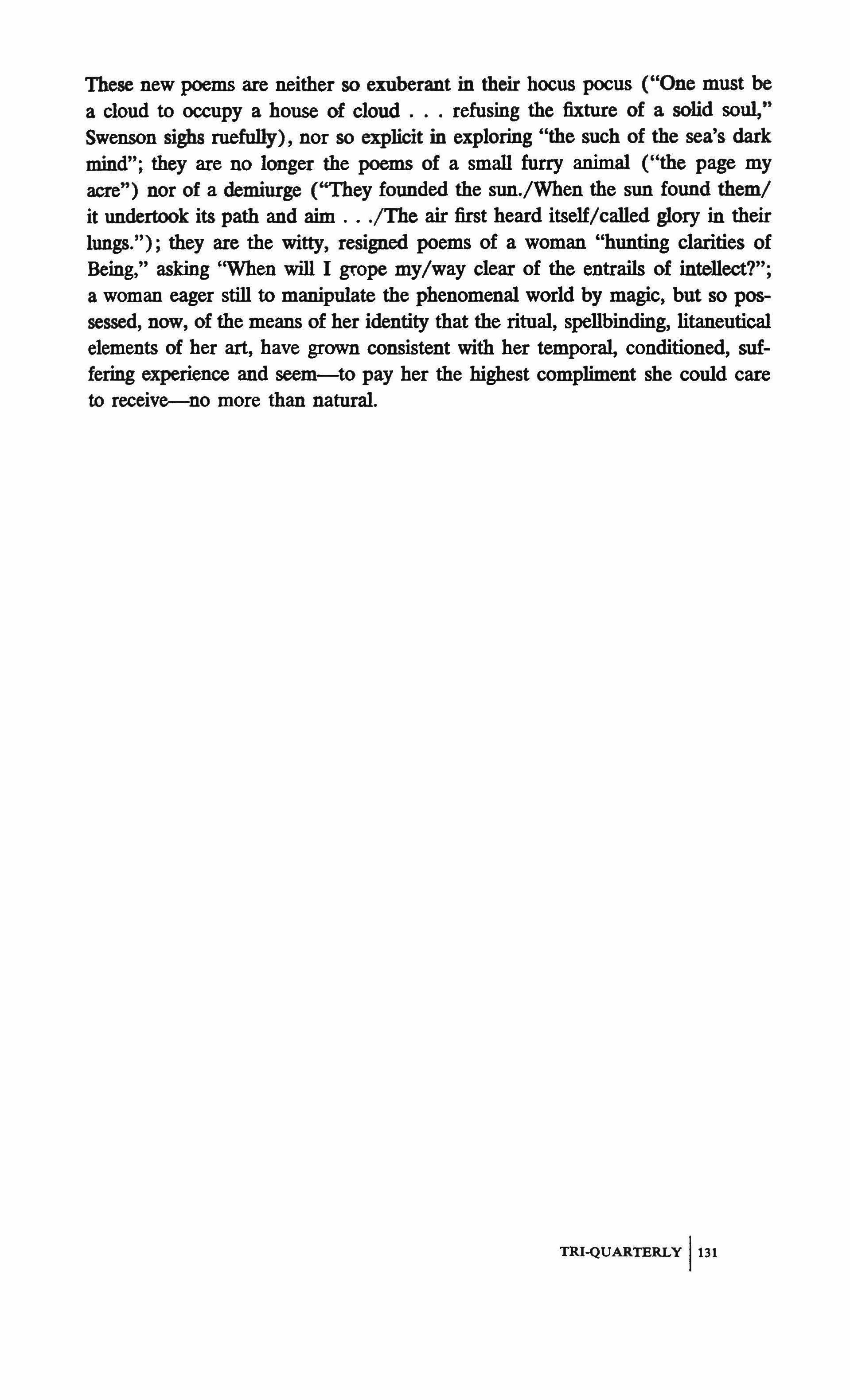
These new poems are neither so exuberant in their hocus pocus ("One must be a cloud to occupy a house of cloud refusing the fixture of a solid soul," Swenson sighs ruefully), nor so explicit in exploring "the such of the sea's dark mind"; they are no longer the poems of a small furry animal ("the page my acre") nor of a demiurge ("They founded the sun./When the sun found them/ it undertook its path and aim /The air first heard itself/called glory in their lungs."); they are the witty, resigned poems of a woman "hunting clarities of Being," asking ''When will I grope my/way clear of the entrails of intellect?"; a woman eager still to manipulate the phenomenal world by magic, but so p0ssessed, now, of the means of her identity that the ritual, spellbinding, litaneutical elements of her art, have grown consistent with her temporal, conditioned, suffering experience and seem-to pay her the highest compliment she could care to receive--no more than natural.
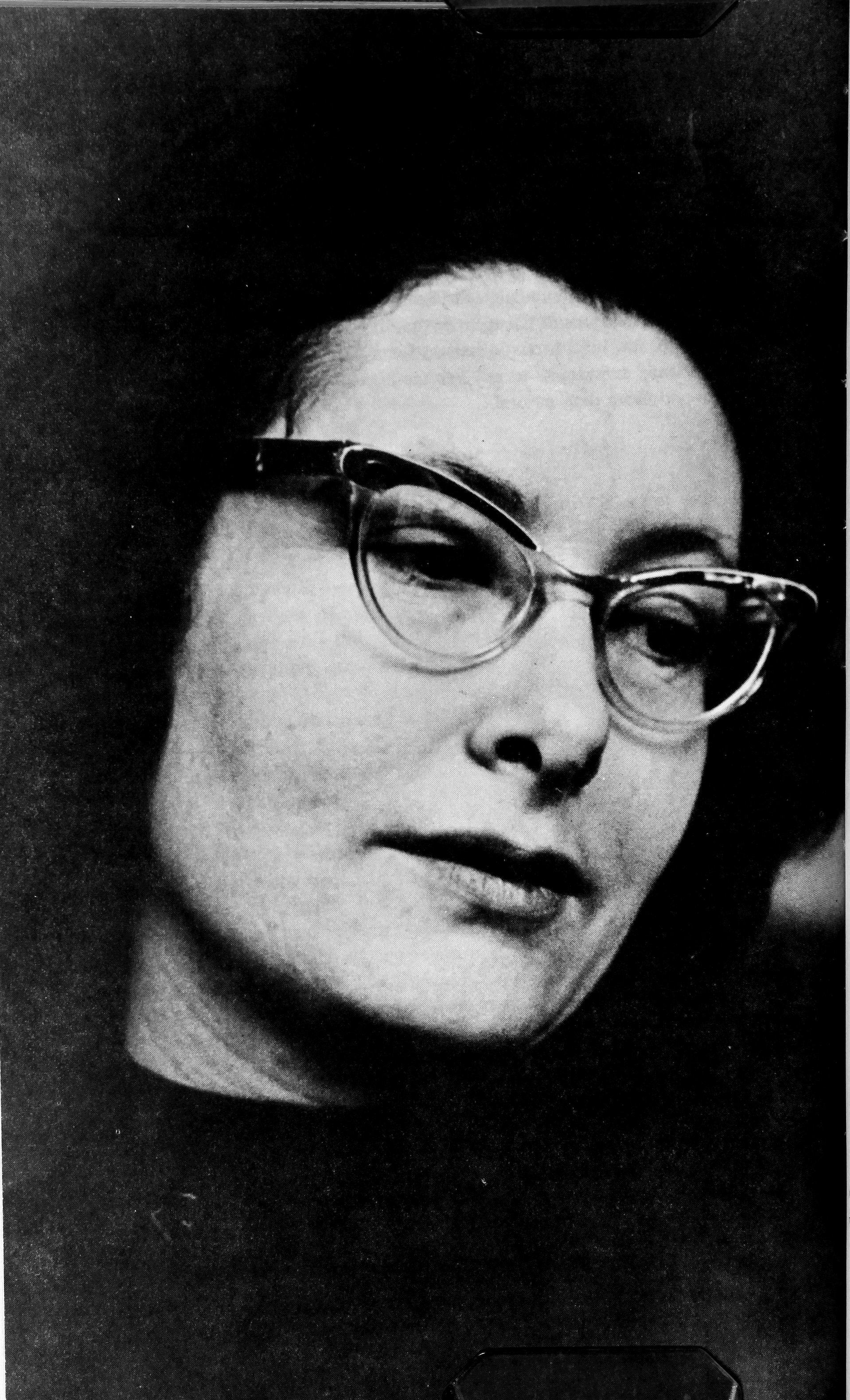
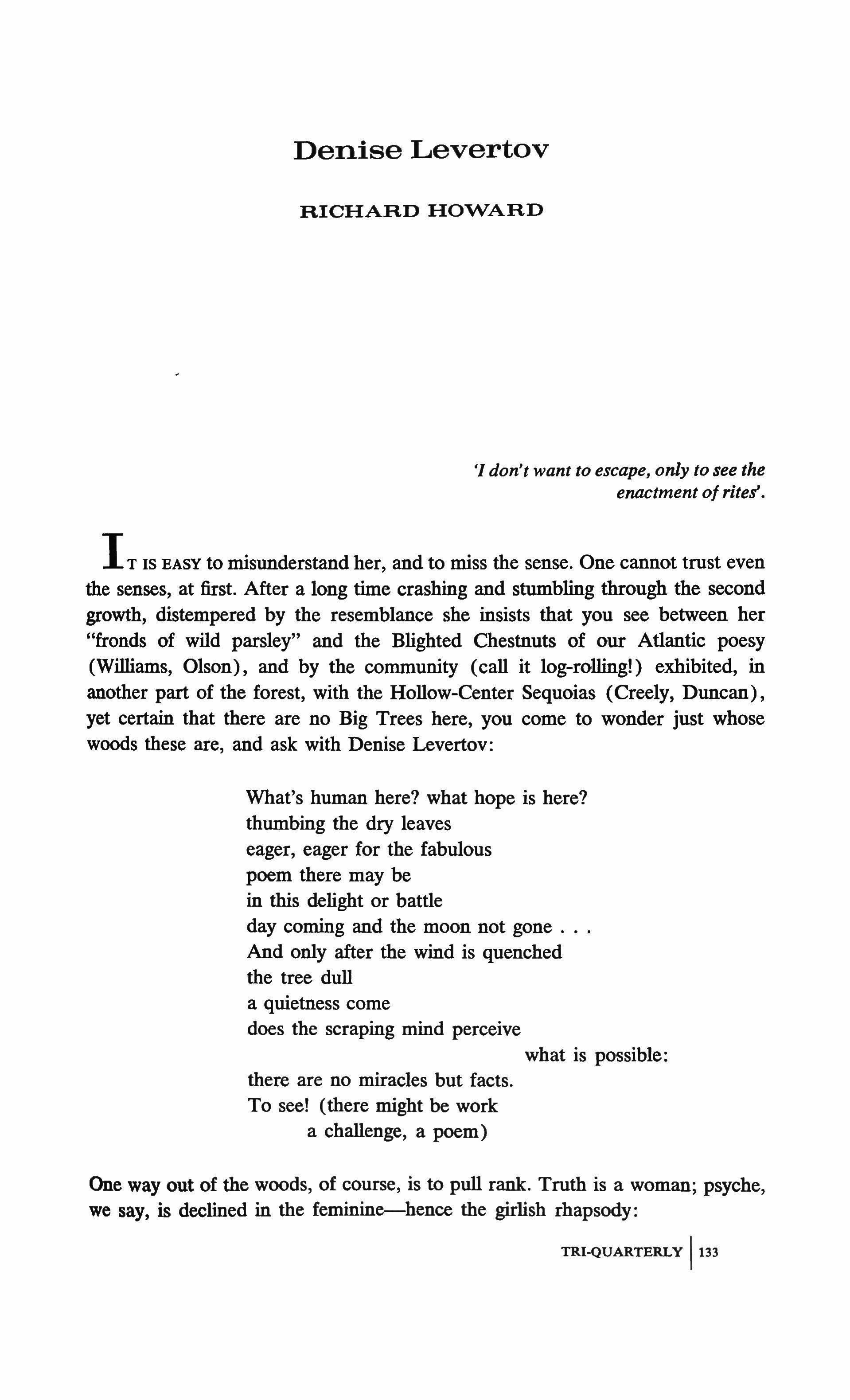
'I don't want to escape, only to see the enactment of rites'.
IT IS EASY to misunderstand her, and to miss the sense. One cannot trust even the senses, at first. After a long time crashing and stumbling through the second growth, distempered by the resemblance she insists that you see between her "fronds of wild parsley" and the Blighted Chestnuts of our Atlantic poesy (Williams, Olson), and by the community (call it log-rolling!) exhibited, in another part of the forest, with the Hollow-Center Sequoias (Creely, Duncan), yet certain that there are no Big Trees here, you come to wonder just whose woods these are, and ask with Denise Levertov:
What's human here? what hope is here? thumbing the dry leaves eager, eager for the fabulous poem there may be in this delight or battle day coming and the moon not gone And only after the wind is quenched the tree dull a quietness come does the scraping mind perceive what is possible: there are no miracles but facts. To see! (there might be work a challenge, a poem)
One way out of the woods, of course, is to pull rank. Truth is a woman; psyche, we say, is declined in the feminine-hence the girlish rhapsody:
TRI-QUARTERLY 1133
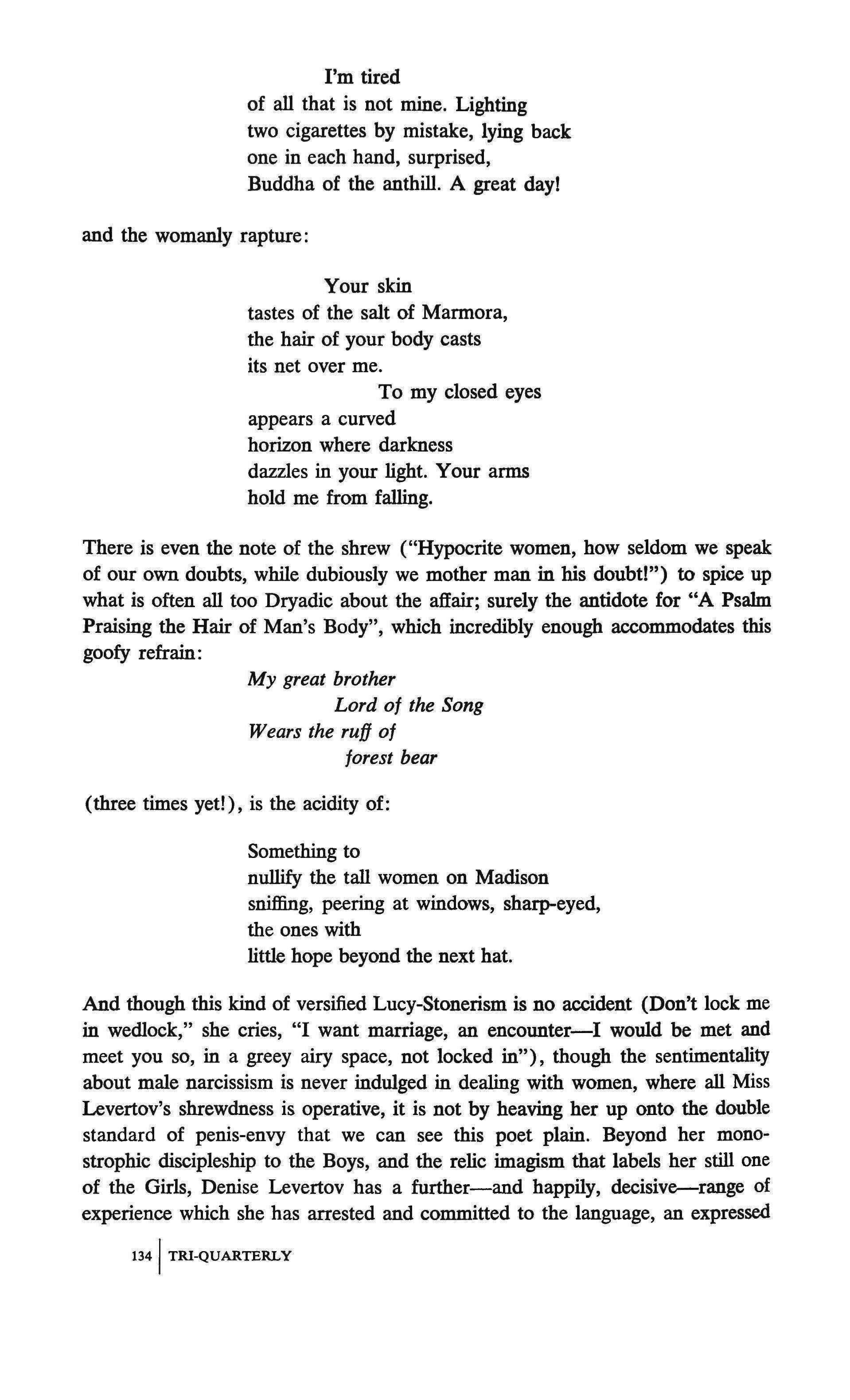
I'm tired of all that is not mine. Lighting two cigarettes by mistake, lying back one in each hand, surprised, Buddha of the anthill. A great dayl
and the womanly rapture:
Your skin tastes of the salt of Marmora, the hair of your body casts its net over me.
To my closed eyes appears a curved horizon where darkness dazzles in your light. Your arms hold me from falling.
There is even the note of the shrew ("Hypocrite women, how seldom we speak of our own doubts, while dubiously we mother man in his doubt!") to spice up what is often all too Dryadic about the affair; surely the antidote for "A Psalm Praising the Hair of Man's Body", which incredibly enough accommodates this goofy refrain:
My great brother Lord of the Song Wears the ruff of forest bear
(three times yet!), is the acidity of:
Something to nullify the tall women on Madison sniffing, peering at windows, sharp-eyed, the ones with little hope beyond the next hat.
And though this kind of versified Lucy-Stonerism is no accident (Don't lock me in wedlock," she cries, "I want marriage, an encounter-I would be met and meet you so, in a greey airy space, not locked in"), though the sentimentality about male narcissism is never indulged in dealing with women, where all Miss Levertov's shrewdness is operative, it is not by heaving her up onto the double standard of penis-envy that we can see this poet plain. Beyond her monostrophic discipleship to the Boys, and the relic imagism that labels her still one of the Girls, Denise Levertov has a further-and happily, decisive-range of experience which she has arrested and committed to the language, an expressed 1341 TRI-QUARTERLY

value of a life otherwise merely lived or eluded that makes her poetry important and makes it in fact her poetry: for her, the poem is a sacramental transaction, permitting, even enforcing access to a released state of being, an ecstatic awareness that is not so much concomitant to a religion, with its stem implications of community and service, as to a gnosis. The contradictions of her mode and her mood, the pressure of events and the price of evangelism have all worked to her harm, somewhat, upon what 1 take to be her authentic and native impulse, and if 1 am often confused by her poems--as 1 was in writing about her work several years ago, when 1 had reported her "a moralist whose manner forbids her to develop what she knows; yet whenever she manages to defeat the assumptions of her mindless mode, her authority convinces me utterly"-I am also convinced by them and prompted, in the course of six books, to an admiration whose nosography 1 shall attempt to trace here.
The gnostic impulse in Miss Levertov, if that is what it is, must from the start have been curiously inflected by the spiritual accents of her life at home, of which she gives a characteristically cheerful and illuminating account:
My mother was descended from the Welsh tailor and mystic Angel Jones of Mold, my father from the noted Hasid, Schneour Zalman, 'the Rav of Northern White Russia'. My father had experienced conversion to Christianity as a student at Konigsberg in the 1890s. His lifelong hope was towards the unification of Judaism and Christianity. He was a priest of the Anglican Church (having settled in England not long before 1 was born), author of a Life of Saint Paul in Hebrew, part translator of the Zohar, etc. 1 was born in October, 1923, at Ilford, Essex. 1 did lessons at home, and never attended any school or college, except for some years at a ballet school. However, we had a house full of books, and everyone in the family engaged in some literary activity. Jewish booksellers, German theologians, Russian priests from Paris, and Viennese opera singers visited and perhaps my earliest memory is of being dandled by the ill-fated son of Theodore Herzl, the great Zionist.
Not surprisingly, then, at 23 Miss Levertoff, as she spelled it those days, published her first book, a spineless and rather whining affair with the unexplained but Audenesque title The Double Image (the real or outer aspect of things and the "imagined" or inner vision; in this partition, the experiential surface receives much less than its due, and the emphasis is all on the visionary recital. The language cannot support the strain. )-30 poems divided into two persuasions, 'Fears' and 'Promises'. The fears are mostly for her own possibilities as a poetan untried vocation, challenged by the example of her predecessors, whose influence is mostly nefandous, as this translation from Auden suggests:
Rags of childhood flutter in the woods and each deserted post has sentinels; bright eyes in wells watch for the sun's assassin: the regions bereft of our desires are haunted, rags of childhood flutter in the woods
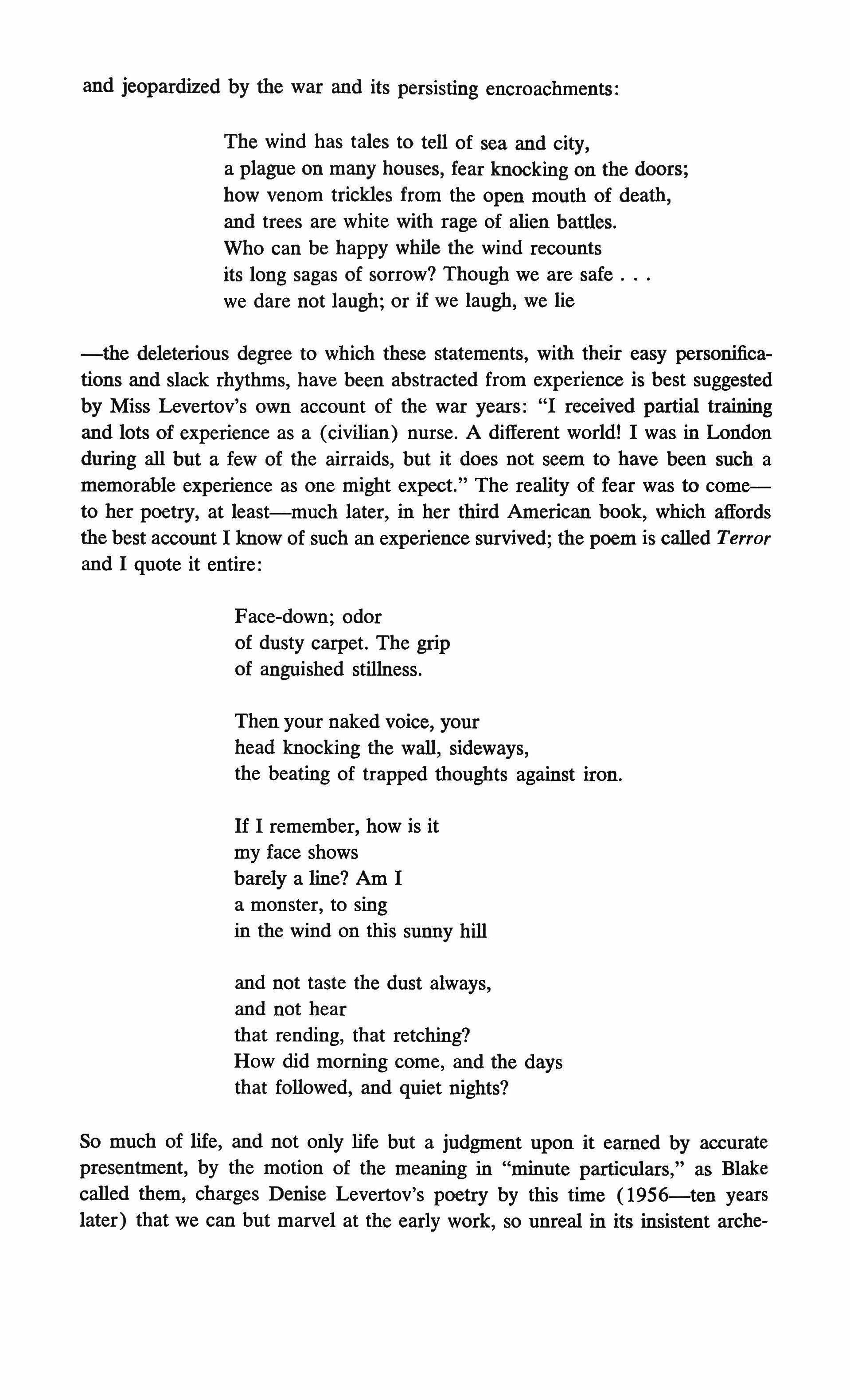
and jeopardized by the war and its persisting encroachments:
The wind has tales to tell of sea and city, a plague on many houses, fear knocking on the doors; how venom trickles from the open mouth of death, and trees are white with rage of alien battles. Who can be happy while the wind recounts its long sagas of sorrow? Though we are safe we dare not laugh; or if we laugh, we lie
-the deleterious degree to which these statements, with their easy personifications and slack rhythms, have been abstracted from experience is best suggested by Miss Levertov's own account of the war years: "I received partial training and lots of experience as a (civilian) nurse. A different world! I was in London during all but a few of the airraids, but it does not seem to have been such a memorable experience as one might expect." The reality of fear was to come-to her poetry, at least-much later, in her third American book, which affords the best account I know of such an experience survived; the poem is called Terror and I quote it entire:
Face-down; odor of dusty carpet. The grip of anguished stillness.
Then your naked voice, your head knocking the wall, sideways, the beating of trapped thoughts against iron.
If I remember, how is it my face shows barely a line? Am I a monster, to sing in the wind on this sunny hill and not taste the dust always, and not hear that rending, that retching? How did morning come, and the days that followed, and quiet nights?
So much of life, and not only life but a judgment upon it earned by accurate presentment, by the motion of the meaning in "minute particulars," as Blake called them, charges Denise Levertov's poetry by this time (1956-ten years later) that we can but marvel at the early work, so unreal in its insistent arche-

types, its loricated surface of poetical tropes. The persistent figure in both the 'Fears' and the 'Promises' sections (the watershed is not marked, by the way, in the body of the book, but is suggested, perhaps, by a tone of shrill resolve:
Beyond the forest black and still I shall find you, where the fire bums the wing of my desire.)
is that of the ascensus, the journey or ordeal upward through experience to knowledge: "they rise and go/up the inevitable stony slope to search untravelled valleys for the land of wonder"; "I travel on another road/climbing the long hill to a weary town"-here the resolve falters, and we glimpse "the brown hill arid in its pride"; the hill becomes "the hill of lies, high and frozen" until love thaws it, offering "promises of treasure/over the hill, among the burning worlds." The moralized landscapes, the personifications of time and terror, the archetypes of rock and water, hill and hollow, all yoke together in a proper poetic conspiracy, but seem to leave the experience of the poet altogether out of account. Not quite altogether-there is a single poem, "Christmas 1944," in which we hear Denise Levertov's idiosyncratic voice as we shall come to recognize it-fresh, hortatory, resolved to cut losses and keep on living:
Come in, then, poverty, and come in, death: this year too many lie cold, or die in cold for any small room's warmth to keep you out. You sit in empty chairs, gleam in unseeing eyes; having no home now, you cast your shadow over the atlas, and rest in the restlessness of our long nights as we lie, dreaming of Europe.
Here too, of course, the mysteries are rhetorical, found outside the poet. As she says, with that saving insight so reflexively her own: "These are my valid symbols, but to you/I know they are the distant and a veil / I need," she continues in another poem, "I need a green and undulating line,/the hill's long contours in my words." How to get the effort of the ascent inside herself and enacted by her language rather than by a heap of found symbols to which her language could only be applied-that was to be Denise Levertov's discovery, and one that she made coterminously with her discovery of America. The poet who had been encouraged by Herbert Read and Wrey Gardiner, who had read her "nec-romantic" eflusions-
The air of life is music; oh, be still one moment while I listen! But the dark consumes the sounding minutes constantlyon the B.B.C. and celebrated Regent Street, W. 1:
TRI-QUARTERLy 1137

The long street is silent under stars; red, gold, green, the formal fugue of light continues northward.
was to become a different kind of poet, encouraged by different masters to a different metric, fable and quest.
Had there ever been any doubt about the identity and the autonomy of the language of American poetry after the Second World War, the work in Here and Now, published a decade after The Double Image by the City Lights Bookshop in San Francisco, would resolve it, and would prove, further, that Denise Levertov had learned, had mastered that language with all the authority of a Conrad or a Nabokov; she made herself, that is to say, not merely an agent but an origin of that language, a means by which poetry obtains access to reality.
Miss Levertov accounts for the change in her verse within the verse itself, of course-that is why so many of her poems are concerned with the way to find, to come upon, to invent in the true sense of the word the poetry of her life: "the courage of natural rhetoric, a chance poetry that gives passion to the roses" "poems leaping from shattered windows." In her first of many versions of an ars poetica, she says:
I want to give you something I've made
some words on a page--as if to say 'Here are some blue beads' or, 'Here's a bright red leaf I found on the sidewalk' (because to find is to choose, and choice is made). But it's difficult: so far I've found nothing but the wish to give. Or
copies of old words? Cheap and cruel; also senseless.
Take this instead, perhaps-a halfpromise: If
I ever write a poem of a certain temper

(wilful, tender, evasive, sad & rakish)
I'll give it to you.
Here and Now, a very little book which is kind of a progress report on her affair with the American language, records the strategies by which she sought to achieve that poem "of a certain temper." The landscapes of Mexico and New York which alternate in all her subsequent books are introduced here, and the imagist notation of experience by an elegance of phrasing so compressed that we are obliged to "see" life as an imaginative meld of disproportions:
What a sweet smell rises when you lay the dustbucket after bucket of water thrown on the yellow grass.
The water flashes each time you make it leaparching its glittering back. The sound of more water pouring into the pail almost quenches my thirst. Surely when flowers grow here, they'll not smell sweeter than this wet ground, suddenly black.
It is in such household bonds of life, henceforth, that Denise Levertov will choose to hang, as it from them that she will seek release. These poems of epiphany grow together into a union of moments, a rhythm of exchanges which become, ultimately, such a ritual as the sea's is, when one sits in sunlight near the bright sea, listening to the crash and sighing, crash and sighing dance of the words.
The following year, Miss Levertov published (with Jonathan Williams, illustrating her connection to the Black Mountain group) another short book, Overland to the Islands, which affords a further glimpse of her hopes for a possible poetry:
TRI-QUARTERLY 1139
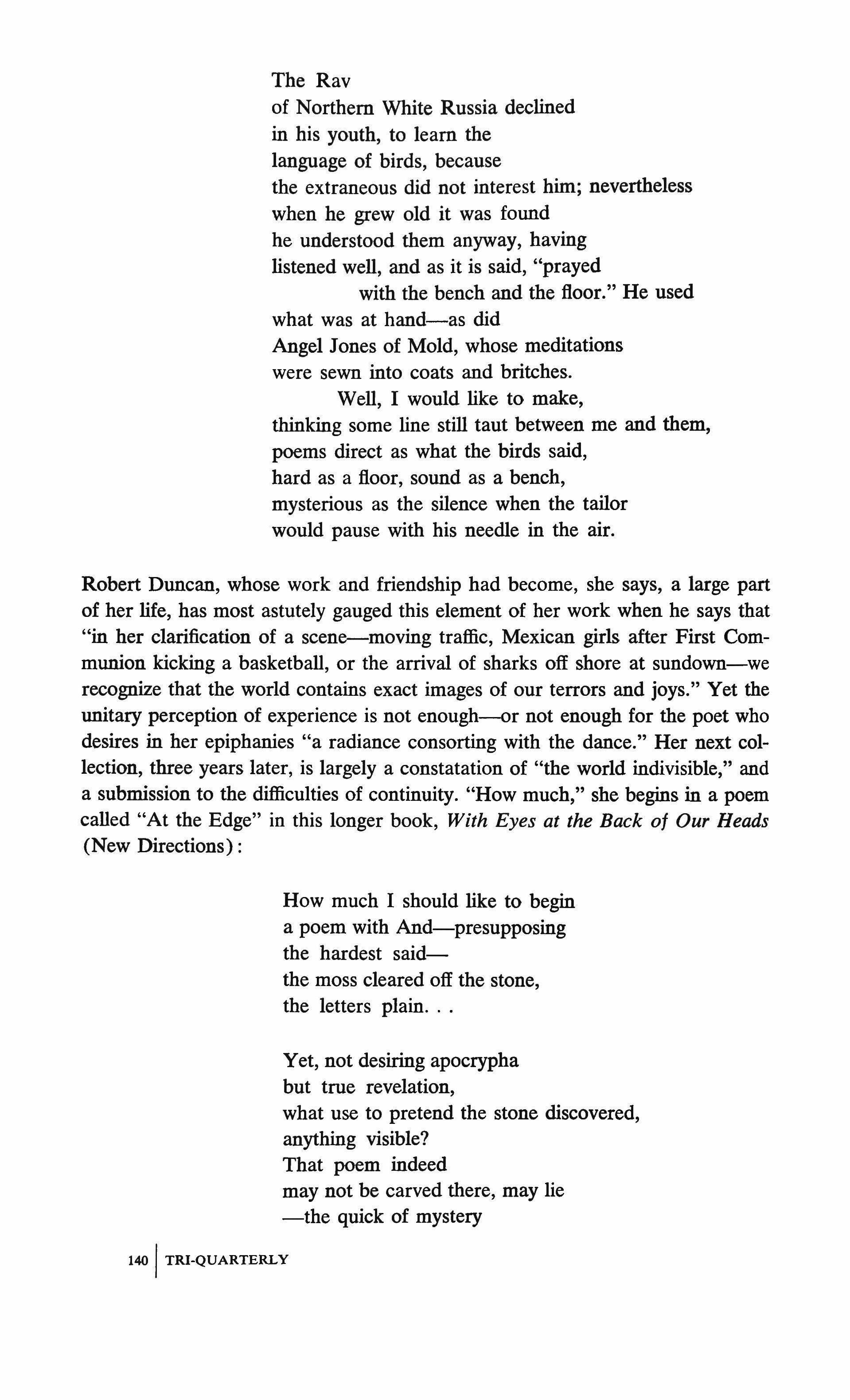
The Rav of Northern White Russia declined in his youth, to learn the language of birds, because the extraneous did not interest him; nevertheless when he grew old it was found he understood them anyway, having listened well, and as it is said, "prayed with the bench and the floor." He used what was at hand-as did Angel Jones of Mold, whose meditations were sewn into coats and britches. Well, I would like to make, thinking some line still taut between me and them, poems direct as what the birds said, hard as a floor, sound as a bench, mysterious as the silence when the tailor would pause with his needle in the air.
Robert Duncan, whose work and friendship had become, she says, a large part of her life, has most astutely gauged this element of her work when he says that "in her clarification of a scene-moving traffic, Mexican girls after First Communion kicking a basketball, or the arrival of sharks off shore at sundown-we recognize that the world contains exact images of our terrors and joys." Yet the unitary perception of experience is not enough--or not enough for the poet who desires in her epiphanies "a radiance consorting with the dance." Her next collection, three years later, is largely a constatation of "the world indivisible," and a submission to the difficulties of continuity. "How much," she begins in a poem called "At the Edge" in this longer book, With Eyes at the Back of Our Heads (New Directions):
How much I should like to begin a poem with And-presupposing the hardest saidthe moss cleared off the stone, the letters plain.
Yet, not desiring apocrypha but true revelation, what use to pretend the stone discovered, anything visible?
That poem indeed may not be carved there, may lie -the quick of mystery

in animal eyes gazing from the thicket, a creature of unknown size, fierce, terrified, having teeth or no defense, but whom no And may approach suddenly.
Gently, then, Miss Levertov undertakes the approach to life as a continuum and to poetry as a rite by which its rhythms may be recorded:
The gods die every day but sovereign poems go on breathing in a counter-rhythm that mocks the frenzy of weapons, their impudent power.
She begins, as most poets do, with an aporia-"no skilled hands caress a stranger's flesh with lucid oil before a word is spoken, no feasting before a tale is told, nor is there an exchange of gifts, stranger to stranger, nor libation, nor sacrifice to the gods, and no house has its herm." The longing for rituals, the need to "transform into our flesh our deaths" is the subject, then, of all her later poems, though their object is generally elsewhere, out in the world which, as much for Miss Levertov as for a poet like Gautier, absolutely exists as it is. Her undertaking will be to convert: to transform as by a kind of magic that can be neither criticized nor institutionalized nor brought to a full expression of its own intentions, the eternal consciousness of disparities into a momentary unity of association. The literary conventions available-by conquest-to her for this transaction are not always adequate to the ultimate ambition of her task, but in her two latest books, published in 1963 and 1965 by New Directions, and called The Jacob's Ladder and 0 Taste and See, "something sundered begins to knit. By scene, by sentence, something is rendered back into life, back to the gods." The titles of these two books suggest the poles from which the poet must swing--on the one side the Jacob's Ladder which is the "path between reality and the soul, a language excelling itself to be itself," and on the other the delectation in the world as data, as given: "The world is not with us enough." Between transcendence and immanence. Riven often into chaos by discrepant and indeed divided allegiances, Denise Levertov has so far devised three principal tactics for reconciling herself with her own spirit, her own flesh. One is the return to an esoteric wisdom -Hasidim· Zen, and that impulse of energy-worship which runs from Blake through Whitman to Lawrence and Olson-a doctrine that must stand for her as a danger as well as a lure:
Those who were sacred have remained so, holiness does not dissolve, it is a presence of bronze, only the sight that saw it

faltered and turned from it. An old joy returns in holy presence.
Another is the intensification of momentary consciousness to ecstasy, a kind of via naturaliter of which she speaks in "The Depths":
Cold of the sea is counterpart to this great fire. Plunging out of the burning cold or ocean we enter an ocean of intense noon. Sacred salt sparldes on our bodies. After mist has wrapped us again in fine wool, may the taste of salt recall to us the great depths about us.
And the third is the exploration of her own history, "something forgotten for twenty years." In one of her finest poems so far, "A Map of the Western Part of the County of Essex in England," Denise Levertov turns and addresses her past:
All the Ivans dreaming of their villages all the Marias dreaming of their walled cities, picking up fragments of New World slowly, not knowing how to put them together nor how to join image with image, now I know how it was with you, an old map made long before I was born shows ancient rights of way where I walked when I was ten burning with desire for the world's great splendors, a child who traced voyages indelibly all over the atlas, who now in a far country remembers the first river, the first field, bricks and lumber dumped in it ready for building, that new smell, and remembers the walls of the garden, the first light.
There is a loyalty to experience here that ransoms all that seems only wispy or modish in some of her work as it has been published. The poem picks up the thread of "Christmas 1944" from that first little "Jungian" book, and like an Ariadne in the labyrinth of herself (of which she is also the Minotaur and the Theseus), Denise Levertov follows its scarlet lead with a kind of reverence for its mystery. The lights she once watched on Regent Street, "silent under stars," she sees again in New York:
The lights change: the avenue's endless nave echoes notes of liturgical red.
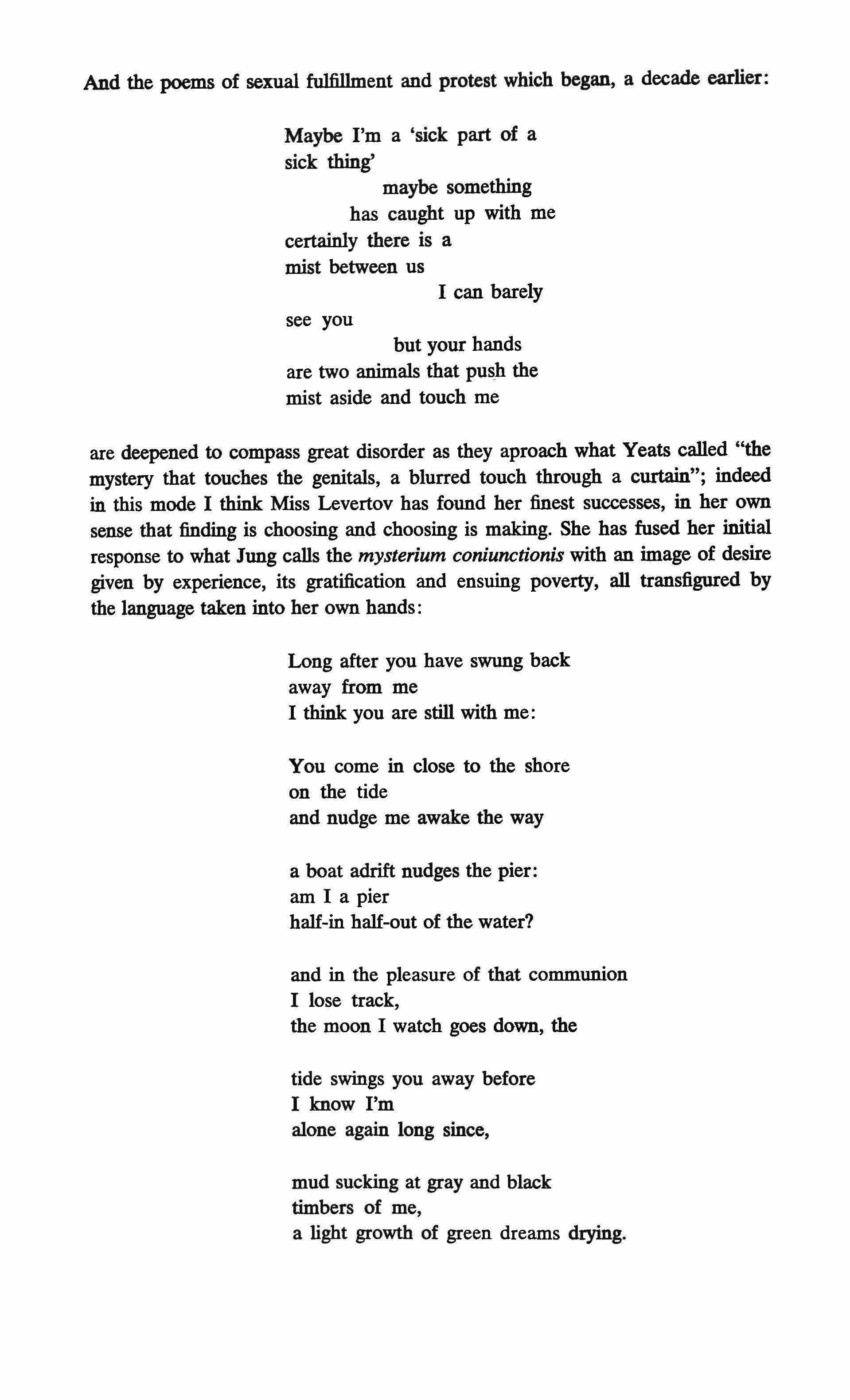
And the poems of sexual fulfillment and protest which began, a decade earlier:
Maybe I'm a 'sick part of a sick thing' maybe something has caught up with me certainly there is a mist between us I can barely
see you but your hands are two animals that push the mist aside and touch me
are deepened to compass great disorder as they aproach what Yeats called "the mystery that touches the genitals, a blurred touch through a curtain"; indeed in this mode I think Miss Levertov has found her finest successes, in her own sense that finding is choosing and choosing is making. She has fused her initial response to what Jung calls the mysterium coniunctionis with an image of desire given by experience, its gratification and ensuing poverty, all transfigured by the language taken into her own hands:
Long after you have swung back away from me I think you are still with me:
You come in close to the shore on the tide and nudge me awake the way
a boat adrift nudges the pier: am I a pier half-in half-out of the water?
and in the pleasure of that communion I lose track, the moon I watch goes down, the tide swings you away before I know I'm alone again long since,
mud sucking at gray and black timbers of me, a light growth of green dreams drying.

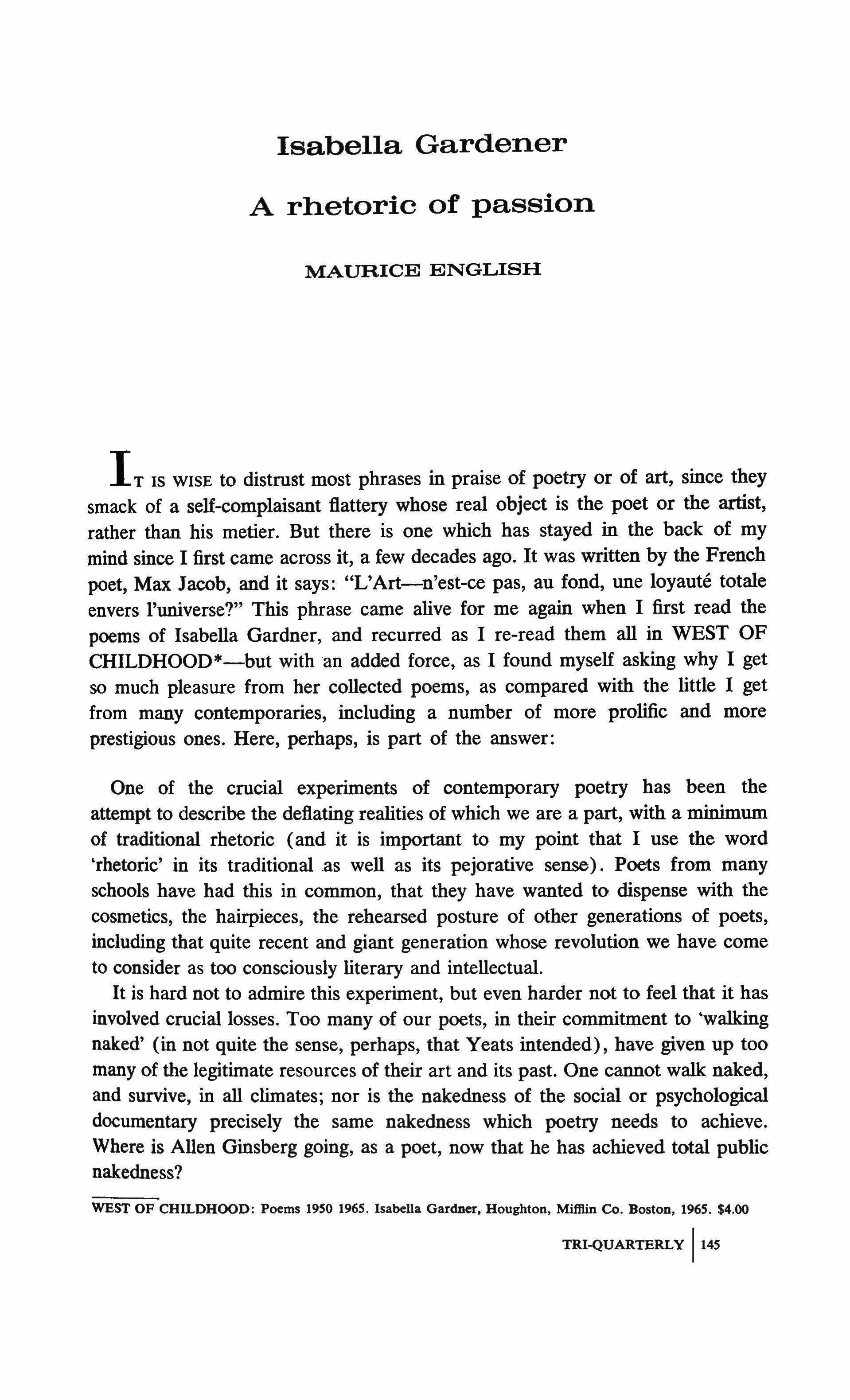
IT IS WISE to distrust most phrases in praise of poetry or of art, since they smack of a self-complaisant flattery whose real object is the poet or the artist, rather than his metier. But there is one which has stayed in the back of my mind since I first came across it, a few decades ago. It was written by the French poet, Max Jacob, and it says: "L'Art-n'est-ce pas, au fond, une loyaute totale envers l'universe?" This phrase came alive for me again when I first read the poems of Isabella Gardner, and recurred as I re-read them all in WEST OF CHILDHOOD*-but with an added force, as I found myself asking why I get so much pleasure from her collected poems, as compared with the little I get from many contemporaries, including a number of more prolific and more prestigious ones. Here, perhaps, is part of the answer:
One of the crucial experiments of contemporary poetry has been the attempt to describe the deflating realities of which we are a part, with a minimum of traditional rhetoric (and it is important to my point that I use the word 'rhetoric' in its traditional as well as its pejorative sense). Poets from many schools have had this in common, that they have wanted to dispense with the cosmetics, the hairpieces, the rehearsed posture of other generations of poets, including that quite recent and giant generation whose revolution we have come to consider as too consciously literary and intellectual. It is hard not to admire this experiment, but even harder not to feel that it has involved crucial losses. Too many of our poets, in their commitment to 'walking naked' (in not quite the sense, perhaps, that Yeats intended), have given up too many of the legitimate resources of their art and its past. One cannot walk naked, and survive, in all climates; nor is the nakedness of the social or psychological documentary precisely the same nakedness which poetry needs to achieve. Where is Allen Ginsberg going, as a poet, now that he has achieved total public nakedness?
WEST OF CHILDHOOD: Poems 1950 1965. Isabella Gardner, Houghton, MiJHin Co. Boston, 1965. $4.00
TRI-QUARTERLY 1145
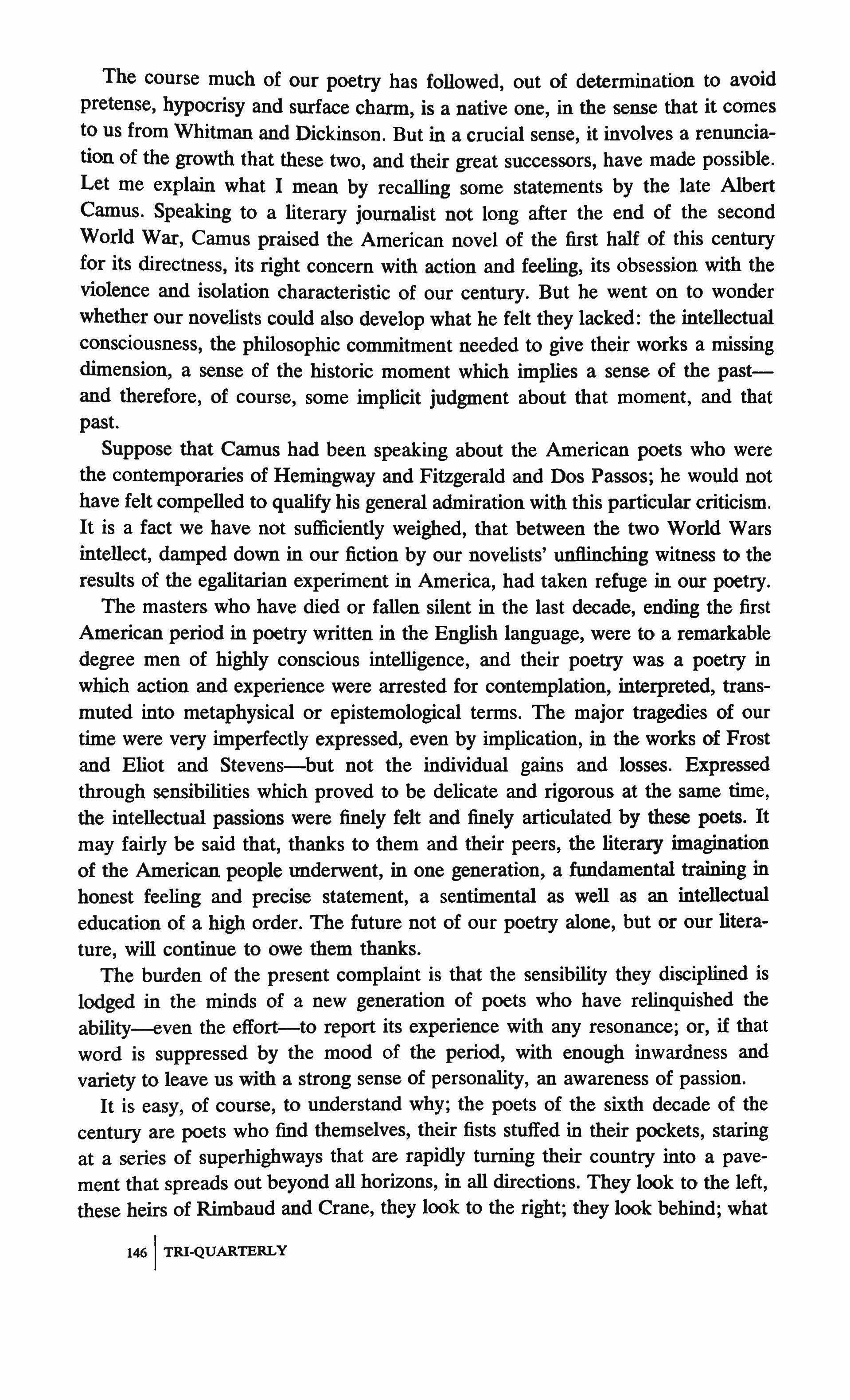
The course much of our poetry has followed, out of determination to avoid pretense, hypocrisy and surface charm, is a native one, in the sense that it comes to us from Whitman and Dickinson. But in a crucial sense, it involves a renunciation of the growth that these two, and their great successors, have made possible. Let me explain what I mean by recalling some statements by the late Albert Camus. Speaking to a literary journalist not long after the end of the second World War, Camus praised the American novel of the first half of this century for its directness, its right concern with action and feeling, its obsession with the violence and isolation characteristic of our century. But he went on to wonder whether our novelists could also develop what he felt they lacked: the intellectual consciousness, the philosophic commitment needed to give their works a missing dimension, a sense of the historic moment which implies a sense of the pastand therefore, of course, some implicit judgment about that moment, and that past.
Suppose that Camus had been speaking about the American poets who were the contemporaries of Hemingway and Fitzgerald and Dos Passos; he would not have felt compelled to qualify his general admiration with this particular criticism. It is a fact we have not sufficiently weighed, that between the two World Wars intellect, damped down in our fiction by our novelists' unflinching witness to the results of the egalitarian experiment in America, had taken refuge in our poetry.
The masters who have died or fallen silent in the last decade, ending the first American period in poetry written in the English language, were to a remarkable degree men of highly conscious intelligence, and their poetry was a poetry in which action and experience were arrested for contemplation, interpreted, transmuted into metaphysical or epistemological terms. The major tragedies of our time were very imperfectly expressed, even by implication, in the works of Frost and Eliot and Stevens-but not the individual gains and losses. Expressed through sensibilities which proved to be delicate and rigorous at the same time, the intellectual passions were finely felt and finely articulated by these poets. It may fairly be said that, thanks to them and their peers, the literary imagination of the American people underwent, in one generation, a fundamental training in honest feeling and precise statement, a sentimental as well as an intellectual education of a high order. The future not of our poetry alone, but or our literature, will continue to owe them thanks.
The burden of the present complaint is that the sensibility they disciplined is lodged in the minds of a new generation of poets who have relinquished the ability--even the effort-to report its experience with any resonance; or, if that word is suppressed by the mood of the period, with enough inwardness and variety to leave us with a strong sense of personality, an awareness of passion.
It is easy, of course, to understand why; the poets of the sixth decade of the century are poets who find themselves, their fists stuffed in their pockets, staring at a series of superhighways that are rapidly turning their country into a pavement that spreads out beyond all horizons, in all directions. They look to the left, these heirs of Rimbaud and Crane, they look to the right; they look behind; what
TRI-QUARTERLY
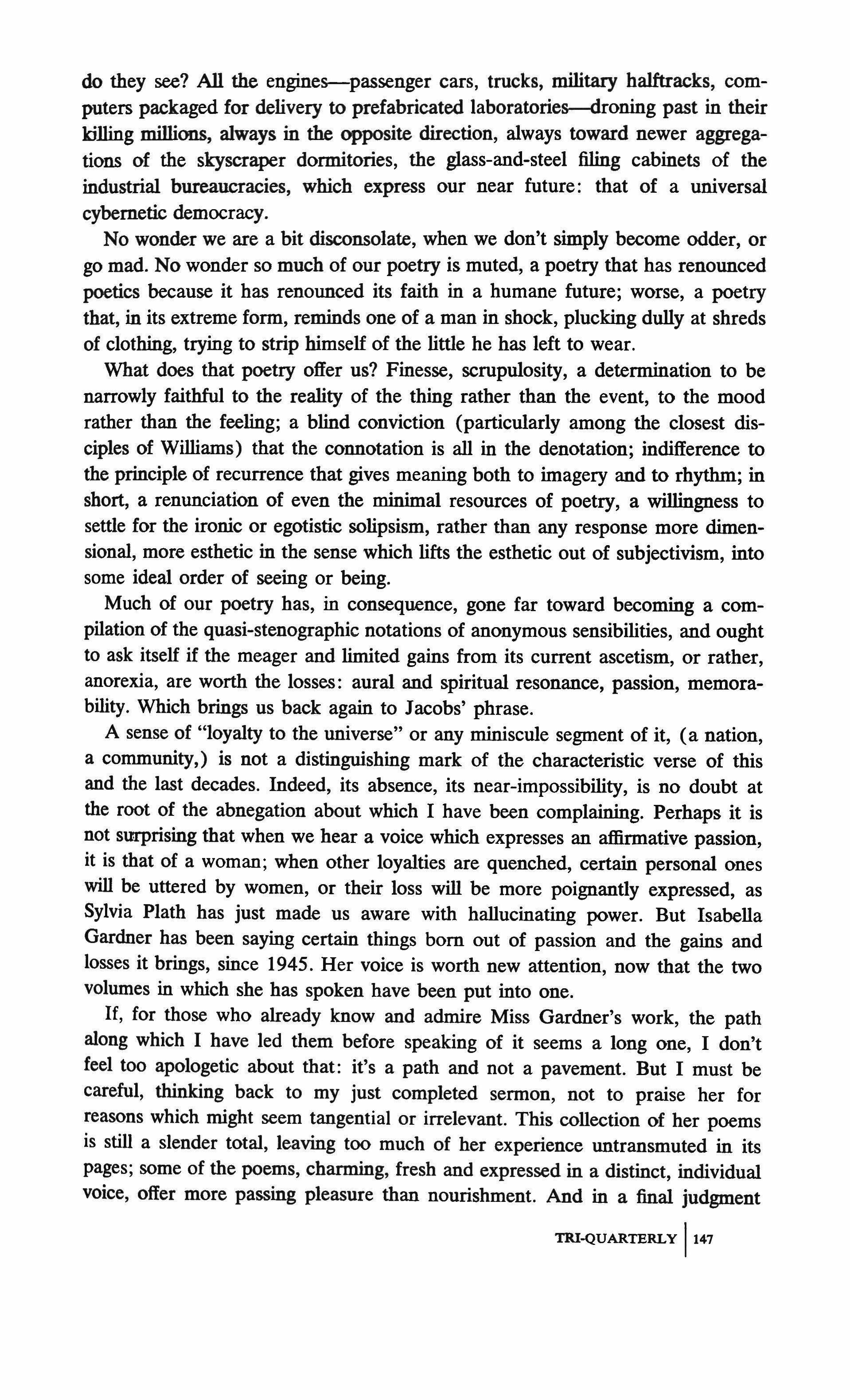
do they see? All the engines-passenger cars, trucks, military halftracks, computers packaged for delivery to prefabricated laboratories-droning past in their killing millions, always in the opposite direction, always toward newer aggregations of the skyscraper dormitories, the glass-and-steel filing cabinets of the industrial bureaucracies, which express our near future: that of a universal cybernetic democracy.
No wonder we are a bit disconsolate, when we don't simply become odder, or go mad. No wonder so much of our poetry is muted, a poetry that has renounced poetics because it has renounced its faith in a humane future; worse, a poetry that, in its extreme form, reminds one of a man in shock, plucking dully at shreds of clothing, trying to strip himself of the little he has left to wear.
What does that poetry offer us? Finesse, scrupulosity, a determination to be narrowly faithful to the reality of the thing rather than the event, to the mood rather than the feeling; a blind conviction (particularly among the closest disciples of Williams) that the connotation is all in the denotation; indifference to the principle of recurrence that gives meaning both to imagery and to rhythm; in short, a renunciation of even the minimal resources of poetry, a willingness to settle for the ironic or egotistic solipsism, rather than any response more dimensional, more esthetic in the sense which lifts the esthetic out of subjectivism, into some ideal order of seeing or being.
Much of our poetry has, in consequence, gone far toward becoming a compilation of the quasi-stenographic notations of anonymous sensibilities, and ought to ask itself if the meager and limited gains from its current ascetism, or rather, anorexia, are worth the losses: aural and spiritual resonance, passion, memorability. Which brings us back again to Jacobs' phrase.
A sense of "loyalty to the universe" or any miniscule segment of it, (a nation, a community,) is not a distinguishing mark of the characteristic verse of this and the last decades. Indeed, its absence, its near-impossibility, is no doubt at the root of the abnegation about which I have been complaining. Perhaps it is not surprising that when we hear a voice which expresses an affirmative passion, it is that of a woman; when other loyalties are quenched, certain personal ones will be uttered by women, or their loss will be more poignantly expressed, as Sylvia Plath has just made us aware with hallucinating power. But Isabella Gardner has been saying certain things born out of passion and the gains and losses it brings, since 1945. Her voice is worth new attention, now that the two volumes in which she has spoken have been put into one.
If, for those who already know and admire Miss Gardner's work, the path along which I have led them before speaking of it seems a long one, I don't feel too apologetic about that: it's a path and not a pavement. But I must be careful, thinking back to my just completed sermon, not to praise her for reasons which might seem tangential or irrelevant. This collection of her poems is still a slender total, leaving too much of her experience untransmuted in its pages; some of the poems, charming, fresh and expressed in a distinct, individual voice, offer more passing pleasure than nourishment. And in a final judgment
TRI-QUARTERLy 1147
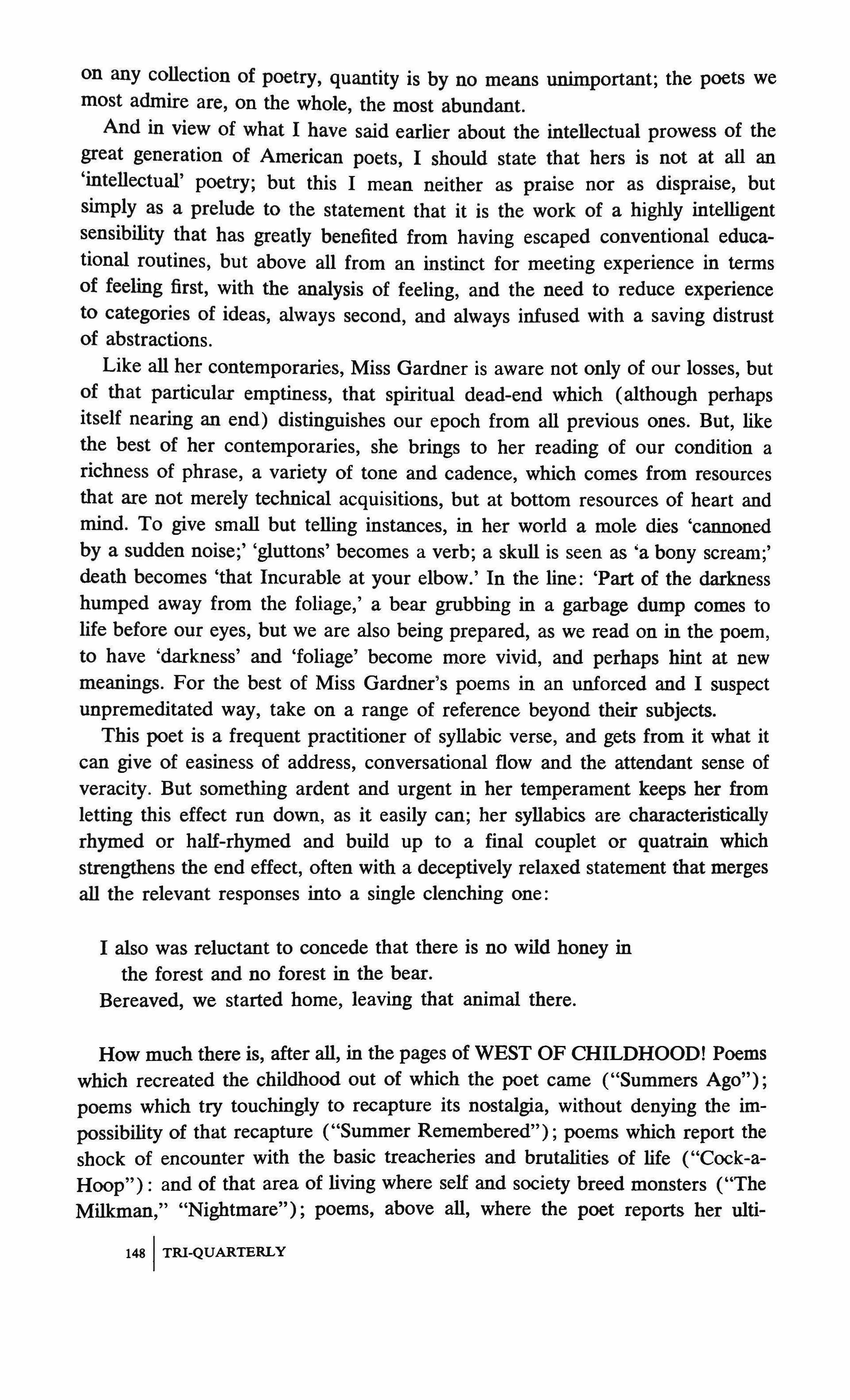
on any collection of poetry, quantity is by no means unimportant; the poets we most admire are, on the whole, the most abundant.
And in view of what I have said earlier about the intellectual prowess of the great generation of American poets, I should state that hers is not at all an 'intellectual' poetry; but this I mean neither as praise nor as dispraise, but simply as a prelude to the statement that it is the work of a highly intelligent sensibility that has greatly benefited from having escaped conventional educational routines, but above all from an instinct for meeting experience in terms of feeling first, with the analysis of feeling, and the need to reduce experience to categories of ideas, always second, and always infused with a saving distrust of abstractions.
Like all her contemporaries, Miss Gardner is aware not only of our losses, but of that particular emptiness, that spiritual dead-end which (although perhaps itself nearing an end) distinguishes our epoch from all previous ones. But, like the best of her contemporaries, she brings to her reading of our condition a richness of phrase, a variety of tone and cadence, which comes from resources that are not merely technical acquisitions, but at bottom resources of heart and mind. To give small but telling instances, in her world a mole dies 'cannoned by a sudden noise;' 'gluttons' becomes a verb; a skull is seen as 'a bony scream;' death becomes 'that Incurable at your elbow.' In the line: 'Part of the darkness humped away from the foliage,' a bear grubbing in a garbage dump comes to life before our eyes, but we are also being prepared, as we read on in the poem, to have 'darkness' and 'foliage' become more vivid, and perhaps hint at new meanings. For the best of Miss Gardner's poems in an unforced and I suspect unpremeditated way, take on a range of reference beyond their subjects.
This poet is a frequent practitioner of syllabic verse, and gets from it what it can give of easiness of address, conversational flow and the attendant sense of veracity. But something ardent and urgent in her temperament keeps her from letting this effect run down, as it easily can; her syllabics are characteristically rhymed or half-rhymed and build up to a final couplet or quatrain which strengthens the end effect, often with a deceptively relaxed statement that merges all the relevant responses into a single clenching one:
I also was reluctant to concede that there is no wild honey in the forest and no forest in the bear.
Bereaved, we started home, leaving that animal there.
How much there is, after all, in the pages of WEST OF CHILDHOOD! Poems which recreated the childhood out of which the poet came ("Summers Ago"); poems which try touchingly to recapture its nostalgia, without denying the impossibility of that recapture ("Summer Remembered"); poems which report the shock of encounter with the basic treacheries and brutalities of life ("Cock-aHoop"): and of that area of living where self and society breed monsters ("The Milkman," "Nightmare"); poems, above all, where the poet reports her ulti-

mate loyalty, tuming-a Don Quixote of her time and sex-toward a universe whose creatures reject that loyalty, leaving us doubly bereft in our recognition and acceptance of that rejection ("Southwest of True North" and, above all, ''That 'Craning of the Neck' "). No wonder that poets as diverse in theory and practice as Richard Eberhart and William Carlos Williams admired Miss Gardner's work. And, reading poems like 'Letter from Slough Pond,' 'The Masked Shrew,' 'The Widow's Yard,' one realizes that, if Edith Sitwell was an enthusiast for this poetry, Colette had she know it would have been too, recogizing in it that avidity for life which was her own, and a similar combination of intensity and delicacy in reporting it.
For myself, as a kind of summary-estimate of the best she has to offer, I will say that I cannot imagine a future anthology of the finest very short poems that would omit 'In the Museum' and that I can think of few longer poems that more perfectly express one contemporary sense of loss than 'That "Craning of the Neck" '.
Who know what will be read from our time, if anything, a century from now?
Should any poems of Miss Gardner's be among those that survive, they will seem, on reading, to express what was true for us in her time and will be true then.

The primary word is I-Thou. The primary word I-Thou can only be spoken with the whole being. The primary word I-It can never be spoken with the whole being.
-MARTIN BUBERBirthdays from the ocean one desert april noon I rode through the untouching and no-odored air astride an english saddle on a western mare through the resisting tow-colored grass and the duneless sand. Under me swam a stream strange in that dried country. A "great blue heron" stood still in the tideless water and when I saw him there my heart dazzled. I whispered the mare to move quietly as Indians move, I reined her with a catpaw hand and my breathless feet crouched into the stirrups and I prayed her through cactus mesquite and cattlebones to the water's edge where the tall bird fished the stones. The listening heron expanded with despair unloosed unwilling wings, heaved from water into air.
o he hated to fly he flapped with a splayed painful motion. Deliberate as a weathervane he plodded through the air that touched the fishful water. I followed him silently giving no quarter all that afternoon. He never flew far from me we kept meeting past each cape and estuary but he always heaved doggedly out of touch. I only wanted to start myself into him and try and thou him till we recognized and became each other. We were both fishing. But I could not reach his eye. He fled in puzzled pondrous pain and I last rode home, conspicuous as Cain, yet ashamed of a resigned demeaning pity that denied us both. I returned to the city and visited the zoo, fished on a concrete shore, took children to aquariums, and rode no more.
I found that the encyclopedia says "A gregarious bird No one spoke that desert day, not one word. That fisher who heaved to dodge my eye has damned himself an It and I shall never fly.
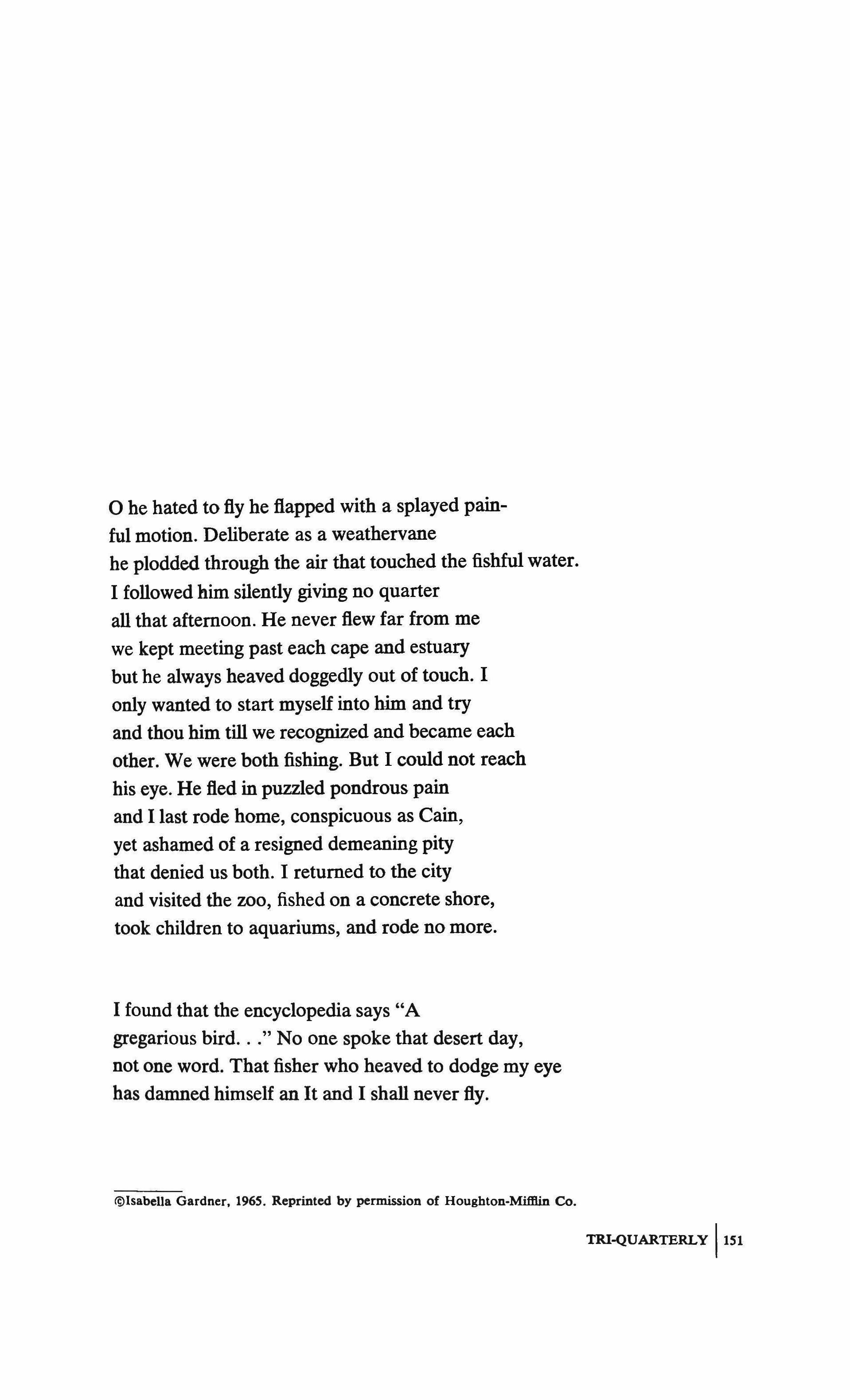 ©IsabelJa Gardner. 1965. Reprinted by permission of Houghton-Mi1IIin Co.
©IsabelJa Gardner. 1965. Reprinted by permission of Houghton-Mi1IIin Co.

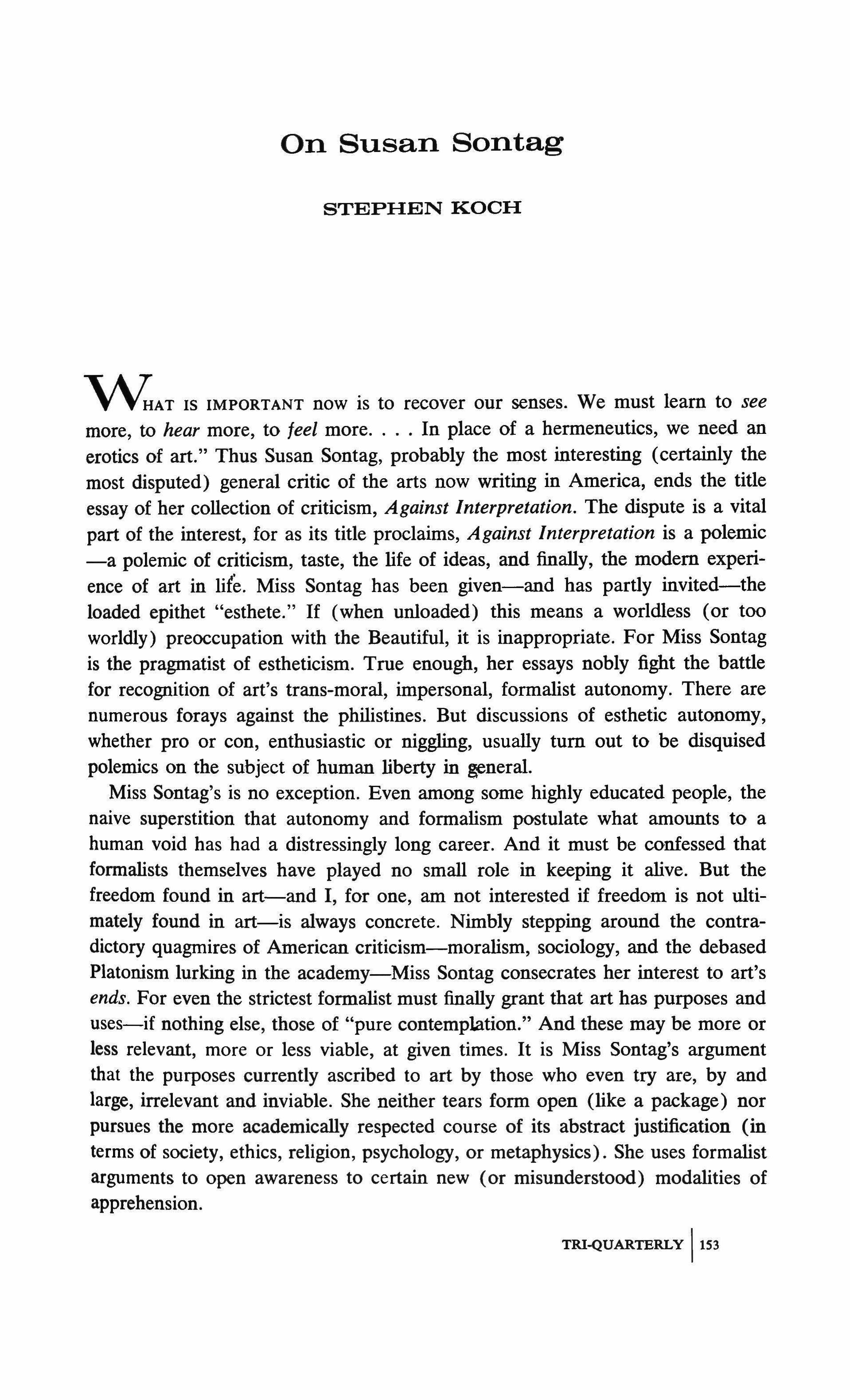
WATIS IMPORTANT now is to recover our senses. We must learn to see more, to hear more, to feel more. In place of a hermeneutics, we need an erotics of art." Thus Susan Sontag, probably the most interesting (certainly the most disputed) general critic of the arts now writing in America, ends the title essay of her collection of criticism, Against Interpretation. The dispute is a vital part of the interest, for as its title proclaims, Against Interpretation is a polemic -a polemic of criticism, taste, the life of ideas, and finally, the modem experience of art in life. Miss Sontag has been given-and has partly invited-the loaded epithet "esthete." If (when unloaded) this means a worldless (or too worldly) preoccupation with the Beautiful, it is inappropriate. For Miss Sontag is the pragmatist of estheticism. True enough, her essays nobly fight the battle for recognition of art's trans-moral, impersonal, formalist autonomy. There are numerous forays against the philistines. But discussions of esthetic autonomy, whether pro or con, enthusiastic or niggling, usually tum out to be disquised polemics on the subject of human liberty in general.
Miss Sontag's is no exception. Even among some highly educated people, the naive superstition that autonomy and formalism postulate what amounts to a human void has had a distressingly long career. And it must be confessed that formalists themselves have played no small role in keeping it alive. But the freedom found in art-and I, for one, am not interested if freedom is not ultimately found in art-is always concrete. Nimbly stepping around the contradictory quagmires of American criticism-moralism, sociology, and the debased Platonism lurking in the academy-Miss Sontag consecrates her interest to art's ends. For even the strictest formalist must finally grant that art has purposes and uses-if nothing else, those of "pure contemplation." And these may be more or less relevant, more or less viable, at given times. It is Miss Sontag's argument that the purposes currently ascribed to art by those who even try are, by and large, irrelevant and inviable. She neither tears form open (like a package) nor pursues the more academically respected course of its abstract justification (in terms of society, ethics, religion, psychology, or metaphysics). She uses formalist arguments to open awareness to certain new (or misunderstood) modalities of apprehension.
TRI-QUARTERLY 1153

Even though at least half her subjects are scarcely novelties, Miss Sontag has also been classed with the avant-garde, and rightly so. Yet it is not novelty, but authenticity that she pursues, and her best writing always shows some urgent admonition of feeling or intellect that gives it a strange charisma. In the preface to Against Interpretation, she openly announces what few critics will admit; that she has only given impersonal formulations to her tastes and opinions; that there is a public dimension to self-hood. But a caveat: "impersonality" presides over them as much as "taste." Despite received opinion, there is nothing contradictory about holding ideas in the embrace of taste. Absolute detachment is at times an undeniable virtue, but the view that a private, even idiosyncratic taste is hostile to thought can only be called a parochialism, rather like the view that form is empty; autonomy, valueless. A parochialism origins that are exalted indeed. "The tree of life is greener than the tree of thought," Hegel wrote, as if to reproach the dualism that fills his work and besets us all. It besets Miss Sontag as much as anyone, but it is foolish to imagine that the two trees resist all attempts for a hybrid. Her work rests on assumptions drawn from a panoply of extremely sophisticated theoreticians who, taken together, make up the pantheon of European modernism. Rather than represent any of them; Miss Sontag remains herself, articulating an internal debate, never showing her doubts, never losing her authoritative, coolly transparent manner and her unmistakable voice.
In the title essay, for example, Miss Sontag argues "against interpretation" less on the ground that hermeneutics is wrong (misleading, inaccurate), but that it is undesirable in our present situation. Repeatedly, she returns to the assumption that in place of the psychic worms most diagnosticians find in modem life (social alienation, collective guilt, the collapse of faith), it is anomie that gnaws at our times, that peculiar fusion of an unmanageable sensory overload and the incapacity to respond. "Interpretation" merely redoubles an already top-heavy burden of self-consciousness; criticism ought to promote, rather than postpone, the direct, unmediated, undiscursive apprehension of art. To this end, Miss Sontag has become America's first public exponent of a new critical methodwhich she uses very loosely--derived from the phenomonological critique that descends from French neo-Hegelianism. Unfortunately, many American intellectuals remain unaccustomed to the idea that human apprehension and feeling have discernible forms, that as phenomena, they are open to a phenomonology. On the contrary, the uneasy conjunction of psychoanalysis, left-wing moral fervor, and our pronounced rhetorical literary tradition have implanted, in tum, pre-occupations with causality (and cure); with feeling as an instrument of moral exhortation or justificationporrwith criticism as an eloquent recapitulation of various jrissons. I feel some frustration over Miss Sontag's theoretical formulations of her position-they are not to be compared with the similar arguments of, say, Roland Barthes. But the American literary world is not the French, nor are our specific needs theirs. Miss Sontag derives from the French something more important to her than a phenomonological critique.
In one of her early essays (a review of Norman O. Brown's Life Against

Death), Miss Sontag names the theme that is to run through most of her later writing. The "fundamental problems," she says, "are the hypocrisy of our culture, about art, money, religion, work, about sex and the motives of the body. Serious thinking about these problems-rightly, in my opinion, centered on the meaning of sexuality and of human freedom-has been continuous in France since Sade, Fourier, Cabanis, and Enfantin; it is to be found today in such disparate works as the sections on the body and on concrete relations with others in Sartre's Being and Nothingness, in the essays of Maurice Blanchot, in L'Histoire d'O, in the plays and prose of Jean Genet." Eroticism and liberty, she adds, following Brown and Herbert Marcuse, are "twin subjects." Though plainly sympathetic, Miss Sontag remains non-commital about the "eschatology of immanence" she ascribes to Brown, as well as about the--to me--more interesting arguments of Marcuse in Eros and Civilization. Miss Sontag's general disinclination to make some statement of her intellectual allegiances is understandable. But even her assumption that eroticism and freedom are correlatives is never really explored. This seems to me unfortunate, because I think it is a correct asumption that calls for some major revisions in our thinking about art. Miss Sontag calls for "an erotics of art," but she doesn't supply one. The failure decisively prevents Against Interpretation from being a possibly great book of criticism, and more than just a valuable and liberating one.
But Miss Sontag does not regard herself as a critic by vocation. Great books of criticism try to solve some of the essential problems about the nature of art: their force springs from the assurance that this always touches on the essential meaning of what it is to be human. But the nature of art is not the only question one confronts in art's presence. "Perhaps there are certain ages," she writes in reference to Simone Weil, "which do not need truth as much as they need a deepening of the sense of reality, a widening of the imagination. I, for one, do not doubt that the sane view of the world is the true one. But is that what is always wanted, truth? The need for truth is not constant, no more than is the need for repose." It would be hard to think of a more direct statement of the ends Miss Sontag thinks art should serve. Her criticism is an arbitration between forms of feeling and apprehension that "deepen the sense of reality" and the "sane view of the world."
This pleasant, simple formulation would have the disadvantage of being true of every serious critic were not Miss Sontag's views a little more radical than the "common sense" her phrase "the sane view of the world" suggests. I've already mentioned one: that Eros and Freedom are in union, that art, in consequence, is grounded in Eros. But if, as Schiller long since argued in his powerfully moving Letters on the Aesthetic Education of Man, the esthetic dimension is an erotic dimension as well-an exalted contemplative arena for the sometimes anguishing play of Eros-Miss Sontag seeks a method-and an art-that will no longer (like psychoanalytic methods) continue to enforce its alienation. As I have said, her method is not a system, but operates polemically within a set of systems. At the same time, I find it vastly more relevant and involving
TRI-QUARTERLy 1155

than most systematic criticism presently being done. Most American formalism concerns itself with the formal realization of impulses toward visionary ecstasy, pure creation, or some sort of ersatz metaphysical reconciliation, be it with God, Nature, the logos or even, alas, the State. The results are often impressive and sometimes exciting, but they are often based on antiquated ideas; like certain women, they lose some of their charm when all the lights are on. On the other hand, psychoanalytic criticism is transfixed by causality and cure. In most cases, both of these fail to do justice to the experience of apprehension, which is after all, where we must locate art's existence. More relevantly, Miss Sontag calls upon her neo-Hegelian background to find art's relation to Eros and freedom in thesphere of intersubjectivity. For the formalism that a phenomonology of intersubjectivity encourages is, above all, concrete and monadic, offering grounds for a discussion of apprehension that is extremely spacious. * In her essay "On Style," Miss Sontag carries the spirit, if not the letter, of phenomonology even furtherthough in a very vulnerable fashion, unguarded by technical language, dependant on a set of incompletely expressed analogies. But the analogies strikes home, for the formal properties in a work of art do play a role analogous to, but not identical with, that "bracketing" of phenomena that Husserl prescribed. And she is also right to attack the tenacious form-content problem on these grounds. When form is no longer understood as either decoration, organization, seduction, justification of content or its quasi-mystical Platonic redemption, but as the means of apprehension that isolates states of feeling and knowledge, promoting their specificity and undercutting their vulnerability to generalization, the form-content distinction becomes considerably less valuable, if not outright useless. There is not "sadness," much less "symbols" of sadness: there is this sadness, this joy, this knowledge. But the analogy with phenomonology is loose. After all, a work of art is not, or at least not primarily, a formal investigation. It is an encounter, an experience, and finds its only justification as an experience. We have seen works of art as problems, things to be solved, too long. The function of form is to purify the experience of intersubjective apprehension, render it singular and specific, and open to what Miss Sontag calls "active contemplation." Form is feeling, action and awareness, bracketed from the world, but operating only in the world. It proposes the work of art as an object of and for consciousness, an awareness tempered by an awareness, for that reason, as she says, "both autonomous and exemplary."
Abstractly stated, this approach-and it is nothing but an approach, just as literature is only literature-is astonishingly open. Almost anything=-certainly anyone has ever felt moved to call art=-can be included in it. Though she nowhere says so explicitly, Miss Sontag has evidently rejected esthetics (as systematic knowledge) as her criterion of judgment. This is potentially extremely radical, though not in her hands. (Paradoxically, such "radicalism" is also what
*Considerations of intersubjectivity are found in almost all varieties of Hegelian thought, but the concept has been exploited most thoroughly by the phenomonologists deriving from HusserI. The method itself is far too complex to be summarized here. It suffices to say that a phenomonological exploration of consciousness and intersubjectivity offer an idea basis for analyzing the forms of emotion without denying their presentness in consciousness itself - their textures, their specific gravity, as it were.
1561 TRI-QUARTERLY
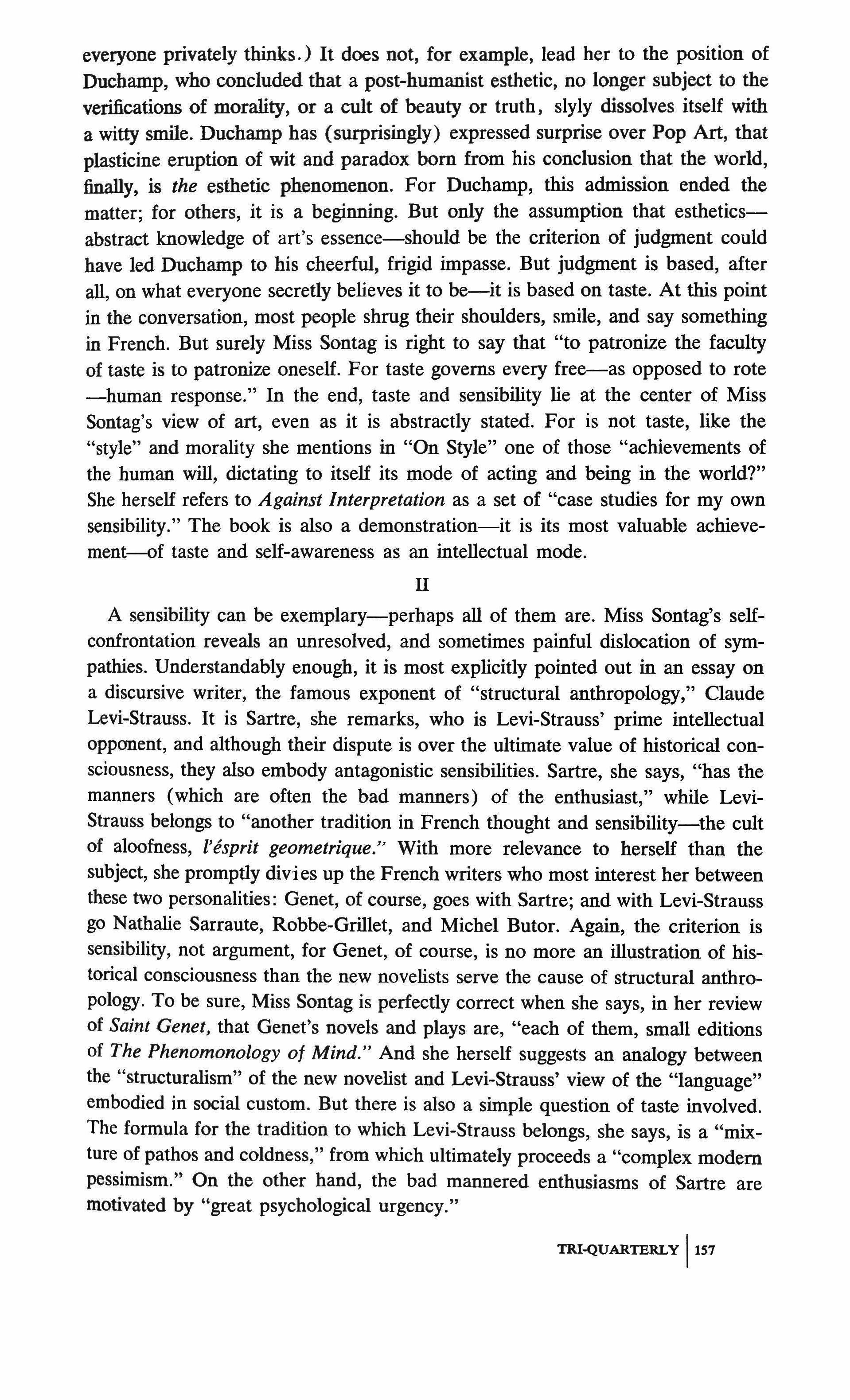
everyone privately thinks.) It does not, for example, lead her to the position of Duchamp, who concluded that a post-humanist esthetic, no longer subject to the verifications of morality, or a cult of beauty or truth, slyly dissolves itself with a witty smile. Duchamp has (surprisingly) expressed surprise over Pop Art, that plasticine eruption of wit and paradox born from his conclusion that the world, finally, is the esthetic phenomenon. For Duchamp, this admission ended the matter; for others, it is a beginning. But only the assumption that estheticsabstract knowledge of art's essence-should be the criterion of judgment could have led Duchamp to his cheerful, frigid impasse. But judgment is based, after all, on what everyone secretly believes it to be-it is based on taste. At this point in the conversation, most people shrug their shoulders, smile, and say something in French. But surely Miss Sontag is right to say that "to patronize the faculty of taste is to patronize oneself. For taste governs every free-as opposed to rote -human response." In the end, taste and sensibility lie at the center of Miss Sontag's view of art, even as it is abstractly stated. For is not taste, like the "style" and morality she mentions in "On Style" one of those "achievements of the human will, dictating to itself its mode of acting and being in the world?" She herself refers to Against Interpretation as a set of "case studies for my own sensibility." The book is also a demonstration-it is its most valuable achievement-of taste and self-awareness as an intellectual mode.
A sensibility can be exemplary-perhaps all of them are. Miss Sontag's selfconfrontation reveals an unresolved, and sometimes painful dislocation of sympathies. Understandably enough, it is most explicitly pointed out in an essay on a discursive writer, the famous exponent of "structural anthropology," Claude Levi-Strauss. It is Sartre, she remarks, who is Levi-Strauss' prime intellectual opponent, and although their dispute is over the ultimate value of historical consciousness, they also embody antagonistic sensibilities. Sartre, she says, "has the manners (which are often the bad manners) of the enthusiast," while LeviStrauss belongs to "another tradition in French thought and sensibility-the cult of aloofness, l'esprit geometrique." With more relevance to herself than the subject, she promptly divies up the French writers who most interest her between these two personalities: Genet, of course, goes with Sartre; and with Levi-Strauss go Nathalie Sarraute, Robbe-Grillet, and Michel Butor. Again, the criterion is sensibility, not argument, for Genet, of course, is no more an illustration of historical consciousness than the new novelists serve the cause of structural anthropology. To be sure, Miss Sontag is perfectly correct when she says, in her review of Saint Genet, that Genet's novels and plays are, "each of them, small editions of The Phenomono[ogy of Mind." And she herself suggests an analogy between the "structuralism" of the new novelist and Levi-Strauss' view of the "language" embodied in social custom. But there is also a simple question of taste involved. The formula for the tradition to which Levi-Strauss belongs, she says, is a "mixture of pathos and coldness," from which ultimately proceeds a "complex modem pessimism." On the other hand, the bad mannered enthusiasms of Sartre are motivated by "great psychological urgency."
TRI-QUARTERLY 11s7

"Nowhere in the world," she complains in her review of Jack Smith's Flaming Creatures, "has the old cliche of European romanticism-the assassin mind versus the spontaneous heart-had such a long career as in America." Miss Sontag both attacks this myth and illustrates it. Properly enough, the sentimental versions of the problem are scorned; but it remains-as no one will doubt-a problem. The struggle, she sees, is not really between the heart and the mind, since the distinction between urgency and "l'esprit geometrique" invades thought, as well as art and personal feeling. And the need to cast a cold eye on life and death may be urgent indeed. Miss Sontag does not presume to arbitrate the quarrel between Sartre and Levi-Strauss, but in one form or another, it is going on inside her. In a whole set of essays, mainly written during 1963, this conflict unexpectedly comes into play in some way or another. The tone of her description of the new novelists in the Levi-Strauss piece is pretty ambiguous: "their search for an infinite precision, their narrow dehydrated subject matter and cool, microscopic styles." Her essay on Nathalie Sarraute, which she revised in 1965, began as a sympathetic dissent and was transformed into a much more sympatheticdissent. At any rate, the arguments of Robbe-Grillet's For a New Novel (which she rightly regards as a radical book, while Sarraute's Age of Suspicion is not really radical at all) are never espoused whole-heartedly. (Her plea for a revision of the novel's esthetic is a different matter). Later, she remarks on the "narrow" quality of Robbe-Grillet's "insight into relationships between people and things." And in her very brilliant essay on Resnais, she mentions the "frozen center" of Last Year at Marienbad and, after noting Resnais failure to reconcile"formalism with an ethic of engagement" in his Muriel, ends by comparing it to films that are "emotionally exalting, even when they are most dead-pan and cerebral." This demurrer over Muriel subtly recapitulates the antinomies set up at the end of the essay on Levi-Strauss. It is recapitulated again and again as the book proceeds, while the positions held down by Levi-Strauss and Sartre are loaded with an incongruous cargo of other figures, see-sawing to the rhythm of arguments, reservations, denunciations, doubts.
The coldness that has settled over the new novel is problematical indeed for the "erotics of art." Robbe-Grillet of course, does not see himself as the apostle of frigidity, but of a new anti-humanism. But the two are closely related, bound together in the humanistic cult of love. "My own view," she brilliantly remarks in her essay on Ceasare Pavese, "is that the modem cult of love expresses the central and peculiarly modem pre-occupation of the loss of feeling For 'life begins in the body,' as Pavese observes and he continually gives voice to the reproach which the body makes to the mind. If civilization may be defined as that stage of human life at which, objectively, the body becomes a problem, then OUT moment of civilization may be described as that stage as which we are subjectively aware of, and feel trapped by, this problem. Here is where the modem cult of love enters: it is the main way in which we test ourselves for strength of feeling, and find ourselves dificient." Based as it is on an extremity of self-consciousness, this fierce pessimism would seem to retrench the romantic myth Miss Sontag speaks of and establish it as a permanent feature of the spirit-
TRl-QUARTERLY

uallandscape. But an entirely different point of view is possible. The emotional -and in some sense, ethical-tendency underlying a substantial portion of the modernism she encounters so problematically is a rejection of suffering as a mode of human validation, of seriousness. If the pathology of the age is anomie, and its aspiration, love, its art is one of "dehumanization." As Ortega's famous argument makes clear, dehumanization is a species of self-consciousness aimed at displacing the modalities of perception from "life" (the creatural, the effective, the "all too human") to purely artificial regions of "form." I myself think Ortega leaves himself vulnerable, since there are any number of methods of "converting downward" almost any form-converting it back into the affective life. Ortega comes close to the conclusion that "form," when "pure" is a sensory void, and goaded by his search for an aristocracy beyond participation in the world, perpetuates the romantic myth he sought to overcome-though in its reactionary aspect.
Robbe-Grillet's attack on "humanism" and his proposal of "dehumanization" is quite a different thing, though Miss Sontag rather hastily lumps him with Ortega. Robbe-Grillet directs his attack on "humanism" and "romanticism" into an attack on metaphor, which he sees as the basis of the tendency to see the world in anthropomorphic terms, to endow objects with human nature and intentions. Absolute objectivity, he says, will keep the world from foisting on us a meaning it does not have, a meaning we ourselves have given it. Freedom, he would have it, is found when the world is held at a distance, objects in their discreet, absolute virtuality.
Miss Sontag sees things differently. For the failure of feeling she so often invokes is precisely a failure of that sensory identification with others and the world that lies at the heart of the romantic metaphor, and the romantic view in general. Indeed, the romantic simile is "I am like you." The romantic metaphor, "I am you." In his disarmingly simple deification of the universe, Robbe-Grillet proposes that all reality stand up and announce in a modest, but multitudinous, univocal chorus, "I Am That I Am."
It is easy to sympathize with Robbe-Grillet, since his argument is directed against a whole array of values-among them the cult of love-that have become archaic and self-destructive. But concentrating on values, he drastically undervalues the power of Eros. The cult of love is not merely, as Miss Sontag suggests, a test of feeling-though it is surely that. It also hieratically acknowledges that primacy of eroticism that Freud demonstrated as a fact. True enough, the cult of love ends as the worship of despair; true enough, it is not universal. That the conflicts of Western erotic life need reformulation is as true as everyone says, and I immediately agree that numerous flourishing art forms perpetuate them. But eroticism is nothing less than sensory identification with the world and with others, whether in fantasy or fact. Undeniably, sexuality does feed on the world, does in some way seek to make it its own. But there is a wide spectrum between shoveling down the entire feast and a tight-lipped refusal to taste anything. Robbe-Grillet's attack on metaphor seems to me to fail on these grounds. What his art really promotes is a suggestive new asceticism, which has its own kind of richness-roughly equivalent to tasting one thing at a time, though in the most inventive sequence possible.
TRI-QUARTERLy 11s9

Perhaps Miss Sontag resists the harsh programatic dehumanization of art that -at least in literary theory-plagues modem thought because she is supplied with a healthy dose of hedonism. (She is also something of a moralist.) Her love of wit, playfulness, of glittering or smooth or sexy surfaces is immediately obvious, of course, in the "Notes on Camp," and in her praise of Flaming Creatures, Pop Art, Dionne Warwick, and the Beatles. In her essay "One Culture and the New Sensibility," Miss Sontag posits pleasure as the basis of all modem art. Painful, boring, or assaultive though it appears, it is finally, she says, aimed at a re-education of the senses and ultimately at pleasure. I'm not convinced. As I have tried to show in an earlier essay on Artaud, not all modalities of feeling can be assimilated, for some modes of expression are in their very existence prohibitions of voluptuous apprehension, pleasure, and completeness. Put somewhat differently, refusal is essential to their "being in the world." An undeniable intensity may animate them, but one that can hardly be defended in the name of "pleasure." Their defense, if they have or need one, is that "deepening of the sense of reality" Miss Sontag ascribes to the equally prohibitive thought of Simone Weil. I myself am of a divided mind, and inevitably so, for despite the great force of a figure like Artaud, refusal breeds refusal. I think Miss Sontag is also of a divided mind, but it appears in her work as a contradiction, a confusion of her hedonism with her view of art as a means of sensory education. The sensory thrust of incomplete, unconsummated modes of feeling-such as those found in Marat/Sade, Artaud, Sade himself, lonesco-is ultimately horatory, emotionally horatory. But the impersonal sensory plentitude of completed expression is not horatory, though it may momentarily endow the world with a sense of joy or grief or serenity. I agree with Miss Sontag that "the Surrealist arts of Terror link up with the deepest meaning of comedy; the assersion of invulnerability. In the heart of comedy, there is emotional anesthesia," and that "there is something comic in modem experience as such, a demonic, not a divine comedy, precisely to that extent that modem experience is characterized by meaningless mechanized situations of disre1ation." It is doubtful that are can survive without demonism, without the "spirit that denies." (At least, whether it can remains to be seen.) But it will scarcely do to associate the extremities of terror with comedy, which is based at least as much on resolution and completeness as on anesthesia. The esthetics of refusal, of sensory extremity, do educate the senses, and that is their value. But like all education, they are transitional events in the experience of sensibility. The trouble with most education, unfortunately, is that people don't really get it in the first place, and even when they do, it is compromised later, rather than fulfilled. Upright intellectual that she is, Miss Sontag refuses to either crib or cop out. That is why she is so valuable, and why she is so sensitive to the most interesting art of our time. There are no short cuts to the realization of knowledge--of sensory knowledge, any more than of truth. Hypocrisy is indeed the alternative to the dehumanization, extremity, and sense of loss that haunt modem thought. But the ultimate direction of the arts-who can doubt it?-is toward assent. And the ultimate direction of Against Interpretation and Miss Sontag's sensibility, despite its polemics and its doubts, is equally toward assent.